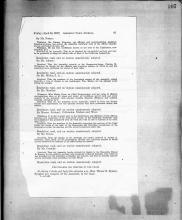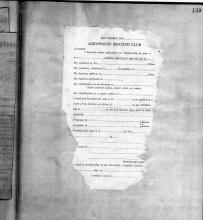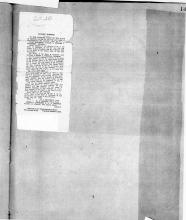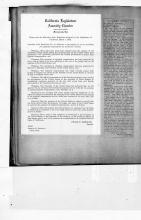WAS User Menu
Scrapbook 1
THE ARTHUR A. OHNIMUS COLLECTION
Click on the descriptions below to view the document.
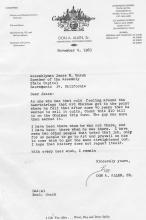
Assembly California Legislature Don A. Allen, Sr. Assemblyman, Sixty-Third District November 4, 1963 Assemblyman Jesse M. Unruh Speaker of the Assembly State Capitol Sacramento 14, California Dear Jesse: As one who has that cold feeling around the heartstrings that Art Ohnimus got to the point where he felt that after some 40 years that he wanted to call it quits. Count this $10 bill in on the Ohnimus trip fund. The guy has more than earned it. I have been there when he was not there, and I have been there when he was there. I have seen two other people that tried that job, only for us people to go to Art and prevail on him to come back to get the mess straightened out. I hope that history does not repeat itself. With every best wish, I remain Sincerely yours, Don A. Allen, Sr. DAA: ml Encl: check I like you Alive…Work, Play and Drive Safely
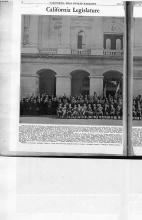
The first half of a group photo, those that are in the photos are members of the year 1929 California Legislature 48th Session, with names displayed at the bottom of those in the picture.
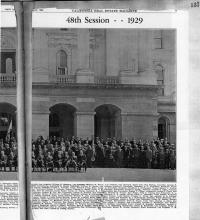
The second half of a group photo; those that are in the photos are members of the year 1929 California Legislature 48th Session, with names displayed at the bottom of those in the picture.
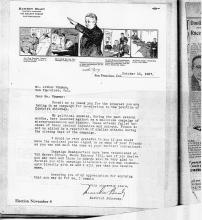
Matthew Brady
District Attorney
333 Kearny Street
San Francisco
This part of the letter shows a comic strip displaying the timeline of Matthew Brady’s life.
San Francisco, Cali., October 10, 1927
Mr. Arthur Whumus,
San Francisco, Cal.
Dear Mr. Whumus:
Permit me to thank you for the interest you are taking in my campaign for re-election to the position of District Attorney.
My political enemies, during the past several months, have launched against me a malicious campaign of misrepresentation and slander. These attacks failed because of their obvious injustice and untruth. Please do not be misled by a repetition of similar attacks during the closing days of the campaign.
I would be very grateful to you if you would have the enclosed postal signed by as many of your friends as you can and mail the same at your earliest convenience.
Campaign Headquarters have been established at 753 market Street, Phone Kearney 7574, and if you desire you may call and those in charge will be very glad to furnish you with campaign literature or you may communicate directly with me and I will see that you receive same.
Assuring you of my appreciation for anything that you may do for me, I remain
Very sincerely yours,
Matthew Brady
District Attorney
Election November 8

California Legislature
Assembly
Forty-Sixth Session
Nineteen Twenty-Five
Office of
Arthur A. Ohnimus
Chief Clerk
San Francisco, Cal., Aug. 12, 1926
Mrs. A. Barducci,
714 London St.,
San Francisco, Cal.
Dear Friend:
Joseph F. Burns, a personal friend of mine, is a candidate for re-election to the Assembly from your district.
During the past session Mr. Burns has faithfully and well represented the 23rd district in the State Assembly, sponsoring and supporting all progressive legislation, and is deserving of re-election at your hands.
Anything you can do to further the interests of Mr. Burns in his campaign for re-election will be greatly appreciated by
Yours very truly,
Arthur A. Ohnimus
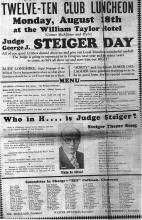
Twelve-Ten Club Luncheon
Monday, August 18th
at the William Taylor Hotel
(Corner McAllister and Hyde)
Judge George J. Steiger Day
All of you good 12:10ers should show up and give our Loyal Members a wonderful sendoff. The Judge is going to represent us in Congress next year and for many years to come, so let’s all show up and start him out right!
Rudy LongMire, Night Manger of the William Taylor has promised to show us what a real Lunceon should b, so we’ll leave that up to Ruby. “Forty” and his Ghort Elmer Galagher have gotten into training so as to be in good form for his special occasion.
Menu
Apperitif – (Whatever that means. Ask Herman Fortriede)
Hors D’Oeuvres – (That’s another tough one. “Bobby” Spencer will attend to these)
Zoop – (We all know what that means. Larry Yoell will yode this course.)
Entrée - (Well, well, and well – If it isn’t our little friend BETA KYRLTON – the Twelve-Ten Club’s sweetheart. All of you members who have not been attending lately don’t know what you’ve missed in this course.)
Vegetables – (Ronald Jonson, bled with beets
(Heine Klotz, smothered with horseradish (Benny Broderick friend in batter)
Dessert – (“Fluffly Ruffles” Through the courtesy of the Green Street Theater. You know! Pretty, petite, piquante, peaceful, polite, positively pleasing.)
Fromage – Frank Galvin in “She is full of Holes”)
(Mr. Goldsmith, manager of the Capitol Theater, presenting special numbers from his cast.)
(“Jo” Mendel and his prima dona, Era Briggs, in Hot Numbers)
And the entire assemblage of 1230 entertainment
Who in H…. is Judge Steiger?
Born in California, reared in the Mission and now lives in the Sunset district of San Francisco.
Worked his way through the University of California and became an attorney.
Sponsored and drafted such humanitarian legislation as the California State Workingman’s Compensation Act which has paid millions of dollars to laboring me and women injured in line of duty.
Appointed judge on the Police Bench by Mayor James Rolph in 1928.
Became Municipal Judge under the new Municipal Court System inaugurated in San Francisco.
Became a candidate for the Republican nomination to Congress in the Fifth Congressional District at the request of representative leaders in this part of San Francisco.
Steiger Theme Song
Written especially for Judge Steiger’s Campaign by “Bob” Spender and Larry Yoell
Tune - “Right Before your Eyes”
We’ll show to you
A man who is true:
Right here before your eyes.
He keeps all vows,
Does themes and How;
Right here before your eyes.
Elect him because
He knows all laws;
Laws that are bound to help you.
Whose wondrous fame,
Geo. Steiger’s his name;
And he’s right here before your eyes
Committee in Charge – “Bill” Coffman, Chairman
Here list 118 names. Along with names at the bottom:
Doc Hoagland, President
Walter Swanson, Secretary
Ray Stephens, Treasure
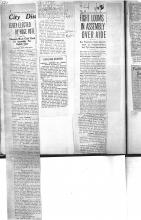
There is five separate news clipping displayed on this page.
First newspaper clipping says:
Levey Elected By Huge Vote
Ohnimus Made Chief Clerk of Assembly for Eighth Time
(Continued from Page One)
slide was larger than his most optimistic supporters predicted.
Reappointment was the keynote of Levey’s address of acceptance, while Breed pleaded for harmony and cooperation.
Arthur A. Ohnimus, for seven sessions chief clerk of the assembly, was returned to that position unanimously; Lewis F. Erb was elected minute clerk, Rev. A. Watson Brown, Sacramento, chaplain, and C. William Booth, Oakland, was appointed assistant minute clerk.
Brown as Chaplain
Roy J. Nielsen and Percy West, Sacramento members, who had been at loggerheads over other appointments, got together at last in the naming of Reverend Brown as chaplain. Nielsen supported Levey while West voted against the San Francisco assemblyman, throwing his support to Crittenden. Nielsen put in nomination William J. McQuillan, Sacramento, as sergeant at arms and West offered the name of A. Ferguson, also of Sacramento for that position. The San Francisco delegation returned Nielsen’s favor and threw its support to McQuillan who was elected.
The Senate adjourned at 2:20 after organizing until 10 o’clock today.
Governor Richardson’s message to the legislature was received and placed on file by the house shortly before adjourning, which took place at 2:40 out of respect to the memory of the late Alfred C. Murray, assemblyman of Riverside, who was killed recently in an automobile wreck.
Levey Landslide
Following is the roll call for speaker:
For Levey: Anderson, Baum, Bishop, Bruns, Byrne, Carter, Cloudman, Crawford, Croter, Davis, Deuel, Duval, Easley, Feigenhbaum, Finley, Fisher, Flynn, Foster, Fry, Gant, Hawes Hedges, Hornblower, Jacobson, Jewett, Jost, Keaton, Kelsey Lenehan, Levey, Lyons, McDonough, McPherson, Melville, Miller, James A. Mixter, Morrison, Murphy, Nielsen, Noyes ,Olivia, Parkman, Patterson, Reindollar, Roberts, Rochester, Roland, Scofield, Scudder, Sewell, Smith, Snyder, Spalding, Walters, Williams, Williamson, Wilter, Woolvine.
California’s new Governor, C.C. Young of Berkeley, watched the legislature, with which he will have to tackle major problems of the State, jump through the hoop of harmony in exhibition of what it is willing to offer in the way of cooperation.
Young in Senate
In the senate, where Governor elect Young presided for the last time as lieutenant governor, the applause that greeted him and the hearty unanimity which Arthur H. Breed was reelected president pro tem., in accordance with Young’s desire, were typical of the spirit of the brief session.
Today at 2 p.m. the new Governor will be sworn in by his friend and fraternity brother of university days, Chief Justice William H. Waste, in the assembly chamber where he began his legislative career a score of years ago. Justice Waste also will administer the oath of office to Lieutenant Governor Buron Fitts.
Both Young and Fitts will deliver inaugural addresses and Friend W. Richardson, the retiring governor, will submit a farewell message. In view of Young’s unquestioned power in the legislature, his inaugural address is looked upon as of particular significance and the recommendations contained in it will receive the earnest attention of senators and assemblymen.
Note: The rest of the article is cut off.
Second Newspaper clipping:
Harry Caro, bookkeeper of the State Senate, and Arthur A. Ohnimus, chief clerk of the Assembly have taken charge of the headquarters of District Attorney Matthew Brady at 753 Market Street. Ohnimus who is a deputy district attorney, has been detached from the office on leave of absence without pay, it was announced yesterday. Brady’s campaign will be directed from that headquarters.
Third Newspaper clipping:
Judge Matt Brady, district attorney, was there in all his jovial glory. So was Maurice Dooling, who’s out against him; but more people met matt. The latter had a lot of the gang from his office who are either regular South of Marketers by birth, raising or adoption.
Tom O’Rourke Entertains
Tom O’Rourke of 37 Sixth Street had a table with a lot of the old gang assembled. Billy Carr was among those present. Assemblyman Fred Hawes, Eddie Riley and his charming wife, Ralph Johnson, Eddie Fopiano, Francis Bracklin and Mrs. Bracklin, Joe and Mrs. King.
Fourth Newspaper clipping:
Dooling Scored
Candidate Ridiculed for “Sudden Interest in Dope Laws”
Opponents of Dist. Atty. Matthew Brady today were rapped vigorously for their “sudden interest” in the ever increasing narcotic evil, when Arthur Ohnimus, chief clerk of the Assembly, came out in answer to Dooling’ assertions that narcotic violators have not been prosecuted here.
Ohnimus said:
“I have read with ironical amusement the sudden interest Mr. Dooling is taking in the narcotic question, an interest developed by him on the eve of election.
“Where has Mr. Dooling’s interest in this question been for the last 12 years? Since 1915, the State Legislature, each session, has enacted laws dealing with this question. Did Mr. Dooling ever appear before any committee of the Legislature advocating the passage of any law dealing with the narcotic question? Is not Mr. Dooling’s interest in this question but the interest of a politician prostituting a great movement for the publicity he may obtain?”
Fifth Newspaper clipping:
Fight Looms in Assembly Over Aide
San Franciscan Seeks Appointment as Sergeant-at-Arms but ‘Tip’ favors Sacramentan
the votes in the Assembly to elect him; that they were perfectly confident that he will be chosen.
Crittenden Hopeful
Assemblyman Bradford Crittenden of Tracy, who has also been making a canvass among the membership along with a committee of Assemblymen, was in evidence, and at a late hour was still of the opinion, he said, that his name would go before the Assembly.
Reports came from Assemblyman Isaac Jones of Ontario that he was also of the same mind.
But this may easily shift before they start roll call tomorrow, especially if all hands decide that the Levey forces’ claims of a good margin over a majority are proved up.
Members of the San Francisco delegation arriving tonight said that it did not appear necessary that a caucus should be held upon the speakership as Levey was so far in the lead at this time he could win without the aid of such a convening of the members.
Outside of that there appears little of interest in the organization of the Legislature.
Fight Raised
A bit of a fight has been raised over the naming of the sergeant at arms of the Assembly. Charles Wilkinson of San Francisco who held the job two years ago was around the lobbies seeking support for this year. Harry Caro of San Francisco and Los Angeles also appeared in the line. But the “tip” was out that it will go to a Sacramento….
* The rest of the article is cut off.
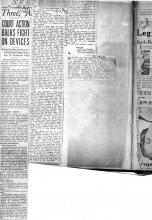
First Newspaper Clipping says:
Court Action Balks Fight on Devices
Brady’s Aide makes no Objection to dismissing charges; Precedent for Prosecution cited
Efforts of the police to stamp out the slot machine racket in San Francisco yesterday were frustrated by Municipal Judge Sylvain J. Lazarus.
Two day after his re-election Judge Lazarus freed three slot machine owners and ordered 210 machines returned to them. The cases had been pending since September 19 and had been on Judge Lazarus’ calendar since October 1.
Admit Ownership
The men turned loose, although they admitted that they owned 210 machines, were Charles Fey, 1885 Mission Street; William Lambertson, 106 Golden Gate avenue, and Jack Moore, 49 California Street.
The judge’s action was taken after Attorney John Taaffe had cited the law to Lazarus, claiming that there was no violation of the law unless the machines were in operation. Arthur Ohnimus, representing District Attorney Brady, made no objections to the dismissal of the cases nor the return of the machines.
Precedent Shown
No official pointed out to the court, nor did he himself advance it, that in many other northern California counties it has been held that the possession of slot machines no matter whether in operation or not, is a misdemeanor.
It was not brought out before Lazarus that several years ago District Attorney Earl Warren, in an exactly similar case, seized several hundred slot machines in an Oakland warehouse, got a conviction of the owners and destroyed the machines. All this was done under Section 330a of the penal code, the same section under which the San Francisco men were charged here.
Called Unlawful
The section reads:
“Every person who had in his possession or under his control any slot machines upon the result of which money is hazarded and which is operated by placing coins therein, the result of which permits and merchandise or money or other thing of value to be won or lost is guilty of a misdemeanor and shall be punishable by a fine of not less than $100 nor more than $500 or by imprisonment in the county jail not exceeding six months, or by both fine and imprisonment.”
Asked how he interpreted this law to make operation necessary before conviction, Judge Lazarus said that Defense Attorney Taaffe had been the only one to read the law to him.
New Weapon
At the same time a weapon which might be used in his battle to clean out slot machine racketeers was called to the attention of Chief Quinn.
Section 335 of the penal code provides:
“Every police officer must inform against and diligently prosecute persons whom they have reasonable cause to believe offenders against the provisions of this chapter, and every such officer refusing or neglecting to do so is guilty of a misdemeanor.”
Chief Quinn said that any officer who permits slot machines to operate on his beat or in his district will be hauled before the police commission and dealt with there, but that if it became necessary that section of the penal code would be used.
Second Newspaper Clipping:
Pays and Reflects
Mr. Frank B. Anderson,
Sausalito News,
Sausalito, California.
Dear Andy: - A polite reminder is before me and from your valued publication telling that my subscription has expired, so fearful that I may miss something of interest, I am enclosing the price for another year’s good reading.
It seems a long time ago since you were a correspondent in Sacramento, in fact it seems longer than my seventeen years legislative work. I suppose the panorama of five Governors moving in and out of the Capitol; Johnson Stephens, Richardson, Young and Rolph and the four Speakers of the Assembly we have seen presiding over the lower House gives an additional impetus to time. I am wondering how you would stand up under another all night session such as we saw during 1915 when Speaker Young held the gavel for the entire time of that debate. Then we witnessed the famous King Tax Bill fight when Henry W. Wright in the chair and Frank Merriam presiding during the 23-25 period during the budget hearings and debates and we were observers during the last session when the Reapportionment debate was at its height with Edgar Levey holding the gavel.
This coming session is the 50th of the California Legislature and marks nearly the half-way point in the Legislative history of the State. A great change has taken place in the Assembly and its membership since you were a reporter and I’m afraid it will be necessary for you to pay a visit to the Legislature this year or you’ll find yourself unknown in the halls of the Capitol before long. This next session finds thirty-four of the members of1931 returned and size members of former sessions, making the roll-call of the next Assembly read 40-40.
The San Francisco membership hasn’t materially changed and you’ll find Gene Roland and Bill Hoffman of the Alameda delegation on hand to greet you when you come up. Ross of Shasta comes back and who could think of Sonoma County without the names of Herb Slater and Hubert Scudder coming to mind.
You always did know a lot about Sacramento and the membership from that county remains familiar with Jack Inman, West and Nielson. Ted Clowdsley from Stockton makes the Valley look like old times. You will remember Ford Chatters who was a newspaperman in the earlier sessions. Ford comes up as member from Tulare and Frank Mixter will be in the Senate from the same country. Our good friend Charlie Reindollar goes to the Senate and inimitable Dan Williams will represent three counties of your Mother Lode country.
Eleanor Miller will be the only lady member in the House and of long legislative service. You will remember our old friends from the south: Charlie Lyon, Bill Badham, Walter Little, Fred Roberts and Archie Brock. When we first knew them they were all new members and now they rank with those of the longest legislative records. You would be compelled to learn your roll call over again if you wanted to keep tab on the vote and watch the file and keep pace with the passage of bills.
T. M. Wright is no longer a member so you would be compelled of necessity to find someone else to feature your wet and dry story and the dry leader in the Assembly. Of course Bill Hornblower is there and Bill is advocating the wet cause as ardent as ever. I wouldn’t be surprised if we hard Bill argue the wet and dry issue this session.
It is pleasant to reminiscent a bit an a world of good fellows come to mind when we think of the days of the old familiar green sheet of the new almost forgotten Bulletin. I can’t help but think of the changes in the press room since you covered the Capitol. Dent Crow of the A. P. and Eddie Boyden of the Chronicle, both passed away and so many of the boys who were familiar on the second floor during the night sessions, many of them no longer in the newspaper game.
Better quit this business of doing too much reflecting or someone may think I’m really getting old in years. Anyway, when you are over this side of the bay, why not drop in and say “hello” to a fellow? You’ll have time now that all your campaign work is over.
With best and kindest wishes, I am,
Sincerely,
Arthur A. Ohnimus
Chief clerk Assembly
California Legislature
Third Newspaper Clipping:
Watch your step today and hereafter. There are 1220 new laws on the statute books all effective today. What might have been all right yesterday doesn’t go anymore. Chief Clerk Arthur Ohnimus of the Assembly was kind enough to send us the new laws, but we are frank to admit that we haven’t read them all as yet. In fact, we haven’t even untied the packaged, but if there is anybody sufficiently interested in reading the new acts come around to the office and go through them.
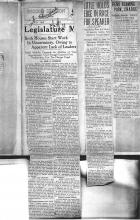
First Newspaper Clipping:
Both Houses Start Work in uncertainty, owing to apparent lack of leaders.
Rolph Modifies Demands for Abolition of Term appointment; Chief Struggle Expected Over Redistricting; few tax changes urged
By Earl C. Behrens.
Chronicle Bureau, Sacramento, Feb. 23 – California’s State Legislature will resume its labors for the forty-ninth session here tomorrow following the constitutional recess of the last thirty days.
Faced with the greatest mass of proposed measures of one kind or another that has been before the two houses in almost twenty years, the legislators will begin their deliberations tomorrow morning in a state of uncertainty due to the apparent lack of leadership in the Senate and the Assembly.
Rolph Keeps Hands Off
Governor Rolph has been maintaining a hands-off policy as far as steering the Legislature is concerned and as a result the present session gives promise of being a maverick.
Almost 2900 bills, constitutional amendments, resolutions and what-nots are on the files, awaiting action by the Senate and Assembly.
Chief Bills Listed
Among the topics of serious controversial nature are the following:
- Reappointment of the California congressional districts to care for the nine additional seats in the House of Representatives allotted to this State by the Federal Government.
- State-wide water conservation program, costing $374,000,000.
- Reorganization of various State governmental agencies.
- Prohibition, including a proposal for a State referendum on the wet and dry issue.
- Numerous amendments to the gas tax law.
- Highway construction extension with the proposed addition of many more miles to the present State system.
- Attempts to curb big business and mergers of large portion of the “cinch” bill type
*Statements after are unreadable because they are cut off..
Few Tax Changes
Contrary to most sessions of the Legislature, there will be no great demand for any material changes in existing tax laws, and no taxation program of any extent will be enacted at this session.
“As the situation now presents itself, there will be no occasion to seek additional sources or increased rates of revenue in the biennium commencing July 1 of this year, or, so far as I can foresee, in the succeeding biennium,” Governor Rolph states.
Reapportionment Big Task
With a goodly number of the members of the Legislature nursing ambitions to be Congressmen, it appears that the greatest problem before the two houses on the matter of congressional reapportionment will be how to cut the new districts to satisfy the aspirants for office.
Southern California wants at least seven of the nine new seats in the House of Representative and at districting eighty seats in the Assembly on a population basis in accordance with the 1930 census and the reapportionment act passed by the last Legislature. The Assembly realignment will have considerable to do with the lineup of many of the legislators on the Congressional apportionment.
South Demands Seats
There has been no Congressional redistricting in California since 1911 and the south is demanding a greater portion of the seats, due to the big jump in population.
The Rolph delegation which went to Washington some days back to seek federal aid or a definite commitment as to financial assistance for the big water development program in this State will be back this week with a report for the Legislature.
Liquor Question Up
More anti-prohibition measures are before the Legislature than ever before and a determined effort will be made by the wets to get the State-wide referendum measure, the search and seizure bills and the Wright dry enforcement act repealed on the floor of the Legislature. The drys have a big bulge in the Senate and Assembly memberships on past counts and they contend that they will be able to hold their lines at this session.
Row over Rolph bills
Governor Rolph’s reorganization bills, including the proposal to abolish term appointments in the case of some 150 State officials and substitute appointments to be held at the pleasure of the Governor, will be the subject of heated controversy. There is a report that the Governor may ask that the present Fellom-Patterson bills, abolishing the term appointments, be materially softened so that fewer officials would be affected. The Governor is said to be willing to accept a much less stringent piece of legislation than was originally introduced.
It is understood that the Governor may not press with too much force his proposed bills, creating new departments of Oil and Gas, Mines and Mining, Parks and Forestry and some other departments. He has already stated that he will not press his bill to create a new State Department of Child Welfare.
Rolph States Views
In discussing his bills to abolish term appointments, Governor Rolph says: “I do not mean by this suggestion to invoke the outworn idea that to the victor belongs the spoils, and I do not refer to public officials not in dominate positions in the outstanding departments of the State administration. Those however, who do hold dominate positions in outstanding departments should come in with and go out with the Governor.”
More Cinch Bills
More bills, hitting at big business, and more measures which look like cinch bills (bills aimed at particular groups or business for shake-down purposes on the part of legislators or lobbyists) are on the files than have been there for years.
A flood of measures seeking to divert gas tax funds or to change the present division of the 3-cent gas tax money are on files.
Rolph Learns Needs
Governor Rolph has visited many portions of the State during the legislative recess and declares that he has learned much of the needs of the several sections on these excursions. Today he attended the Cloverdale Fair, returning to the Capitol late in the afternoon to meet incoming legislators.
Chief Clerk Ohnimus of the Assembly and Secretary Joe Beek of the Senate labored all day making things ready for the dropping of (words are unreadable).
Second Newspaper Clipping:
Little Holds Edge in Race for Speaker
Organization Plans are Started by Assembly Leaders; Vote Await4ed at January Session
Overtures Made to Levey or Conference; Ohnimus Given Backing in Clerkship Fight
By William H. Jordan
Organization plans for the 1933 biennial session of the State legislature are under way.
The body will come into being January 2, notwithstanding that the day is a legal holiday. The Constitution requires that the Legislature shall meet on the first Monday after January 1, which falls on Sunday.
Interest centers considerably in the selection of the Speaker of the Assembly, a post which carries with it the appointment of all standing committees and such others as may be authorized.
Harmony Expected
Appearances are that a harmonious choice will be made. Assemblyman Walter J. Little of Santa Monica seems to have the right of way. Friends of Speaker Edgar C. Levey of San Francisco have been discussing a possibility he might be entered for re-election to the post which he has held for the last three biennial sessions.
Levey is not disposed to make a contest. He has been communicated with by various members, but has given no definite decision. It is also known that there have been overturns made to him for a conference with leaders on organization.
Actively Pressed
The candidacy for Arthur A. Ohnimus of San Francisco for reappointment as chief clerk of the Assembly is being actively pressed by many members who cite his long years of service.
That, together with the fact that custom has prevailed to distribute the appointive positions in the Legislature on a generally even basis as between the north and the south, gives Ohnimus an edge, they say, in the selection of the Assembly clerkship.
Election of the Speaker pro tempore is for the Assembly to control. Two San Francisco candidates, Assemblymen William B. Hornblower and Ray Williamson, are in the field, with Assemblyman Percy.
Some indication of a legislative “bloc” by Democratic Assemblymen is manifest. The Los Angeles County members-elect have organized by electing Herbert S. Hallner of Los Angeles as chairman and James S. O’Connor of North Hollywood secretary.
Lieut. – Gov. Frank F. Merriam of Long Beach continues to serve under the law as President of the Senate. He names the committees and presides over that body.
Senator Arthur H. Breed of Alameda County is likely candidate to succeed himself as President pro tempore of the Senate.
Joseph A. Beck of Balboa, secretary of the State Senate, is in line for reappointment. Beck has sev3ered for years in that capacity with much satisfaction, members say. Joseph F. Nolan of Los Angeles, for many years State Senate sergeant-at-arms, is schedule to succeed himself in that important post in the 1932 Legislature.
Third Newspaper Clipping:
Fiend Roaming Park, Charge
Hickman Attorney Declares Criminal is Still Hiding in District
A fiend is now at large in Golden Gate Park, whose pleasure it is to attack women as Louise Jeppesen was attacked and killed.
This was declared today by Harry McKenzie, attorney for Millard Hickman, charged with the murder of Miss Jeppesen, as Mr. McKenzie asked police aid in locating the criminal.
“I have positive information that this man is still roaming the park in search of prey,” Mr. McKenzie said.
With vengeance in his heart, S. T. Jeppesen, brother of the murdered girl, will attend the trial here of Hickman, according to word received here today from Salt Lake City.
Plead Thursday
Hickman will enter his plea before Judge Louis H. Ward, Thursday.
Hickman appeared today in the court of Municipal Judge Frank W. Dunn for a court record of dismissal of the police charge of murder against him, now that he is held on a grand jury indictment of murder.
Asst. Dist. Atty. Arthur Ohnimus sought to hold the police charge against Hickman on the calendar for handling when his case has been disposed of in Superior Court “in case of an acquittal, to insure justice.”
McKenzie Scores
Mr. McKenzie objected on the grounds it is unconstitutional to place a man in jeopardy twice for the same offense. Judge Dunn sustained his objection.
Hickman, who had complained of the poo food in the city prison, said today he had no complaints to make about accommodations at the county jail, where he was transferred Saturday.
“They serve good, wholesome, solid food in the county jail.” Hickman declared. The treatment is good. The boys are congenial. The cells are clean. Everything is satisfactory.”
San Francisco’s Public Enemy No. 1, Eddie Quinones, is captain of trusties at the county jail, pending appeal of his conviction for possession of a deadly weapon.
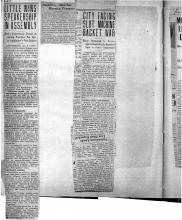
First newspaper clipping:
Little Wins Speakership in Assembly
Breed Unanimously Chosen as Senate President Pro Tem, at Legislature’s First Session
Sacramento, Jan 2. - (AP) – Walter J. Little, Santa Monica, was unanimously elected speaker of the Assembly at the opening session of the State Legislature here today. He succeeds Edgar C. Levey of San Francisco.
Senator Arthur H. Breed of Oakland was elected president pro tem of the Senate, also by a unanimous vote. Breed has held this office for several sessions.
F. C. Clowdsley of Stockton, a Democrat, was elected speaker of pro tem of the Assembly, climaxing a contest with Percy G. West, Republican, Sacramento. The vote was 48 to 30. Clowdsley was nominated by Lucius J. Powers, Fresno, and supported by San Joaquin Valley Assemblymen.
Accepting the Speakership, Assemblyman Little declared:
“California should not brook sectionalism in this public affairs and I will see that it is not brought forward up this floor.”
He told the Assemblyman it would require “real thought on the part of the members of the Legislature to see that no stumbling blocks” were placed in the way of returning prosperity.
Varied Program
The Legislature convened for consideration on as varied and important a program as has been encountered in many years.
The Senators and Assemblymen were primarily interested in effecting governmental economy without necessity of increased taxation.
The Assembly was called to order first by Levey. After a roll all the members were called to the Speaker’s desk to be sworn in by Associate Justice J. A. Flummer of Third District Appellate Court.
Both houses adjourned until 9:30 a.m. tomorrow after completing organization.
In the assembly, Arthur A. Ohnimus, San Francisco, was unanimously re-elected chief clerk for his tenth term. Louis J. Erb, San Francisco, minute clerk at seven previous sessions, was unanimously re-elected. Michael Connolley, Los Angeles, was unopposed for election as sergeant-at-arms. Rabbi Norman M. Goldburg of Sacramento was named chaplain. Ohnimus appointed Fred J. Desch of Los Angeles first assistant clerk.
Crowley Named
Committees on attaches, mileage and rules were named by Speaker Little. Edward Craig of Brea is chairman of the attaches committee, which includes Samuel E. Robinson of Imperial, Harry B. Riley, Long Beach; Samuel M. Greene, Inglewood; Melvyn I. Cronin of San Francisco; Charles W. Fisher, Oakland; and Albert F. Ross, Redding.
Ernest C. Crowley, Suisun, heads the mileage committee, which consists of James E. Thorp, Lockeford; Clifford C. Anglin, Richmond; Frank J. Rogers of Los Angeles, and John H. O’Donnell, Woodland.
The rules committee has C. ray Robinson, Merced, as chairman. Other members are Charles W. Lyon, Los Angeles; Lawrence Cobb, Los Angeles; B. J. Feigenbaum, San Francisco; Eugene W. Roland, Oakland; Clowdsley and Little.
Second Newspaper Clipping:
Assembly Attaches Receive Presents
Attaches of the assembly were guests yesterday at that house’s biennial “love feast,” receiving gifts and words of praise from the law-makers. The beneficiaries included Speaker Edgar C. Levey, William Byrne, speaker pro tempore, Chief Clerk Arthur Ohnimus, Sergeant-at-Arms Arthur Ferguson, Assemblyman Harry Sewell, the five assembly pages, Madge Cross, chief stenographer, and several other secretaries.
Previously the senate tendered gifts to Lieutenant Governor H. L. Carnahan, A. H. Breed, Secretary Joseph Beek and various other attaches.
Third Newspaper Clipping:
City Facing Slot Machine Racket War
Quinn Hampered in Drive against Gambling by Reported Split in Police Department
Gangsterism in the best Chicago manner, lacking only a murder to make it perfect, has given police Chief Quinn the most difficult problem he has faced since becoming chief, it became evident yesterday.
Friday’s hijacking of two slot machines at the town Club, a night club at 2796 Hyde Street, was the first violent outbreak in the notorious slot machine, racket, but there were rumblings in the underworld yesterday y that the worst part is yet to come.
Four men, one of them armed with a sawed-off shotgun, held up the Town Club, bound three men and took away the slot machines. They made no attempt to rob the men present nor to rob the safe or cash drawers, showing clearly that the raid was part of a slot machine war.
Police Split Reported
Behind the scenes is declared to be a wide open split in the police department. Chief Quinn has ordered all slot machines seized wherever found, but the police captains in several districts have ignored Quinn, knowing that he cannot discipline a captain without the approval of the Police Commission.
The rest of the newspaper clipping is unreadable.
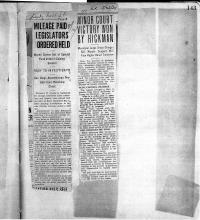
First Newspaper Clipping:
Mileage Paige Legislators Ordered Held
Money Comes out of Special Fund Voted in Closing Session
Riley to Investigate
San Diego Assemblyman Protests upon Receiving Check
Payment of checks to legislators for mileage, assertedly under subterfuge and illegally, was ordered held up today by State Controller Ray L. Riley pending investigation to decide whether someone pulled a fast one.
Assemblymen in San Francisco and throughout the state have been receiving checks for mileage expenses. Some cashed them.
But Bruce R. Stannard, San Diego assemblyman, upon getting his check for $57.30, issued by Fred J. Desch assistant chief clerk of the Legislature, refused it and stirred up the inquiry.
It seems the mileage payments came out of a $5244 fund voted in the closing days of lat session “for payment of salaries for assembly officers, clerks and attaches.”
No fund was voted for mileage expenses, it was discovered by Arthur A. Ohnimus, chief clerk. In fact, there is no law granting legislators mileage expenses and two attempts to amend the constitution allowing such payments died in the last session, Mr. Stannard said.
A form letter sent legislators with their checks and signed by Mr. Desch did not say the money was for mileage, but simply stated it was sent “pursuant to the understanding that this money would be sent to you.” Mr. Desch has made no further explanation.
Controller Riley said h would refuse to honor receipts for the checks and that Mr. Ohnimus and Mr. Desch may be made personally responsible.
Second Newspaper Clipping:
Minor Court Victory by Hickman
Municipal Judge Drops Charge; Girl Murder Suspect will Face Higher Bench Tomorrow
Over the protests of Assistant District Attorney Arthur D. Ohnimus, Municipal Judge Frank W. Dunn Yesterday dismissed murder charges brought against Millard Hickman in municipal court.
Ohnimus has asked the court to postpone dismissal of the charge until the superior court had disposed of Hickman’s trial on the grand jury indictment for the murder of Louise Jeppesen.
Plot, Counsel Charges
The request brought a fiery rejoinder from Harry McKenzie, attorney for Hickman. He said:
“This is a police plot to place my client in an unfavorable light before the public. I demand that the charge be dismissed on the grounds that Hickman will have been once in jeopardy.”
Judge agreed with McKenzie and dismissed the charge.
Hickman, seated in the “bull pen” of the court, remained calm and impassive, showing no interest in the proceedings. He was returned to his cell at the county jail to await his new appearance in superior court tomorrow when he must plead guilty or not guilty.
Dee Stricken by Cold
While Hickman was having his minor victory in court, his companion of the drinking party which preceded the murder of Miss Jeppensen, Thomas “Tommy” Dee, prominent engineer, was confined to his home with a bad cold. Reports that Dee had suffered a nervous collapse were denied at his home, 2000 Beach Street.
Although admitting the evidence would not be admissible at the trial unless some definite connecting link were shown, McKenzie declared that his investigators had uncovered a wealth of information relating to the actions of prowlers and degenerates in Golden Gate Park.
He also said that he was investigating reports of strange midnight drinking parties held at a stable near the scene of the crime.
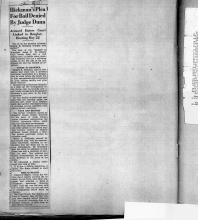
Newspaper Clipping:
Hickman’s Pea for Bail Denied by Judge Dunn
Accused Enters Court Linked to Burglar; Hearing May 22
“No. 17 on the morning calendar. Millard R. Hickman charged with murder!”
The door of the “bullpen” in Municipal Judge F. W. Dunn’s court swung open and a well-dressed man of middle years, seemingly composed save for a twitching muscle on the left side of his jaw, stepped out and was flanked by attorneys.
Court is Crowded
Millard R. Hickman, man of substance, had come into a crowded courtroom handcuffed to a burglar. Now he stood before the bench free of that encumbrance but surrounded by glum looking bailiffs and grim police officers.
He faced the preliminary skirmish of a flight for life – arraignment on the change that he brutally slew a girl young enough to be his daughter following a gay party in his hotel apartment.
He was freshly shaved- spic and span – but the pouches under his nervous eyes spoke of a sleepless night. He watched the maneuvering of opposing counsel carefully, even with a certain eagerness.
Vags and Drunks
The murder complaint, signed by Inspector George Engler, fluttered in the hand of Judge Dunne. Arthur Ohnimus, representing the District Attorney’s office, asked that the defendant be arraigned.
All the vags, drunks, petty thieves and other gentry in the wired cage just recently vacated by Millard Hickman leaned forward a little. The packed courtroom craned its collective neck.
Harry A. McKenzie, counsel for the accused man, with this assistant, John Dinwoodie, standing by demanded that he State put on its case immediately. He demanded that his client be admitted to bail. There was only a suspicion of murder, he said. The evidence was purely circumstantial. No one had put Hickman at the scene of the crime.
He intimated a jealous sweetheart was back of this.
If it was a fishing expedition, it failed. The State refused to show its hand.
Bail is denied
Inspector Engler, taking the witness stand, merely outlined the already known facts – that Miss Jeppesen had attended a party at Hickman’s apartment Saturday night. That she was last seen with the accused. That the girl had died of strangulation before dawn on Sunday.
Bail was refused. The case was put over to Tuesday, May 22, The bullpen door clanged behind Hickman, and handcuffs attaching him to a burglar snapped. A little later he was back in his cell.
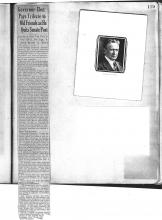
This page displays a newspaper clipping and a self-portrait of Governor C.C. Young.
News clipping says:
Governor-Elect Pay Tribute to Old Friend as He Quits Senate Post
Expects to Have Fine Time in New Office, He Says, in Short Address to Solons
Examiner Bureau, Sacramento, Jan. 3 – The Assembly unanimously elected Assemblyman William M. Byrne of Los Angeles as Speaker pro tempore upon motion of Assemblyman Leland Jacobson of San Francisco.
He said that the San Francisco delegation felt, in view of the honor accorded to their speakership candidate that the second place should go to the South.
Other Officers
Arthur A. Ohnimus of San Francisco was re-elected chief clerk for the eight consecutive regular and extra sessions.
Louis Erb of San Francisco was chosen minute clerk and C. William Booth of Oakland assistant clerk.
William J. McQuilinan of Sacramento was elected sergeant-at-arms. He was opposed by Arthur Ferguson. The chaplain elected was Rev. A. Watson Brown, Baptist Clergyman of Sacramento.
There was one vacant place in the Assembly marked by a wreath upon the desk of Assemblyman A. C. Murray of Riverside, who was killed in an automobile accident near Bakersfield last month, and the body adjourned for the day out of respect to his memory.
In the Senate, the opening was observed by the participation as presiding officer of Lieutenant Governor and Governor-elect C.C. Young who was given a hug round of applause from the Senators as he walked briskly to the presiding officer’s place which he has occupied for the last eight years. Tomorrow he becomes Governor. He was accompanied by Lieutenant Governor-elect Buron Fitts of Los Angeles, who sat on the rostrum until after the departing official had turned over the Senator to Senator Arthur H. Breed, elected unanimously as preside pro tempore of the body.
Sees “Fine Time”
Lieutenant-Governor young expressed his appreciation of the reception which the Senate had accord him. He spoke of the happiness which has been his during his two terms as its presiding officer. He paid a graceful tribute to the members in that “their courtesy and forbearance” had made possible the pleasant associations and experiences of the years he had been with them.
“I expect to have a fine time,” said the Governor-elect, “when I go downstairs tomorrow in to the new office. But it will be with the remembrance of the happy days I spent in this chamber with you. I thank you all.”
He stepped away after greeting Senator Breed, made a brief stay in the Capitol and then returned to his hotel where he will remain until after his inauguration. The new governor will take up residence in the gubernatorial mansion with his family.
Mrs. Young will join him with their two daughters, who will enter Sacramento schools, it is understood.
Their home has been for many years in Berkeley.
Predicts Harmony
“We are going to have an admiration of harmony,” predicted Senator Breed as he took the gavel. This is the eight consecutive term in which the Alameda county solon has served in capacity of president pro tempore.
The Senate elected the Rev. Bryant Wilson of Sacrament as chaplain thus bringing to the fore a companion in arms in the World War with Lieutenant-Governor-elect Fitts who will be sworn in tomorrow. Wilson and Fitts served together in the 364th Infantry, of the Ninety-first Division. The clergyman was decorated for bravery in action.
Joseph A. Beek of Orange County was re-elected secretary. Joseph F. Nolan of Los Angeles as sergeant-at-arms….
* The rest of the article is cut off.
Next to the news clipping is a self-portrait of Governor C.C. Young.
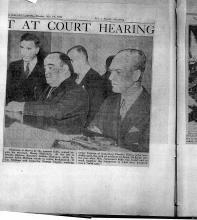
Picture shown of Arthur Ohnimus, Millard Hickman, Harry McKenzie and Allen McGinn
Description of photo: Hickman is shown at the counsel table, seated beside his attorney, Harry McKenzie. At the left is Deputy District Attorney Arthur Ohnimus, while Inspector Allen McGinn stands in center background. It was McGinn and Inspector George Engler, working under captain of Inspectors Charles Dullea, who hurriedly spun the web of evidence to bring Hickman into the case after Miss Jeppensen’s body was found and to work together the fragments to what they declared a “solid case.”

“Solely for the Purpose of Meeting an Emergency”
The picture shows Acting Governor Merriam addressing a joint session of the Legislature.
Speedy Action Asked – Acting Governor Merriam is shown addressing a joint session of the Legislature asking that the members act expeditiously on measures to aid the jobless, granting mortgage moratoriums, relieving property owners from tax delinquency penalties and easing special assessment burdens.
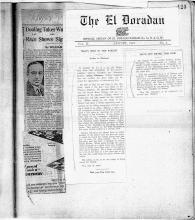
First Newspaper Clipping:
The district attorney’s fight is getting into fast play. Maurice T. Dooling Jr., has launched a battle which he is carrying direct into the camp of District Attorney Matthew Brady.
Dooling yesterday at a series of meeting in his canvass as a candidate for the district attorney ship reiterated his charges of a dilatory attitude on the part of the incumbent, with relation to the organization of various departments of the office.
“I am saying again,” declared Dooling, “that only after eight years of incumbency has the present district attorney on the eve of an election in which he is a candidate, made any moves in some of these departments and bureaus which he is detailing to the public.”
Dooling added:
If this is all so good now, it was just as good eight years ago.
Gives Public Pledge
And in passing, I might put myself upon record at this time as determined immediately upon my taking the office of district attorney to place it all of its important activities upon a basis of practical definite operation.
The rest of the first newspaper clipping is unreadable.
Second Newspaper Clipping:
The El Doradan
Official Organ of El Dorado Parlor No. 52, N. S. G. W.
Vol. II August, 1927 No. 8
WHO'S WHO IN THE PARLOR
Arthur A. Ohnimus
It wouldn’t do for us to go any farther with these little biographies on the parlor's members without including our illustrious brother, Arthur Ohnimus. Arthur happened into our confines the other night and we seized the opportunity of interviewing him.
He tells us that he was born in this city, down “south is the slot,” and raised in the Western Addition. He attended Hearst Grammar and Sacred Heart College, and also is a graduate of St. Ignatius College, where he studied law and later pass the bar examination. Before taking up the study of law, Arthur had quite a varied experience such as starting out by selling newspaper and later being a clerk in an office. Having a desire for the newspaper profession, we find that he spent quite a few years in reporting for mostly all the papers in San Francisco. It was during the latter part of his newspaper experience that he studied law. He is now an Assistant District Attorney under Matthew Brady. Arthur also enjoys the distinguished position of Chief Clerk of the Assembly of the State of California. This position he has held for quite a few years having started as a minute clerk.
Brother Ohnimus has always been an active member of the parlor until the past two years, in which he found his outside duties kept him out of town for long periods. He is Past President and has been a delegate to several Grand Parlors. While going through the chairs Arthur brought in a great many new members, some of whom have been some of the parlor’s most active members. He is better remembered by a lot of the boys of a few years ago as being one who could keep the parlor a-buzz with action.
His hobby, as far as we can judge, is doing favors for friends.
You may be next!
Mail your Post Card now.
Have you heard this one?
On August 18 our worthy brother, Arthur Ohnimus, was instrumental in making our equally worth brother, A, B. Chaquette, the recipient of the attendance prize of $4.00 in that he plucked Brother Chaquette’s name from cigar box.
This act, remindful as it is of Damon and Pythais, is obversely reminiscent of the days when airy and sometimes torrid persiflage rent the otherwise placid tranquility of the atmosphere. Indeed, the flowery eloquence waxed fast and furious; but alas! Our worthy brothers became strangers to our meetings. How true that “time changeth all things.”
Thus fate functions in is customary unknown way. Kismet!
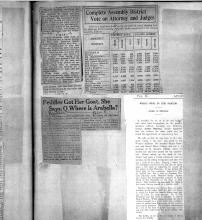
Shown on this page is 4 newspapers clipping.
First newspaper clipping:
Maurice Dooling, candidate for district attorney, continued to fire his questions at Judge Matthew Brady Thursday night in meetings he attended. “He challenged Bradly to tell why he had not tried or prepared a case in the eight years of his incumbency,” say his headquarters. Dooling talked at the Ingleside Community Center, the Board of Produce Exchange and the Lafayette club.
Arthur Ohnimus, chief clerk of the Assembly and a strong booster of Dist. Atty. Matthew Brady, chides Dooling heavily with this:
“It is regrettable to note that Maurice T. Dooling does not know that the State Legislature met this year. That he does not know that certain legislation was passed at that session. That among other bills passed was Assembly Bill 193, which he provides for the care and treatment of drug addicts as patients rather than as criminals. That the bill also provides for a state sanitarium for their care and rehabilitation.
That Dist. Atty. Matthew Brady immediately began preparations for a narcotic bureau which will function in accordance with the provisions of that bill. That the bureau now has been informed and is functioning 65 days after the act became a law.
Second newspaper clipping:
Shows a list of how the fight for district attorney and police judges has progressed in the various assembly districts.
Candidates for District Attorney were Brady, Dooling and Cook.
Candidates for Police Judges were Jacks, Golden and Murasky.
Assembly District were 21st (South of Market), 22d (Butchertown), 23d (Bernal Hts.), 24th (South Mission), 25th(Central Mission), 26th (Castro, Val., Ashb’y Heights) 27th(Sunset), 28th (Richmond), 29th (Hayes Valley, N. Mission), 30th (North of Market), 31st (Nob Hill, Pacific Height) 32d (Downtown), and 33d (North Beach).
Third Newspaper Clipping
Peddler Got Her Goat, She says; O Where is Arabella?
No doubt about it – that peddler certainly got Mrs. Hulda Frey’s goat.
At least, Mrs. Frey was positive about it today in obtaining a warrant, for arrest of Fred Lindeman, itinerant wood seller.
“Then he complimented me about Arabella. That’s my nanny goat. And after he left I found Arabella gone too. Neighbors said they saw him take Arabella away.
“Now, I’ve got two small children, and they depend on Arabella for milk. So please get her back as soon as you can.”
Promising they’d try to redeem Arabella in time for the children’s supper. Detective Fred Jackson and David M. Stevens began a hunt for Lindeman.
Fourth News clipping
WHO'S WHO IN THE PARLOR
Arthur A. Ohnimus
It wouldn’t do for us to go any farther with these little biographies on the parlor's members without including our illustrious brother, Arthur Ohnimus. Arthur happened into our confines the other night and we seized the opportunity of interviewing him.
He tells us that he was born in this city, down “south is the slot,” and raised in the Western Addition. He attended Hearst Grammar and Sacred Heart College, and also is a graduate of St. Ignatius College, where he studied law and later pass the bar examination. Before taking up the study of law, Arthur had quite a varied experience such as starting out by selling newspaper and later being a clerk in an office. Having a desire for the newspaper profession, we find that he spent quite a few years in reporting for mostly all the papers in San Francisco. It was during the latter part of his newspaper experience that he studied law. He is now an Assistant District Attorney under Matthew Brady. Arthur also enjoys the distinguished position of Chief Clerk of the Assembly of the State of California. This position he has held for quite a few years having started as a minute clerk.
Brother Ohnimus has always been an active member of the parlor until the past two years, in which he found his outside duties kept him out of town for long periods. He is Past President and has been a delegate to several Grand Parlors. While going through the chairs Arthur brought in a great many new members, some of whom have been some of the parlor’s most active members. He is better remembered by a lot of the boys of a few years ago as being one who could keep the parlor a-buzz with action.
His hobby, as far as we can judge, is doing favors for friends.
You may be next!
Mail your Post Card now.
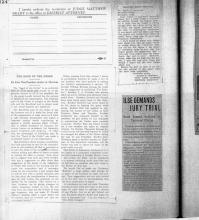
There is 4 items displayed on this scrapbook page.
First item is a petition form for the re-election of Judge Matthew Brady to the office of District Attorney.
Second item says:
The Good of the Order
By First Vice President Arthur A. Ohnimus
The “Good of the Order” is an unlimited field to write about and should be of the greatest interest of all of our members, for in the social benefit derived lies in the success or failure of our organization. The fraternal part of the Order is merged in the Social side and the beneficial end is indeed weak if our social features are neglected.
The Beneficial part of the Order is but the business end of it, while the Social side of the organization is what removes it from a cold business proposition and makes a fraternal society worth considering as against a strictly business affair. Friendship is seldom prompted by business; for money knows no sentiment, but fraternity means friendship and kindness. In order that the advantages of friendship may be hard, the “Good of the Order” was made a prominent feature of our organization.
Many brothers think because a committee has been appointed to care for the entertainment of our members all that is necessary is to take the fruits of the committee’s labors, without adding any effort of theirs to assist in making the affair a success. Now allow me to suggest that each and every brother who has a suggestion to offer place that suggestion in the hands of the committee or better still come to the meeting and advance the proposition and if necessary battle for his conviction. I feel certain that he will be met with a cordial reception and his idea given the consideration it deserves; also he will receive the gratitude of the Parlor for his interest. This should be a duty, brothers, for in giving pleasure to others, happiness comes to you. In our busy lives too often are the friends of long ago forgotten; why not make El Dorado Parlor’s meeting night a place where old friendships may be renewed and new associations formed?
Before passing from this subject I desire to particularly mention by name a few of our brothers who have assisted in making our Parlor’s entertainment a success. To Brother William Thomas belongs the credit for the suggestion of publishing “the Bulletin.” Brother J. J. Crowley has always taken an active interest and advanced many useful hints. Brother Downie and Martell have done much good work in this direction. Brother Bonivert has never failed to do his share in helping the good work along. Brother Hall was assisted in promoting this feature of our Order, as have Brothers Hauer and Warnike. Brother Goldsmith has endeared himself to the members for the ability he has displayed in entertaining the parlor upon repeated occasions. Brother Blay has helped us and for a new member has taken an unusual interest. To Brother Chaquette belongs unlimited credit for the able manner in which he managed the affairs of the Parlor during the year he was President. Brother John Morrison made a decided success as Chairman of this important committee and the Parlor has him to thank for many of the good times enjoyed.
Our Ninth of September Celebration is in the hands of a competent committee under the able leadership of Brother Henry Alves. I feel certain the affair will be conducted in a manner reflection credit upon him and all will have an excellent time who come to the Parlor on that day.
We would like to make our Christmas “Bulletin” a lard edition with articles by as many of our brothers as space will permit. Your suggestions are not only invited as to the best way of accomplishing this, but your cooperation n is urged.
In conclusion try and set aside Thursday evening of each week and come to the meetings; do your share in making a success of our parlor. Let us all get behind our new President Charles Reilly and make his term a successful one. Let our slogan be “The Fifth Delegate.”
Third item says:
Renews with Thanks
Mr. Frank B. Anderson,
Sausalito News,
Sausalito, Calif.
Dear Andy: - Enclosed herewith please find a little script I overlooked sending though I’m mighty please to think that my credit is strong enough with the editor of the news to have the paper continued after the date of subscription expiration. If you hadn’t sent me those post-election papers you would have heard an awful belch from one of your San Francisco subscribers.
I have heard so many nice things said about you and so many words of praise about the wonderful work you did for His Honor, I am afraid of repeating them to you, else you might garner the impression that it was your work rather than the Sunny Smile that put it over. However, when some day we look in to the amber, I may tell you who, when and where I heard all the nice things about you.
Here’s the best of luck to ye editor and success to the paper with the state wide reputation.
Cordially yours,
Arthur A. Ohnimus
Chief Clerk Assembly
California Legislature
Fourth Item says:
Ilse Demands Jury Trial
Bomb Suspect Detained on Technical Charge
Pending possibility of indictment for his asserted attempt to bomb a newspaper plant in Spokane, Wash., Henry A. Ilse was held today on the technical charge of resist an officer.
Charles Boden, assistant public defender, appeared for Ilse before Municipal Judge Sylvain Lazarus and moved that the misdemeanor charge be dismissed.
Arthur Ohnimus, prosecutor and Charles Dullea, captain of detectives, objected, and produced Sergt. Thomas McInerney, who charged that his knee was badly injured when he sought to arrest Ilse.
Ilse demanded a trial by jury on the charge, and it was set for Monday afternoon.
The bomb, said by police to have been constructed by Ilse, has arrived and will be shown to the grand jury. The district attorney’s office announced that the container would be shown the jurors when the explosives, 100 sticks of dynamite, arrived.
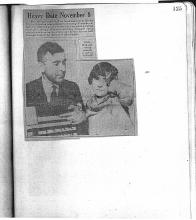
News clipping shows a picture of Arthur Ohnimus teaching Rita Wallace how to use a sample voting machine.
Description says:
Heavy Date November 8
Rita Wallace, one of those local lassies just turned 21, is all excited over prospects of voting November 8, but very dubious as to whether she can work a voting machine. Arthur Ohnimus, attorney, brought out a sample machine for her today and before he was half through explaining, Rita took above pose.
Girls find out voting process is not so difficult.
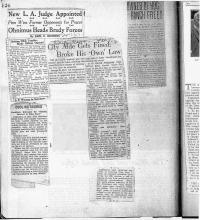
There is 6 newspaper clipping displayed on this scrapbook page.
First news clipping:
New L.A. Judge Appointed
Finn Wins Former Opponents for Power
Ohnimus Heads Brady Forces
By Earl C. Behrens
Second news clipping:
Betting Odds Tumble; Brady Offices Opened
Betting odds on the coming fight for District Attorney took a decided tumble at local betting commissioners by the presence of “real money” on the boards.
Several days back District Attorney Matt Brady was quoted as a 5-to-1 favorite. A backer of Maurice T. Dooling Jr., showed up with $5000 in cash to place on Dooling as the short-ender. There was no money available, however, at the end quoted odds.
Yesterday’s odds on Brady were 8 to 1. Whether or not there was any money at that figure, the writer depeneth not.
District Attorney Brady has opened campaign headquarters at 753 Market Street.
Arthur A. Ohnimus, chief clerk of the Assembly and a deputy district attorney, and Harry Caro, a member of the G.O.P. county committee, are in charge of the offices. Ohnimus is now on leave from the District Attorney’s office, without pay.
Third news clipping:
Dooling Scored
Candidate Ridiculed for “Sudden Interest in Dope Laws”
Opponents of Dist. Atty. Matthew Brady today were rapped vigorously for their “sudden interest” in the ever increasing narcotic evil, when Arthur Ohnimus, chief clerk of the Assembly, came out in the answer to Dooling’s assertions that narcotic violators have not been prosecuted here.
Ohnimus said:
“I have read with ironical amusement the sudden interest Mr. Dooling is taking in the narcotic question, an interest developed by him on the eve of election.
“Where has Mr. Dooling’s interest in this question been for the last 12 years? Since 1915, the State Legislature, each session, has enacted laws dealing with this question. Did Mr. Dooling ever appear before any committee of the Legislature advocating the passage of any law dealing with the narcotic question? Is not Mr. Dooling’s interest in this question but the interest of a politician prostituting a great movement for the publicity he may obtain?”
Fourth news clipping:
City Aide Gets Fined;
Broke his ‘Own’ Law
The city traffic engineer was “off transit” just $5 today, following his conviction on a charge of violating the very laws he proposed.
George D. Burr, 116 Frederick – St, paid the fine, but filed notice of intention of appealing from what he declared was an unjust decision. And he threatened to have Policeman John P. Kelly “disciplined” for causing his arrest.
It all started Wednesday when officer Kelly blocked traffic in front of the City Hall on Polk Street to allow a number of women and children to cross the street.
Burr drove past the officer into the traffic lane and through the crowd of children.
Kelly whistled and Burr stopped.
“Don’t you under these new traffic laws?” Kelly asked.
“Sure; I drafted most of them,” Burr said as he took his credentials from his pocket and showed that he was connected with the office of City Engineer M. M. O’Shaughnessy.
“Why didn’t you stop when the traffic was blocked there?” Kelly continued. For explanation, Burr invited Kelly to give him a ticket and said he could have it “fixed” anyway.
When Burr got to the Hall of Justice, the “fixing” failed.
When Burr faced Police Judge Sylvain J. Lazarus, he recalled that they had met at traffic committee sessions. The previous meetings failed to arouse any sympathy with the court.
“Kelly was obstinate,” Burr charged.
“That’s strange,” said Judge Lazarus. “I have known Officer Kelly for three years. He has the reputation of being one of the most agreeable officers on the force. In fact, he probably has made fewer arrests than most of the other men on the police department.”
Under the fire of Arthur Ohnimus, Burr admitted that hit was Kelly’s job to enforce the laws. When the admission was made, Judge Lazarus levied the $5 fine.
Fifth news clipping:
Legislators were surprised yesterday at receiving Fred J. Desch, an assistant Assembly clerk during the 1931 session, a call to express at once their preference for committee appointments. Query was made among members of the San Francisco and other delegations upon what authority Desch was acting. The rule has been for many years to present preference notices to the Speaker of the Assembly after its organization and upon his own request to the body from the chair.
Sixth news clipping:
Owner of Hog Ranch Freed
It took a jury in the court of Municipal Judge Sylvain Lazarus only three minutes yesterday to acquit Pacifico Grech on charges of maintain a nuisance and violating an ordinance forbidding hog ranches within the city limits.
Despite the acquittal, Dr. William C. Hassler, city health officer, declared he will institute proceedings citing Grech to appear in court to show cause why he should not be held in contempt. Three months ago the superior court ordered the abatement of Grech’s ranch at 301 Lane Street.
Grech was found not guilty on the criminal charges of violating the city ordinance and maintaining a public nuisance because of the few witnesses who testified against the hog ranch, it was explained by Assistant District Attorney George Ohnimus. Several witnesses must complain of a nuisance, and yesterday the only witnesses were the police officer who arrested Grech and two inspectors of the Board of Health.
Examiner 10/18/1930
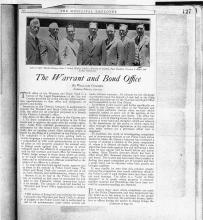
July 7
The Municipal Employee
Shows a photo of 7 men, from left to right they are: Martin Bruton, John J. Ward, Walter Schiller, William P. Golden, Paul Madden, Terence J. Boyle and Arthur Ohnimous.
The Warrant and Bond Officer
By William Golden
Assistant District Attorney
The office of the Warrant and Bond Clerk is a bureau of the Legal Department of the City and County provided for in the Charter, which authorizes appointments to that office and designates its powers and duties.
Inasmuch as the District Attorney is authorized to appoint the Warrant and Bond Clerk and his assistants, the office for all practical purposes is a branch of the District Attorney’s office.
The duties of the office set forth in the Charter are:
- To draw complaints in all actions in the Police Court and to approve the same with his written signature. Aside from the criminal prosecutions initiated by indictment by the Grand Jury, which are comparatively few in number, every other criminal action is begun by the filing of a complaint in the Police Court. The complaint is in affidavit form, setting forth in concise language a statement of the offense committed for complained of which such particularities as to time and place as will properly acquaint the accused with the charge made against him. A warrant of arrest predicated upon the affidavit of complaint is also prepared by the warrant and bond office for issuance by Police Judge except in those cases where an arrest may be made without a warrant, which applies to all felonies and to misdemeanor offenses committed in the presence of an officer or a citizen
- To issue bail bond an appeal bonds, approve and prep them in his custody in Police Court cases. The warrant and Bond Clerk also accepts cash bail in all cases, both felonies and misdemeanors, where a hear to thereon is to be had in the Police Court. The money so received as bail must be accounted for and be paid to the Treasure within twenty-four hours for its receipt. The amount of cash bail handled by t the Warrant and Bond Office approximates a million dollars a year.
The matter of fixing bail and ordering the release of prisoners the Warrant and Bond Clerk is subject the Judges of the Police Court, but is authorized to bail in all misdemeanor cases where arrests are made without warrants. All releases for the discharge of prisoners upon the deposit of cash bail or the filing of bonds are made out by the Warrant and Bond office and transmitted to the City Prison.
In addition to the powers and duties specifically set forth in the Charter, the office of the Warrant and Bond Clerk performs various other services which naturally attend or grow out of the exercise of the express statutory powers and duties. The office has become a sort of clearing house for troubles and complaints of every kind and character, which are referred to the department by the police or which reach the office through the direct application of the individual who seeks redress for grievance either real or imagined.
To facilitated the work of investigating complaints and of determining whether or not Police Court action should be taken the District Attorney has instated a system of sending a citation to the party complained of, where it is deemed advisable, stating that a complaint has been made against him and indicating a time when he may appear and be heard before an action is taken. Since District Attorney Brady has been in office about fifty thousand citation have been issued and heard. The system has been more than justified in finding that many complaints are ill founded and that a great many can be adjusted when both parties are brought together.
It may readily be seen that this practice greatly relieves the congestion that would otherwise result in the Police Court if such matters were sent there without such hearings. The office is a “Court of First Instance” so to speak, where property is restored, families reunited and friendships have been severed by misunderstand are renewed.
In a great many cases where complaints are made to the Police Department and that department has any doubt as to the action to be taken or the proper procedure to be followed ,the particular bureau, detective or officer having the matter in charge brings the…
(Continued on Page 34)
Note: page 34 was not provided.
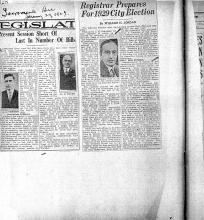
Two news clipping displayed from the Sacramento Bee.
First News clipping:
January 21, 1929
Present Session Short of Last in Number of Bills
Although there was 294 bills and many resolutions thrown to the legislature hopper in the assembly yesterday, the number of bills introduced at the hour of adjournment on the day previous to the close of the first part of the present session fell far short of the number that had been introduced in the assembly on the similar day at the last session.
A compilation made to-day by Chief Clerk Arthur A. Ohnimus of the assembly shows that on January 23, 1925, the day previous to the date of adjournment of the first part of the previous legislative session, there had been 1,068 assembly bills introduced. UP to adjournment last night the total had reached but 827 for the session to date.
Resolutions Different
Although the number of assembly bills had fallen short of the number on the similar date in 1925, both in so far as bills and assembly concurrent resolutions are concerned the present session takes the record up to last night in number of assembly concurrent resolutions introduced. In the session of 1925 up to the night before the session adjourned for its first part, the number of concurrent resolutions introduced in the lower house was ten. Up to last night, the number of such resolutions introduced amounted to seventeen.
During the present session to date there have been fewer “skeleton bills” introduced than at any other session in recent years. According to the old timers in the legislature that fact is due to two causes: First, the message of Governor C. C. Young, in which he advocated that such bills be left out entirely or else cut to a minimum, and the work of Speaker Edgar C. Levey in the speeding up the procedure in the lower house. Aside from the fact that “harmony” is an accomplished fact in so far as the lower house is concerned, to date, Levey has made a record as a speaker in the matter of keeping things on the move. There are no delays in legislation in the assembly and that coupled with the fact that “harmony with the administration” is the watchword, has helped o expedited matters.
There are four members of the assembly that up to last night had not introduced a single measure. They are D.P. Ander son, J. Croter, Howard D. Davis and Fred Roberts.
In number of bills introduced, the following assemblymen take the “cake:”
Henry E. Carter of Los Angeles; F. C. Clowdsley of Stockton; Isaac Jones of Ontario; Eugene Roland of Oakland; Harry F. of Whittier.
Second News Clipping
Registrar Prepares for 1929 City Election
By William H. Jordan
“It’s just on election after another.”
Thus quote J. H. Zemansky, veteran registrar of voters, as he checked up yesterday on some of his forty years of active service in the department of elections.
That comment referred to the fact that barely will have the big Presidential contest been cleaned up than his office will have to look forward to a municipal struggle in 1929.
Of course I am retiring, as has been hither to stated, on July 1 next,” said Zemansky, “but there will be a lot of preliminary work to be done, even if the city election does not come up to us until the following November.
The registrar pointed out that there will be nine supervisors to be chosen, which is one half of the board’s membership.
Those whose terms will expire are James B. McSheehy, Walter J. Schmidt, Cornelius J. Deasy, Charles J. Powers, Franck R. Havenner, Milo F. Kent, William P. Stanton, Milton Marks and Charles F. Todd.
Two Police Judges
Two police judges, succeeding Jude S. J. Lazarus and Judge Daniel J. O’Brien, are to be chosen.
Judge Lile T. Jacks’ term on that bench runs to 1931. To that unexpired time an appointment will be made by Mayor James Roph Jr. after January 1, when Judge Jacks takes his place on the Superior Court bench having been elected November 6.
Other city hall offices to be filled a year hence are those of City Attorney John J. O’Toole, Treasure John H. Thieler, Tax Collector Edward F. Bryant, Record Edmond Godchaux, Public Administrator Phil C. Katz and Alice Rose Power, members of the board of education.
Tax Collector Bryant had no opposition when he was re-elected in 1925. Reports around City Hall are that Supervisor Fred Suhr is looking toward that office and may make the run next year.
As has theretofore been indicated, Arthur A. Ohnimus of San Francisco seems to have the right of way for re-election as chief clerk of the Assembly at the 1929 session. Joseph A. Beek of Balboa, for years secretary of the Senate, is also talked of for succession to that post. Both positions are of much importance. Ohnimus and Beek, by long period of service, have demonstrated ability based upon their experience in handling the technical detail in the respective house of the State legislature.
Only one woman
Representation of women in the legislature has dwindled to one, Assemblywoman Eleanor Miller of Pasadena. Some years ago five women sat in that body at one time. This reverses the situation in the Federal congress, where the number for the session opening in December, 1929 will be seven, an increase steadily over the first woman incumbent at Washington.
The resignation of Lieut. Gov. Buron Fitts will be effective on December 1. He has been elected district attorney of Los Angeles county, H.L. Carnahan of Los Angeles, appointed to succeed Fitts by Gov. C. C. Young then assumes his post as lieutenant governor. As such he will be presiding officer of State senate.
Carnahan’s initial introduction to that position will take place with the convening of the state legislature on January 7. As presiding officer, the naming of committees will be in his hands. Someday, who was said to be Col. Eric Fowler of Los Angeles, started a move to take that power out of his hands by the naming by the Senate of committee on committees. This was blasted by the “insiders” with a stiff declaration of leaders all over the State that “such a thing will not be listened to by the Senate.”
It was this same Colonel Fowler who has reported to have tried a drive to defeat Senator Arthur H. Breed for re-election as president pro tempore of the Senate. This also got swiftly “knocked into a cocked hat,” as the political observers noted the situation.
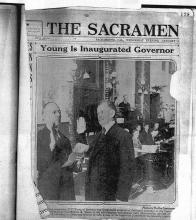
Newspaper clipping from Sacramento Bee shows a picture of C. C. Young being inaugurated governor of California at the Capitol. Chief Justice William H. Waste of the state supreme court is to the left administering the oath.
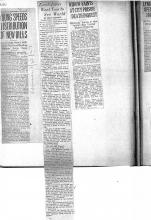
There is three Newspaper clipping shown here.
First Newspaper clipping:
Young Speeds Distribution of New Bills
Governor Urges Haste in Printing so that Voters may Study Measures during Recess
By: Herbert L. Phillips, Staff Correspondent of “The Examiner.”
Examiner, Bureau, Sacramento, Jan. 22. – Governor C.C. Young today continued further with his policy of taking the California public completely into his confidence on matters of State business and took steps to provide that the details of all bills introduced at the short session of the Legislature, ending yesterday, shall be made available for study by the people before the two houses reconvene.
The governor to this end held a conference with Joseph A. Beek, secretary of the Senate; Arthur A. Ohnimus chief clerk of the Assembly, and Fred B. Wood, chief of the legislative counsel bureau, requesting them to hasten the printing and binding of bills so that members of the Legislature may have the maximum time for careful consideration of various propositions during the constitutional recess and all public requests for information on intended legislation may be compiled with immediately.
Follows Budget Idea
Holding that the public is entitled to know the entire story of proposed legislation, Governor Young is following the line of action adopted in preparing the biennial budget which sets for every item of his financial program in keeping with the idea that the voters should be reliably informed as to every dollar the Senate spends.
Despite the flood of bills which marked adjournment of the Legislature yesterday, Beek and Ohnimus were able to report to the Governor today that the Senate and Assembly histories are completed and ready for distribution. This was considered a record and so was the announcement of legislative Counsel Wood that he proposes to have a printed digest of the 2,000 odd bills, resolutions and constitutional amendments prepared within the next week or ten days.
Officials Praised
Governor Young issued a statement publicly commending all three officials in this connection and praise was also given Robert Alexander, chief clerk of the State printing department, for co-operation in carrying through the program without delays.
Second Newspaper Clipping:
Lynch Jurors Want Tour to See World
By Milly Bennett
Twelve hungry, weary jurors, sitting in a stuffy smoke-filled room in the coroner’s building at 5:45 p.m. Friday, decided:
“We’ll investigate –do something constructive-get a program-a plan-investigate police methods in other cities-”
And so ended, for the time being at least, the coroner’s jury investigation into the death of John Lynch, American veteran of the British war front, who died neglected, booked “drunk,” Nov. 17 in a cell at the city prison.
Albert Samuels, prominent merchant, foreman, explained that the jury would meet again, a week from Monday night as a committee to investigate ways and means-
I mosied away with Samuel Glenn of the American League of British War Veterans, bluff, hot tempered, courageous soldier, who had sat at the inquest to see “justice done” his dead comrade.
“Yes, yes,” Glenn cried over a telephone, “yes; they didn’t do anything.
“That’s what I said-they didn’t do anything. It’s been put over.”
Leland Makes Suggestion
Coroner Leland, in his characteristic friendly manner, had suggested to the jury, just before they left the courtroom to deliberate, that it was within their province “to look in to the matter”; to investigate the police methods of other cities; Oakland, New York, Los Angeles, even European cities.
“Do we get mileage?” one cheery juror asked/
The inquest began at 8:30 a.m. with a conducted tour of police stations, during which the police led the visitors through the women’s prison and showed the white beds of the so-called dormitory “where runaway girls or women with babies are kept.” What this had to do with the investigation of John Lynch’s death none explained.
Tragedy, Drama and Humor
Tragedy, drama, humor, half-truths and the merciless grilling by the district attorney and the coroner of a witness who saw Corp, Hobson turn the head of the prostrate Lynch with this foot, marked the day.
The tight-lipped assistant district attorney, Arthur Ohnimus, announcing, with a gleam of humor in his eyes:
“I’m here to get the truth.”
He did not question a single, solitary policeman. Not a murmur from whim when two officers, Oakly Cook and O.C. Wilmart, testified under oath that they were present when Lynch was booked at the city prison.
“Did you see Corp. Hobson turn the dead man’s face with this foot?” the coroner asked.
“No,” said Cook.
And “No,” said Wilmart.
Statement Read
Capt. Mike Heardon, reading a statement of Hobson’s, said:
“Corp. Hobson admits that he gently placed his foot and turned Lynch’s head, but he denies that Lynch asked for medical attention.”
The district attorney did not cross examine Cook and Wilmart. But when Fred Rogers, a slender, 17-year-old youth, who had come to say that he saw the police brutality took the witness stand. Ohnimus flashed probed, was witty and sarcastic by turns.
The coroner turned on Rogers:
“What significance did you attach to the slight amount of blood on Lynch’s face?
“You at one time led the jury to believe that the bleeding was very slight and another time it was profuse?
“Did you believe that Lynch was treated brutally? No” then why point out the blood on Lynch’s face? What’s the significance? Did you think that that man should be taken to the hospital? Then why all the talk about the blood? Why did you mention it? Did you see any particular harsh treatment?”
Rogers, troubled by the coroner’s attack, said:
“No, I saw nothing unusual about the treatment to Lynch outside of the fact that he wasn’t carried… I didn’t see any outward brutality.”
And finally…
“I think I can explain, sir, why Hobson turned Lynch’s face with his foot. Hobson’s hands were full of papers.
Third Newspaper clipping:
Widow Faints at City Prison Death Inquest
Witnesses’ Stories of How Veteran was Treated Shaken at Hearing
Direct contradictions in testimony as to the treatment John Lynch received at the City Prison, collapse of his widow while listening to the proceedings, medical testimony as to his precarious condition, and a vivid account of the fight which led to his arrest were highlights at the Coroner’s inquest yesterday into the death of John Lynch, war veteran who was taken to the City prison as “drunk” on the night of November 16 and died during the night.
One prisoner and two young men who were visiting him when Lynch was brought in, testified he was dragging across the floor and his request for medical aid was refused.
Stories are shaken
The stories of these men were weakened by cross-examination and all admitted at the time they didn’t know whether Lynch was drunk or ill.
Testimony as to Lynch’s condition was given by Dr. A.A. Berger, city autopsy surgeon, who said that death was caused by a blood clot on the brain and by pneumonia in both lungs. Dr. Berger said Lynch’s condition when brought to the prison was such he would have died anyway, even if he had received medical care.
Lynch arrested twice
Collapse of Mrs. Lynch came during the forenoon session when Policeman John McGee of Mission station was on the stand. McGee testified he had twice arrested Lynch on complaint of Mrs. Lynch that her husband was drunk and abusing her and the children. The session was suspended until Mrs. Lynch, who is expected to become a mother within a few weeks was revived, and then was continued.
Robert F. Naylor, cashier of the America-La France and Foamite Corporation at Sixteenth and Shotwell streets, told of watching form his office the street fight which led to Lynch’s arrest.
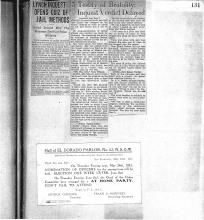
Newspaper clipping and an invitation displayed on this page.
First Newspaper clipping:
Lynch Inquest Opens Quiz of Jail Methods
Verdict Delayed after Five Witnesses Testify of Police Brutality
With evidence of police brutality and stupidity coming from fixe witnesses, a coroner’s jury at the inquest of John Lynch, wounded British veteran who died in city prison Saturday, Friday withheld a verdict and opened an investigation into prison systems of other cities.
Discrepancies between the stories told by eye-witnesses and police of the handling of Lynch thrown into relief as Merritt White, Arthur Allan and Fred Rogers told again what they saw in the city prison.
An attempt by Arthur Ohnimus, deputy district attorney, to shake Rogers’ story failed.
Although Ohnimus attended the inquest as legal adviser to the coroner, he sat next to Capt. Michael Riordan and conducted his questioning on suggestions from the man who has handled the police inquiry of the case.
Ohnimus’ attack on Rogers came after the 17 year old youth had told how Lynch was “dragged by his wrists,” laughed at when he asked for aid, and thrown into a cell to die.
No cross-examination of police officers who testified was made by Ohnimus. He abandoned the tactics he employed in handling Rogers when asked whether he was the police department attorney.
Mrs. Vila Lynch, the widow, did not testify. She was carried from the inquest room in a faint as Officer John McGee of Mission station gave Lynch’s police record.
Officers who handled Lynch that day before he died insisted that Lynch was drunk. Officer McGee, Officer O.C. Willmart and Corp. George Weatherford, all of Mission station, admitted that Lynch was handled as a “drunk” with no thought he was sick.
“He was Sick,” Says Witness
Al Hill, 3861 24th Street, told of picking Lynch from the sidewalk as the patrol wagon arrived after a fight at 16th and Shotwell Street Friday noon.
“Lynch was sick,” Hill declared. “I didn’t smell liquor on his breath. Anyone could have told that man was very ill.” Hill’s brother, Ernest, was ready to corroborate the story but was not called to the stand.
R.W. Taylor, 1718 Yale-dr, cashier of the San Francisco office of the American-La France Co., described the fight in which Lynch received a heavy blow on the mouth.
“He acted drunk and very much under the weather,” Naylor said. He admitted later under questioning that he had not smelled liquor on Lynch but based on his conclusions on the way Lynch had “floundered around.”
Prison Stories Differ
Police officers came from the city prison and witnesses to Lynch’s arrival there Friday differed markedly in their stores of the treatment given the dying veteran.
“He was carried from the elevator to the booking desk and from the desk to his cell,” police insisted.
“He was dragged on his back with an officer tugging at each wrist,” Allan and White testified.
“I will swear on a Bible that there was no lifting of Lynch as they dragged him along the floor,” White added.
White and Allan both said they thought the man was ill when he was dragged into the prison.
Corp. Frank Hobson did not take the stand. Hobson is under charges of “unofficerlike” conduct for his part in Lynch’s death. He admitted informally from the audience that he turned the veteran’s head with his foot as he lay before the booking desk.
The story of police also differed with that of Allan, White and Rogers on whether Lynch asked for medical aid.
Civilian Jury Delays Verdict
Each of the witnesses said they heard such a request. No policeman admitted hearing it.
Dr. A.A. Berger, autopsy surgeon, said that Lynch’s condition at the time of his death showed him to be “a very sick man” the day he was arrest. “Drunk or sober,” Dr. Berger declared, “Lynch was ill-and very ill.”
The jury’s decision to withhold its verdict came after an hour’s deliberation.
“We wish to offer a constructive program remedying the contributing causes of this unfortunate death,” Albert Samuels, foreman, declared. The jury will meet again Dec. 3.
Invitation Card below:
Hall of El Dorado Parlor, No.52, N.S.G.W.
Meets Every Thursday Eve, at Native Sons Hall. Mason St., bet. Geary and Post
San Francisco. May 23rd, 1921
Dear Sir and Bro.:
On Thursday Evening next, May 26th, 1921, Nomination of Officers for the ensuing term will be held. Election one week later, June 2nd.
On Thursday Evening, June 2nd, the Good of the Order Committee was arranged for a At Home party. Don’t fail to attend.
Yours in F. L. and C.
Frank A. Bonivert Recording Secretary
Arthur Ohnimus,
President
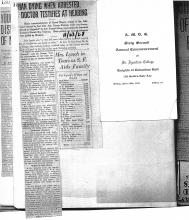
A newspaper clipping and an invitation card displayed on this page.
Newspaper clipping:
Man Dying When Arrested, Doctor Testifies at Hearing
Sharp cross-examination of Ernest Rogers, witness in the John Lynch inquest by Asst. Dist. Atty. George Ohnimus today was characterized as “shameful” by Atty. Samuel Glenn, representing the American League of British War Veterans. Glenn pointed out that no policemen were grilled by Ohnimus.
John Lynch was “a very sick man when he was arrested, regardless of whether he was drunk or sober.” In fact, he was dying, Dr. A. A. Berger, city autopsy surgeon, testified today at the inquest into the death of Lynch in the city prison early Saturday morning.
“I found no alcohol in Lynch’s stomach,” said Dr. Berger, “and an examination of the body revealed no sign of chronic alcoholism.”
Similar testimony was given by Dr. A. M. Moody, pathologist.
Dr. Moody added that the blood clot in Lynch’s brain, near an old shrapnel wound-one of eight suffered by Lynch during the World War-had been two weeks prior to the time Lynch was arrested.
He also blasted police attempts to show that Lynch was a heavy drinker by declaring there was no trace of alcoholism and that Lynch “certainly was not a chronic drinker.”
Tells of Brutality
Police who testified all told similar stores: “He was drunk, he didn’t look sick, he didn’t ask to be sent to a hospital, and we didn’t mistreat him.”
But shortly after the afternoon session began Ernest Rogers, who was in the city prison when “two policemen dragged Lynch from the elevator, hanging onto his wrists,” reiterated what he told the News several days ago:
That Corp, Frank Hobson had accused Lynch of “playing possum,” had refused his plea for medical attention and had use his foot to turn over the dying man’s head.
Testimony Attacked
And then spectators and members of the coroner’s jury were given a surprise. Asst. Dist. Atty. George Ohnimus, who was believed to be attending the inquest for the purpose of assisting the coroner, suddenly appeared in the role of official police defender.
He questioned Rogers sharply. He sought to batter down Rogers’ testimony against the police. He snapped questions that were whispered to him by Capt. Michael Riordan. Rogers was treated “like a criminal,” as one spectator commented. But his testimony was not shaken.
Widow is Sent Home
A few minutes after the inquest was opened by Coroner T. B.W. Leland, the British war veteran’s widow, Mrs. Viola Lynch, 16 Abbey Street, collapsed. After being revived in an anteroom Mrs. Lynch sobbed; “I can’t bog back in that room.” Dr. Leland ordered her taken to her home.
As the inquest was under way a police investigation report was in the hands of the chief, charging only one officer with neglect and improper conduct. While this investigation was being made, agents for McDonough Bros., bail brokers, sent word to police who are tipsters for them in bail cases, that “nobody will lose his job over this; if necessary we’ll take to the City Hall.”
Among officials at the hearing was Arthur Ohnimus, deputy district attorney detailed to assist the coroner by Dis.t Atty. Matt Brady.
Mrs. Lynch in Tears as S.F. Aids Family
For Lynch’s Widow and Family
The News $100.00
Previously acknowledged 61.00
S. F. Bulletin 50.00
A War Veteran 50.00
Ex-Service Man 10.00
A Dad 10.00
Two Friends 10.00
James Gallagher 10.00
Anonymous 5.00
S. L. Haber and friends 5.00
I. M. T. 2.50
Reader of the News 2.00
Mrs. S. Viener 2.00
C. P. Scannell 2.00
A.G. Morrison 2.00
J. P. M. 1.00
One who feels sorry 1.00
C. Bassetti 1.00
One who feels their loss 1.00
Widowed Mother of 3 War Veterans 1.00
H.A.S. & C.L.P 1.00
M.M.H. 1.00
Reader of the News 1.00
Dorothy DeVall 1.00
Little Robert 1.00
C.J. Read 1.00
Total: $327.50
Invitation Card
A. M. D. G.
Sixty Second
Annual Commencement
Of
St. Ignatius College
Knights of Columbus Hall
150 Golden Gate Ave
Friday, June 10th, 1921 8:00 p.m.
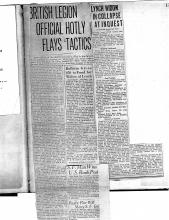
Two newspaper clipping shown.
First Newspaper Clipping:
British Legion Official Hotly Flays ‘Tactics
The conduct of the district attorney’s office in this inquest is an outrage, an attempt to “whitewash” the police department and discredit all other testimony. With these words Samuel Glenn, commander of the American League of British War Veterans, this afternoon bitterly denounced the inquiry into the death of John Lynch, wounded veteran, who died in a city prison cell, where he had been thrown as a drunk.
The attack was aimed at Assistant District Attorney George Ohnimus who allowed police witnesses to testify and to leave the stand with but little questioning, and with the appearance of the first unfavorable witness, a boy of 17, launched a grilling attempt to break down the youth’s story.
Al Hill, who tried to help Lynch as he lay on the sidewalk before the “arrest,” heatedly denied that he had told Officer McGee that Lynch was drunk.
Hill declared that Lynch was “pale as a sheet, glassy-eyed” and that the big crowd gathered around him thought the patrol wagon was an ambulance. Hill also stated that he helped hold Lynch up and noticed no trace or smell of liquor.
Attacked Character
The sensational inquest into the death of Lynch began with an attack on the veteran’s character by the officer who arrested him as drunk and result in the complete collapse of the widow, Mrs. Viola Lynch. She swooned and had to be carried from the room. Mrs. Lynch is to become a mother in a few days. Doctors ordered her taken home.
The testimony proceeded smoothing until the police were through with their version in which they declared Lynch walked in to the city prison that he was drunk, and that he was known to have been drunk before.
Begins Grilling
But when 17 year old Frederick W. Allan took the stand and told a vivid story of the horror in the city prison when Lynch, unable to walk and bleeding from the mouth, was dragged in “by the wrists” and dropped like a sack on the floor, Ohnimus began a sever grilling.
The boy, who was brought to the inquest as Fred W. Rodgers, was forced to admit that he was a prisoner in the jail at the time on a larceny charge and gave a fictitious name because of his family. Ohnimus unreeled long, involved questions in an apparent attempt to confuse him, made him draw pictures of the scene and had a hostile manner.
Grows Angry
Asked by the newspaper men and other witnesses if he were prosecutting the lad or engaging in an inquest, Ohnimus angrily shouted:
“I’m trying to get at the truth of all this!”
Young Allen, whose case caused considerable comment because of his imprisonment in the city jail when he is under 18, said he was in the “cage” to talk to his brother. Arthur, and a friend, Merritt J White, when Officers A. C. Willmarth and Oakley cook dragged Lynch from the elevator to the booking desk and dropped him on the floor.
Needed Doctor
“He was bleeding from the mouth,” Allan said, “and when Corp. Frank Hobson turned his head over with this foot he seemed to bleed more. Then he moaned that he needed a doctor and wanted to go to a hospital. Hobson told him he wouldn’t get what he wanted.
“When they called his name he didn’t answer. I guess he was unconscious. Then they took him by the wrists and dragged him into the tank.”
Note: The next two lines are cut off at the bottom of the page.
Continues:
walked with assistance, but became entangled in his own story. Allan admitted that he did not at first identify Hobson because he was afraid of what the police might do to him if he did.
Repeats Story
Capt. Michael Riordan, in charge of the police inquiry, took the stand next and insisted on repeating the whole story in his own version, but at the conclusion it was found totally essentially with everything Allan had said.
Feeling at the inquest ran high and Coroner T. B. W. Leland frequently was forced to call the throng to order.
Prior to hearing testimony, the coroner’s jury of seven men and three women were taken by Coroner T.B.W. Leland over “the trail of
(Continued on Page 2, Column 3)
Lynch Widow in Collapse at Inquest
(Continued from Page One)
brutality” over which Lynch was dragged by Police.
They gathered at the coroner of Mission and Seventeenth Street, then went to the Mission police station, where they saw the desk at which the veteran was labeled a “drunk.” They looked at the cell and were then taken to the city prison.
Tragedy Reviewed
There they stood in a quiet and grim group at the desk where Lynch was booked as a prisoner and stared at the floor where Corporal Frank Hobson, now facing serious charges, turned the veteran’s head over with this foot while the man lay dying with blood on his lips.
Coroner Leland led them to the “tank” where Lynch lay for five hours without medical attention, then to cell No.5, where they man who was wounded eight times in three years at the front passed the remaining hours of life before death tilled his sufferings and his moans for help.
Jury Named
Great care was exercised in selection of the jury, which includes the following men and women:
Joseph Cummings, secretary of the Down Town Association.
Mrs. Mary Moleda, secretary of the San Francisco local of the Waitresses’ Union.
George Gearhart, president of the Civic League of Improvement Clubs.
Joseph Moreno, secretary of the Marine Engineers’ Association.
Mrs. Lulu Lyons, 444 Fourth Avenue, housewife.
Mrs. Margaret Hill, secretary of the California State Employment Bureau.
Albert Samuels, jeweler, 879 Market Street.
Ernest West, tailor, 101 Post Street.
Herman Kohn, Elks’ Club.
Oscar Turnblad of the Buckbee, Thorn Company.
Throng at Inquest
Long before the inquest started, a throng of grim men and women gathered to see that every detail of the brutal case would be presented. It was indicated that interests determined to sift the veteran’s death to the bottom will endeavor to find out why the police investigation, has seen fit to blame but one man, Hobson, despite the fact that numerous other officers were involved.
George Ohnimus, of the district attorney’s office, welcomed participation in cross-examination of witnesses by Nathan Mirrembach, engaged by the United Veterans of Foreign Wars, and every possible witness was summoned.
Dr. A. A. Berger, autopsy surgeon, who testified that Lynch died from bronchial pneumonia as he lay in the cold city prison cell, was the second witness. Lynch, he said, had been suffering for 48 hours from a diurnal hemorrhage when he died and that the bandage on his head concealed a shrapnel wound that
Note: Due to two paragraphs being cut off, it cannot be read.
Continue...
the appearance of Al and Ernest Hill. Al hill was quoted by McGee saying Lynch was drunk, but in a personal statement the youth declared Lynch “looked like a sick man.”
Interest, however, centered on the appearance of several police officers attached to the city prison, who so far have escaped charges and the testimony of Merritt J. White and Arthur Allan, 1618 Polk Street, visitors at the prison, who saw Corporal Hobson turn the dying man’s head with this foot.
All of the officers involved in the arrest and booking at Mission station were also summoned.
Bulletin Gives $50 to Fund for Widow of Lynch
Immediately following the death of John Lynch, the San Francisco News commenced raising a cash fund for the widow and four small children of the World War veteran whose death was caused by carelessness and neglect in the San Francisco city prison.
Not wishing to duplicate this altruistic move, The San Francisco Bulletin today contributed $40 to the News fund. The bulletin requests its readers to aid in this worthy cause. Checks may be sent to the Bulletin and these in turn will be sent to the News.
The widow of John Lynch is destitute. There are four small children to feed and clothe. Another child is expected within two weeks. Surely no situation has so merited the generous consideration of kind-hearted San Franciscans.
Send in your contribution no matter how small.
Second news clipping
S.F. Man Wins U.S. Bank Post
New York, Nov. 23 (AP) – George L. Harrison, deputy governor of the New York Federal Reserve Bank, today was elected governor to succeed the late Benjamin Strong.
Harrison has been in charge of relations with foreign banks and gold operations. Like that of Governor Strong who died about a month ago, Harrison’s association with the Federal Reserve system dates back to its organization in 1914.
The new governor was appointed at yesterday’s meeting of the board of directors.
Pacific Flier Will Marry S.F. Girl
James W. Warner, radio operator on the Southern Cross when it made its famous flight from Oakland airport to Australia, today was granted a license to wed Miss Alyce J. Hicks, 21, 2814 Seventeenth avenue, San Francisco.
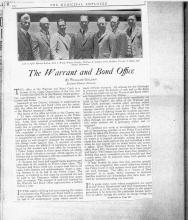
July 7
The Municipal Employee
Shows a photo of 7 men, from left to right they are: Martin Bruton, John J. Ward, Walter Schiller, William P. Golden, Paul Madden, Terence J. Boyle and Arthur Ohnimous.
The Warrant and Bond Officer
By William Golden
Assistant District Attorney
The office of the Warrant and Bond Clerk is a bureau of the Legal Department of the City and County provided for in the Charter, which authorizes appointments to that office and designates its powers and duties.
Inasmuch as the District Attorney is authorized to appoint the Warrant and Bond Clerk and his assistants, the office for all practical purposes is a branch of the District Attorney’s office.
The duties of the office set forth in the Charter are:
- To draw complaints in all actions in the Police Court and to approve the same with his written signature. Aside from the criminal prosecutions initiated by indictment by the Grand Jury, which are comparatively few in number, every other criminal action is begun by the filing of a complaint in the Police Court. The complaint is in affidavit form, setting forth in concise language a statement of the offense committed for complained of which such particularities as to time and place as will properly acquaint the accused with the charge made against him. A warrant of arrest predicated upon the affidavit of complaint is also prepared by the warrant and bond office for issuance by Police Judge except in those cases where an arrest may be made without a warrant, which applies to all felonies and to misdemeanor offenses committed in the presence of an officer or a citizen
- To issue bail bond an appeal bonds, approve and prep them in his custody in Police Court cases. The warrant and Bond Clerk also accepts cash bail in all cases, both felonies and misdemeanors, where a hear to thereon is to be had in the Police Court. The money so received as bail must be accounted for and be paid to the Treasure within twenty-four hours for its receipt. The amount of cash bail handled by t the Warrant and Bond Office approximates a million dollars a year.
The matter of fixing bail and ordering the release of prisoners the Warrant and Bond Clerk is subject the Judges of the Police Court, but is authorized to bail in all misdemeanor cases where arrests are made without warrants. All releases for the discharge of prisoners upon the deposit of cash bail or the filing of bonds are made out by the Warrant and Bond office and transmitted to the City Prison.
In addition to the powers and duties specifically set forth in the Charter, the office of the Warrant and Bond Clerk performs various other services which naturally attend or grow out of the exercise of the express statutory powers and duties. The office has become a sort of clearing house for troubles and complaints of every kind and character, which are referred to the department by the police or which reach the office through the direct application of the individual who seeks redress for grievance either real or imagined.
To facilitated the work of investigating complaints and of determining whether or not Police Court action should be taken the District Attorney has instated a system of sending a citation to the party complained of, where it is deemed advisable, stating that a complaint has been made against him and indicating a time when he may appear and be heard before an action is taken. Since District Attorney Brady has been in office about fifty thousand citation have been issued and heard. The system has been more than justified in finding that many complaints are ill founded and that a great many can be adjusted when both parties are brought together.
It may readily be seen that this practice greatly relieves the congestion that would otherwise result in the Police Court if such matters were sent there without such hearings. The office is a “Court of First Instance” so to speak, where property is restored, families reunited and friendships have been severed by misunderstand are renewed.
In a great many cases where complaints are made to the Police Department and that department has any doubt as to the action to be taken or the proper procedure to be followed ,the particular bureau, detective or officer having the matter in charge brings the…
(Continued on Page 34)
Note: page 34 was not provided.
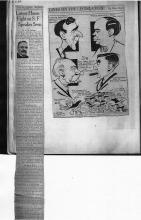
This page displays two news clipping.
First news clipping says:
Lower house Fight on S.F. Speaker Seen
By C. M. Jackson
Arthur L. Ohnimus, San Francisco, chief clerk of the assembly, and Charles H. Wilkinson, San Francisco, its sergeant-at-arms, are both in the field for re-election, and thereby hands a tale of opposition to the election of Edgar C. Levey, San Francisco, as speaker of the lower house. It is reported that a number or members opposed to Levey and representatives from outside counties are using this state of affairs as argument, claiming that “San Francisco wants to hog everything in sight.”
Sheriff Tom Finn is making a heroic effort to adjust matters, it is said, but the friends of Ohnimus and Wilkinson are determined their candidates for their subordinate positions named shall be re-elected, and as they have many friends among the members outside- both having shown their competence – he is not making much progress.
Meanwhile Isaac Jones of Ontario is engaged in an aggressive campaign and is reported as having gained considerable strength at the expense of Bradford S. Crittenden of Tracy, the latter being unacceptable to assemblymen from the populous centers because of his position which respect to rural legislation.
Crittenden is for the county first, last and all the time, and it is claimed that if he should be the compromise candidate, the metropolitan districts would fare badly at his hands in the appointment of committees.
Senate Assignments
Buron S. Fitts, lieutenant governor, has given no public intimation of his selections for committees of the state senate, but it is sad that Senator J. James Hollister of Gaviota will be almost certain to succeed himself as head of the committee on banking, that Pat Gray of San Francisco will again head the committee on civil service. Choice for the judiciary chairman is as yet undecided, with H.C. (“Skipper”) Nelson looming large as a possible successor to Herbert Jones of Santa Clara County, the present chairman. Nelson is now chairman of the committee on revenue and taxation.
This story lacks absolute verification but Fitts believes Nelson an able man as well qualified for the place, although he admitted that giving him the chairmanship of the judiciary and retaining him as chairman of revenue and taxation would be putting a pretty heavy burden on the Eurekan.
Senator Breed, who will no doubt be re-elected president pro tem, will undoubtedly retain the chairmanship of the rules committee, which Senator West of Alameda is said to stand a good show of reappointment to the committee on universities and colleges.
Of course no predictions can be made as to assembly committees until the speakership battled is ended.
Deluge of Bills
The usual deluge of bills is expected, although there seems to be a feeling among the leaders of both houses that nothing but essential legislation should be adopted.
Senators Slater, Nelson, Sharkey, West and others from the northern section have publicly declared opposition to any further tinkering with measures having to do with public morals, the exceptions being a narcotic measure and possibly a limited number of minor matters.
Senator Breed of Alameda, as previously stated, is working with the State Automobile Association on the matter of a gasoline tax for high way purposes and will soon have that matter worked out.
One of the assemblymen from the south has suggested a plan that would make annual appropriation from the general fun of $2,000,000 or $3,000,000 and an amendment to the present gas tax law providing that a certain proportion of the money now raised by direct taxation be used for building new roads.
Under the law as it now stands all the tax money goes for maintenance and repairs.
The alternative plan, and the one that will doubtless be favored in the reed bill, will be to make the tax 3 cents, instead of 2 cents a gallon, the present rate, and use….
* The rest of the article is cut off.
Second newspaper clipping is a comic illustration titled “Lines on the Legislature” by John Argens. It displays a drawing of Arthur Ohnimus, Roy Fellom, Ben Rush and WM. B. Hornblower and at the bottom it shows a group of lobbyists chasing a legislator to symbolize that the lobbyists outnumber the Legislators this session.
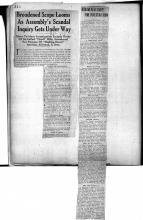
This page displays two newspaper clipping.
First news clipping says:
Broadened Scope Looms as Assembly’s Scandal Inquiry gets Under Way
Move to have investigation include probe of so called “cinch” bills, introduced for purpose of “shaking down” interest affect, is seen
The judgment of legislative investigation into the charges of extortion and counter charges involving alleged efforts to “hold up” Chinese herb interests for thousands of dollars for services in killing assembly bill No. 440 to-day rolled on with the adoption by the assembly of a resolution giving the committee powers to subpoena witnesses, to draw on the contingent fund to the extent of $1,000 for expensive and giving the body the services of a special stenographer.
Other Developments
In addition to this, other development were:
- Indications of a move by the assembly to have the scope of the investigation broadened to include a probe of all bills suspected of being so-called “cinch bills,” including those who have been introduced at session after session and which never got beyond reference to committees.
- A sworn statement by Dr. Fong Wan, Oakland to District Attorney Earl Warren of Alameda County, charging that Senator Edgar S. Hurley was present at his establishment when William Brackett, former assemblyman, demanded $5,000 as the price of having the bill by Assemblyman Edward J. Smith, regulating herb doctors killed.
- Hurley’s denial of Wan’s statement and his declaration that “Warren knows it as well as I do.”
- Denial by Smith that his introduction of the herb doctor bill was inspired by J. E. Hood of Oakland, attorney for the state pharmacy board in narcotic prosecutions and former partner of Smith.
Action is Rapid
The resolution conferring power on the investigating committee was presented by Chairman Sidney T. Graves. It was immediately referred to the contingent expenses committee, which returned a favorable report on it within ten minutes.
The resolution was adopted without opposition, all of the member’s present voting “aye.”
*The rest of the news clipping is cut off.
Second newspaper clipping continues from the first newspaper clipping
Broadened Scope for Investigation
on the resolution. He was absent from the chamber when the roll was called.
Interest in the probe into the Smith bill was heightened with the spread of general comment by members of the assembly that all suspected “cinch” or “gimmie” bills be included in the investigation by the probing body. It is anticipated in some quarters that a resolution to that effect probably will be presented sometime next week.
A Shake-Down Game
Various members pointed out that for years a number of old familiar bills affecting certain industries or occupations have been introduced at each succeeding session. Among veteran members of the legislature these bills are called “cinch
bills are held, frankly, to be introduced solely for the purpose of “shaking down” the interests against which they are directed.
In the present session, veteran legislators assert, practically every old “cinch” bill that has appeared during the last twenty years has again put in appearance, together with a number of suspected new ones.
Hurley in Denial
Reports from Oakland that Fong Wan had made a sworn statement to District Attorney Warren in which he charged that Senator Hurley was present at his place on the occasion when William Brackett, whom Hurley admits having recommended as a lobbyist capable of putting up a stiff against the herb bill, made a demand for payment of $5,000 to be split four-ways between Hurley, Smith, Brackett and “expenses, drew a denial from the senator.
“I have nothing further to add to my previous statements,” Hurley said. “I said I had gone to Wan’s place with Brackett at the latter’s request. There was no mention of money made in my presence.”
More Denials
Other reports from Oakland quoting Smith as having said hi introduction of the mooted herb bill was at the request of his former law partner, Hood, and Hood’s denial, brought a statement from Smith here to-day, denying that he had ever told any person that Hood had influenced him to introduce the bill.
He said he had become interested in the narcotic question through his former association with Hood, who prosecutes such violations in his capacity of attorney for the state pharmacy board.
Hearing Monday
The first formal hearing of the charges involving the Smith bill will take place Monday afternoon at 1:30 o’clock. The committee has not yet decided who will be subpoenaed first, but it is considered probable that Assemblyman Smith will be the last one called.
Because of the rule of “courtesy” between two houses of the legislature, it is not considered probable that the assembly probers will subpoena Senator Hurley. Hurley, however, has voluntarily offered to present himself before the committee at any time he is called.
These to be summoned
Among those who will be called to testify the committee, other than Smith and Hurley, are:
T. Wah Hing, Sacramento herb doctor, who says he has the one who sought to arrange a meeting with Smith through Sergeant-at-Arms Charles Wilkinson, Ong Yuen of Oakland, identified as the mysterious “Mr. Dang,” who presented flowers to the women members of the assembly to Speaker Frank F. Merriam; Fong Wan, Oakland herb doctor, with whom the alleged negotiations for the killing of the herb bill were made at the Oakland end of the alleged conspiracy; a Chinese named Chan, from San Francisco; Wilkinson, who is said by Hing and Yuen to have acted in an adversarial capacity for the Chinese Protective Association here in its efforts to lobby against the bill; Arthur A. Ohnimus, chief clerk of the assembly and William Brackett, former assemblyman, and alleged “go between” in the negotiations with the Chinese of Oakland and San Francisco.
May Call Hornblower
In addition to these, it is considered probably that Assemblyman William Hornblower of San Francisco, charged by Smith with haying been retained as an attorney by the Chinese, and other members of the San Francisco delegation who attended a banquet tendered in their honor by the Chinese, also will be called to testify.
Chairman Graves announced today that district Attorney Earl Warren of Alameda County will be invited to lay before the committee all facts in his possession bearing on the case. Warren also will be asked to be present at some of the hearings.
Because of the ramifications in the alleged extortion plot here, District Attorney J. J. Henderson will be requested to delegate a deputy to attend the hearings.
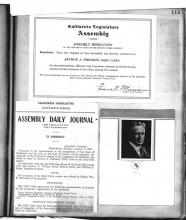
This page displays a certificate, journal and a self-portrait of Governor C.C. Young.
Certificate says:
California Legislature
Assembly
Assembly Resolution
By Mr. Howard W. Davis of the Seventy-Third District
Resolved, That the thanks of the Assembly are hereby tendered to
Arthur A. Ohnimus, Chief Clerk
for the painstaking, efficient and courteous manner in which he has conducted the business of his office during the session.
The above resolution was, on motion of Mr. Howard W. Davis, unanimously adopted by the Assembly April Twenty-Fourth, Nineteen Twenty-Five.
Frank F. Merriam
Speaker of the Assembly
Journal says:
California Legislature
Forty-Sixth Session
Assembly Daily Journal
First Legislative Day.
First Calendar Day.
In Assembly
Assembly Chamber,
Sacramento, Monday, January 5, 1925.
Pursuant to the requirements of the constitution of the State of California and the law, at the hour of twelve o’clock meridian, the Assembly of the forty-sixth session of the Legislature of California was called to order by Arthur A. Ohnimus, Chief Clerk of the forty-fifth session.
In conformity with law, the following officers of the forty-fifth session were also present: C. William Booth, Minute Clerk, and William J. Leflar, Sergeant-at-Arms.
Prayer
By invitation of the Chief Clerk, prayer was offered by Bishop Wm. H. Moreland of Sacramento.
Appointments
The Chief Clerk announced the following appointments of attaches for the temporary organization of the Assembly:
Pages, Theodore, Reindollar, Margaret Hartranft, Frank Vinson.
Stenographers, Madge Cross, Norma M. Brown.
Assistant Sergeants-at-Arms, C. E. Whiteside, Danny Whelan, Chas. H. Wilkinson.
Certificate from Secretary of State
The Chief Clerk read the following certificate of duly elected members of Assembly of the forty-sixth session of the Legislature of the State of California:
Self-Portrait of Governor C.C. Young is displayed on this page.
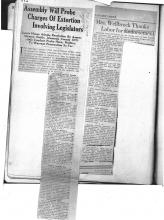
This page displays two newspaper clipping.
First newspaper clipping says:
Assembly Will Probe Charges of Extortion Involving Legislators
Lower House Adopts Resolution by Assemblyman Smith; Alameda County Officials Conduct Probe Here; Nothing to Warrant Prosecution so Far
The legislative scandal which has developed as the result of charges by Chinese herbalists that efforts were made to extort thousands of dollars from them by means of a bill introduced in the assembly by Assemblyman Edward J. Smith of Alameda County, took a sensation turn to-day. The assembly adopted a resolution by Smith providing for a sweeping legislative investigation of the charges, and a counter charge by Smith that Assemblyman William B. Hornblower of San Francisco, an avowed opponent of the measure, had been retained by the Chinese as an attorney.
Alameda County Probe
District Attorney Earl Warren of Alameda County and Chief of Police James Drew of Oakland arrived at the capitol shortly before noon and immediately began their investigation of the attempted extortion and bribery charges.
Those were called before Warren and Drew, who conducted their probe behind closed doors in a committee room, were:
Assemblyman Smith, Senator Edgar J. Hurley, Alameda County, Charles Wilkinson, sergeant-at-arms at the assembly, and Arthur Ohnimus, chief clerk of the assembly.
Smith Offered Money
District Attorney Warren and Drew told newspapermen that Smith informed them that Ohnimus called at the Smith home in Oakland on Lincoln’s birthday and informed him there would be $500 in it for the assemblyman if he did not press the passage of his bill regulating the herb doctors.
Reading from notes, which he had taken during the questioning of witnesses, Warren quoted Smith as saying that he replied to Ohnimus “I could get $5,000 if I wanted it but I am not taking a dime. I am interested in this bill and I am going to try to put it over.”
Ohnimus Explains
Before going into the investigation room, Ohnimus told a group of newspaper representatives that about two weeks ago he and Wilkinson drove to San Francisco for a short visit and stopped at Oakland en route.
“As I always do whenever I go to the city,” Ohnimus stated, “I called on as many of the assembly as possible to see if my work is being carried on all right. We saw Eddie Smith in Oakland and during the conversation, consisting chiefly of the clerical works in the assembly, I mentioned what I had heard in connection with his bill and of rumors heard that there was many in it. This was said in a passing way and I was ‘kidding’ Smith when I said it.”
Nothing Criminal Yet
In a statement made at the close of the inquiry, Warren said that he and Drew expected to put the afternoon in searching for Chinese who had attempted to get in touch with Smith through Wilkinson. He said that the investigation here and the one he has been conducting in Oakland, so for had developed nothing that would warrant the issuance of warrants of arrest.
“I am continuing my investigation,” he said, “and will submit the result of my investigations to the legislative committee that will conduct a probe. Whether the legislative committee exonerates those whose names have been mentioned or not will not interfere with any action I might take as district attorney of Alameda County.”
Sacramento Case
Warren said that if evidence he secures show that some of the acts complained of occurred in Sacrament Count, he would submit that evidence to District Attorney J.J. Henderson for action.
Senator Hurley was called, before Warren and Drew to explain the visit he made with William Brackett of Oakland, a former assembly…
*The rest of news clipping continues to page 15 in the newspaper but that is unavailable.
Second newspaper clipping says:
Mrs. Wellbrock Thanks Labor for Endorsement
Expressing thanks to those of the labor convention who voted for her Mrs. Anna C. Wellbrock today issued the following statement:
“I wish to express my heartfelt thanks to those 64 men and women who voted for me on Tuesday night at the Labor Temple.
“I am proud of those votes, the rank and file will take notice of them-that is certain.
“Those 64 votes are going to help me to ‘Victory’ on Nov. 8. I am more determined than ever to win.”
Platform Announced
Mrs. Wellbrock announces as her platform:
“You cannot make me your first woman supervisor but you can make me your first Native Daughter supervisor.”
Mrs. Wellbrock’s sponsors are:
Lucretia I. Henkel, Robert A. Peabody, Hugo Ernst, Mrs. Rose Hunsicker, Henry F. Buddle, H.F. Kertz, H.J. Kessel, Tom Doyle, C.D. Mull, George Kidwell, Tom Zandt, E.D. Vandeleur, Hazel Cerelli, J.E. Tracy, George L. Suhr, Mrs. J.B. Collins, N. George Wienholz, Mrs. Emma Hofman, Mose Uri and Mrs. Edna Calhan.
Fred Suhr’s headquarters sends this in:
Suhr’s candidacy for supervisor has received a strong endorsement from J.E. Scully, who declares that when Suhr was supervisor, from 1914 to 1922, he was always a champion on the board of the Aquatic Park project, as well as all other measures for the betterment of San Francisco.
Suhr Enclosed
“Among the 26 endorsements received by Suhr to date are San Francisco Funeral Association, Civic League of Improvement Clubs, the liberty League, Market and Guerrero Improvement Association, Retailers Protective Association and the Swedish American Association.
Maurice Dooling, candidate for district attorney, continued to fire his questions at Judge Matthew Brady Thursday night in meetings he attended. “He challenged Brady to tell why he had not tried or prepared a case in the eight years of his incumbency,” say his headquarters. Dooling talked at the Ingleside Community Center, the Board of Produce Exchange and the Lafayette Club.
Arthur Ohnimus, chief clerk of the Assembly and a strong booster of Dist. Atty. Matthew Brady, chides Dooling heavily with this:
“It is regrettable to note that Maurice T. Dooling does not know that the State Legislature met this year. The he does not know the certain legislation (and the) bureau now has been formed and is not functioning 65 days after the act became a law.”
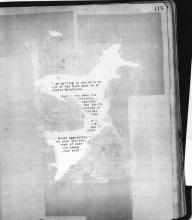
Displayed on this scrapbook page is a severely damage document. Most of the document is damaged and only a few words are shown, so the purpose of the document is not known.
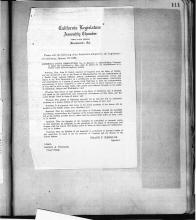
California Legislature
Assembly Chamber
Forty-Fifth Session
Sacramento, Cal.
Please note the following Joint Resolution adopted by the Legislature of California, January 25, 1923.
Assembly Joint Resolution No. 6 – Relative to memorializing Congress to adopt bill introduced by Hon. John E. Raker for the establishment of a Pacific Coast national highway system.
Whereas, Hon. John E. Raker, member of Congress from the State of California, has introduced a bill in the House of Representatives for the establishment of a Pacific Coast national highway system; authorizing examination, survey and report to the War Department, as a preliminary to the improvement, construction and maintenance of a system of motor truck highways to meet the transportation requirements of heavy commerce in time of peace and of heavy ordinance in time of war, and to serve as post roads, with proper and sufficient laterals, in the states of California, Oregon and Washington; and
Whereas, This bill is of vital interest to the State of California and, if adopted, will assist in the agriculture al commercial development of this State and the entire Pacific Coast in times of peace; and
Whereas, The system of highways provided for in this bill will be absolutely necessary to a proper defense of the Pacific Coast in times of war; and
Whereas, It is apparent that many of the world problems of the future will be decided on the Pacific Coast; now, therefore, be it
Resolved, That the Legislature of the State of California, through its Assembly and Senate, memorializes the Congress of the United States to adopt the aforesaid bill at the earliest possible date in order that the project shall suffer no delay; and, be it further.
Resolved, That the Speaker of the Assembly be authorized to transmit copies of this resolution by telegraph, to the governors of the states of Washington and Oregon, with the request that similar action be taken by their respective legislatures; and, be it further
Resolved, That the Speaker of the Assembly be authorized to transmit copies of this resolution, by mail, to all the members of Congress and the Senate of the United States.
Frank F. Merriam
Speaker
Attest:
Arthur A. Ohnimus
Chief Clerk.
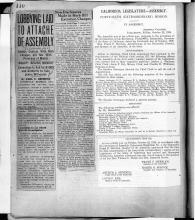
This page displays 2 newspaper clipping and 3 documents.
First newspaper clipping says:
Lobbying and to Attache of Assembly
Admits Contact with Rich Chinese, but Not with Promises of Money
Inquiry Beings Monday
Committee to Ask for $1000 and Authority to Subpoena Witnesses
By Earl C. Behrens
Chronicle Bureau, Sacramento, Feb. 26. – The state Legislature, through a special assembly inquiry committee, will on Monday begin an investigation into the alleged attempts at extortion of money from wealthy Chinese herb doctors by certain members of the Legislature, attaches and former members to kill an anti-herb bill now pending.
The special committee named by Speaker Merriam will ask for a special legislative appropriation of $1000 tomorrow, together with authority to summon witnesses to make a searching inquiry into the case which has stirred up the Legislature.
Committee to Go Ahead with its Investigation
Tomorrow afternoon the special committee, headed by Assemblyman Sidney T. Graves of Los Angeles, will meet and plan the procedure for getting at the facts behind the charges that members of the legislature were trying to “shake down” the Chinese to kill the bill directed at the herb doctors.
As the Assembly Investigating Committee was preparing to go ahead with its work, disclosures that Sergeant-at-Arms Charles H. Wilkenson of San Francisco had been “a frequent visitor to the Chinese Protective Association office” in this city and had acted as a sort of adviser to local Chinese in planning a lobbying campaign against the passage of the bill were made here.
Heretofore Wilkenson, name by
(Continued on Page 4, Col. 2)
Second newspaper clipping continues from first newspaper clipping:
New Disclosures Made in Herb Bill Extortion Charges
(Continued from Page 1, Column 3)
Assemblyman Edward J. Smith, author of the measure, as one of those involved in the tangle, has declared that he “did not know the local Chinese and could not recognized them if he saw them.”
According to T. Wah Hing wealthy Sacramento herb doctor Wilkenson was at the office of the Chinese Protective Association on numerous occasions and employed two stenographers from the Assembly to write letters to all members of the Legislature asking them to vote against the Smith herb bill.
A second development was that Hing acknowledge that he was the Chinese who had Wilkenson telephone to Assemblyman Smith asking the latter to come to Sacramento to talk over the bill, and that Hing was the same person who alter called Wilkenson on the phone and told him to go to the Washington street address in San Francisco’s Chinatown to talk to an “unnamed Chinese” about the Oakland plot against Wilkenson.
Confronted with the Hing statements, Wilkenson admitted that he had visited the local Chinese, but declared that he had not been induced to do so because of promises of “financial reward.”
Hing declared that Chief Clerk Arthur A. Ohnimus of the Assembly, another of those named by Assemblyman Smith, had never been to see him, and that Ohnimus had nothing to do with the negotiations with Wilkenson.
The Chinese puzzle over the herb bill became more involved when it was discovered that Y.T. Dang, the dapper Chinese who placed the floral offerings on the desks of each of the women members of the Assembly the other day, is also known as Ang Yuen on the letterheads of the Chinese Protective Association, Chan Mon of San Francisco is the treasurer of the organization.
The Chinese, stirred up over the herb bill muddle, have discovered that State Senator Edgar S. Hurley of Oakland has an anti-Chinese lottery bill which would subject them to conviction on a felony charge. Hurly said today that he will have the bill amended to make the charge a high misdemeanor instead.
District Attorney Earl Warren of Alameda count, who conducted the first investigation here of the bribe charges against the Legislators, declares that he did not favor the bill commended to Hurley that the crime be made a misdemeanor instead of a felony, as the latter would make convictions impossible.
Senator Hurley also is included in the list of those named by the Chinese in the herb bill discourses.
Senator Hurley said today that he would be glad to go before the special investigating committee and state his side of the controversy on Monday.
First of the 3 documents says:
California Legislature – Assembly
Forty-Sixth (Extraordinary) Session
In Assembly
Assembly Chamber,
Sacramento, Friday, October 22, 1926.
The Assembly met at ten o’clock a.m.., pursuant to the provisions of the proclamation of his Excellency, Friend Wm. Richardson, Governor of the State of California, dated the fourteenth day of October 1926.
Hon. Frank F. Merriam, Assemblyman of the Seventieth District, and Speaker of the Assembly, in the chair.
Announcement
Arthur A. Ohnimus, Chief, Clerk, announced that, pursuant to the requirements of the Political Code, section 237, the following officers of the Assembly of the forty-sixth (regular) session of the Legislature were present and in their respective positions: Arthur A. Ohnimus, Chief Clerk; Louis F. Erb, Minute Clerk, and Charles H. Wilkinson, Sergeant-at-Arms.
The Speaker thereupon directed the Chief Clerk to call the roll of Assemblymen.
The roll was called, and the following members of the Assembly answered to their names:
Adams. Anderson, D.P., Anderson R. J., Badham, Bernard, Brock, Broughton, Browne, Burns, Byrne, Campbell, Carter, Cleveland, Cloudman, Coombs, Crittenden, Croter, Davis, Dayton, Deuel, Dillinger, Dorris, Easley, Finney, Foster, Fry, Graves, Hartranft, Hawes, Heisinger, Hornblower, Jacobson, Johnson, Jones, Jost, Levey, Little, Louttit, Lyons, McDonough, McDowell, McPherson, Melville, Miller, Eleanor; Oliva, Pierce, Reindollar, Roberts, Roland, Rosenshine, Runner, Saylor, Scofield, Scudder, Sewell, Smith, Spalding, Spence, Walters, Weller, Wemple, West, Williamson, Woodbridge, Wright, S.V., Wright, T.M., and Mr. Speaker – 76.
The Speaker thereupon declared a quorum present.
Second of the 3 documents:
Resolution
The following resolution was offered:
By Mr. Rosenshine:
Resolved, That the following named person constitute the officers of the Assembly with the per diem as fixed by the statue:
Honorable Frank F. Merriam, Speaker:
Honorable Homer R. Spence, Speaker pro tempore;
Arthur A. Ohnimus, Chief Clerk;
Louis F. Erb, Minute Clerk;
Charles Wilkinson, Sergeant-at-Arms;
Dr. Rudolph I. Coffee, Chaplain;
Edwin C. Lynch, First Assistant Clerk;
And be if further
Resolved, That the State controller be and he is hereby by directed to draw his
Third of the 3 documents:
Adjournment Sine Die.
At two o’clock p.m. on Friday, October 22, 1926, in accordance with the provisions of Assembly Concurrent Resolution No. 1, the Honorable Frank F. Merriam, Speaker of the Assembly, announced that the time for final adjournment of the forty-sixth (extraordinary) session of the Legislature of the State of California had arrived and thereupon declared the Assembly adjourned sine die, out of respect to the memory of the late Hon. Thomas L. Dodge and Hon. Bismarck Bruck.
Frank F. Merriam,
Speaker of the Assembly.
Homer R. Spence,
Speaker pro tempore of Assembly.
Arthur A. Ohnimus
Chief Clerk of the Assembly.
Louis F. Erb,
Minute Clerk of Assembly.
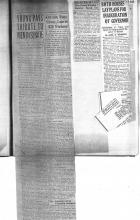
There is 3 newspaper clipping displayed on this page.
First Newspaper Clipping says:
Young Pays Tribute to Me in Senate
Expects to have ‘Fine Time’ as Governor, He says, as he presides for last Time at Session
Assemblyman Isaac Jones of Ontario.
Both these candidates were put in to save the face of two small groups in the Legislature which had refused to accept the candidacy of the San Francisco member.
Part of this was due to the fact that some of the rural district members had been declaring their fear that they would not get a run for their money in the rural plan of reapportionment which is to come by vote of the people in November to the Legislature. Nearly all of another group refused to accept Levey because he was not aligned with the “drys” in the Lower House led by Assemblyman T. M. Wright, author of the Wright State prohibition enforcement act.
No Chance to Win
There is thus accounted for in the one instance Crittenden and in the other Jones. They allowed their names to be sent in, although it was well known last night that neither of them had a chance to win.
On the other side of the picture Ray Williamson, Assemblyman, of San Francisco in putting Levey in nomination, asserted flatly and unequivocally that they of San Francisco accepted the vote on reapportionment as a mandate of the people, and that they would vote according to that mandate when the time comes. This was affirmed by Levey himself after he was elected.
The roll call upon the speakership follows:
For Levey – R. J. Anderson, Baum, Bishop, Burns, Byrne, Carter, Cloudman, Crawford, Croter, Deuel, Duval, Easley, Feigenbaum, Finley, Fisher, Flynn, Foster, Fry, Gant, Hawes, Hedges, Hornblower, Jacobson, Jewett, Jost, Keaton, Kelsey, Lenehan, Levey, Lyons, McDonough, McPherson, Melville, James A. Miller, Mixter, Morrison, Murphy, Nielsen, Noyes, Oliva, Parkman, Patterson, Reindollar, Roberts, Rochester, Roland, Scofield, Scudder, Sewell, Smith, Snyder, Spalding, Walters, Williams, Williamson, Witter, Woolwine – 57.
For Crittenden – Adams, D. P. Anderson, Bernard, Clowdsley, Dillinger, Heisinger, Jones, Leymel, Wemple, West, Woodbridge – 11.
After the roll call, the Assembly made it “unanimous” for Levey.
Levey’s nomination was seconded by Assemblymen William M. Byrne of Los Angeles, Jerome B. Scofield of Huntington Park, and Charles F. Reindollar of San Rafael.
Three “Dry” Leaders
Dr. C. D. Ball of Santa Ana offered Jones with T. M. Wright of San Jose and Assemblywoman Miller of Pasadena seconding. The three are accounted “dry” leaders.
Assemblyman E. G. Adams of Livingston presented Crittenden, whose other sponsors were Assemblyman Percey West of Sacramento and Van Bernard of Butte city.
The new speaker pledge himself to work in harmony with the incoming administration.
“We are all of us in line with the administration,” said Speaker Levey, “there are no animosities. There is every desire, I am confident, that we shall work together for the best interests of the State and to forward the work which our new State government will have before us.”
Speaker Levey noted that the three candidates for speaker were supporters of Governor-elect C.C. Young and he observed that there was on his own part the strongest desire to see the administration accomplish results.
“Boys” Send Flowers
He declared that there would be a fair and equitable assignment to committees and that nothing but the best of feeling should prevail in this session over which he will preside in the Lower House.
A great basket of cut flowers was present to the new Speaker as from the “South of Market” boys in the Legislature, of which he is one.
Senator T.A. Maloney, Senator Daniel C. Murphy, Assemblymen Williamson “Bob” Fry, James C.
*Bottom of the news clipping is cut off.
Continues to next part:
accorded to their speakership candidate, that the second place should go to the south.
Other Officers
Arthur A. Ohnimus of San Francisco was re-elected chief clerk for the eight consecutive regular and extra sessions.
Louis Erb of San Francisco was chosen minute clerk and C. William Booth of Oakland assistant clerk.
William J. McQuilinan of Sacramento was elected sergeant-at-arms. He was opposed by Arthur Ferguson. The chaplain elected was Rev. A. Watson Brown, Baptist clergyman of Sacramento.
There was one vacant place in the Assembly marked by a wreath upon the desk of Assemblyman A. C. Murray of Riverside, who was killed in an automobile accident near Bakersfield last month, and the body adjourned for the day out of respect to his memory.
In the Senate, the opening was observed by the participation as presiding officer of Lieutenant Governor and Governor-elect C. C. Young, who was given a huge round of applause from the Senators as he walked briskly to the presiding officer’s place which he has occupied for the last eight years. Tomorrow he becomes Governor. He was accompanied by Lieutenant-Governor-elect Buron Fitts of Los Angeles, who sat on the rostrum until after the departing official had turned over the Senate to Senator Arthur H. Breed, elected unanimously as president pro tempore of the body.
Sees “Fine Time”
Lieutenant- Governor Young expressed his appreciation of the reception which the Senate had accorded him. He spoke of the happiness which has been his during his two terms as its presiding officer. He paid a graceful tribute to the members in that “their courtesy and forbearance” had made possible the pleasant associations and experiences of the years he had been with them.
“I expect to have a fine time,” said the Governor-elect, “when I go downstairs tomorrow into the new office. But it will be with the remembrance of the happy days I spent in this chamber with you. I thank you all.”
He stepped away after greeting Senator Breed, made a brief stay in the Capitol and then returned to this hotel where he will remain until after his inauguration. The new governor will take up residence in the gubernatorial mansion with his family.
Mrs. Young will join him with their two daughters, who will enter Sacramento schools, it is understood.
Their home has been for many years in Berkeley.
Predicts Harmony
“We are going to have an administration of harmony,” predicted Senator Breed as he took the gavel. This is the eight consecutive term in which the Alameda county solon has served in capacity of president pro tempore.
The Senate elected the Rev. Bryant Wilson of Sacrament as chaplain thus bringing to the fore a companion in arms in the World War with Lieutenant-Governor-elect Fitts who will be sworn in tomorrow. Wilson and Fitts served together in the 364th Infantry, of the Ninety-first Division. The clergyman was decorated for bravery in action.
Joseph A. Beek of Orange country was re-elected secretary. Joseph F. Nolan of Los Angeles as sergeant-at-arms, and H.J. Powers of Eagleville, as minute clerk.
Two Assemblywomen Presented Bouquets
Examiner Bureau, Sacramento, Jan. 3. –The two women members of the Legislature today were honored by the presentation of quantities of floral pieces and bouquets that adorned their desks in the Assembly chamber. These two are Assemblywoman Mrs. Cora M. Woodbridge of Roseville and Assemblywoman Eleanor Miller of…
*The rest of news clipping is cut off.
Krassin, Russ Envoy, Leaves $25 ‘Fortune’
London, Jan. 3. – (AP) - Five one-pound notes, or about $25, were the total assets left by Leonid Krassin, Soviet envoy to Great Britain, who died recently, Soviet officials said today. Since his death, estimates have been made in the newspapers that his estate was between £2,000,000 and £3,000,000, but the Soviet officials said that he owned no property whatever.
Second Newspaper Clipping:
Only 61 Bills of 1,179 Have Passed Assembly; Governor Signed Ten
Out of a total of 1,179 bills introduced in the assembly up to adjournment yesterday afternoon, but sixty-one had been passed, a compilation prepared by Chief Clerk Arthur A. Ohnimus of the assembly revealed. Of those passed, but ten had been signed by Governor C.C. Young.
Ohnimus’ compilation showed that at the beginning of the constitutional recess this year there were twenty-five less bills before the assembly than at the same period in the 1925 session. The figures were, respectively, 1,147 and 1,172.
Less Bills This Year
While a total of 1,179 bills had been introduced in the assembly up to last night, the number that had been introduced on the corresponding date in the 1924 session was 1,216, or thirty-seven more.
A check of the situation in the assembly showed that because of the constitutional provision prohibiting the introduction of more than two bills by any one member during the latter part of the legislative session, the maximum number that could be introduced between opening of the session this morning and the final adjournment would be limited to ninety.
Third Newspaper Clipping:
Both Houses lay Plans for Inauguration of Governor
Crittenden of Tracy and Jones of Ontario Each Receive 11 Ballots
By Earl C. Behrens
Special Dispatch to the Chronicle
Chronicle Bureau, Sacramento, Jan. 3. – Organization of both houses of the State Legislature was effected here today following the election of Assemblyman Edgar C. Levey of San Francisco as Speaker of the Lower House in the only contest of any consequence and the selection of officers for both the Senate and Assembly shortly after noontime.
Levey, first San Francisco Assemblyman to be chosen Speaker of the Assembly since Arthur Frisk occupied that position in 1903, won out by a vote of 57 to 11 ballots each for Assemblyman Bradford S. Crittenden of Tracy and Isaac Jones of Ontario.
The landslide to Levey was predicted beforehand and hence occasioned little comment.
Inauguration Tomorrow
While both houses of the Legislature were choosing officers for the forty-seventh regular session, the plans were being completed in other parts of the Capitol for the inauguration tomorrow at 2 o’clock of Governor-elect Clement Calhoun Young and Lieutenant-Governor-elect Buron R. Fitts.
Young, as Lieutenant-Governor, called the Senate to order and presided over the session of that body while organization plans were getting under way. On the Assembly side Chief Clerk Arthur A Ohnimus presided…
*The rest of the news clipping is cut off.
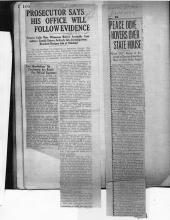
There is 3 newspaper clipping displayed on this page.
First newspaper clipping says:
Prosecutor says his Office will Follow Evidence
Craves Calls Nine Witnesses before Assembly Committee; Senate Enters Actively into Investigation; Brackett Resigns Job at Oakland
The far-reaching investigation of extortion charges relative to “cinch” bills in the state legislature took another turn yesterday when District Attorney J.J. Henderson of Sacramento County announced his office will attend the hearings to be conducted by the assembly committee appointed for that purpose.
Henderson said a representative of his office will be in attendance at all hearings at the state capitol.
Sidney T. Graves, chairman of the committee, yesterday subpoenaed nine persons to be questioned in connection with charges of extortion and bribery surrounding the Smith bills relating to the use and sale of herbs for medicinal purposes.
The following were named in subpoenas issued by Graves:
Dr. Fong Wan, Oakland herb practitioner, who is said to have made charges of extortion to the Alameda county authorities; T. Wah Hing, Sacramento herb dealer; Y.T. Dang, secretary of the Chinese protective association; Lee See, Fong Y. San, Dr. Y. L. Chan, other Chinese herbists; former Assemblyman William Brackett, Oakland; J. E. Hood, Oakland attorney, and Charles Wilkinson, assembly sergeant at arms.
Ohnimus Invited
Arthur A. Ohnimus, chief clerk of the assembly, who was previously questioned, was invited to appear before the committee.
District Attorney Earl Warren of Alameda county and Police Chief Drew of Oakland were asked also to appear to testify and provide the committee when a transcript of any testimony taken in their investigation.
The charges which involve Assemblyman Eddie Emith, Senator Edgar Hurley and Arthur Ohnimus and Charles Wilkinson, chief clerk and sergeant at arms of the assembly, respectively, will be investigated indirectly by the senate as well as the assembly.
This decision was reached when a resolution introduced by Senator Phil Swing of San Bernardino, calling for the appointment of a committee of seven members to investigate the activities of the lobbyists was adopted. The resolution grants the committee permission to appropriate $500 from the contingent fund to carry on investigations of bills if the committee deems such a course advisable.
Plot Admitted
An admission that… “double crossed” former Assemblyman William Brackett in a plot whereby he was to pay Brackett a large sum of money if the former legislator would use his influence to quash a proposed bill against Chinese herb doctors in the state legislature, was made to District Attorney Warren in Oakland yesterday by Fong Wan, one of the doctors in question.
In a conference yesterday in Fong Wan’s office between the doctor, the district attorney and Brackett, the doctor said, according to the district attorney, that Brackett had approached him on the proposition, and he had notified the authorities as soon as possible thereafter. A Dictaphone was thereupon fitted up in the room where the money was to be passed.
Brackett “Tipped”
Before the date set for this transaction, however, Fong Wan notified Brackett that the authorities had knowledge of the plot, and Brackett therefore did not show up to receive the money.
After the conference a further…
(Continued on page two, col. Two)
*Rest of the news clipping is not available.
Second News clipping says:
Two Resolutions on Parchment are ready for Official Signature
Two resolutions, printed on parchment and hand illuminated in attractive colors, were presented today to Speaker Edgar C. Levey and Chief Clerk Arthur A. Ohnimus of the assembly for their signatures.
One, a resolution presented by Assemblywoman Cora Woodbridge during the first part of the session and unanimously adopted, provides for the dedication of California’s building at the transcontinental highway exposition to be held in Reno, Nevada, to the men and women who made the supreme sacrifice in all wars in which the United States are engaged.
The other is the resolution of condolence on the death of the late Assemblyman Alfred C. Murray of Riverside, who, with his wife and one child, met death last December while en route in an automobile to Sacramento for the legislative session.
Both resolutions, which were turned out by the state printing plant under the supervision of State Printer Charles Whitmore, were illuminated by hand by Alexander Crossan, job foreman at the plant. Both are bound in leather covers and are declared to be the finest works of the print’s art ever turned out by the state printing office.
The leather-bound resolution relative to the dedication of the California building at the Reno exposition will be forwarded tomorrow to the Nevada legislature. A duplicate will be sent the Reno legion post. The one relative to the death of Murray will be forwarded to his family.
Third Newspaper clipping says:
Peace Dove Hovers Over State House
“Cinch Bill” Report is expected to stand as submitted; Move to Oust Aides Fought
Examiner Bureau, Sacramento, March 7. – Peace tokens made their appearance in the Assembly today. There is every indication that the attack on “cinch bills” and the reprimand of Chief Clerk Arthur A. Ohnimus and Sergeant-at-Arms Charles H. Wilkinson by the Assembly special committee investigating charges of extortion attempts in connection with Assemblyman Edward J. Smith’s Chinese herb bill will stand as originally submitted.
Prospects of a battle over the report became remote today when Chairman Sidney Graves of the special committee definitely asserted that he will “personally oppose any attempt to force the resignations of either Ohnimus or Wilkinson.”
Graves said the entire committee will back him in this. It further became known that the bay district delegations are ready to fight to the finish against any move to oust the two attaches, both of whom are from San Francisco.
Testimony Reviewed
Reviewing the testimony of Chinese herb dealers who claim that former Assemblyman William Brackett solicited a $5,000 bribe from them to be used in killing Smith’s herb bill and the counter testimony of Brackett who denied the charge and of Smith and Senator Edgar S. Hurley, who asserted innocence insofar as the allegations involved them, Graves maintained that the report of his committee is “a fair, just and unbiased statement of the facts as we found them.”
“We felt obliged to reprimand the two employees of the Assembly who had engaged themselves in this matter,” he said, “but none of the members of the committee feels that Ohnimus or Wilkinson deserve to be removed from office. If the committee had felt that the evidence demanded discharge of any of the employees of the House, the report would certainly have recommended such action.”
Condemnation Stressed
The chairman then stressed the importance of the committee’s condemnation of “cinch bills.”
It was our definite purpose in this report to discourage “cinch bills” of every type, to discourage activities of the employees of the Assembly on all bills, and to lay down a direct rule of procedure for employees who have reason to believe there is anything the matter with a bill introduced before the House. In the elimination of “cinch bills,” we hope all believe that our endeavor will prove beneficial.
Through the committee’s report is set for consideration by the Assembly on Monday afternoon, there appeared to be a disposition among members tonight to leave the matter where it now stands. With Assemblyman Smith exonerated of misconduct in connection with the outstanding Chinese charge of attempted extortion and Ohnimus and Wilkinson censured for their part in the case, a majority of the House is expected to discourage further action as unnecessary.
As the committee’s report contains no definite recommendations, the rules of the Assembly will permit it remaining on file without a formal vote accepting or rejecting it. There it will stay, it was said in several quarters tonight, unless an ouster movement is unexpectedly aimed at Ohnimus and Wilkinson
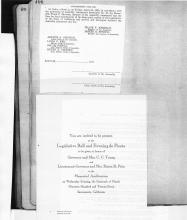
This page displays a partial adjournment sine die document and an invitation card.
First is a partial adjournment sine die, it says:
Adjournment Sine Die.
At twelve o’clock p.m. on Friday, April 24, 1925, in accordance with the provisions of Assembly Concurrent Resolution No. 15, the Honorable Frank F. Merriam, Speaker of the Assembly, announced that the time for final adjournment of the forty-sixth session of the Legislature of the State of California had arrived and thereupon declared the Assembly adjourned sine die.
Frank F. Merriam
Speaker of the Assembly.
Homer R. Spence,
Speaker pro tempore of Assembly.
Arthur A. Ohnimus
Chief Clerk of the Assembly.
Louis F. Erb,
Minute Clerk of Assembly.
Oscar Norell,
Asst. Minute Clerk of Assembly.
Henry R. Nielsen,
Asst. Minute Clerk of Assembly.
Approved ---------------------------, 1925.
-----------------------------------------------------
Speak of the Assembly.
-----------------------------------------------------
Chief Clerk of the Assembly.
Invitation card says:
You are invited to be present
at the
Legislative Ball and Evening de Fiesta
to be given in honor of
Governor and Mrs. C.C. Young
And
Lieutenant-Governor and Mrs. Buron R. Fitts
In the
Memorial Auditorium
on Wednesday Evening, the Sixteenth of March
Nineteen Hundred and Twenty-Seven
Sacramento, California

This page displays 3 different partial Daily Assembly Journals.
First partial Daily Assembly Journal:
Nominations Closed.
Mr. Frank L. Eksward moved that nominations for Speaker for now closed.
The motion was seconded by Mr. Harry Lyons.
Motion carried.
Nominations closed.
Election of Speaker
The roll was called with the following result:
For Hon. Frank F. Merriam of Long Beach – Anderson, R.J., Badham, Brock, Browne, Carter, Cleveland, Cloudman, Coombs, Davis, Dayton, Deuel, Dillinger, Dodge, Duval, Easley, Eksward, Foster, Graves, Hartranft, Johnson, Jost, Little, Lyons, McPherson, Melville, Merriam, Mixter, Murphy, Noyes, Pierce, Roberts, Scofield, Scudder, Sewell, Smith, Spalding, Walters, Weller, Wemple, and Wright, S.V. – 40.
For Hon. Isaac Jones of Ontario – Adams, Anderson, D.P., Bernard, Broughton, Burns, Byrne, Campbell, Crittenden, Croter, Dorris, Finney, Fry, Hawes, Heisinger, Hornblower, Jacobson, Jones, Levey McDonough, McDowell, Miller, Eleanor; Miller, J. A., Mitchell, Morrison, Mueller, Murray, Nielsen, Oliva, Reindollar, Roland, Rosenshine, Runner, Saylor, Schmidt, Spence, West, Williamson, Woodbridge, and Wright, T. M. – 39.
The Chief Clerk announced the vote of the Assembly, and declared Hon. Frank F. Merriam the choice of the Assembly for Speaker.
Motion to Make Election Unanimous.
Mr. Isaac Jones moved that the election of Hon. Frank F. Merriam for Speaker of the Assembly be made unanimous.
Mr. Homer Spence seconded the motion.
Motion carried.
Appointments of Committee of Escort.
The Chief Clerk appointed Messrs. Roscoe J. Anderson, Frank C. Weller and Robert B. McPherson a special committee to escort Speaker-elect Hon. Frank F. Merriam to the chair.
Second partial Daily Assembly Journal:
Announcement
The Chief Clerk announced that in accordance with the power vested in him by the statutes he had appointed Mr. C. William Booth of Oakland Assistant Clerk of the Assembly at the per diem provided by law, and respectfully asked that the Assembly confirm said appointment.
The question being upon the confirmation of the appointment.
The roll was called, with the following result:
For C. William Booth of Oakland – Adams, Anderson, D. P., Anderson, R. J., Badham, Bernard, Brock, Broughton, Browne, Burns, Byrne, Campbell, Carter, Cleveland, Cloudman, Coombs, Crittenden, Croter, Davis, Dayton, Deuel, Dillinger, Dodge, Dorris, Duval, Easley, Eksward, Foster, Fry, Graves, Hartranft, Hawes, Heisinger, Hornblower, Jacobson, Johnson, Jones, Jost, Levey, Little, Lyons, McDonough, McDowell, McPherson, Melville, Miller, Eleanor; Miller, J. A., Mitchell, Mixter, Morrison, Mueller, Murphy, Murray, Nielsen, Noyes, Oliva, Pierce, Reindollar, Roberts, Roland, Rosenshine, Runner, Saylor, Schmidt, Scofield, Scudder, Sewell, Smith, Spalding, Spence, Walters, Weller, West, Williamson, Woodbridge, Wright, S. V., Wright, T. M., and Mr. Speaker – 77.
Third partial Daily Assembly Journal:
6 Assembly Daily Journal [Monday, Jan.5, 1925
Election of Chief Clerk
The roll was called, with the following result:
For Arthur A. Ohnimus of San Francisco - Adams, Anderson, D. P., Anderson, R. J., Badham, Bernard, Brock, Broughton, Browne, Burns, Byrne, Carter, Cloudman, Coombs, Crittenden, Croter, Davis, Dayton, Deuel, Dillinger, Dodge, Dorris, Duval, Easley, Eksward, Finney, Foster, Fry, Graves, Hartranft, Hawes, Heisinger, Hornblower, Jacobson, Johnson, Jones, Jost, Levey, Little, Lyons, McDonough, McDowell, McPherson, Melville, Miller, Eleanor; Miller, J. A., Mitchell, Mixter, Morrison, Mueller, Murphy, Murray, Nielsen, Noyes, Oliva, Pierce, Reindollar, Roberts, Roland, Rosenshine, Runner, Saylor, Schmidt, Scofield, Scudder, Sewell, Smith, Spalding, Spence, Walters, Weller, West, Williamson, Woodbridge, Wright, S. V., Wright, T. M., and Mr. Speaker – 77.
Mr. Arthur A. Ohnimus, being the choice of the Assembly, was declared duly elected Chief Clerk of the Assembly.
Oath of Office Administered
Mr. Arthur A. Ohnimus appeared before the bar of the Assembly, and took and subscribed to the following oath of office administered by William M. Finch, Presiding Justice of the Third District Court of Appeal:
I do solemnly swear that I will support the constitution of the United States and the constitution of the State of California, and discharge the duties of the office of Chief Clerk of the Assembly to the best of my ability.
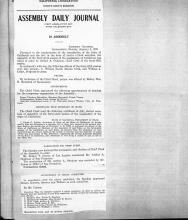
This page displays 3 different partial Assembly Daily Journals.
First partial Assembly Daily Journal:
California Legislature
Forty-Sixth Session
Assembly Daily Journal
First Legislative Day.
First Calendar Day.
In Assembly
Assembly Chamber,
Sacramento, Monday, January 5, 1925.
Pursuant to the requirements of the constitution of the State of California and the law, at the hour of twelve o’clock meridian, the Assembly of the forty-sixth session of the Legislature of California was called to order by Arthur A. Ohnimus, Chief Clerk of the forty-fifth session.
In conformity with law, the following officers of the forty-fifth session were also present: C. William Booth, Minute Clerk, and William J. Leflar, Sergeant-at-Arms.
Prayer
By invitation of the Chief Clerk, prayer was offered by Bishop Wm. H. Moreland of Sacramento.
Appointments
The Chief Clerk announced the following appointments of attaches for the temporary organization of the Assembly:
Pages, Theodore Reindollar, Margaret Hartranft, Frank Vinson.
Stenographers, Madge Cross, Norma M. Brown.
Assistant Sergeant-at-Arms, C. E. Whiteside, Danny Whelan, Chas. H. Wilkinson.
Certificate from Secretary of State
The Chief Clerk read the following certificate of duly elected members of Assembly of the forty-sixth session of the Legislature of the State of California:
State of California, Department of State.
I, Frank C. Jordan, Secretary of State of the State of California, do hereby certify that the following is a complete list of those duly elected at the general election, held on the fourth day of November, A. D. 1924, to represent the people of the State of California as Members of Assembly of said State at the forty-sixth session of the Legislature of said State, as appears from the statement of vote, received from the county clerks of the country or counties and the registrar of voters of the city and county of San Francisco, comprising the several Assembly Districts of the State of California, said statement of vote being a record of and on file my office, viz:
Second partial Assembly Daily Journal:
Nominations for Chief Clerk
The Speaker now declared the nomination and election of Chief Clerk of the Assembly in order.
Mr. Sidney T. Graves of Los Angeles nominated Mr. Arthur A. Ohnimus of San Francisco.
The nomination of Mr. Arthur A. Ohnimus was seconded by Mr. James A. Miller of San Francisco.
Nominations closed.
Third partial Assembly Daily Journal:
Appointment of Select Committee
In accordance with the above resolution, the Speaker appointed Messrs. Roberts, Browne and Walters as such committee.
By Mr. Carter:
Resolved, That the Speaker appoint a select committee of three to inform the Senate that the Assembly is now duly organized, having elected the following statutory officers:
- Speaker, Hon. Frank F. Merriam.
- Speaker pro tempore, Hon. Homer R. Spence.
- Chief Clerk, Arthur A. Ohnimus.
- Minute Clerk, Louis F. Erb.
- Sergeant-at-Arms, Charles H. Wilkinson.
- Chaplain, Dr. Rudolph I. Coffee.
Resolution read, and on motion adopted.
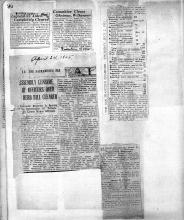
This page displays 5 separate newspaper clipping:
First newspaper clipping says:
Legislative Aides Completely Cleared
Sacramento, April 23 – Arthur Ohnimus and Charles Wilkensen, chief clerk and sergeant-at-arms of the assembly respectively, were today completely exonerated of being involved in charges of extortion made during the early part of the session in connection with the Chinese herb bill by a statement presented to the assembly today by the committee which conducted the inquiry.
Second newspaper clipping says:
Committee Clears Ohnimus, Wilkensen
Sacramento, April 24 – (The Associated Press.) – Arthur Ohnimus and Charles Wilkensen, chief clerk and sergeant-at-Arms of the Assembly respectively, today stood completely exonerated of being involved in charges of extortion made during the early part of the session in connection with the Chinese herb bill by a statement presented to the assembly today by the committee which conducted the inquiry.
The investigating committee’s report previously submitted to the Legislature cleared all person involved except Wilkensen and Ohnimus.
Bulletin April 24, 1925
Third Newspaper Clipping says:
14 The Sacramento Bee April 24, 1925
Assembly Censure of Officers over Herb Bill Cleared
Dramatic Surprise is sprung in Ceremonies of Tribute to Lower House Officials
Forgetting for the time being that considerably more than 100 senate bills were on file awaiting action on third reading, the assembly yesterday afternoon paused in its business of law making for an hour and a half to pay tribute to Speaker Frank F. Merriam, Speaker Pro Tem Homer Spence, Chief Clerk Arthur A. Ohnimus and Sergeant-at-Arms Charles Wilkinson.
Merriam and Mrs. Merriam were presented with a handsome chest of table silver, Spence received a silver cigarette case and Ohnimus and Wilkinson each was presented with a gold-trimmed leather billfold.
Spring Dramatic Surprise
The ceremonies which included addresses in which the assembly officers singled out for the felicitation were landed were features, included a rather dramatic surprise when, during the address of Assemblyman Frank L. Coombs, he made public the fact that members of the assembly investigating committee which conducted the probe into charges of alleged extortion of Chinese herb doctors in connection with Assemblyman Edward Smith’s now famous Chinese herb bill, had prepared a resolution exoneration both Ohnimus and Wilkinson of all suspicion of wrong-doing in connection with the herb bill scandal.
The Exoneration
The resolution, which was signed by all members of the investigating committee, Chairman Sidney T. Graves, Isaac Jones, George C. Cleveland, T. M. Wright and Coombs, is as follows:
“Whereas, Under a resolution of his house, the undersigned members were appointed a committee to investigate, among other matters the conduct of the officers of this house with reference to assembly bill No. 440, and
“Whereas, The committee submitted its report in which the conduct of Arthur A. Ohnimus and Charles Wilkinson, chief clerk and sergeant-at-arms of the assembly respectively, was criticized; and
“Whereas, Since submitting said report the members of this committee have observed, and appreciated the conduct of said officers, they, said members, are free to say that said conduct has been exemplary in all respects; that said officers have discharged their several duties with honesty, ability and fidelity, and that they are now entitled to all the benefits and esteem to follow good conduct and faithful service.”
The ceremonies began when Spence announced that by unanimous consent of the assembly had been declared to “arrest” the speaker and relieve him of his gavel temporarily. Spence, as speaker pro tem, ordered a recess, and called Assemblyman Frank W. Mixter to preside as chairman.
“Animosities Forgotten.”
Assemblyman Frank Weller eulogized Speaker Merriam, declaring that as the session drew near to its close, personal feelings and animosities were forgotten.
Merriam responded with a brief, address, in which he declared the most valued gift was that of the friendship and esteem of his fellow assemblyman.
Mrs. Merriam, too, made a brief talk, in which she expressed her appreciation of the honor shown her husband.
Spence is praised
Assemblyman Albert A. Rosenshine paid tribute to the abilities and honesty of purpose, which he said, characterized the legislative work of Speaker Pro Tem Spence. He presented Spence with the cigarette case.
Spence replied briefly, along similar lines to those followed by Merriam.
Assemblyman Jones paid tribute to the work of Sergeant-at-Arms Wilkinson, and made the presentation to him.
Third newspaper clipping says:
The San Francisco Examiner: Thursday, July 2, 1925
This is the statistical record of the forty-sixth session of the State Legislature as issued yesterday with the final calendar of legislative business.
Senate bills introduced------------ 833
Assembly bills introduced ----- 1,318
Sub Total: ------------------------2,151
Senate constitutional amendments ----- 42
Senate concurrent resolutions ---------- 27
Senate joint resolutions ------------------28
Sub Total: --------------------------------- 97
Assembly constitutional amendments --- 37
Assembly concurrent resolutions ---------28
Assembly joint resolutions ----------------20
Sub Total: ------------------------------------85
Grand Total: -------------------------------2,333
Bills presented to Governor:
From Senate ------------------------------ 365
From Assembly -------------------------- 634
Total: -------------------------------------- 999
Filed with Secretary of State:
Senate constitutional amendments -------- 10
Senate concurrent resolutions -------------- 22
Senate joint resolutions --------------------- 9
Assembly constitutional amendments ---- 8
Assembly concurrent resolutions --------- 22
Assembly joint resolutions ----------------- 9
Total: ------------------------------------------ 80
Action by Governor:
Total Senate bills signed ------------------ 172
Total Assembly bills signed -------------- 308
Senate bills vetoed ------------------------- 27
Senate bills pocketed ---------------------- 166
Assembly bills pocketed ------------------ 264
The calendar carries the history and index of all Senate and Assembly bills introduced with complete data on officers, members, standing committees and attaches of both houses. The document was compiled under direction of Joseph A. Beek, secretary of the Senate, and Arthur A. Ohnimus, Chief Clerk of the Assembly, it is a comprehensive record of the session which adjourned on April 24, having sat eighty legislative days.
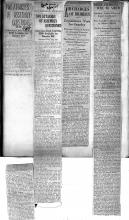
This page displays 4 separate newspaper clippings.
First newspaper clipping:
Two Attaches of Assembly Questioned
Solon says Clerk told him $500 Available for Narcotic Bill
Charges that members of the state legislature were involved in alleged extortion of Oakland Chinese who desired the defeat of a bill affecting the sale and use of herbs by practitioners took a sensational turn yesterday when attaches of the assembly became involved and an investigation committee was appointed by Speaker Frank F. Merriam.
Arthur Ohnimus, chief clerk of the assembly and Charles Wilkinson, sergeant-at-arms of the assembly were swept into the probe when testimony involving their names was introduced by Assemblyman Eddie Smith of Oakland, and Senator Edgar Hurley of Oakland, who were called before District Attorney Earl Warren of Alameda County and Chief of Police James T. Drew of Oakland.
Smith told the Alameda officials that Ohnimus visited him in Oakland
(Continued on page two, col. Five)
Second newspaper clipping continues from the first newspaper clipping:
(Continued from page one)
on Lincoln’s birthday and informed him that he could get $500 of he did not press the passage of his bill. According to District Attorney Warren, Smith said he made the following reply:
“I could get $5,000 if I wanted it, but I am not taking a dime. I am interested in this bill and am going to try to put it over.”
Denies Charges
William Brackett, former assemblyman of Oakland, also involved in the charges, is alleged to have attempted extortion, although in Oakland yesterday he denied the charges and said any money he was to have received was to be paid him as a lobbyist to fight against the passage of the herb bill introduced by Smith during the first half of the legislative session.
Sidney Graves of Los Angeles was appointed chairman of the investigating committee of five members. The other four members of the committees are:
Frank Coombs, Napa; T. M. Wright, San Jose; George C. Cleveland, Watsonville, and Isaac Jones of Ontario.
The resolution calling for the appointment of the investigation committee was introduced by Smith himself, who said he was anxious that the legislature get “at the bottom of this thing so that I can be cleared as soon as possible.”
A resolution calling for an investigation also was introduced by E. G. Adams of Livingston but it was not recognized by Speaker Merriam on the ground that the Smith resolution superseded it and contained practically the same provisions. A request that his resolution be read was denied by the speaker.
The testimony was taken by the Alameda County officials behind closed doors, during which time not only Smith and Hurley were questioned, but also Ohnimus and Wilkinson, who disclaimed any connection whatever with the sensational charges.
Arrests not planned
District Attorney Warren stated to newspapermen following the questioning of those said to be involved that evidence was not sufficient to warrant any arrests. He said however, the probe will be continued and any evidence uncovered by him will be turned over to the special investigation committee appointed by Merriam.
Senator Hurley was called before the investigators to explain his visit to a Dr. Fong Wan, Chinese herb doctor of Oakland, with William Brackett, former assemblyman, and the latter’s request. His testimony corresponded with the statement he made Tuesday night to the effect that he recommend the former assemblyman as a lobbyist because of his experience at the legislature.
He told the committee that the Chinese doctor told him that he understood money was being raised to bribe members of the legislature and asked Hurley’s opinion about it.
Senator Hurley told the investigators that he told Dr. Wan, the Chinese doctor in question, that bribery was not the proper method of procedure to defeat the measure. Senator Hurley said he told the doctor the only way to defeat the measure would be to come to Sacramento and conduct a fight against it, and if the bill was a poor one undoubtedly the legislature would defeat it.
Tells of Visit
When Charles Wilkinson, the assembly sergeant-at-arms, left the investigation committee room he told newspaper men that during the recess a Chinese doctor came to him at his office in the assembly and sought information as to how he could get in touch with Smith, the author of the bill.
Wilkinson said he telephones Smith at Oakland on behalf of the practitioner and conveyed the message that Chinese doctors wanted him to come to Sacramento for the purpose of discussing the measure. They agreed to pay Smith’s expense should he come, Wilkinson said, and Smith replied he would make the trip the following Monday. Later the sergeant-at-arms declared. Smith telephoned him that he was unable to come to Sacramento and if the Chinese herbalists wanted to take the matter up they would have to come to his office in Oakland.
Before going to the investigation room Arthur Ohnimus, chief clerk of the assembly, told a group of newspaper men that about two weeks ago he said Wilkinson drove to San Francisco for a short visit and stopped at Oakland en route.
“As I always do whenever I go to the city,” Ohnimus stated, “I called on as many of the members of the assembly as possible to see if my work is being carried on all right. We saw Eddie Smith in Oakland, and during the conversation, consisting chiefly of the clerical work in the assembly, I mentioned what I had heard in connection with his bill and of rumors I heard that there was money in it. This was said in a passing way and I was ‘kidding’ Smith when I said it.”
Will meet today
Assemblyman Graves of Los Angeles, chairman of the investigating committee named by Speaker Merriam in accordance with Smith’s resolution, said last night that the committee would meet today to go over all evidence.
In announcing the appointment of the committee Speaker Merriam had the following to say:
“The committee I have appointed I feel sure will meet with the approval of the legislators and I know the people of the state of California will recognize in them a group of men who will obtain all the facts in the case. I know that this committee will have a clear and straight forward report for the legislature, and we know what they report back…
*The rest of the news clipping is cut off.
Third newspaper clipping:
Air Charges of Bribery
Legislators Vote for Inquiry
Thorough Sifting of Rumors of Attempted Extortion Ordered by Assembly
Two Members Questioned by Oakland Officials upon Chinese Complaints
By Kyle D. Palmer
“Times” Staff Correspondent
[Exclusive Dispatch]
Sacramento, Feb. 25. – Vigorous investigation of charges of bribery and attempted extortion growing out of negotiations to defeat a measure by Assemblyman Edward J. Smith regulating operations of Chinese herb practitioners was promised today following appointment of a special investigating committee of five members by Speaker Frank F. Merriam.
Prosecutions will be asked if developments justify, it is announced.
Sidney T. Graves of Los Angeles accepted the chairmanship of the committee and indicated that he and his associates will immediately begin hearings. Other members of the committee are: Frank F. Coombs of Napa; George Cleveland of Watsonville; Isaac Jones of Ontario, and T. M. Wright of San Jose.
The Assembly committee will be supplied with all information obtained on the subject by Dist. Atty. Warren of Alameda county and Chief of Police Drew of Oakland, who have questioned various individuals said to have knowledge of the case, including a score or more of Chinese in San Francisco, Oakland and Sacramento.
Asked by Smith
Investigation by the Assembly of the bribery and attempted extortion rumors was asked by Assemblyman Smith himself. Later in the day Smith, Arthur Ohnimus, chief clerk of the Assembly’ Charles Wilkinson, Assembly sergeant-at-arms, and State Senator Edgar S. Hurley of Oakland were questions by Dist. Atty. Warren and Chief Drew Ohnimus told the Alameda officials that he learned of a plot by the Chinese herbalists to spend money to defeat the Smith measure and that he informed Smith of this undertaking, his action, he said, being inspired by a desire to place Smith on his guard against such tactics.
Smith informed officials that Ohnimus informed him that he could get $500 if he would abandon his bill. Smith replied, according to the version of the conversation repeated to Warren: “I could get $5000 if I wanted it, but I am not taking a dime. I am
(continued on Page 2, Column 1)
Fourth newspaper clipping continues from the third newspaper clipping:
interested in this bill and am going to try to put it over.”
The two Oakland investigators stated that information they had elected disclosed that Senator Hurley’s connection with the charges under investigation seemed to be only casual. They said he had gone with former Assemblyman Brackett to visit Wong fan, a Chinese physician; that Wong Fang was opposed to the Smith bill, but had been told that bribery would be necessary to defeat it; that Senator Hurley told him bribery was out of the question and the only way to defeat the bill would be to lobby against it in a legitimate way; that, when asked by Wong Fang if Brackett would be a good lobbyist he had replied that Bracket, because of previous legislative experience, would probably be all right. He supplied Brackett with a written summary of Assembly Bill No. 440, being unable to get a copy of the bill for Brackett as the bill had not been printed.
Virtually all other business of the Assembly has become secondary to discussion of the sensational developments in the case and opinion appears to be sharply divided in the matter. Gov. Richardson is understood to have urged prompt and thorough investigation of the whole matter. The personnel of the investigating committee is regarded as ample assurance of an unbiased inquiry.
Against Gas Tax Boost
State Treasurer Johnson today took a hand in the debate as to the best method of providing funds to complete the State’s primary highway system, asserting that an independent investigation of the subject has convinced him that a bond issue paid for out of funds from the present gasoline tax of 2 cents per gallon is the most feasible plan.
The State Treasurer disagreed with the assertion of State Senator Breed that a bond issue of this nature would not be a legal claim on the State and would not be readily salable.
“Obviously,” he said, “my view concerns the financial aspects of the various proposals. The tax systems on motor vehicles and gasoline as provided by the Legislature of 1923 are, in my judgment, adequate to meet the situation and my investigation convinces me that an increase in the gasoline tax is not only unnecessary but extremely undesirable.
“The present gasoline tax itself is a dangerous departure from fundamental tax methods and is nothing more than a sales tax. It should be abandoned as soon as the emergency that prompted its enactment has passed. It was conceded to be an expediency levy, and if there is any justification for its continuance, I should say that such justification would lie in the fact that the tax makes available sufficient funds to carry out imperatively needed highway construction.
“Pay As You Go”
“I am heartily in favor of the pay-as-you-go plan under a bond issue, provided that the interest on such bonds and the money necessary for retiring such bonds be obtained out of the funds derived from our present gas tax.
“Funds can be made available from a bond issue within ninety days after such bond issue has been ratified by the people, and bonds so ratified, even if interest and sinking fund payments are caused to be paid out of receipts from the gasoline tax, will be a legal claim against the State and hence will be readily salable.
“While I have had no opportunities to confer with the proponents of the several highway constructions finance methods, I have independently become convinced that an adequate bond issue, to be paid for by present gasoline taxation is the most desirable method.
“My own investigation of the subject indicates that no increase is necessary, as funds to be made available by the existing tax will be more than adequate to meet all maintenance and reconstruction costs and cover the cost of completing the primary road system of the State.”
Johnson’s argument, supported in large measure the proposal of Senator Hurley to issue bonds in the sum of $50,000,000 to cover road construction requirements.
Assemblyman Jones has a plan differing both from, the Hurley proposal and the increase in the gas tax as proposed by Senator Breed. The Ontario Assemblyman would appropriate a sufficient sum for highway building during the next two years from the $30,000,000 surplus in the general fund.
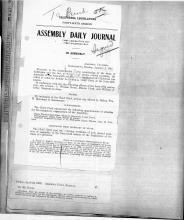
This page displays 2 different partial Assembly Daily Journals.
First partial Assembly Daily Journal:
California Legislature
Forty-Sixth Session
Assembly Daily Journal
First Legislative Day.
First Calendar Day.
In Assembly
Assembly Chamber,
Sacramento, Monday, January 5, 1925.
Pursuant to the requirements of the constitution of the State of California and the law, at the hour of twelve o’clock meridian, the Assembly of the forty-sixth session of the Legislature of California was called to order by Arthur A. Ohnimus, Chief Clerk of the forty-fifth session.
In conformity with law, the following officers of the forty-fifth session were also present: C. William Booth, Minute Clerk, and William J. Leflar, Sergeant-at-Arms.
Prayer
By invitation of the Chief Clerk, prayer was offered by Bishop Wm. H. Moreland of Sacramento.
Appointments
The Chief Clerk announced the following appointments of attaches for the temporary organization of the Assembly:
Pages, Theodore Reindollar, Margaret Hartranft, Frank Vinson.
Stenographers, Madge Cross, Norma M. Brown.
Assistant Sergeant-at-Arms, C. E. Whiteside, Danny Whelan, Chas. H. Wilkinson.
Certificate from Secretary of State
The Chief Clerk read the following certificate of duly elected members of Assembly of the forty-sixth session of the Legislature of the State of California:
State of California, Department of State.
I, Frank C. Jordan, Secretary of State of the State of California, do hereby certify that the following is a complete list of those duly elected at the general election, held on the fourth day of November, A. D. 1924, to represent the people of the State of California as Members of Assembly of said State at the forty-sixth session of the Legislature of said State, as appears from the statement of vote, received from the county clerks of the country or counties and the registrar of voters of the city and county of San Francisco, comprising the several Assembly Districts…
*The rest of the Daily Journal is cut off.
Second partial Assembly Daily Journal:
Friday, April 24, 1925] Assembly Daily Journal 97
By Mr. Davis:
Resolved, That the thanks of the Assembly are hereby tendered to Arthur A. Ohnimus, Chief Clerk, for the painstaking, efficient and courteous manner in which he has conducted the business of his office during the session.
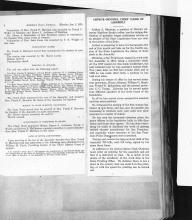
This page displays an Assembly Daily Journal and small biography of Arthur A. Ohnimus
First is the Assembly Daily Journal, it says:
4 Assembly Daily Journal. [Monday, Jan. 5, 1925
Nomination of Hon. Frank F. Merriam was seconded by Frank C. Weller of Glendale and Roscoe J. Anderson of Redding.
Mr. Albert A. Rosenshine of San Francisco placed in nomination for Speaker Hon. Isaac Jones of Ontario.
Nomination of Hon. Isaac Jones was seconded by T. M. Wright of San Jose.
Nominations Closed.
Mr. Frank L. Eksward moved that nominations for Speaker for now closed.
The motion was seconded by Mr. Harry Lyons.
Motion carried.
Nominations closed.
Election of Speaker
The roll was called with the following result:
For Hon. Frank F. Merriam of Long Beach – Anderson, R.J., Badham, Brock, Browne, Carter, Cleveland, Cloudman, Coombs, Davis, Dayton, Deuel, Dillinger, Dodge, Duval, Easley, Eksward, Foster, Graves, Hartranft, Johnson, Jost, Little, Lyons, McPherson, Melville, Merriam, Mixter, Murphy, Noyes, Pierce, Roberts, Scofield, Scudder, Sewell, Smith, Spalding, Walters, Weller, Wemple, and Wright, S.V. – 40.
For Hon. Isaac Jones of Ontario – Adams, Anderson, D.P., Bernard, Broughton, Burns, Byrne, Campbell, Crittenden, Croter, Dorris, Finney, Fry, Hawes, Heisinger, Hornblower, Jacobson, Jones, Levey McDonough, McDowell, Miller, Eleanor; Miller, J. A., Mitchell, Morrison, Mueller, Murray, Nielsen, Oliva, Reindollar, Roland, Rosenshine, Runner, Saylor, Schmidt, Spence, West, Williamson, Woodbridge, and Wright, T. M. – 39.
The Chief Clerk announced the vote of the Assembly, and declared Hon. Frank F. Merriam the choice of the Assembly for Speaker.
Motion to Make Election Unanimous.
Mr. Isaac Jones moved that the election of Hon. Frank F. Merriam for Speaker of the Assembly be made unanimous.
Mr. Homer Spence seconded the motion.
Motion carried.
Appointments of Committee of Escort.
The Chief Clerk appointed Messrs. Roscoe J. Anderson, Frank C. Weller and Robert B. McPherson a special committee to escort Speaker-elect Hon. Frank F. Merriam to the chair.
Oath of Office Administered
Upon arriving at the bar of the Assembly Speaker-elect Hon. Frank F. Merriam took and subscribed to the following oath administered by William M. Finch, Presiding Justice of the Third District Court of Appeal:
I do solemnly swear that I will support the constitution of the United Sates and the constitution of the State of California, and I will faithfully discharge the duties of the office of Speaker of the Assembly to the best of my ability.
Second is Arthur A. Ohnimus mini biography:
Arthur Ohnimus, Chief Clerk of Assembly
Arthur A. Ohnimus, a member of District Attorney Matthew Brady’s office, has the unique distinction of probably longer continuous service as an attaché of the State Legislature than any man in the history of the State.
Arthur is preparing to leave for Sacramento the end of this month and take up for the fourth session of the State legislature the duties of chief clerk of the Assembly.
Ohnimus, a San Franciscan, began his work with the Assembly in 1915, being a committee clerk. At the 1917 session he was made bookkeeper, the next biennial meet he was assistant minute clerk. Two years later we find him minute clerk and in 1923 he was made chief clerk, a position he has held ever since.
During his tenure of office he has served under four governors, Hiram Johnson, William D. Stephens, Friend W. Richardson and the present governor, C. C. young. Likewise has he served under four different speakers of the lower house of the legislature.
In all he has served seven consecutive sessions and four extra sessions.
He witnessed the seating of the first woman legislator in this State, and has seen the gentler sex increasing in numbers each year, until now their presence is a matter of course.
He has seen the increased attention given the peace officers in the legislative halls, to bills they foster and those they oppose. He has done everything he could to facilitate the work of getting ratified charter amendments for San Francisco, and especially where members of the San Francisco Police Department were interested.
During each session he signs as chief clerk of the Assembly 700 bills, each bill being signed by his name three times.
In addition to his clerical duties Clerk Ohnimus must order all printing for the assembly and see that it is delivered on time. He is lavish in his praise of the excellency of the work done in the State Printing Office. He declares there is not a plant in the country that can excel it in fine printing, or with the speed the printing can be turned out.
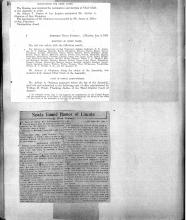
This page displays a partial Assembly Daily Journal and a newspaper clipping.
First is the partial Assembly Daily Journal, it says:
Nominations For Chief Clerk
The Speaker now declared the nomination and election of Chief Clerk of the Assembly in order.
Mr. Sidney T. Graves of Los Angeles nominated Mr. Arthur A. Ohnimus of San Francisco.
The nomination of Mr. Ohnimus was seconded by Mr. James A. Miller of San Francisco.
Nominations closed.
6 Assembly Daily Journal [Monday, Jan.5, 1925
Election of Chief Clerk
The roll was called, with the following result:
For Arthur A. Ohnimus of San Francisco - Adams, Anderson, D. P., Anderson, R. J., Badham, Bernard, Brock, Broughton, Browne, Burns, Byrne, Carter, Cloudman, Coombs, Crittenden, Croter, Davis, Dayton, Deuel, Dillinger, Dodge, Dorris, Duval, Easley, Eksward, Finney, Foster, Fry, Graves, Hartranft, Hawes, Heisinger, Hornblower, Jacobson, Johnson, Jones, Jost, Levey, Little, Lyons, McDonough, McDowell, McPherson, Melville, Miller, Eleanor; Miller, J. A., Mitchell, Mixter, Morrison, Mueller, Murphy, Murray, Nielsen, Noyes, Oliva, Pierce, Reindollar, Roberts, Roland, Rosenshine, Runner, Saylor, Schmidt, Scofield, Scudder, Sewell, Smith, Spalding, Spence, Walters, Weller, West, Williamson, Woodbridge, Wright, S. V., Wright, T. M., and Mr. Speaker – 77.
Mr. Arthur A. Ohnimus, being the choice of the Assembly, was declared duly elected Chief Clerk of the Assembly.
Oath of Office Administered
Mr. Arthur A. Ohnimus appeared before the bar of the Assembly, and took and subscribed to the following oath of office administered by William M. Finch, Presiding Justice of the Third District Court of Appeal:
I do solemnly swear that I will support the constitution of the United States and the constitution of the State of California, and discharge the duties of the office of Chief Clerk of the Assembly to the best of my ability.
Second is the newspaper clipping, it says:
Newly Found Humor of Lincoln
By Elbert Hubbard
In days of doubt and discouragement Lincoln had a way of sending a ray of sunshine in the direction of his helpers by giving them a laugh.
One note to Seward, I saw last week, ran thus:
“June 21st, 1863. Dear Seward: The bearer wants to work. The impulse is so unusual I think we should do all we can to encourage it.
“Abraham Lincoln”
Similar notes are in existence sent to others beside Seward, showing that Lincoln knew the value of passing a good thing along.
This repetition of a joke proves to us his humanity and makes u to him akin.
Here is a new Lincoln story, vouched for as authentic:
In one of the darkest hours of the Civil War a man, with business “very important,” got past the doorkeeper on the plea that his errand could only be explained to the President in person.
The gentleman had a harelip – also, he had it with him – and he duly opened up his vocal batteries.
Lincoln, very weary, listened with patience, and as he listened a half quizzical smile played across his sorrowful face.
Lincoln had discovered that the plot to blow up the Capitol had no basis except in his man’s mental vacuum, and he further rightly expected all the man wanted was a five dollar bill.
Now, Lincoln could have done one of several things. He might have called an aide and had the fellow ejected, or he might… *2 words are unreadable here* with him for a dollar.
But Lincoln cast around in his mind as to whether he would send this man to Seward and give Seward a good laugh, or would he send him to Stanton, who had small sense of humor and who was given to making life very grievous for his chief.
Lincoln decided that Stanton was the party who would be punished, and so he wrote this note:
“Dear Stanton: The bearer of his message is a very dear, personal friend of mine. He has discovered a dastardly plot of the enemy to blow up the Capitol. It is highly necessary that you should give him your closest attention, and act promptly as your good judgment dictates.
Yours, A. Lincoln.”
The note of course, got the stranger into Stanton’s presence. Stanton read the letter and sent for three secret service men. The doors were locked, the keyhole stuffed and the man with the harelip was requested to divulge the plot.
It took Stanton about fifteen minutes to discover what Lincoln had gathered in a moment. Stanton then wrote the following letter:
“Washington, January 5th, 1864. Dear Mr. President: I have given your dear. Close personal friend fifteen minutes of my valuable time. And I have come to the conclusion that if you ever send me another man like this, and he does not blow up the Capitol, I will, sincerely yours, Edwin M. Stanton.”
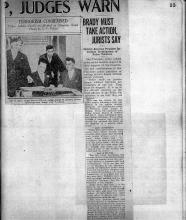
Newspaper clipping:
Brady must Take Action Jurists Say
District Attorney Promises Immediate Investigation of Police Violators
San Francisco police judges today added another chapter their support of the Constitution and condemnation of San Francisco police practices of raiding private homes without search warrants.
“Police raids on private homes without warrants are violations of our law. They must be stopped. It is up to the district attorney as the legal adviser of the Police Department to see that they are stopped.”
This was the opinion the four police judges, following a joint conference on the matter Monday afternoon. The meeting was called by Presiding Judge Joseph M. Golden. Those who attended were Police Judges Daniel S. O’Brien and Lile t. Jacks, and Deputy Dist. Atty. Arthur Ohnimus. Police Judge Sylvain J. Lazarus was unable to attend, but outlined his stand on the question in a written statement.
Lark Jurisdiction
“There have been cases in every police court where citizens were arrested after police had searched their homes without search warrants,” Judge Golden said, “Unfortunately we have no jurisdiction over the police force. All we can do is dismiss the cases when they are brought into court. It is a waste of time of the citizens, the police and the court.”
Law is Old One
“The law which guarantees the sanctity of the home against illegal search and seizure is an old one,” Judge Sylvain J. Lazarus said in a memorandum, “It is one that cannot be changed by an executive, judicial or legislative power aside from the continental Congress and the states of the nation – the people themselves. It is a good and safe and wise law.
Dist. Atty. Matthew Brady said he was opposed to violations of the fourth amendments to the Constitution by city, state or federal officers, and would immediately go into the matter to determine what power he had to instruct the police force to discontinue their illegal practices. Bradly was represented at the conference by Asst. Dist.
*The rest of the article is cut off.
A picture to the left of the news clipping shows 4 men sitting and standing by a desk. The title above the picture reads: Terrorism Condemned Police Judges Confer on Method of stopping illegal Raids by S.F. Police. Left to right of the picture is: Judge Daniel O’Brien, Judge Joseph M. Golden, Arthur Ohnimus and Judge Lile T. Jacks.

There is 3 newspaper clipping displayed on this page.
First newspaper clipping shows a photo of a lady named Miss Albertine Walker sitting down holding a chicken named “Helen.” The caption of the photo below says: “Helen” is Miss Albertine Walker’s feathered pet and anathema to Ole Anderson, landlord of the apartment house where both resides.
The rest of the news clipping says:
Prize Hen in Household Stirs up Domestic War
Two Women Tenants Accuse Landlord after Battle in Defense of Their Feathered Pet
“Helen” is a nice, quiet little while hen, who never speaks out of turn except when she lays her matutinal egg. Like other soft-spoken Helens of history, where she is, trouble is. Just now both are at 1820 Turk Street.
Miss. Albertine Walker, who won “Helen” recently as first prize at a business college “barn dance,” lives at the same address with Mrs. Jessie Loveless. Ole Anderson reigns in the apartment house as landlord.
Despite her endearing ways, Anderson doesn’t care for “Helen.” Yesterday he express his dislike in such vigorous terms that Miss Walk, with Mrs. Loveless, visited Arthur Ohnimus, deputy District Attorney, and secured a citation against the landlord on a battery charge.
According to Miss Walker, Anderson has been prejudiced against “Helen” ever since she joined up with the household. At first she lived a suburban life in a coop on the edge of a plot of green grass, but the landlord is said to have opened the cage, pointing the way to a wider vista to the hen.
She was captured just in time and since she has lived a life of seclusion in the Loveless kitchen.
Early yesterday Anderson and his wife both called. They complained that “Helen” would make a grand stew but that she was no geranium. Failure to prove his point, Mrs. Loveless told Ohnimus, seemed to anger him, and without warning he struck both the women.
Friday morning has been set for a hearing upon the charge of battery.
Second Newspaper clipping says:
Mate Stabs Hostess of House Party
Gay Midnight Affair Ends When Husband Attacks Wife with Knife; Guest Stops Assault
Wouldn’t Woman Lies in Closet Unconscious Eight Hours before Arrival of Medical Aid
A gay Saturday night party ended disastrously shortly after midnight yesterday morning when Mrs. May Monahan, the hostess, was stabbed by her husband with a carving knife in their apartment at 2855 Pierce Street.
The husband, James H. Monahan, said to be a member of a wealthy Spakone, Wash., family, was arrest on a charge of assault with intent to commit murder. He declined to make a statement to the police, except to say that he did not remember what happened.
Has Daughter 20
Mrs. Monahan, 41 years old, and the mother of a 20 year old daughter by a former husband, lay in a critical condition last night at the St. Francis Hospital with a knife wound in the scalp and another deep wound in the back Surgeons were unable to say whether or not it had reached the lung.
The wounded woman, who was stabbed at 12:30 a.m., lay bleeding and unconscious for eight hours in the narrow closet behind the wall bed while the husband, according to her statement to the police slept in an adjoining room.
Crawls to Phone
At 8:30 in the morning she managed to gather sufficient strength to crawl to a telephone in the entry hall and notified the police, who took Monahan in custody and dispatched her to the hospital.
In her bedside statement taken by Assistant District Attorney Arthur Ohnimus, the wife credits as guests, Robert Bemis Jr. of 63 Twentieth Avenue, with wrestling the knife away from her husband and saving her from further attack.
According to her it was Bemis, last of the guests to remain and only witness to the stabbing, who hid her in the wall bed recess.
Her Story Denied
Bemis is reported to have denied this in a telephone conversation with Mrs. Monahan’s sister, who stated that he called her up and declared he was not present during any stage of the affair.
Police were anxious to get in touch with Bemis for questioning but had not succeeded up to a late hour yesterday, it was reported at headquarters.
An investigation of the Monahan apartments revealed the evidence of the revelry and its serious sequence. A number of empty glasses stood about on the furniture and a trail of blood led from the kitchen past the bathroom to the closet where Mrs. Monahan lay huddled during the night.
The attack came suddenly after all the guests except Bemis were gone, she stated. “We had no words or argument,” read her statement. “I was standing in the kitchen when my husband attacked me. He bit me on the lip, the arm and the cheek. Then he stabbed me with the butch knife. I ran, and he stabbed…
Third newspaper clipping continues from the second newspaper clipping:
Husband Slashes Hostess as Knife Fray Ends Party
again in the back. This is not the first time, but it is the worst.”
The couple came here from Spokane on September 2. Monahan who is 37, was said by his step-daughter to be one of the heirs of the late pioneer Monahan of Spokane, whose fortune was built up on a string of restaurants, hotels and in real estate investments. The estate is now known as the Granite Investment Company, of which the arrested man is one of the directing officers, she added.
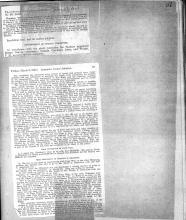
There is 2 partial Assembly Daily Journals on this page.
First partial Assembly Daily Journals says:
February 25, 1925
Resolution
The following resolution was offered:
By Mr. Smith:
Whereas, There has been introduced in the forty-sixth session of the Legislature of the State of California a bill numbered Assembly Bill No. 440, known as “An act to regulate the manufacture, sale and use of herbs, roots or other nature products, etc., and providing a penalty for violation thereof,” and
Whereas, Certain publicity unfavorable to the author of said bill has been given by the press of this State; now, therefore, be it
Resolved, By the Assembly that the Speaker be, and he is hereby directed to appoint a committee, consisting of five members of the Assembly, to investigate fully the facts in connection with said bill and to report back to this body its findings thereon.
Resolution read, and on motion adopted.
Appointment of Special Committee
In accordance with the above resolution the Speaker appointed Messrs. Graves (chairman), Coombs, Cleveland, Jones, and Wright, T.M., as such special committee.
Second partial Assembly Daily Journal says:
Friday, March 6, 1925] Assembly Daily Journal 19
The committee has exhausted every avenue of search and pursued every rumor possible, and has endeavored to ascertain the whole truth concerning the matters of the investigation. The newspapers of this State and the reporters handling the subject have materially aided the committee in its investigation, and the people of the State are indebted to these agencies for their assistance.
The committee deems it advisable to submit to the House, as briefly as possible, those certain portions of the testimony most directly bearing upon the questions involved, in order that the House may be able to draw its own conclusions, rather than to depend upon recommendations of the committee.
It is well to dismiss on proposition in advance, and that is the report concerning the action of Mr. J. E. Hood, the attorney of the State Board of Pharmacy, whose office is in Oakland. Mr. Hood was unnecessarily brought into the public light by a remark which seems to have been more than careless, and well high approaching the criminal, and in the detailed testimony hereinafter set forth this reference will more specifically appear. The only object in bringing in the name of Mr. Hood was that the person using his name might be the better enabled to exert pressure upon those interested in defeating Assembly Bill No. 440.
On the twenty-first day of January, 1925, Assemblyman Edward J. Smith introduced what is known as Assembly Bill No. 440, and which is entitled “An act to regulate the manufacture, sale and use of herbs, roots or other nature products used in the administering of sickness of treating diseases of a human being and providing a penalty for the violation thereof.”
Thereafter some public notoriety was given to this bill and to its import, and the testimony of William R. Brackett, a former member of this House, shows that he read an account of the bill in a newspaper. He made some remark to the effect that it appeared to be a good bill calling for the employment of a lobbyist at Sacramento in order to secure its defeat. The avowed purpose of Mr. Brackett in endeavoring to have himself engaged was not out of any public spirited feeling, but arose simply because he saw it in a fair field for the talent and remuneration of the lobbyist.
The bill directed itself against the use of herbs and roots and other products of nature, either prohibitive or regulatory, and concerned mostly Chinese doctors engaged in this Oriental practice, and who seems to have quite a large clientele in the State of California. He immediately repaired to the office of Fong Wan, an herb doctor in the city of Oakland, Out of the conversations between the two the charges against Assemblyman Smith seem solely to have sprung. There is a conflict as to these conversations. The following is taken verbatim from the stenographic report, and the whole of said testimony will be transcribed and made a part of the records of this body and accessible at all time to the public.
From Testimony of Fong Wan
- I asked him (Brackett) what he do with that $5,000.00. He said he dived it, $2,500.00 for Smith and $1,000.00 for himself and $1,000.00 for Mr. Hurley and $500.00 for expenses
From Testimony of William R. Brackett
Q. Did you, at any time, in conversation with Fong Wan, or the other Chinamen, mention any amount that was to go to Mr. Smith in connection with this bill?
A. Absolutely not.
Q. Then when the Chinamen say you mentioned a certain amount as going to Mr. Smith, they are mistaken?
A. Absolutely no; at no time.
Q. Did you in any conversation with Fong Wan, or the other Chinamen mentioned Mr. Smith’s association in connection with the bill?
A. Never at no time; no sir.
This is the only evidence against Assemblyman Edward J. Smith concerning the charges and intimations which have been made as to his motives in introducing the bill. It appears as a fact that Brackett and Smith were not acquainted and had never had any dealings. Upon the question of veracity between Fong Wan and Mr. Brackett, it is immaterial which one is speaking the truth so far as Assemblyman Smith is concerned. If Mr. Brackett was speaking the truth, Mr. Smith’s name was not used, and hence was never used in connection with any of these reports. If Fong Wan’s version is true, it amounts to hearsay, and would appear to have come from Brackett, speaking entirely for his own interest and using all of the pressure and argument in aid thereof, wholly unacquainted with Assemblyman Smith and without authority of any kind of character to speak for Mr. Smith.
The committee therefore acquits Assemblyman Edward J. Smith of any of the charges or insinuations made against him, and of any misconduct in the matter.
It is brought to the attention of the committee that the character of Assembly Bill 400 is such that an immediate resumption arises to the effect that such bills are not introduced in good faith, and that they are commonly styled “cinch bills.” In this connection we desire to impress upon the members of the Legislature, and, we hope, upon others who may be members of future legislatures, that such bills call…
*The rest of the journal is cut off.
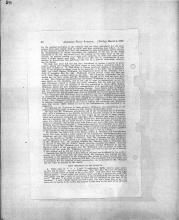
This page displays the Assembly Journal Daily Journal which continued from the previous Journal on the other web page.
20 Assembly Daily Journal [Friday, March 6, 1925
For the peculiar activities of the lobbyist, and are often introduced for the mere purpose that some money shall be made, and that corruption may follow. A bill of this character should have been first endorsed by some government agency having the administration of justice concerning the regulation or the sale of the drugs mentioned in the bill, and should have the support of the police force of the city wherein the member reside, or of some such authority, in order that when introduced it might import good faith. We do not offer this in condemnation of any motives in introducing this particular bill, but as a general observation concerning the future.
We find, that after this bill has been introduced, it became a matter of great concern among the Chinese, there seems to have been a concerted action on their part to defat it. T. Wah Hing, a Chinese merchant residing in Sacramento, came to the Sergeant-at-Arms’ room in the Assembly on the sixth day of February, 1925, and asked Charles Wilkinson, the Sergeant-at-Arms of the Assembly, for a copy of Assembly Bill No. 440. Wilkinson secured several copies and gave six to T. Wah Hing, putting others in his desk. The Chinaman reappeared the following day for more copies and Mr. Wilkinson reached in this desk and gave them to him. The Chinaman announced that he wanted Wilkinson to call up Assemblyman Smith on the telephone, and to ask him to come to Sacramento, as he, the said Chinaman, wanted to consult him about Assembly Bill NO. 440, and that the Chinaman was to pay the expenses of the trip amounting to thirty ($30) dollars. Wilkinson finally got into telephonic communication with Assemblyman Smith and the latter was to come up on the following Monday. Later Smith called up Wilkinson and informed him that he would not keep the appointment; that if the Chinaman desired to see him he could come down to Oakland and consult him at his office.
The Chinaman told Wilkinson that he wanted to get two stenographers to assist in preparing for the fight to be made against the bill, and Wilkinson afterwards sat down two stenographers who were engaged by the Chinaman at five ($5) dollars a day. The Chinaman advanced Wilkinson twenty ($20) dollars for the purpose of meeting immediate expenses in the way of stamps and stationery and Wilkinson gave this twenty ($20) dollars to one of the stenographers, who expended it as suggested.
In assisting the Chinaman in these matters, Wilkinson was contributing to the preparations being made to defeat the bill, whether intentionally or not.
We find that Mr. Wilkinson, afterwards, and on the twenty-fifth day of February, 1925, made a statement to the District Attorney of Alameda Country, in an investigation had by the country authorities of that county in the matter of these charges, which said statement contained the following: Mr. Wilkinson was asked if he knew who the Chinaman was. He stated “that he did not; that he did not know what his name was; that he did not know where he lives, or where his place of business was located or situated; that he had never seen him at any place other than the Capitol Building and the Hotel Senator.” Upon being asked by the committee as to why he had given this statement to Mr. Warren instead of saying that he did not know who the Chinaman was, he replied as an excused that he “he would do anything to keep a member of the Legislature out of trouble, that he didn’t want to stir up a stink.”
We find that Chief Clerk of the House, Arthur A. Ohnimus, and Assemblyman Smith has been, during a prior session of the Legislature, particular friends and associates, and that this relation continued up to the time we are about to speak of.
On the eleventh or twelfth of February, 1925, Mr. Ohnimus and Mr. Wilkinson left Sacramento at three o’clock a.m., going by way of Stockton to San Francisco, in Mr. Ohnimus’ car. On reaching Oakland Mr. Ohnimus made a statement that he desired to stop and see “Eddie” Smith, meaning Assemblyman Smith. Arriving at the residence Mr. Ohnimus went into the house, leaving Wilkinson in the car; Ohnimus stated to the committee that Mr. Wilkinson was too sleepy to make the effort to get out, while Mr. Wilkinson’ version was that he did not go in because it was raining and he did not want to get wet.
Assemblyman Smith seems to have been in bed and was awakened by his mother-in-law and finally came into the room where Mr. Ohnimus was waiting for him According to the testimony of Mr. Ohnimus, they talked of casual matters until the conversation was directed to Assembly Bill 550. They committee will give briefly, and in substance the two version of said conversation, one as detailed by Mr. Ohnimus and the other as detailed by Mr. Smith.
From Testimony of Mr. Ohnimus
A. Eddie came in * * * I said, “I understand. Eddie there is some money on the bill of yours.” And then Eddie said “Ha! Ha! Ha! You are about the third of fourth fellow to speak to me on that bill.” And then ere was some other remark passed .I don’t recall just exactly what, and then I immediately said, “My God. Eddie, you don’t think for one second I am propositioning you on this bill, do you?” He said, “I do think its king of queer you are coming in at this hour of the morning.” I said, “Eddie Smith, for God’s sake you don’t think that of me; you above all the people in the world, just because I come here at this hour of the morning
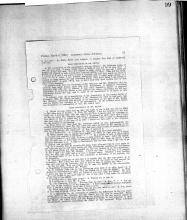
This page displays the Assembly Journal Daily Journal which continued from the previous Journal on the other web page. It says:
20 Assembly Daily Journal [Friday, March 6, 1925
to see you?” So Eddie Smith just laughed. I imagine that kind of registered with him.
From Testimony of Mr. Smith
A. My recollection of the conversation was as follows: Mr. Ohnimus spoke of this bill and said, “I know where there is $500 if you lay off of that bill.” I laughed at him and said, “Art, if I wanted to make money on that bill I could get $5000, if I wanted to take money, but I am not taking a time. That bill has merit. I believe in it and I am going to put it through, and you just want me to move it over. * * * After I got finished explaining that I could make money if I wanted to make money, he said something about, “You don’t think I am trying to approach you?” I said, “Well, Art, it don’t look very good coming her at this time of the morning.”
It appears, both from the testimony of Mr. Ohnimus and Mr. Wilkinson, that no mention was made during their trip from Sacramento to Oakland concerning Assembly bill 440, nor in relation to any other legislative matter or proposed legislation. It is for the House to say whether this silence concerning the bill was maintained during the trip, and to judge of the significance to be given to this testimony.
It appears, upon the re-assembling of the Legislature on the twenty-fourth of February, 1925, Mr. Smith apologized as an expression on the part of Mr. Smith, that he, Smith, was mistaken as to the conversation. In the evidence given before the Committee, in explanation of this, Mr. Smith says:
From Testimony of Mr. Smith
Q. Would you say today that an offer was made to you to kill that bill for $500 or any other sum of money?
A. Well, Mr. Wright, I am not prepared to say that today, no; I will say this; that the construction that I placed upon the language on the day in which Mr. Ohnimus was there I interpreted as such; since then I have had plenty of time to reflect and if I had considered when I came to Sacramento that that was put in the way of any offer I would have gone to Mr. Ohnimus for the purpose of apologizing.
Q. Then from the time that Mr. Ohnimus called on you, approximately the twelfth of February, until the time when you came up here at the opening of the second session, you believed that the offer had been made to you of remuneration to kill the bill through Mr. Ohnimus?
A. Yes, I believed it.
Q. You believed it?
A. I believed it. My belief may have been mistaken.
Q. What caused you to change that belief?
A. Well, as time went on I began to consider that possibly I was hasty *** as a matter of fact, I talked about that and repeated it, as I said, to seven or eight people, at least. After the expiration of about two or three days it gradually began to drift from my mind; I paid no more attention to it. I came to Sacramento and the first thing I did was to go to Arthur, and apologized.
Q. Is it possible that he actually did make some offer and that in your anger at the time you and him had some words and that afterwards, realizing the seriousness of this whole thing, not only he backed up on, but you backed up on the proposition?
A. No, I won’t say that, Mr. Wright. I won’t say that. I will say, it is possible that the offer was made and it is true I became angry. Whether I was justified tin becoming angry or not is for this committee to determine or for anybody else to determine.
Q. Then you would say at this date it is possible that the offer was made?
A. It is possible. But I will say this: that before he left the house he had assured me that such was not his intention; that he had no idea of making any offer.
Q. Yet he said, “You are foolish not to take the $5,000” in the conversation.
A. Something to that effect, Mr. Wright.
Q. It certainly looks like he was presenting some kind of an offer doesn’t it, if during the conversation he said, “You are foolish if you don’t take the $5000.”
A. Well, I won’t say that he said, “You are foolish if you don’t take the $5000.” He said “You are foolish if you don’t take it,” but it was after I made the statement I was able to get $5000.
Q. Foolish not to take some money?
A. Foolish not to take it.
Q. Foolish not to take it?
A. Yes.
Q. (By Chairman Graves): You are clear on that?
A. Yes. *** Let me say this to the members of the committee: I have made a very serious statement here; I am in a measure sorry that I had to do it.
Q. What statement do you mean, the one you just made to me?
A. Yes, about in any way bringing Arthur into the situation.
It is impossible for the committee to reconcile the differences in the two statements given by Mr. Ohnimus and Mr. Smith, nor can they be reconciled. There is sufficient in the testimony concerning the actions of the two elective officers of the House, the Chief Clerk and the Sergeant-at-Arms, to call attention to their unwarranted activities concerning the defeat of this measure. These activities…
*The rest of the Journal is cut off.
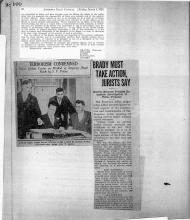
Newspaper clipping:
Brady must Take Action Jurists Say
District Attorney Promises Immediate Investigation of Police Violators
San Francisco police judges today added another chapter their support of the Constitution and condemnation of San Francisco police practices of raiding private homes without search warrants.
“Police raids on private homes without warrants are violations of our law. They must be stopped. It is up to the district attorney as the legal adviser of the Police Department to see that they are stopped.”
This was the opinion the four police judges, following a joint conference on the matter Monday afternoon. The meeting was called by Presiding Judge Joseph M. Golden. Those who attended were Police Judges Daniel S. O’Brien and Lile t. Jacks, and Deputy Dist. Atty. Arthur Ohnimus. Police Judge Sylvain J. Lazarus was unable to attend, but outlined his stand on the question in a written statement.
Lark Jurisdiction
“There have been cases in every police court where citizens were arrested after police had searched their homes without search warrants,” Judge Golden said, “Unfortunately we have no jurisdiction over the police force. All we can do is dismiss the cases when they are brought into court. It is a waste of time of the citizens, the police and the court.”
Law is Old One
“The law which guarantees the sanctity of the home against illegal search and seizure is an old one,” Judge Sylvain J. Lazarus said in a memorandum, “It is one that cannot be changed by an executive, judicial or legislative power aside from the continental Congress and the states of the nation – the people themselves. It is a good and safe and wise law.
Dist. Atty. Matthew Brady said he was opposed to violations of the fourth amendments to the Constitution by city, state or federal officers, and would immediately go into the matter to determine what power he had to instruct the police force to discontinue their illegal practices. Bradly was represented at the conference by Asst. Dist.
*The rest of the article is cut off.
A picture to the left of the news clipping shows 4 men sitting and standing by a desk. The title above the picture reads: Terrorism Condemned Police Judges Confer on Method of stopping illegal Raids by S.F. Police. Left to right of the picture is: Judge Daniel O’Brien, Judge Joseph M. Golden, Arthur Ohnimus and Judge Lile T. Jacks.
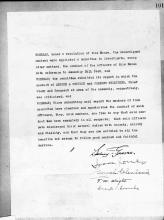
Whereas, under a resolution of this house, the undersigned members were appointed a committee to investigate, among other matters, the conduct of the officers of this House with reference to Assembly Bill #440, and
Whereas; the committee submitted its report in which the conduct of Arthur A. Ohnimus and Charles Wilkinsen, chief Clerk and Sergeant at Arms of the Assembly, respectively, was criticized; and
Whereas: Since submitting said report the members of this committee have observed and appreciated the conduct of said officers, they, said members, are free to say that said conduct has been exemplary in all respects; that said officers have discharged their several duties with honest, ability and fidelity, and that they are now entitled to all the benefits and esteem to follow good conduct and faithful service.
There is 5 signatures at the bottom of this page, but the signatures are unreadable to determine who’s they are.
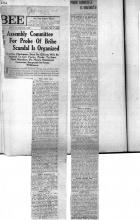
There is 2 newspaper clipping on this page, however they are hard to read and unable to determine the context of the newspaper.
First Newspaper clippings headline says:
Assembly Committee for Probe of Bribe Scandal is organized
Graves, Chairman, says no efforts will be spared to get facts; Probe to start next Monday; Dr. Hing’s statement concerns sergeant-at-arms Wilkinson.
*The remaining of the first newspaper clipping is not readable.
The Second Newspaper clipping is the continuation of the first newspaper clipping.
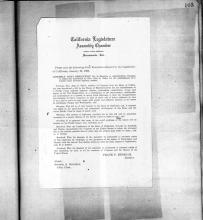
California Legislator
Assembly Chamber
Forty-Fifth Session
Sacramento, Cal.
Please note the following Joint Resolution adopted by the Legislature of California, January 25, 1923.
Assembly Joint Resolution No. 6 – Relative to memorializing Congress to adopt bill introduced by Hon. John E. Raker for the establishment of a Pacific Coast national highway system.
Whereas, Hon. Jon E. Raker, member of Congress from the State of California has introduced a bill is the House of Representative for the establishment of a Pacific Coast national highway system; authorizing examination, and report to the War Department, as a preliminary to the improvement, construction and maintenance of a system of motor truck highways to meet the transportation of war, and to serve as post roads with proper and sufficient laterals in the state of California, Oregon and Washington; and
Whereas, This bill is of vital interest to the State of California and, if adopted, will assist in the agricultural and commercial development of this State and the entire Pacific Coast in times of peace; and
Whereas; The system of highways provided for in this bill will be absolutely necessary to a proper defense of the Pacific Coast in times of war; and
Whereas, it is apparent that many of the world problems of the future will be decided on the Pacific Coast; now, therefore, be it
Resolved, That the Legislature of the State of California, through hits Assembly and Senate, *** the congress of the United States to adopt the *** bill at the earliest possible date in order that the project shall suffer no delay; and, be it further
Resolved, That the Speaker of the Assembly be authorized to transmit copies of this resolution by telegraph, to the governors of the states of Washington and Oregon, with the request that similar action be taken by their respective legislatures; and, be it further
Resolved, That the Speaker of the Assembly be authorized to transmit copies of the resolutions, by mail, to all the members of Congress and the Senate of the United States.
Frank F. Merriam
Speaker
Attest:
Arthur A. Ohnimus,
Chief Clerk.
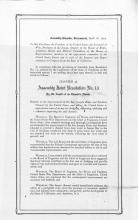
Assembly Chamber, Sacramento, April 18, 1925.
To His Excellency the President of the United States, the Secretary of War, President of the Senate, Speaker of the House of Representatives, Rivers and Harbors Committee of the House of Representatives, members of the appropriate committee of the United States Senate and to each of the Senators and Representatives in Congress from the State of California.
In compliance with the provisions of Assembly Joint Resolution No. 13, adopted by the Legislature of the State of California at the forty-sixth session, I am sending you a true copy thereof, in title words as follows:
Chapter 38
Assembly Joint Resolution No. 13
By Mr. Louttit, of the Twentieth District
Relative to the improvement of the San Joaquin River and Stockton Channel by the United States, and asking the United States to appropriate sums of money for dredging, deepening, widening and otherwise improving the said channels.
Whereas, The Board of Engineers for Rivers and Harbors of the United State War Department and the Chief of Engineers, United States Army, after extensive hearings and thorough investigations have recommended the improvement of the San Joaquin River and Stockton Channel to provide a channel from deep water in Suisun Bay to the City of Stockton, twenty-six feet deep at mean lower low water and one hundred feet wide on the bottom, following the river route in general; and
Whereas, The said Board and the said Chief of Engineers have recommended that the Federal Government appropriate the sum of two million four hundred seven thousand five hundred dollars to aid in said recommended improvements; and
Whereas, Concurrently with the recommendations above referred to the Board of Engineers and the Chief of Engineers have suggested that local interests contributed to the first cost of dredging and provide rights of way and terminal facilities and agree to maintain and improvements; and
Whereas, The Board of Engineers for Rivers and Harbors, United States War Department, and the Chief of Engineers, United States Army, are convinced that the contemplated improvements are necessary and justified; and
Whereas, The deeper channel would immediately enhance the utility of a navigable river; serve the purposes of commerce, agriculture and industry more adequately; and greatly aid the development of the State of California; now, therefore, be it
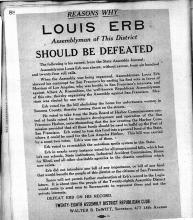
Reasons Why
Louis Erb
Assemblyman of this District
Should be Defeated
The following is his record, from the State Assembly Journal:
Assemblyman Louis Erb was absent, without excuse, from six hundred and twenty-four roll calls.
When the Assembly was being organized, Assemblyman Louis Erb showed his contempt for San Francisco by casting his first vote in favor of Merriam of Los Angeles, who was hostile to San Francisco’s interest, and against Albert A. Rosenshine, the well-known Republican Assemblyman of this city, thereby organizing the Assembly against San Francisco. Merriam was elected by one vote.
Erb voted for the bill abolishing the home for unfortunate women in Sonoma County, thereby turning them on the streets.
He voted to take from the State Board of Harbor Commissioners control of funds raised for exclusive development and operation of San Francisco Harbor, notwithstanding that the law creating the Harbor Commission provided that all these funds should be sued to build up the Port of San Francisco. Erb voted to toss this fund into a general fund of the State, where it could be used for the Los Angeles Harbor. This bill was carried by a scant two votes. Erb’s was one of them.
Erb voted to re-establish the notorious spoils system in this State.
Erb in nearly every instance voted for all programmed bills, which has left our schools, State institutions, Industrial Accident Commission, Home for Blind, and all other charitable agencies in the chaotic condition which now exists.
Erb did not introduce one bill of any importance, or bill of any kind that would benefit the people of this district or the citizens of San Francisco.
Space will not permit further explanation of Erb’s record in the Legislature. It is about time for the people of the Twenty-eighth Assembly District would unite to send men to Sacramento to represent them and not the private interests.
DEFEAT ERB ON HIS RECORD
TWENTY-EIGHTH ASSEMBLY DISTRICT REPUBLICAN CLUB
WALTER B. DeWITT, SECRETARY, 477 18TH AVENUE
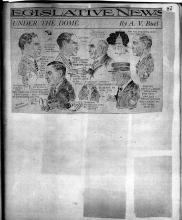
This page displays a newspaper clipping of a comic page, which has cartoon drawings of legislators made by A. V. Buel. It is suppose to depict a humorous message to readers.
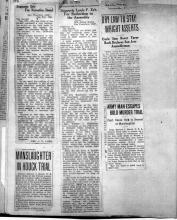
This page displays 5 separate newspaper clipping.
First newspaper clipping reads:
Supports Erb For Narcotics Stand
San Francisco, Calif
July 21st, 1924
The Herald,
Dear Sir: - The last issue of the Herald contained a very interesting article on the flight made by Assemblyman Erb against the Traffic in narcotics during the last session of the California Legislator.
Being deeply interested in the subject, I read the article with care and wish to compliment you for giving publicity to this matter and to compliment Assemblyman Erb upon the splendid work he did in having his resolution against this menace adopted by the Assembly.
What is the State of California needs is more men in the halls of legislation with the courage of Assemblyman Erb; men who will enter the contest against the sinister influences which make possible the traffic in narcotics; men who have the ability and courage to fight this insidious evil and who are unafraid to hit at the source of the supply as well as the man who sells this ruinous weed.
To my mind the curbing of the traffic in narcotics is one of the most important questions before the people today, for when an evil strikes at the youth-the citizens of tomorrow-it is high time for every decent person to answer the call to arms and to support the man who makes the fight to suppress this dreadful thing and who aide in the prosecution of the children from the vicious influence of those unprincipled enough to sell this soul destroying thing to innocent children.
Because of this fight on this question, if for no other reason, I take pleasure in supporting the candidacy of Assemblyman Erb for re-election of the Assembly from this district and ask every woman who believes in the protection of tender innocent children to assist in the re-election of Mr. Erb to the Assembly in order that he ma continue the good work he has started in this direction.
Mrs. C. F. Carli
Second newspaper clipping reads:
Manslaughter in Houck Trial
Captain Edward J. Houck, U.S. army, living at 945 Portola Avenue, was held to answer today to Superior Court on a charge of manslaughter growing out of the death of Walter L. Potter, retired hardware merchant.
A charge of murder filed against Houck after Potter was found in his home, stabbed to death, was reduced to manslaughter on motion of District Attorney Arthur in Municipal Judge Frank A. Dunn’s court.
Houck said Potter was impaled on a Filipino bolo during an argument in the officer’s home after both had been drinking.
Bond was set at $2500 cash.
Third newspaper clipping reads:
Supports Louis F. Erb for Reelection to the Assembly
2336 Fulton Street, San Francisco, Calif.
Publisher of the Herald.
Dear Sir:-Will you please publish the following news items which I believe will be of interest to many readers of your publication.
A large number of prominent Club Women of this district have organized a club for the re-election of Hon. Louis F. Erb to the Assembly from the 28th Assembly district.
The members of this Club are deeply interested in the battle to suppress the traffic in narcotics and have gone unanimously on record as approving the fight made by the Assemblyman Erb during the last session of the Assembly to curb this growing evil.
During the meeting the discussion of this important question developed the fact that the only action take to suppress the Traffic in Narcotics by the Assembly in the last session of the California Legislature was on the resolution introduced by Assemblyman Louis P. Erb representing the 28th District in the Assembly.
The Erb Resolution received the unanimous endorsement of the Assembly Committee and was adopted by the unanimous vote for the Assembly.
The enforcement of the State laws covering the narcotic traffic is probably one of the biggest problems confronting the people today, for the vicious evil not only strikes at the very base of the home life but also at the foundation of the home itself-the children.
Mrs. William A. Fitzgerald, State President of the Federation of Women’s Clubs, speaking in Sacrament in January 24, 1923 in support of the Erb’s resolution said: “There is a great campaign of education to be carried on in this important and splendid work. Many of our people fail to get the fullness of horror of which this awful dealing in human lives and human souls means.
They do not have it brought to them face to face, but I have a message to all the women in California when I tell him that I personally have been appraised by physicians of so many narcotic addicts among the younger generations as to frighten me; as an illustrations I have been reliably informed by a reputable physician that he is now treating three high school students for drug addiction.
Can there be anything more appealing to a mother than that? Are our boys and girls to be left unguarded…
*The rest of this news clipping is not readable.
Fourth newspaper clipping reads:
Dry Law to Stay Wright Asserts
Uncle Sam never turns back declares San Jose Assemblyman
“When Uncle Sam puts his handle to the plow, he never turns back.” This was the metaphor Assemblyman T.M. Wright of San Jose, author of the Wright act used last night in declaring that the prohibition amendment never will be repealed or changed.
The assertion was made in an address before the Red Triangle Club at the Y.M.C.A. Out of the nineteen amendments to the constitution, he stated, the eighteenth amendment received the greatest number of state legislative approvals. He also expressed approval of the manner in which the Wright act is being enforced.
Miss Slyvada Macdonald sang vocal selections at the meeting. She was accomplished by Miss Roslie Brandt. C.W. Booth deputy chief clerk of the assembly was chairman of the program committees.
Fifth newspaper clipping says:
Army Man Escapes Bolo Murder Trial
Capt. Houck Held to Answer on Manslaughter
Capt. Edward J. Houck, U.S.A, escaped being held to answer on a murder charge in connection with the bolo knife death of Walker L. Potter when Asst. Dist. Atty. Arthur Ohnimus recommended a manslaughter charge being placed against him instead today.
Municipal Judge Frank W. Dunne had indicated a willingness to hold Capt. Houck on the murder charge but after John McGee, attorney for Capt. Houck, declared there was no proof that the death was other than accidental. Mr. Ohnimus prevailed on Judge Dunne to hold him on the lesser charge.
Bail was fixed at $5000 bond or $2500 cash.
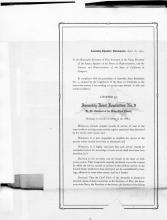
Assembly Chamber, Sacramento, April 18, 1925.
To the Honorable Secretary of War, Secretary of the Navy, President of the Senate, Speaker of the House of Representatives, and the Senators and Representatives of the State of California in Congress.
In compliance with the provisions of Assembly Joint Resolution No. 9, adopted by the Legislature of the State of California at the forty-sixth session, I am sending you a true copy, thereof, in title and words as follows:
Chapter 37
Assembly Joint Resolution No. 9
By Mr. Cleveland of the Forty-Third District
Relating to records of service in the Army
Whereas, Certain original records of service of men in the reserve officers training camps and the regular army have been destroyed by fire and by other means; and
Whereas, it is not impossible to establish the service of the person whose records have been so destroyed; and
Whereas, it is highly important that such service records be established before the knowledge of, such service shall have been lost; therefore, be it
Resolved by the Assembly and the Senate of the State of California, jointly, That Congress be urgently petitioned to provide a means by which the service records of persons in the military service of the United States, which have been destroyed, can be reestablished by hearings, affidavits or some other means; and be it further
Resolved, That the Chief Clerk of the Assembly is directed to forward copies of these resolutions to the Secretary of War, the Secretary of the Navy, the President of the Senate, the Speaker of the House
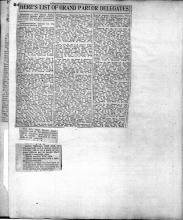
This page displays 3 newspaper clippings.
First newspaper clipping is a list of Grand Parlor Delegates. The vast amount of names in the newspaper clipping is not readable.
Second newspaper clipping says:
Dist. Atty. Matt Brady’s headquarters are at 753 Market Street and Arthur Ohnimus and Harry Caro are in charge. Ohnimus is Chief clerk of the Assembly.
Third newspaper clipping says:
Arthur Ohnimus, chief clerk of the Assembly and a deputy district attorney who is on leave of absence without pay to handle Matt I. Brady’s Campaign, says:
“Here’s another little note.
“Brady headquarters have a radio and a phonograph.
“This is perhaps the first time in local political history that radio entertainment has been furnished for those visiting the headquarters.”
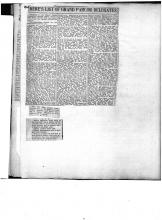
This page displays 3 newspaper clippings.
First newspaper clipping is a list of Grand Parlor Delegates. The vast amount of names in the newspaper clipping is not readable.
Second newspaper clipping says:
Dist. Atty. Matt Brady’s headquarters are at 753 Market Street and Arthur Ohnimus and Harry Caro are in charge. Ohnimus is Chief clerk of the Assembly.
Third newspaper clipping says:
Arthur Ohnimus, chief clerk of the Assembly and a deputy district attorney who is on leave of absence without pay to handle Matt I. Brady’s Campaign, says:
“Here’s another little note.
“Brady headquarters have a radio and a phonograph.
“This is perhaps the first time in local political history that radio entertainment has been furnished for those visiting the headquarters.”
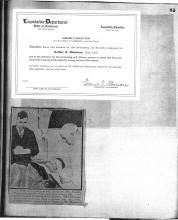
This page displays a certificate and a newspaper clipping.
First is a certificate that says:
Legislative Department
State of California
Forty-Fifth Session
Assembly Chamber
May 18, 1923
Assembly Resolution
By Mr. Robert B. McPherson, of the Tenth District
Resolved, That the thanks of the Assembly are hereby tendered to
Arthur A. Ohnimus, Chief Clerk
and to the desk force for the painstaking and efficient manner in which they have conducted the business of the Assembly during the forty-fifth session.
The above resolution was, on motion of Mr. McPherson, unanimously adopted by the Assembly, May eighteenth, nineteen twenty-three.
Attest:
Frank F. Merriam
Speak of Assembly
Second newspaper clipping shows a picture of Ohnimus taking a statement from Alex Hiller the wounded robber who is laying in a hospital bed. The description says:
The holdup scene being re-enacted, above, with Miss. Elizabeth Koth, clerk, and Mrs. Edna Jones, store manager, who assisted police in trapping the bandits, above and below. Arthur Ohnimus assistant district attorney, taking a statement from Alex Hiller wounded robber.
Steward George Thomas of Park Emergency Hospital.
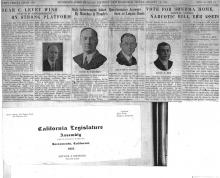
This page displays a newspaper clipping and a paper document.
First is the newspaper clipping which has four different stories and they are difficult to read. However the titles are readable:
The title of the first story reads: Edgar C. Levey Wins Staunch Endorsement. By Strong Platform
The title of the second story reads: Only Endorsement Asked By Marchus is People’s
The tile of the third story reads: Questionnaire Answers Seen as Leipsic Boost
The title of the fourth story reads: Vote for Sonoma Home, Normal School Narcotic Bill, Erb Assets.
Second is a paper document which reads:
California Legislature
Assembly
Forty-Fourth Session
Sacramento, California
1921
Arthur A. Ohnimus
Minute Clerk
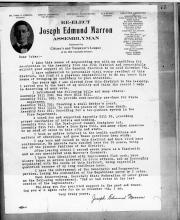
This page displays a re-elect letter to voters from Joseph Edmund Marron, Assemblyman. It reads:
Re-Elect
Joseph Edmund Marron
Assemblyman
Endorsed by
Citizen’s and Taxpayer’s League
Of the 30th Assembly District
Dear Voter: -
I take this means of acquainting you with my candidacy for re-election to the Assembly from the 30th District and respectfully solicit your support at the General Election to be held November 7th.
I have endeavored to personally visit every resident of this district, but find it a physical impossibility to do so, hence this means of bringing my candidacy to your attention.
Two years ago I was elected from this district to the Assembly. I served you to the best of my ability and think the record I made is deserving of your vote.
I introduced the following bills and many others:
Assembly Bill 238; The Pure Milk Bill.
Assembly Bill, 980; To provide semi-monthly pay days for State employees.
Assembly Bill 721; Creating a small debtor’s court.
Assembly Bill 1112; To curb the powers of the loan shark.
Assembly Bill 981; Providing for a two-platoon system in the Fire Department.
I voted for an supported Assembly Bill 36, providing proper sanitation of hotels and bedding.
Assembly Bill 14; The Dust-proof Cement Container Act.
Assembly Bill 718; Baby’s Sore Eyes Bill, and many other measures to mind of value to this city and state.
I took an active interest in the health conditions and matters of education, and gave these questions deep study.
I was born and raised in this district and have lived here continuously. My parents have resided here for 53 years, being one of the pioneer families of the district.
After leaving school I served seven years as a Blacksmith and am now associated with Marron’s Creamery.
I have been identified with Improvement Club work, have always taken an active interest in civic affairs, and am thoroughly acquainted with the needs of this district, being especially qualified because of my long residence here.
I have the endorsement of the Democratic Progressive parties, losing the nomination of the Republican party by 3 votes.
Paul Scharrenberg, Secretary State Federation of labor gives me the following endorsement. “Had no bad votes at the last session of the legislature.”
Thank you for your kind support in the past and trusting you will again vote for me on November 7th, I am,
Very truly yours,
Joseph Edmund Marron
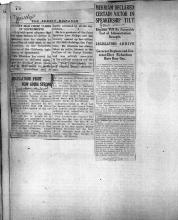
There is 3 newspaper clipping displayed on this page.
First newspaper clipping reads:
Sunset Man Chief Clerk at Sacramento
It is with great pleasure that the many friends of Arthur A. Ohnimus note his election to the office of chief clerk of the assembly, at the forty-fifth session of the California legislature, at Sacramento.
Mr. Ohnimus has served the legislature in different capacities for the last seven years, and is well versed in parliamentary proceedings and is highly esteemed by all the legislators.
He is a graduate of the Saint Ignatius Law College and has recently opened up law offices at 503 Mills Building, San Francisco. Mr. Ohnimus has always taken an active interest in the welfare of the Sunset District, and was actively associated in the political campaign of the late “Nick” Prendergast, the well beloved Sunset assemblyman.
Second newspaper clipping reads:
Merriam Declared Certain Victor in Speakership Tilt
Election will be Favorable Test of Administration Strength.
Legislators Arrive
Governor Stephens and Governor-Elect Richardson have busy day.
As legislators officials and lobbyists gathered in Sacramento yesterday and last night, preparatory to the opening Monday of the forty-fifth session of the California Legislature the most discussed question was the speakership of the assembly. The past held last session by Henry W. Wright of Los Angeles, is sought by Frank F. Merriam of Long Beach and Albert A. Rosenshine of San Francisco.
It was declared by prominent legislators last night that it is a certainty that Merriam will have enough of the votes to insure his elections.
Merriam has the backing of Governor-elect Friend W. Richardson. Rosenshine has the support of a group of politicians who have often announced their affiliations with the federal group.
The importance of the content, according to legislators is based on the belief that Merriam’s election would be a favorable test of the state administration strength in the legislature…
*the rest of this news clipping is not readable.
Third newspaper clipping is a continuation from another news clipping reads:
Legislature Fight Now Going Strong
Delay in organization of the legislature because of the assembly contest. Both Richardson and retiring Governor Stephens have prepared speeches from occasion which they will deliver before a joint session of the two houses.
Minor positions in the legislature will also be sought for by more than one candidate in most instances, it was indicated today. Desiring the post of chief clerk of the assembly is Arthur A. Ohnimus of San Francisco, minute clerk at the five session. Jerome B. Kavanaugh of San Bernardino who held the chief clerkship at the last session, is here for the opening but is not a candidate for re-election.
C. Williams Booth, of Oakland assistant minute clerk at the last session, will seek the office of minute clerk, should Ohnimus be named chief clerk, it is understood Booth will be opposed by Walter Hicks of Sacramento.
Ideations point to W.J. Leflar, Sacramento said Joseph Nolan, Los Angeles, being re-elected sergeants-at-arms respectively of the assembly and senate.
Four ministers are reported contesting for the post of chaplain of the assembly. The Rev. W.H. Hermitage of Sacrament is reported in the race against Bishop William Moreland and the Rev. W.E. Harrison both of Sacramento, and the Rev. George E. Gardner, of Lincoln.
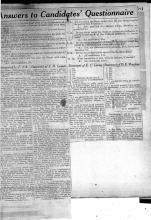
This page displays a newspaper clipping giving answers to candidates’ questionnaires. It says the following:
Answers to Candidates’ Questionnaire
1. Question: Do you think the good work of the Richardson administration outweighs whatever mistakes may have been made by it?
Answers: Erb, see statement below; Leipsic and Levey, No; Marchus, Yes.
2. Question: Do you believe the Richardson administration has gone too far in it curtailment of humanitarian projects?
Answers: Erb, see statement below; Leipsic, Levey and Marchus, Yes.
3. Question: Do you think the Richard son economy drive has gone beyond what is justified by good statesmanship?
Answers: Erb, see statement below; Leipsic, Levey and Marchus, yes.
4. Question: Do you think California has been too liberal with schools?
Answers: All candidates, No.
5. Question: Do you think California has been too liberal with highways?
Answers: All candidates, No.
6. Question: Do you think the State rather than the city should control the port of San Francisco?
Answers: Erb, qualified No; Leipsic, Levey, Marchus, unqualified No.
7. Question: Do you favor using the State of California’s influence to secure modification of the Volstead definition of intoxicants?
Answer: All candidates, Yes.
8. Question: Do you favor the policy of State ownership of water and power as outlined in the water and power act?
Answers: Erb, see statement below; Leipsie, Yes; Levey and Marchus, No.
9. Question: Do you favor legislation against the Ku Klux Klan?
Answer: All candidates, Yes.
10. Question: What legislation, if any, will sponsor, if elected?
Answer: See statements below.
Statement of L.F. Erb column is unreadable
Statement of S.D. Leipsic
(Editor’s Note: Leipsic answers are too lengthy to print in full. The full text of his reply may be seen at The Banner office.)
- No, I do not. I believe that the Richardson administration has been a negative force and that is has curtailed and crippled a good portion of the beneficial legislation which the people have favored during the past ten or fifteen years.
- Yeas, I do. California had attracted national attention because of its humanitarian point of view and its reputation for legislation safeguarding men, women and children has been seriously impaired by reason of the curtailment of those functions by the Richardson administration.
- Yes, I do. I am quite unconvinced that there has been a real “economy” brought about by the Richardson administration. Economy is not merely a matter of dollars and cents. There is a no economy in reducing, the amount of expensive where such reduction means the curtailment of destruction of worth-while government activities.
- No, I do not…
- No, I do not…
- I believe that the city should control the harbor of San Francisco in the same manner that Los Angeles, Oakland, San Diego and other municipalities in California have been given local control of their respective harbors. The harbor of San Francisco has always been self-supporting out of its own revenues and there is no valid reason why it should be controlled by the State, with the ever-present danger of its revenue being diverted to other purposes, as was attempted in the last session of the legislature.
- Yes, I do. I do not believe that we should ever permit the State to urge a return to saloon and strong liquor conditions but I favor a modification of the Volstead act to permit light wines and beer to be sold under strict regulation.
- Yes, I do. I have a fundamental belief that a utility as important to our very existence as water and power should be publicly owned and served by the State for the benefit of future generations.
- Yes, I do. I do not believe that it should be intemperate, or actuated by the same motives of hatred which the Klan itself possess. But I sincerely believe that an organization which fosters ill feeling among people of various religions who heretofore have been living at peace with one another, is detrimental to the welfare of…
* The rest of this column is cut off.
Statement of E. C. Levey
- No
- Yes
- Yes
- No
- No
- San Francisco should control.
- I would vote for a modification for Volstead act.
- I am in favor of public ownership of public utilities, but I am not in favor of placing five hundred million dollars in the control and under the exclusive domination of one man, whether he be the governor or anyone else.
- I am against the Ku Klux Klan or any other organization that interferes with any person’s religion or nationality.
- I am in favor of all humanitarian legislation and liberal appropriations for our schools, Industrial Accident Commission, Home for the Blind and other charitable agencies. I am in favor of retaining control of all funds received by the State Board of Harbor Commissioners. Said funds should be sued to build up the Port of San Francisco and not any other harbor of the State.
I am in favor of re-establishing the home for unfortunate woman in Sonoma country, which was doing so much good, and which was abolished at the last session of the legislature, as the result of which these women were turned back to our streets and jails.
Edgar C. Levey
Statement of D.E. Marchus
- Yes
- Yes
- Yes
- No
- No
- No
- Yes
- I am against pilling up unnecessary debts.
- I am not a member. I am against all intolerance. I am for equal rights to all.
- (a) Change of homestead laws so as to protect the homes to the extent of $10,000 instead of %5,000. (b) I am for legislation setting apart one of the departments of our Superior Court entirely to juvenile court work, where all crimes against children and child delinquency can be speedily heard and determined.
D.E. Marchus
“Self-Delusions” will be the subject on which the Rev. Harvey S. Hanson will preach Sunday morning, at St. Peter’s Episcopal Church, 420 Twenty-Ninth Avenue. The evening services will be resumed September 7.
A Big Rally “to force the school issued and discuss the new bond issue” is announced for this evening at 8 o’clock at the parish hall of the Church of St. Thomas the apostle, Fortieth Avenue and Balboa Street.
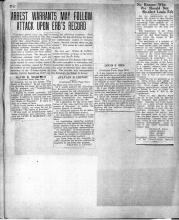
This page displays 5 newspaper clipping.
First newspaper clipping says:
Arrest Warrants May Follow Attack upon Erb’s Record
Telephone advice from the district attorney’s office received by the Banner at 1:15 o’clock yesterday afternoon stated that Assemblyman Louis F. Erg had secured from that office a citation for three men to appear before District Attorney Matthew Brady at 11 o’clock this morning and show cause why a warrant for their arrest should not be issued. The charges are “malicious, criminal libel” and are based on the specific count that a circular mailed to voters in this district yesterday morning, signed by Walter B. DeWitt of 477 Eighteenth Avenue, secretary of the “Twenty-eighth Assembly District Republican Club” contained the following sentence: “Erb voted for the bill abolishing the home for unfortunate women in Sonoma County, thereby turning them on the streets” Erb states he voted against the bill.
The men are: Walter B. DeWitt, George Gerhadt, secretary of the Civic League and Myroa Kelly.
Erb stated in The Banner office that the entire pamphlet is misleading and shamefully unjust to him, a contemptible piece of eleventh hour dirty politics. The circular was accompanied by literature for Edgar C. Levey.
Second newspaper clipping is the continuation of David E. Marchus answers to the questionnaire from the previous newspaper clippings. It says:
of economy, let us not forget “The Spirit of Freedom.” In our mad rush for grinding out laws, let us not forget to preserve our “Constitutional rights and Liberties.”
I believe in sound economy, fell support of schools and humanitarians rights. I believe in natural and normal progress but it must be done in the “Path of Freedom.” It can’t be done on a cross of lawn.
If we would reaming a happy, united, patriotic people, we must be led by and follow “The Spirit of Freedom.”
If you want an assemblyman with these principles and conviction, then vote for David E. Marchus. –Advertisement-
Third newspaper clipping is the continuation of Sylvain D. Leipsic answers to the questionnaire from the previous newspaper clippings. It says:
the State and of the nation.
10. I would sponsor the following: (a) Revenue measures to provide adequate support for our education institution and our humanitarian departments such as the Industrial Accidents Commission; the Industrial Welfare Commission and the like.
(b) Legislation for the strict regulation of the sale, carrying and possession of fire-arms, to reduce the murder hazard if possible.
(c) Adequate support for an industrial home for delinquent women.
(d) Immediate ratification of the Federal amendment to prohibit child labor.
(e) Legislation requiring bonding, insurance or like protection for pedestrians against injury at the hands of careless and negligent automobilists.
(f) Immediate re-establishment by the State of its system of education of the blind, by means of circulating libraries and traveling teachers.
(g) Such laws as are requisite to make operative the policies outlined in response to the first nine queries.
Sylvain D. Leipsic
Fourth newspaper clipping is the continuation of Louis F. Erb answers to the questionnaire from the previous newspaper clippings. It says:
9. I am opposed to any un-American, non-patriotic or sectarian legislation and to any discrimination against any man or classes of men on account of religion or race. Our constitution and laws now give all the protection required if they are properly enforced.
10. I am vitally interested in the suppression of the narcotic evil and favor the enactment of all constructive and humanitarian legislation.
I favor the prompt ratification of the child labor constitutional amendment. This amendment is an enabling act giving Congress the right to adopt suitable legislation on this question, making the law uniform throughout the entire nation.
Fifth newspaper clipping reads:
No Reason why we should not Re-Elect Louis Erb
On the twenty-sixth of this month the voters of the District will be given an opportunity of expressing their opinion as to who shall represent them in the State Assembly for the next two years.
The importance of the State Legislature cannot be overestimated for this body makes the laws which the people of this State must obey.
The usefulness of a member of this important body depends to a large extent upon the length of service in the Legislature and where a member has faithfully represented his constituents it is a folly of the worst description to change him for a person inexperienced in Legislative work.
Assemblyman Louis F. Erb during the past session of the Legislature performed his duties well in a capable, efficient and intelligent manner and was a credit to the Voters of the District who sent him to Sacramento two years ago with a vote of over twelve thousand.
There can be no questions as to Mr. Erb’s fitness and ability to represent the People of this District. What reason can any intelligent unprejudiced person give for failing to vote to retain Assemblyman Louis F. Erb in the Legislature?
Voters of this District when you go to the polls on Election Day consider this question seriously. Consider the State Legislature as a large private business concern. Would you as an Employer discharge a man who has faithfully performed his work, who has proven his ability, who has remained true to his trust, who has been honest, fearless and conscientious? Answers these question voters of this District by reelecting Assemblyman Louis F. Erb to the State Assembly on August 26th.
Richard S. Jones
Alfred Meyers
Chas Moehrie
Brace Davis,
incumbent county Committee men of the Twenty-eighth District.
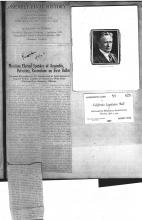
This page displays 4 different type of paper document.
First document reads:
Assembly Final History
Forty-Fifth Session
Compiled under direction of
Arthur A. Ohnimus, Chief Clerk
Ellsworth E. Eustice, Assistant Chief Clerk
Duration of Session
First Half- January 8 – February 2, inclusive, 1923
Second Half – March 5 – May 18, inclusive, 1923
(Duration, 101 days)
Second document is a newspaper clipping that reads:
Merriam Elected Speaker of Assembly Defeating Rosenshine on First Ballot
Governor Richardson to be inaugurated at Joint Session in Capitol Today; Legislature Organizes with Little Friction over Statutory Officers
(Special to “The Recorder”)
Sacramento, Jan. 8. – Governor Richardson and his supporters showed that they had control of the Legislature by electing Fran kA. Merriam of Long Beach Speaker of the Assembly at today’s session. The contest was short, sharp and decisive, although the advantage was but one vote. Defections in the ranks of the San Francisco delegation made it possible for the Merriam forces to elect their man on the first ballot.
The new state administration that will direct the affairs of California during the next four years took office today. With the exception of the office of State Treasurer there were no new incumbents to induct into office.
Governor-elect Friend William Richardson surrendered his office as Treasurer to Charles G. Johnson, one time- Sealer of Weights and Measures, and became a private citizen for twenty-four hours, as he does not assume his new official status until tomorrow afternoon.
The inauguration ceremonies will take place tomorrow afternoon at 2 o’clock before a joint session of the Senate and Assembly in the Assembly chamber. The ceremonies will being with the announcement of the vote for Governor. The retiring Governor, William D. Stephens will present a valedictory message reviewing his six years’ incumbency and admonishing the Legislature as to the necessity for economy and the retention of the progressive and humanitarian legislation of recent years.
Mr. Chief Justice Lucien Shaw of the Supreme Court of California will administer the oath of office to Governor Richardson, who will…(the next few sentences are not readable) In the evening of a complimentary dinner will be tendered to Governor Richardson at the Travelers’ Hotel by the California Press Association of which organization Richardson has been president for twenty years.
Both Houses of the Legislature convened at noon today. In the Senate Lieutenant Governor C.C. Young presided and organization was affected without delay with the election of Arthur H. Breed of Oakland as president pro tempore; Joseph A. Beek of Santa Ana, as secretary; James A. Miller of San Francisco, as minute clerk; Joseph I. Nolan of Los Angeles, as sergeant-at-arms, and Rev W.E. Harrison of Sacramento, as chaplain. The usual routine of notifying the Governor and the Assembly that organization had been effected was gone thru with and resolutions providing for the canvass of the vote and for the appointment of a committee on inaugural ceremonies were adopted.
The Assembly was the focal point of interest owing to the fight over the speakership, and a crowded lobby was in evidence when Chief Clerk Jerome Kavanaugh of San Bernardino called the House to Order.
Albert A. Rosenshine of San Francisco, Frank A. Merriam of Long Beach, T.M. Wright of San Jose and J.J. Prendergast of Redlands were placed in nomination. In the balloting that followed Merriam received 42 votes, Rosenshine 25, Prendergast 7 and Wright 5, while one vote, that of Cleveland of Watsonville, was cast for Christian of Alameda. The election of Merriam was made unanimous and the first combat of the session terminated. Frank B. Anderson of Oakland, longest member of the Assembly in point of continuous service, was elected Speaker pro tem, and Arthur A. Ohnimus of San Francisco was elected chief clerk without opposition. There was a contest for the office of minute clerk between C. William Booth of Oakland, who was “behind the desk” last session, and R.P. Benton, a former member of the Assembly. Booth won, receiving 53 votes. William J. Leffler of Sacramento, was elected sergeant-at-arms without opposition and in the contest for Chaplin between Rt. Rev. Wm. Hall Moreland, bishop of Sacramento, and Rev. George E. Gardner of Lincoln, Placer County, Bishop Moreland won. The appointments of Ben Cohn as bookkeeper to the sergeant-at-arms and E.E. Eustace as assistant chief clerk were confirmed.
After passing resolutions notifying the Governor and the Senate that organization had been effected, adopting the rules of the forty-fourth session as the temporary rules for the present session, appropriating $25 each as contingent expenses, providing for a joint session to canvass the vote of the State and providing for the appointment of a joint committee on inaugural ceremonies, the vote of which was limited to $500, the Assembly adjourned to meet at 11 o’clock tomorrow in joint session with the Senator to canvass the vote of the state for Governor and the Lieutenant Governor.
Third document is a self-portrait of Governor C.C. Young
Fourth document is an admission card, it reads:
Admission Card No. 829
California Legislative Ball
At
Sacramento Memorial Auditorium
Thursday, April 4, 1929
This ticket must be presented at the door. Admit One
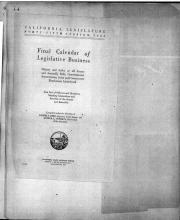
California Legislature Forty-Fifth Session, 1923
Final Calendar of Legislative Business
History and Index of all Senate and Assembly Bills, Constitutional Amendments, Joint and Concurrent Resolutions Introduced
Also List of Officers and Members, Standing Committees and Attaches of the Senate and Assembly
Compiled under the direction of
Joseph A. Beek, Secretary of the Senate and
Arthur A. Ohnimus, Chief Clerk of the Assembly
(California Seal shown here)
California State Printing Office
Frank J. Smith, Superintendent
Sacramento, 1923
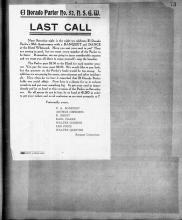
El Dorado Parlor No. 52, N.S.G.W
Last Call
Next Saturday night is the night we celebrate El Dorado parlor’s 38th Anniversary with a Banquet and dance at the Hotel Whitcomb. Have you sent your card in yet? They are coming in good, but we want every member of the Parlor to be there. Remember, we are going to incur considerable expense and we want you all there to enjoy yourself-reap the benefits.
The Parlor pays $2.50 to the hotel for each member present. You pay for your guest $2.50. We would like to pay both, but the pressure on the parlor’s funds would be too strong. In addition we are paying for music, entertainment and other incidentals. How often do we hear it remarked that El Dorado Parlor holds one social affair? Now here is a chance for us to redeem ourselves and put over something big. So get your card in immediately and be on hand at this reunion of the Parlor on Saturday eve. By all means do not be late, be on hand at 6:30 in order to get your tickets and avoid confusions, as we start promptly at 7.
Fraternally yours,
F.A. Bonivert
Arthur Ohnimus
E. Ebert
Earl Crane
Walter Cousins
Leo Pucci
Walter Quinton
Banquet Committee.
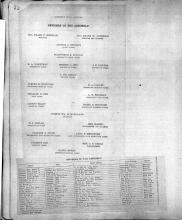
This page displays 2 documents.
The first document provides names of Officers of the Assembly. It reads:
Officers of the Assembly
Hon. Frank F. Merriam
Speaker
Hon. Frank W. Anderson
Speaker Pro Tempore
Arthur A. Ohnimus
Chief Clerk
Ellsworth E. Eustice
Assistant Chief Clerk
R.A. Waestman
Assistant Clerk
Robert A. Orr
Assistant Clerk
J.E. Powers
Assistant Clerk
C. Wm. Booth
Minute Clerk
Adelyn B. Stafford
Assistant Minute Clerk
F.A. Cooley
Assistant Minute Clerk
Charles H. Erb
File Clerk
L.M. Bromley
Assistant File Clerk
Albert Brady
Journal Clerk
Hazel C. McIntosh
Assistant Journal Clerk
Bishop Wm. H. Moreland
Chaplain
W.J. Leflar
Sergeant-at-Arms
Geo. Hager
Bookkeeper, Sgt-at-Arms
Charles A. Joyce
Engrossing and Enrolling Clerk
Lena F. Heisinger
Asst. Engrossing and Enrolling Clerk
Everett Cox
History Clerk
Mrs. A.T. Perry
Postmistress
Daven Morey
Assistant History Clerk
The second document displays the name, title, home address, local address and phone number of Officers of the Assembly:
|
Name |
Title |
Home Address |
Local Address |
Phone |
|
Merriam, Hon. Frank F. |
Speaker |
P.O. Box 344, Long Beach |
Travelers Hotel |
Main 4870 |
|
Anderson, Hon. Frank W. |
Speaker Pro Tem |
1103 Adeline St., Oakland |
Sacramento Hotel |
Main 900 |
|
Moreland, Bishop Wm. H. |
Chaplain |
2600 M St., Sacramento |
2600 M Street |
Main 570 |
|
Ohnimus, Arthur A. |
Chief Clerk |
2910 Fulton St., San Francisco |
Thayer Apts |
Main 1092 |
|
Manning, Bessie McBride |
Secretary to Chief Clerk |
3017 U St., Sacramento |
3017 U St. |
|
|
*Eustice, Ellsworth E. |
Assistant Chief Clerk |
Gilroy |
1710 16th St. |
Main 5551-W |
|
Waestman, R. A. |
Assistant Clerk |
Pine Inn Apts., Long Beach |
Y.M.C.A. |
Main 1033 |
|
Powers, James E. |
Assistant Clerk |
70 Divisadero St., San Francisco |
1526 12th St. |
|
|
Orr, Robert A. |
Assistant Clerk |
356 5th St., Hollister |
708 ½ K St. |
Main 1975 |
|
*Booth, C. Wm. |
Minute Clerk |
Middletown, Lake County |
2344 Sloat Way |
Cap. 277-M |
|
Cooley, Frederick Allen |
Assistant Minute Clerk |
1444 Excelsior Ave., Oakland |
1327 L St |
Main 1338-W |
|
*Cox, Everett |
History Clerk |
Ukiah |
1228 N St. |
Main 1092 |
|
Morey, Daven |
Assistant History Clerk |
2323 3d Ave., Sacramento |
2323 3d Ave |
Cap. 188-J |
|
Stafford, Adelyn B. |
Assistant Minute Clerk |
5809 U St., Sacramento |
5309 U St. |
|
|
Erb, Charles H. |
File Clerk |
679 6th Ave., San Francisco |
1228 N St. |
Main 1092 |
|
Bromley, L. M. |
Assistant File Clerk |
3820 S. Grand Ave., Los Angeles |
Hotel Land |
Main 5040 |
|
Leflar, W.J. |
Sergeant-at-Arms |
1318 18th St., Los Angeles |
1318 18th St. |
Main 2699-W |
|
Hager, Geo. L |
Bookkeeper |
225 E. 43rd St., Los Angeles |
Inverness Hotel |
Main 3089 |
|
Brady, Albert |
Journal Clerk |
391 Valencia St., San Francisco |
1908 K St. |
Main 1697-J |
|
McIntosh, Hazel C. |
Assistant Journal Clerk |
Roseville |
Roseville |
|
|
Cross, Madge |
Chief Stenographer |
1623 ½ O St., Sacramento |
1623 ½ O St. |
Main 1963-W |
|
Perry, Mrs. Anna |
Postmistress |
358 2d Ave., San Francisco |
1122 N St. |
|
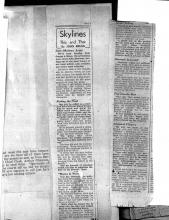
This page displays 3 newspaper clipping.
The first newspaper clipping notify its readers that 891 new laws became effective, and the measures were sent from Chief Clerk, Arthur Ohnimus with a message attached from him that we will just have to be law abiding citizens. Due to the partial cut off of the news clipping, it cannot be written word for word.
Second newspaper clipping reads:
Skylines
This and That
By John Bruce
John Ohnimus, Artist
We’ve been hearing from George S. Minet, the advertising man, about John Ohnimus, perhaps one of the most famous of our local artist, and certainly one of the most eccentric.
Ohnimus died a few months ago in Denver, where he had been making his home, but he was best known as a San Franciscan, although he did great murals all over the world.
He was a tall fellow, looking something like Lincoln, who never wore a necktie, Minet says. He didn’t care, either, how he dressed. Apparently he was gifted with an insight in to character.
Picking the Thief
One day he called on a business man who was going to take him to lunch and found the fellow much upset. Some employee had stolen $2000, and the boss was nearly crazy with uncertainty about his entire staff.
“Suppose I point out the guilty man,” said the artist, “and that will allow you to eat in peace.”
So he pointed toward a fellow sitting in the office smoking a cigar. The business man gasped. It was his most reliable man.
“I’m going out,” said Ohnimus, “for twenty minutes. You question him and then we’ll eat.”
The man did and the employee confessed. When the artist returned, the employer wanted to know how he did it.
“I never saw the man before in my life,” said Ohnimus, “but the way he smoked that cigar told me he was the thief. It drooped from the corner of his mouth.”
And no amount of pleading would get him to enlighten the boss on his detective work.
“Money is Worry”
One day Ohnimus was walking down Broadway, New York, with $1.25 in his pocket, all he had in the world. I went into a café and ate, counting out with 85 cents. Then, suddenly, he began to worry about where he was going to get more.
He reached Central Park and had an idea. “The reason I’m worry,” he told himself, “is that I fear the time when I’ll have no money.”
With that he tossed the 85 cents into the lake and walked back to his boarding house.
There he found a telegram from San Francisco offering him the job of doing some big murals. He accepted, wire collect.
Third newspaper clipping reads:
Queer Fellow
Ohnimus was mighty careless about money and often found himself in actual want. Once he was stranded in Mexico City without a peso and said down in a sunny spot against a church wall to meditate on food.
A priest was in the garden pacing back and forth reading his daily office. Ohnimus waited his chance, got the priest into conversation and before he left had the job of painting the Stations of the Cross in the church-and an advance of $300.
Stomach Specialist
Ohnimus’ oldest boy suffered from weak eyes and a doctor said he must have glasses. “No boy of mine is going to be a weakling in school,” the artist said, and started out to find the trouble.
He quit work for an entire year, studying stomach disorders, and corrected the boy’s eye trouble. Physicians said he had become of the best informed men on stomach alignment the state.
The Lincoln Bust
One day the artist met a printer friend who was worried. The fellow had an order for a calendar and couldn’t get a design. So Ohnimus sketched a head of Lincoln. The artist wanted nothing for it, but finally took $50.
It was declared by art critics one of the two finest ever created, and later the printer refused $1500 for the original.
Chemical Flowers
We still see many of the bluing, salt and water crystal “flowers” blooming in stores windows, and most persons believe they are something new.
But in the years 1705 and 1707, the chemist, Nicholas Lemery, published in the Memoirs of the French Academy, a paper in which he told of “vegetation” produced by the spontaneous evaporation of salt solutions.
Many odd shapes were produced, according to whatever framework was put in the dish. The solution was the same: equal tablespoons of salt, bluing, water and, sometimes, one tablespoonful of ammonia water.
Never use iodine for coloring, the chemists say that produces the dangerous nitrogen iodide. Use mercurochrome. Pour it over clinker, coke, coal or a common brick.
The saturated solution, sucked up by a capillary phenomenon of these salts to “creep,” does the trick as crystals are deposited upon evaporation.
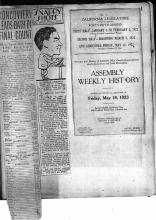
This page displays 3 newspaper clipping.
First newspaper clipping reads:
Roncovieri Leads Bath in Final Count
Official Figures Show Former School Man in Eight Place; Results Unchanged.
The election commission completed the canvass of the ballots cast at the recent municipal election yesterday. There were but few changes in the figures and none affecting any of the officials declared elected on election night. Roncovieri beat out Bath for eight positions among those elected for supervisors.
In the first tabulation Bath led by six votes and Roncovieri was in the ninth position. In the official count Roncovieri picked up sufficient votes to pass Bath.
The total vote cast was also slightly increased. The unofficial count was 127,883 while the final count increased it to 128,037.
Official Results
The standing of the candidates and the votes they got are as follows:
Mayor
Rolph 71,619
McSheehy 43,640
Smith 8,906
Slikerman 1,371
Knudsen 622
Valentine 301
Hines 242
Police Judges
Jacks 83,096
Golden 54,104
McAtee 53,650
Parker 23,147
Hirst 14,383
District Attorney
Brady 71,142
Fickert 27,307
Cook 19,772
Rooche 5,456
Assessor
Ginty 91,134
Porter 14,507
Melvin 9,678
Auditor
Boyle 94,293
McCabe 15,858
County Clerk
Mulcreavy 89,934
Loughery 20,172
Sheriff
Finn 76,112
Robb 38,342
Rock 8,793
Coroner
Leland 104,159
Member of Board of Education
Mrs. Ernest J. Mott –
Yes 67,322
No 16,926
Supervisors
Katz 62,794
Shannon 53,006
Welch 52,866
Hayden 51,950
Badaracco 49,798
Colman 48,566
Harrison 47,766
Roncovierl 45,122
Bath 44,714
Powers 42,731
Schmidt 41,685
Hynes 39,422
Adams 37,650
Mulvihill 35,451
Daniel 34,966
Judel 33,029
Kelly 31,062
Scott 28,479
Nolan 26,933
Johnson 25,842
Keller 24,948
MacArthur 22,953
Sutro 21,815
Squires 18,579
Scott 16,211
Jewell 12,793
Schmidt 10,244
*The last 6 names are not readable.
Second newspaper clipping reads:
Snappy Shots
By Denis McCarthy
(Shows a cartoon picture of Arthur A. Ohnimus standing up writing in a book)
Arthur A. Ohnimus
Deputy District Attorney
There was but one of them in the phone book and the city directory revealed but two.
We mean this time Ohnimus.
It intrigued us, after a fashion, and we began to muse-what was an Ohnimus? Had we ever been crossed by one? Had we ever known anyone by that name?
To be sure; Why, there was old Arthur Ohnimus down at the Hall of Justice; And believe it or not, we were down there in three leaps, sitting in Arthur’s lap, smiling up into his face, before the dear boy knew what it was all about.
Of course you know Arthur was born here and had entered St. Ignatius at about the time we were a senior at Moler’s, Dear old Moler.
Well anyway, Art finished in law at St. Ignatius in 1921 and pursued private practice until 1923, when he was appointed Deputy District Attorney and assigned to duty in the Bond and Warrant office.
Where we found him yesterday, the same charming fellow we knew him to be when associated with him in the early ‘80s.
Arthur is a member of the Native Sons and past president of the El Dorado parlor. His hobby, he tells us, is a little plain drinking water at times and an occasional ride on the running board of his car.
Just the simple, ordinary pleasures of life-that’s Arthur, You may be next.
Third newspaper clipping says:
No. 70
California Legislature
at Sacramento
Forty-Fifth Session
First Half-January 8 to February 2, 1923
(Which Preceded Constitutional Recess)
Second Half-Beginning March 5, 1923
And Adjourned Friday, May 18, 1923
Synopsis and History of Assembly Bills, Constitutional Amendments, Concurrent and Joint Resolutions
Assembly Weekly History
Showing Action on all measures to
Friday, May 18, 1923
Seventy-Eighth Legislative Day
One Hundred Thirty-First Calendar Day
Compiled under direction of Arthur A. Ohnimus
Chief Clerk
Compiled by
Everett Cox
History Clerk
Daven Morey
Assistant History Clerk
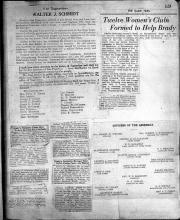
This page displays 12 newspaper clipping; however 10 of the 13 are smaller clippings.
First news clipping reads:
For Supervisor
Walter J. Schmidt
Born in San Francisco, veteran of the World War and have been prominently identified with our civic and business life since my graduation from our public schools. I married Miss Caroline Barron of this city.
During the past four years as a representative in the State Legislature I actively participated in all progressive, educational humanitarian measures. Vigorously fought for better conditions in the institutions for the insane, blind, dumb and deaf of this State.
Author of the state law abolishing the practice of discharging convicts with five dollars at expiration of sentence. My bill corrects this condition by allowing convicts money earned by working on state highways. This law saves the state half a million dollars yearly and cares for dependents of state prisoners.
Worked for all highway and educational legislation. Introduced bill strengthening Workmen’s Compensation Act; also bill protecting California’s boiler industry. Fatherod bill abolishing charge on water meters. Never miss an important roll call in Assembly. If elected I shall give strict attention to the duties of Supervisor and shall act for the best interest of San Francisco. I favor distribution of Hetch Hetchy’s hydroelectric power by the people.
My long service in public affairs, especially as Assemblyman; my study and interest in all civic affairs I feel, qualifies me for the office of Supervisors.
Another candidate name Schmidt having filed for Supervisor, I earnestly request the voters to remember my full name, Walter J. Schmidt.
My sponsors are:
Mrs. Della T. Tinney
Mrs. Anglaes
George J. Steiger
Daniel C. Murphy
James G. Conlon
Hugh McGowan
Roy Fellom
Harry Morrison
Lawrence J. Flaherty
Dave Birnbaum
Leo Granat
W. Hennies
W.F. Worthington
James Moreno
J. Chicchi
Charles D. O’Connor
Samuel Rosencrantz
Eletto Domeinchini
John T. Stanley
Second news clipping reads:
Twelve Women’s Club Formed to Help Brady
Twelve additional women’s Brady for District Attorney clubs were organized Thursday in various sections of the city, according to Harry Caro and Arthur Ohnimus, managers at Brady’s headquarters, 739 Market Street. A Housewives’ club was formed at the home of Mrs. L. McLaughlin, 2843 Folsom Street. Another meeting of volunteer women workers for Judge Brady was held at the home of Mrs. B. Lennon, 2866 Pine Street. A committee consisting of Mrs. L. Cartwright, Mrs. B. Lennon, Miss C. Cohen and Miss L. Murphy reported that they had canvassed the district and secured signed pledge cards from 340 registered voters.
Five hundred women attended a meeting at St. Mary’s-av and signed cards pledging their support to Judge Brady. A club was formed and the following were named officers: Mrs. C. Lyons, president; Mrs. A. Swanson, secretary; Miss C. Lugi, treasurer; and Miss B. Risconi, sergeant-at-arms. The Potrero Housewives’ Brady club was formed at the home of Mrs. E. Colett, 1346 Vermont Street.
Third newspaper clipping reads:
Twelve additional women’s Brady for District Attorney Clubs were organized yesterday in various sections of the city, according to Harry Caoro and Arthur Ohnimus, managers at Brady’s headquarters, 739 Market Street.
Fourth newspaper clipping reads:
Brady’s Manager Finds 6512 Women Backing his Candidate
Arthur Ohnimus manager at the Brady headquarters has that name counting fever again. He sends in to tell us that 6512, not a single name more or less, are on the women’s roll favoring the District Attorney.
Fifth newspaper clipping reads:
Representative of 14 fraternal organizations of which District Attorney Matthew Brady is a member, reported to Brady campaign headquarters at 739 Market Street yesterday and volunteered their services, according to a statement issued by Campaign Managers Harry Caro and Arthur Ohnimus.
Sixth newspaper clipping reads:
Arthur A. Ohnimus, chief clerk at the last session of the Assembly, is the Brady campaign manager. Arthur got busy yesterday with a straw vote, in which he counted all but forty-three of the ballots taken at a Moose meeting for Brady.
Seventh newspaper clipping reads:
Arthur A. Ohnimus, attorney has been appointed manager at the Brady campaign headquarters.
Eighth newspaper clipping reads:
Fifty clubs and organizations have gone on record as indorsing the candidacy of Judge Attorney, according to a statement issued today by Arthur A. Ohnimus, campaign manager at Brady headquarters, 739 Market Street.
Ninth and Tenth newspaper clipping reads:
Arthur Ohnimus, campaign manager over at Brady headquarters tells us that 500 women voters are expected to attend the luncheon for the District Attorney tomorrow at 12:18 o’clock at the Palace Hotel. Mrs. Ernest Wallace is in charge of the arrangement for the luncheon.
Eleventh newspaper clipping reads:
Brady’s Campaign Manager Says 55,712 Pledge Cards are signed
Arthur A. Ohnimus put in many an hour keeping track of the legislators up at Sacramento when he was Chief Clerk of the Assembly, but he must be twice as busy if he has personally counted the 55,712 pledge cards he says have been signed by friends of District Attorney Matthew Brady, Arthur is campaign manager for Brady.
Twelfth newspaper clipping reads:
Three hundred Brady-for-District-Attorney Clubs have been formed through the city since October 1, Arthur Ohnimus campaign manager at Judge Matthew Brady’s headquarters, 739 Market Street, announced yesterday. Twelve women’s clubs have been organized in the Richmond district; five in the Sunset district, two in the Ingleside district and forty clubs in the Mission district. Other clubs are being formed daily.
Thirteenth newspaper clipping reads:
Officers of the Assembly
Hon. Henry W. Wright
Speaker
Hon. Albert A. Rosenshine
Speaker Pro Tempore
Jerome B. Kavanaugh
Chief Clerk
W.E. Monahan
First Assistant Chief Clerk
Ellsworth E. Eustice
Assistant Chief Clerk
P.C. Phillips
Assistant Clerk
Hattie Jewel Anderson
Minute Clerk
Arthur A. Ohnimus
Assistant Minute Clerk
Mrs. Helen Biggs
Assistant Minute Clerk
Arthur H. Samish
Acting History Clerk
Louis F. Erb
File Clerk
Ralph Wright
Assistant File Clerk
Rev W.E. Harrison
Chaplain
W.J. Leflab
Sergeant-at-Arms
Vernon W. Lillet
Journal Clerk
G.J. Scully
Bookkeeper, Sgt-at-Arms
Arthur H. Samish
Engrossing and enrolling clerk
Mrs. A.T. Perry
Postmistress
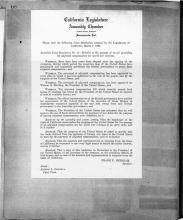
California Legislature
Assembly Chamber
Forty-Fifth Session
Sacramento, Cal.
Please note the following Joint Resolution adopted by the Legislature of California, March 7, 1923.
Assembly Joint Resolution No. 15-Relative to the passage of an act providing for adjusted compensation for world war veterans.
Whereas, More than four years have elapsed since the signing of the Armistice, during which period the ex-service men of the United States have persistently and repeatedly petitioned the federal government to grant them adjusted compensation; and
Whereas, The principal of adjusted compensation has been approved by every state in which it has been submitted to the vote of the people, and by the congress of the United States; and
Whereas, The principal of adjusted compensation has been approved by Warren G. Harding, the President of the United States; and
Whereas, The adjusted compensation bill which recently passed both houses of congress was vetoed by the President of the United States on account of lack of available funds; and
Whereas, The official representatives of the British government have notified the government of the United States of the intention of Great Britain to immediately commence payment of the war debt owing from said British government to the American government; and
Whereas, The president of the United States has indicated that he will approve the use of funds derived from the payment of war debts for the purpose of paying adjusted compensation; now, therefore, be it
Resolved by the assembly and senate jointly, That the legislature of the State of California memorialize the congress of the United States for the passage of an adjusted compensation act for world war veterans at an early date; and be it further
Resolved, That the congress of the United States be asked to specify that the funds derived from the payment of foreign war loans to the United Stated be used for the payment of adjusted compensation; and be it further
Resolved, That the senators and representatives in congress from the State of California be requested to use every legal means to secure the action desired; band be it further
Resolved, That a copy of this resolution be forwarded to the President of the United States, to the secretary of the treasury ,to the presiding officers of both houses, and to each of the senators and representatives in congress from the State of California.
Frank F. Merriam, Speaker.
Attest:
Arthur A. Ohnimus, Chief Clerk.
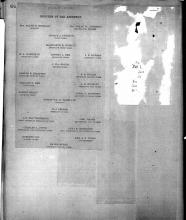
Friday, May 11, 1923
Officers of the Assembly
Hon. Frank F. Merriam
Speaker
Hon. Frank W. Anderson
Speaker Pro Tempore
Arthur A. Ohnimus
Chief Clerk
Ellsworth E. Eustice
Assistant Chief Clerk
R.A. Waestman
Assistant Clerk
Robert A. Orr
Assistant Clerk
J.E. Powers
Assistant Clerk
C. Wm. Booth
Minute Clerk
Adelyn B. Stafford
Assistant Minute Clerk
F.A. Cooley
Assistant Minute Clerk
Charles H. Erb
File Clerk
L.M. Bromley
Assistant File Clerk
Albert Brady
Journal Clerk
Hazel C. McIntosh
Assistant Journal Clerk
Bishop Wm. H. Moreland
Chaplain
W.J. Leflar
Sergeant-at-Arms
C.E. “Doc” Whiteside
First Assistant Sergeant-at-Arms
Geo. Hager
Bookkeeper, Sgt-at-Arms
Charles A. Joyce
Engrossing and Enrolling Clerk
Lena F. Heisinger
Asst. Engrossing and Enrolling Clerk
Everett Cox
History Clerk
Mrs. A.T. Perry
Postmistress
Daven Morey
Assistant History Clerk
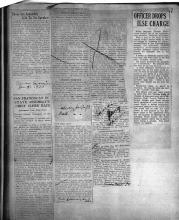
This page displays 6 newspaper clipping. 4 of the 8 newspaper clipping are unreadable.
First newspaper clipping reads:
Silver Set Assembly Gift to its Speaker
Speaker Frank F. Merriam of the assembly was honored by his colleagues today at a short session devoted to the expression of pleasure on the part of the house for the manner in which Merriam has discharged his duties and which ended with the presentation of a silver service set to Mr. and Mrs. Merriam on behalf of the Assembly.
Merriam was placed under arrest by sergeant-at-arms at the order of Assemblyman Chester Kline, chairman of the ways and means committee and escorted from the atrium for the purpose of making the presentation. The set was present by Assemblyman David C. Williams, Merced County.
Assemblyman Frank Anderson, Alameda County, speaker pro tem of the assembly, was presented with a silver gift, while Arthur Ohnimus, chief clerk, was given a silver cigarette case in recognition of his services.
The presentation speeches to Anderson and Ohnimus were made by Assemblyman T.M. Wright, Santa Clara Country, and Fred Moore, Humboldt Country.
Second newspaper clipping is a continuation from a different newspaper clipping reads:
San Franciscan in State Assembly’s Chief Clerk Race
(Continued from Page One)
Herbert Hoover, Secretary of the Interior.
The presentation of several programs for revision of State motor vehicle laws.
A proposal to levy a 1 cent tax per gallon on gasoline to provide funds for the maintenance of State and County highways.
A plan to declare gasoline and oil public utilities and place them under the regulation of the State Railroad Commission.
Passage of a measure to reduce the cost of fire insurance in California.
A measure taxing motor stage lines on the basis of gross receipts as is done in the case of railroads and other public utilities.
A grand scramble for minor jobs in the two legislative houses is expected as a result of Governor-Elect Richardson’s announcement that he will not seek to control the legislature’s patronage in the selection of clerks and minor attaches.
Arthur A. Ohnimus of San Francisco, minute clerk of the Assembly at five sessions, is in the field for chief clerk of the Assembly to succeed Jerome B. Kavanaugh, and claims to have a promise of forty votes. Kavanaugh, recently elected justice of the peace, will not be a candidate.
If Ohnimus is elected chief clerk, C. William Booth, of Oakland, assistant minute clerk at the last session, will be out for the job of minute clerk. Walter Hicks, of Sacramento, is also mentioned for the position.
It is expected W. I. Leflar, of Sacramento, and Joseph Nolan, of Los Angeles, will be reelected as sergeant-at-arms respectively of the Assembly and Senate.
It became known today that Rev. W.H. Hermitage, of the Episcopal Church, Sacramento, had consented to enter the race for chaplain of the assembly. Bishop Williams Moreland, Rev. W. E. Harrison, both of Sacramento and Rev. George E. Gardner, of Lincoln, are also candidates.
Third newspaper clipping is a continuation from a different newspaper clipping, it reads:
No Second Roll Call
“Get on the Lord’s side and vote for Merriam,” was Scott’s peroration and “Billy” Abbott of Mason Street, who had come to the capital with the Toy party, and who was an interested spectator in the lobby of the Assembly chamber, led the applause of the faithful for the “the Lord’s side.”
J.J. Prendergast of Redlands, and T.M. Wright of Santa Clara, were also nominees for speaker and each got a small complimentary vote. A number of those who had voted for these two candidates had pledge their votes for Rosenshine on the second roll call, but a second roll call never came.
Several members who had given their pledges to Rosenshine were won over before the Assembly met. And these were the votes that made the necessary majority for Merriam at the windup.
Though the Assembly had been organized to elect Merriam it was not sufficiently well organized to elect B.P. Benton, former assemblyman, as minute clerk. Bento was Merriam’s candidate, but he lost to C. William Booth of Oakland by vote of 25 to 53.
Others Elected
The other Assembly attaches elected were: Arthur A. Ohnimus of San Francisco chief clerk; Ellsworth R. Eustice of Gilroy, assistant chief clerk; W.J. Leflar of Sacramento, sergeant at arms.
For the first time in many years the Legislature was treated to a contest for the post of chaplain, Bishop W.H. Moreland of the Episcopal Diocese of Sacramento and the Rev. George M. Gardner of Lincoln being the chief contenders. Both candidates for several days have been actively electioneering and lining up members. Bishop Moreland won the post by a substantial majority.
The minority members who supported Rosenshine for speaker will doubtless be punished by being left out in the cold in the matter of committee appointments, all of which rest in the hands of the elected speaker. But the disciplining will probably result in coalescing the opposition in self-defense, both to ok the passage of bills… (the next few sentence and paragraph are not readable)
Fourth Newspaper clipping is a continuation of another newspaper clipping, it reads:
Against C. William Booth of Oakland, a competent man who had been at the desk two years ago.
The assembly just reared up and knocked Benton over by a vote of 53 to 25. Benton, who is from Los Angeles, an old time standpatter, had come up to get the job of sergeant-at=arms of the senate but that was not for him so he slipped over to his old stamping ground.
Honor for Anderson
A fine compliment was paid to Assemblyman Frank Anderson of Oakland. IN point of continuous service with five terms to his credit, he is the dean of the assembly-a quiet chap with progressive tendencies. He had been lined up for Rosenshine in the speakership fight,, had given his word and was first on the roll call. The Merriam cots tried to put him down for the sake, in part of a start-off with Merriam’s name. But Anderson did not break.
The assembly gave him, by unanimous vote, the honor post of speaker pro-tem, greatly to his surprise.
They had a battle over naming of a chaplain. Bishop W. H. Moreland of the Episcopal Diocese of Sacramento won the distinction as against the Rev. George M. Gardner of Lincoln. It was 50 to 28.
There was no opposition to Arthur Ohnimus of San Francisco as chief clerk nor to W. J. Leflar of Sacramento for reelection as sergeant-at-arms….
*The rest of this column newspaper clipping is not available.
Fifth newspaper clipping is a continuation of another newspaper clipping, it reads:
there was a stir as the unexpected happened. Then came the announcement of the division:
Merriam, 42: Rosenshine, 25: Prendergast, 7; Wright, 5; with one vote for E. H. Christian of Hayward.
Rosenshine took the defeat in good spirit and would not allow his friends to pervert a second for a unanimous vote for Merriam.
Thus it happened that Richardson’s candidate assumed the gavel in the din of applause, briefly express his thanks, asserted his spirit of fairness to all and asked for cooperation.
Committees Forming
Later Speaker Merriam asked the Assemblymen to make known their preferences as to committees membership and chairmanships, saying that he wished to make these important appointments without delay.
This is how the San Francisco Assemblymen voted:
For Rosenshine – Fred C. Hawes, Thomas A. Mitchell, Walter J. Schmidt, William B. Hornblower, Roy Fellom, Harry F. Morrison, Albert A. Rosenshine, John B. Badaracco.
For Merriam – Joseph F. Burns, William S. Scott, Louis F. Erb, Clarence W. Morris, William J. Rock.
Frank Anderson of Alameda was elected Speaker pro-tem without opposition. Arthur A. Ohnimus of San Francisco was chosen as chief clerk and C. William Booth of Oakland won over Dick Benton for the minute clerkship. W.J. LeFlar of Sacramento was returned as sergeant-at-arms. Bishop William H. Moreland of Sacramento was named chaplain.
Sixth newspaper clipping reads:
Officers Drops Ilse Charge
Police Sergeant Thomas McInerney backed out of an embarrassing situation yesterday afternoon.
With a jury in the court of Municipal Judge Lazarus ready to hear his charge of “resisting an officer” against Henry A. Ilse, Spokane bomb suspect the police man suddenly dropped it. At his request, Assistant District Attorney Arthur Ohnimus moved for dismissal and it was granted.
A group of American Legion men, who said they were there to see fair play, occupied several rows.
Ilse loudly protested the dismissal as “a whitewash.” His demand that he trial go on was ignored.
“I want Sergeant McInerney to explain why, on the night of my arrest, he held me for more than three hours in the office of a newspaper and knocked me out with a blackjack when I refused to pose for a picture,” said Ilse. “After I was down they kicked me all over the place.”
McInerney came to court on crutches. He says his knee was hurt in the “scruff” with Ilse.
The Grand Jury last night voted to indict Ilse and Thomas Boyle of charges of possession and use of explosives, Chief Deputy District Attorney Golden said these charges carry penalties of from one to fifty years. Boyle, a jobless accountant, confessed recently to the police that Ilse hired him to take the bomb north. It was planted in the Spokane office of the Associated Press for the purpose of blowing up the building which houses two newspapers against which Ilse Is said to have borne a grudge. The bomb failed to explode.
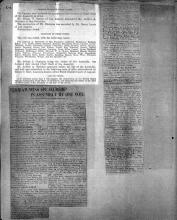
This page displays a paper document and 2 newspaper clippings.
The paper documents reads:
Nominations for Chief Clerk
The Speaker now declared the nomination and election of Chief Clerk of the Assembly in order.
Mr. Sidney T. Graves of Los Angeles nominated Mr. Arthur A. Ohnimus of San Francisco.
The nomination of Mr. Ohnimus was seconded by Mr. Harry Lyons of Los Angeles.
Nominations closed.
Election of Chief Clerk
The roll was called, with the following result:
For Arthur A. Ohnimus of San Francisco – Anderson, Badaracco, Badham, Baker, C.C., Baker, Edwin; Bernard, Bromley, Broughton, Burns, Carlson, Carter, Christian, Clarke, Cleveland, Coombs, Crittenden, Davis, Dawson, Dorris, Douglas, Dealer, Eksward, Emme, Erb, Fellom, Foster, Fox, Fulwider, Graves, Hawes, Heisinger, Hornblower, Johnson, Johnston, Jones Kline, Lyman, Morris, Mueller, Noyes, Pedrotti, Pomeroy, Prendergast, Reindollar, Roberts, Rock, Rosenshine, Saylor, Schmidt, Scott, Smith, Snyder, Spalding, Spence, Stow, West, Whitacre, Williams, Woodbridge, Wright, and Mr. Speaker-69.
Mr. Arthur A. Ohnimus, being the choice of the Assembly, was declared duly elected Chief Clerk of the Assembly.
Mr. Arthur A. Ohnimus appeared before the bar of the Assembly, and took and subscribed to the following oath of office administered by Elijah C. Hart, Associate Justice of the Third District Court of Appeal:
Oath of Office
I do solemnly swear that I will support the constitution of the United States and the constitution of the State of California, and discharge the duties of the office of Chief Clerk of the Assembly to the best of my ability.
The first newspaper clipping is a continuation of another newspaper clipping, it reads:
battle with the trimmings to come.
Assemblyman T. M. Wright seconded Jones’ name.
The roll call showed the alignment to be as follows:
For Merriam – R. J. Anderson, Badham, Brock, Browne, Carter, Cleveland, Cloudman, Coombs, Davis, Dayton, Deuel, Dillinger, Dodge, Duval, Easley, Eksward, Foster, Graves, Hartranft, Johnson, Jost, Little ,Lyons, McPherson, Melville, Merriam, Mixter, Murphy, Noyes, Pierce, Roberts, Scotfeld, Scudder, Sewell, Spalding, Walters, Weller, Wemple, S. V. Wright – Total 40.
For Jones – Adams. D. P. Anderson, Bernard, Broughton, Burns, Byrne, Campbell, Crittenden Croter, Dorris, Finney, Frye, Hawes, Heisinger, Hornblower, Jacobson, Jones, Levey, McDonough, McDowell, Eleanor Miller, James A. Miller, Mitchell, Morrison Mueller, Murray, Neilson, Oliver, Reindollar, Roland, Rosenshine, Runner, Saglor, Schmidt, Spence, West, Williamson, Woodbridge, T. M. Wright. Total 39.
Assemblyman Tom Louttit of Stockton, a Richardson supporter, was absent because of illness.
The entire San Francisco delegations previously pledge to Rosenshine, voted for Jones.
“We’re here for business,” Speaker Merriam said upon taking his office. “There is no reason for long speeches or a long session.”
Homer R. Spence of Alameda was the unanimous choice for Speaker pro tem, having been nominated by Assemblyman Frank L. Coombs, nector of the Lower House.
Ohnimus Reelected
Chief Clerk Arthur A. Ohnimus was also re-elected without a contest. Louis F. Erb, Former San Francisco Assemblyman, was made minute clerk by unanimous consent and C. William Booth of Oakland was chosen assistant chief clerk.
The position of sergeant-at-arms of the Assembly produced another row in that body.
William J. Leflar of Sacramento, who held the job at the last session, was nominated as were Charles Wilkenson of San Francisco and C.E. Whitesides of Los Angeles. Wilkenson (Lumber Jack Charley) and Whitesides each received thirty-three votes and Leflar twelve. Wilkenson was declared the nominee until Assemblyman Carter of Los Angeles dragged out the rule book and discovered that a majority of all the votes was needed. Lebar’s name with withdrawn and the final ballot gave Wilkenson forty-two votes and Whitesides thirty-six. Rabbi Rudolph I. Coffee was chosen Assembly Chaplain over Rev. William H. Hermitage of Sacramento.
Jones Declines
An effort was made by some of the Senators to have Senator Jones step out of the fight for the presidency pro tem, but he declined to do so. The attempt to make the Breed-Jones contest an administration-anti-administration one also failed, for the roll call showed the following lineup:
For Breed – Allen, Baker, Canepa, Chamberlin, Christian, Creighton, Crowley, Evans, Gray, Gates, Handy, Hurley, Ingram, A. B. Johnson, Jones, Kline, Lyon, Pedretti, Powers, Rush, Sample, Sharkey, Slater, Swing, Taylor, Tubbs, Sanborn, West, Young. Total 29.
For Jones – Boggs, Breed, Fellom, Harris, Hollister, Inman, M.B. Johnson, Lewis, Maloney, Murphy. Total 10.
Senator Jack Inman of Sacramento, who nominated Jones, had promised to deliver a bitter invective against the Richardson administration, but changed his mind, Senator Daniel Murphy of San Francisco…
*The rest of the article is cut off.
The second newspaper clipping is a continuation of another newspaper clipping, it might be the continuation from the first newspaper, and it reads:
Francisco; Reindollar, San Rafael; Roland, Oakland; Rosenshine, San Francisco; Spence, Alameda; West , Sacramento; Williamson, San Francisco; Woodbridge, Roseville; T.M Wright, San Jose. – 39.
Absent – Louttit, Stockton.
Shift Explained
Now for the inside of the shift which put Jones up to bear the brunt of the battle at the change of front.
Two members of the Assembly, checked as against the Richardson administration, are T. M. Wright of Santa Clara and Eleanor Miller of Pasadena, but they had given notice they would not vote for Rosenshine, the San Francisco Progressive Republican leader. In the caucus after Wright had so express himself, he also added that Homer Spence of Alameda or Jones would be acceptable to him.
Spence, subordinating the personal element to the cause, refused to allow his name to be considered, declaring after a full consideration that ‘Jones appeared to be the man.” So Jones was selected.
Wright and Miss Miller did vote for Jones, but Coombs of Napa, who had said he would support Rosenshine, declined to vote for the Ontario candidate.
Wright “Dry” First
Wright is an ultra “dry” and that in part accounts for his attitude toward Rosenshine, who has not taken “dry” program.
“Wright is a strongly conscientious ‘dry’ first and Progressive afterwards,” was the way one San Francisco Legislator put the situation.
Assemblyman Archibald Brock of Redlands could have swung the election to Jones, but went to Merriam. The insiders say Brock was tied into the Merriam camp too strongly to be budged even for his neighboring associate victory to Rabi I. Coffee of Oakland as chaplain. He defeated the Rev. William H. Hermitage of Sacramento.
Arthur A. Ohnimus of San Francisco was unanimously chosen chief clerk. C. William Booth of Oakland was appointed assistant chief clerk and former Assemblyman Louis Erb of San Francisco as named minute clerk, but unopposed.
Assemblyman Homer Spence of Alameda was elected speaker pro tem without contest.
Richardson Silent
Gazing over the battlefield, Governor Richardson made no public comment. ON the other hand the antis say with considerable force that by the narrow margin, too close, for comfort, it looks as though all of the pre-election boastings from the Capitol had been pretty well punctured. The administration will have to exert every pound of strength it can raise to hold the legislature in line, it was asserted after the fight.
So narrow is that margin that for instance Assemblyman C. C. Spalding of Santa Clara was jammed to vote for Merriam by business connections. He explained to friends that he is manger of a branch bank under the same organization as one with which Merriam will shortly be identified.
By the way, Assemblyman Robert McPherson of Vallejo nominated Speaker Merriam, while Rosenshine named the caucus choice of the antis-Jones.
The San Franciscan declared that the fight would go on, win or lose, to maintain the same principles, which were battled out in the great King tax bill fight of four years ago and in the budget contest of two years ago.
Of course, the committees will belong to the administration. There will be little “pie” distributed to thirty-nine who stood out.
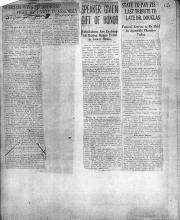
This page displays 3 newspaper clippings.
The first newspaper clipping is a continuation of another news clipping, it reads:
Merriam Wins Speakership Fight by 1 Vote in Assembly
Under the administration wall and break down Merriam’s support and beat him.
But the vote did not pan out that way.
Governor elect Richardson let it be known in no uncertain terms that he wanted Merriam. His scouts brought in a number of the Assemblyman this morning after antis had really shown some strength in their move of yesterday to make it an anti-Merriam contest, with elimination of Rosenshine after the first ballot if that should have been necessary.
“White man mighty onsartain,” and when noses were counted the gubernatorial force move had its effect.
The fight has left traces of bitterness, and it presages a lot of trouble. The progressive element is on watch. Leaders on that side openly declare that reactionary measures will not get by the Assembly, no matter if Merriam, who is of the regulars, does name the committees.
The progressives took a lot of comfort out of the close vote.
Merriam, however, started to pour fourth oil and announced after he took up the gavel that there would be an even break on committees. But one many be sure that they are not going to be turned over to the group which gave him and Richardson battle today.
One glimpse of what may be in sight was given in the way that former Assemblyman Benton of Los Angeles was bowled over when he went in for the job of minute clerk against C. William Booth of Oakland, a competent man who had been at the desk two years ago.
The assembly just reared up and knocked Benton over by a vote of 53 to 25. Benton, who is from Los Angeles, an old time standpatter, had come up to get the job of sergeant-at-arms of the senate, but that was not for him, so he slipped over to his old stamping ground.
A fine compliment was paid to Assemblyman Frank Anderson of Oakland. In point of continuous service with five terms to his credit, he is the dean of the assembly-a quiet chap with progressive tendencies. He had been lined up for Rosenshine in the speakership fight, had given his word and was first on the roll call. The Merriam scouts tried to put him down for the sake, in part of a start-off with Merriam’s name. But Anderson did not break.
The assembly gave him, but unanimous vote, the honor post of speaker pro-tem, greatly to his surprise.
They had a battle over naming of a chaplain. Bishop W. H. Moreland of the Episcopal Diocese of Sacramento won the distinction as against the Re. George M. Gardner of Lincoln. It was 50 to 27.
There was no opposition to Arthur Ohnimus of San Francisco as chief clerk nor to W.J. Leflar of Sacramento for re-election as sergeant-at-arms. E.E. Eustice of Gilroy was made assistant chief clerk. And that is the way the assembly organized. Tomorrow there will inauguration of Governor-elect Richardson and all the legal formal things to be done. After that Speaker Merriam will get his committees named and there will start the biennial flood of bills, resolutions and whatnot.
Second newspaper clipping reads:
Speaker Given Gift of Honor
Felicitations are exchanged during Happy Event in Lower House.
One of the happy incidents of the assembly session occurred yesterday forenoon, when the lawmakers stopped in the midst of their arduous duties to express a pretty sentiment from their deeper selves.
Kline took the speaker’s stand and Speaker Merriam was brought before the bar of the house on mimic charges, made to hear the indictment presented by Kline tried and sentenced to accept a beautiful seven-piece silver set as a token of his co-workers.
Merriam made reply with happy emotion at so great an evidence from his colleagues. He thanked the donors for the gift and said he would prize it not for its intrinsic value but for the deeper sentiment which prompted it-respect and esteem.
He said he had a delightful time during this session and had enjoyed the many clean fights that had been waged between those who had lined up on opposed sides upon questions of moment. He said he liked a good fight and wanted to say that those which had passed under his gavel during the session had been fought with due regard to the amenities and verities. Mrs. Merriam also thanked the assemblymen.
Frank W. Anderson, speaker pro tem, was then called and presented with a silver humidor full of police hips, which was a sort of satire in silver, since Anderson’s friends say he doesn’t know one card from another. The utility of the present, however, is found in its double capacity. He does smoke and the piece is useful as a humidor.
Arthur A. Ohnimus, the chief clerk, was present with a beautiful silver box full of cigarettes. Both Anderson and Ohnimus acknowledged these expressions of good will and esteem in appreciative words.
In each case Sergeant-at-Arms William J. Lefler and assistant ‘Doc” C.E. Whiteside, held the recipients in custody while the sentence of each was imposed solemnly by Line, the play judge on the dais. With each judgment was given a round of loud hand clapping, indicating that the job had been done well and that it was unanimously approved.
The third newspaper clipping title reads:
State to pay its Last Tribute to Late Dr. Douglas
Funeral Service to be held in Assembly Chamber today
California legislators will put aside the work of making laws today and pay a last tribute to their late colleague, Assemblyman Gustave H. Douglas, member from Del Norte County, who died suddenly here Wednesday afternoon.
The body of the deceased will be taken to the assembly chamber this morning at 10 o’clock and there lie in state until 2 o’clock, when funeral services will be solemnized. It will be a state funeral. Legislative and state officers of all departments will attend.
Funeral this Afternoon
At 1:45 p.m. the two legislative bodies and state officials will gather in the assembly chamber for the ceremonies. Following is the order of the services:
Selection-Chopin’s Funeral March, orchestra.
Selection - male quartet.
Scripture reading and prayer – Rev. Wm. E. Harrison, chaplain of the senate
Address - Bishop William H. Moreland, chaplain of the assembly.
Selection -“Jesus Lover of My Soul” male quartet.
Eulogy - Thos. J. Flammer, Sacramento Lodge of Elks.
Addresses by Frank F. Merriam, speaker of the assembly; C.C. young, president of senate.
Selection – Male quartet
Benediction – Bishop William H. Moreland.
Selection – “The Vacant Chair,” orchestra.
Pallbearers-Senators H. C. Nelson and F. J. powers; Assemblymen T. A. Mitchell, Fres J. Moore Earnest Dozier, A. J. Matthews.
At the west end of the capitol the funeral march will be taken up and the senators and assemblymen will march to the city cemetery at the end of Tenth Street, where interment will take place.
Will have Escort
In the line of march will be the following:
Military escort – Company G, 159th infantry, California National Guard.
Clergy, hearse and pallbearers, family of deceased, governor, lieutenant governor and speaker of assembly, members of the legislature, state officers, delegations (other than legislative), societies and friends.
Senate committee – Senators H. C. Nelson, F. J. powers, A. E. Osborne; also Jos. Beck, secretary of senate.
Assembly committee – Assemblymen Elmer Bromley, Jos. Burns, Chas. W. Cleary Emmett Donahue, Bert Snyder, and also Arthur Ohnimus, chief clerk of the house.
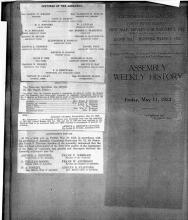
This page displays 5 paper documents.
First document reads:
Officers of the Assembly
Hon. Henry W. Wright
Speaker
Hon. Clarence W. Morris
Speaker Pro Tempore
John H. Martin
Minute Clerk and Acting Chief Clerk
B.O. Boothby
Chief Clerk
W.J. Leflar
Sergeant-at-Arms
W.E. Monahan
First Assistant Clerk
Rev. Robert L. McArthur
Chaplain
Milton W. Sevier
Assistant Clerk
Jerome B. Kavanaugh
Assistant Clerk
Ellsworth E. Eustice
Assistant Clerk
Arthur A. Ohnimus
Assistant Minute Clerk
Daniel Pyne
Assistant Minute Clerk
Arthur H. Samish
History Clerk
Louis F. Erb
File Clerk
Leonard O. Hall
Assistant History Clerk
Harold W. Wright
Assistant File Clerk
Melvin E. day
Bookkeeper, Sgt-at-Arms
J.O. Hestwood
Engrossing and Enrolling Clerk
Vernon W. Lilley
Journal Clerk
Mrs. Florence Blood
Postmistress
Second document reads:
Resolution
The following resolution was offered:
By Mr. Baker Edwin:
Resolved, That the Speaker appoint a committee of three to notify the Senate that the Assembly has reconvened, pursuant to Assembly Concurrent Resolution No. 5 adopted on February 2, 1923, and is ready to proceed with the business of the State, with all officers heretofore elected present, to with;
Speaker Hon. Frank F. Merriam
Speaker pro tempore Hon. Frank W. Anderson
Chief Clerk Arthur A. Ohnimus
Minute Clerk C. Wm, Booth
Chaplain Rev. Wm. H. Moreland
Sergeant-at-Arms Wm. J. Lefiar
Third document reads:
Also:
Assembly Chambers, Sacramento, May 16, 1923.
Mr. President: I am directed to inform you honorable body that the Assembly on this day passed Senate Bill No. 184-As act to add two new sections to the Political Code to be numbered 4464 and 4464, relating to newspaper of general circulation.
Arthur A. Ohnimus, Chief Clerk
By James E. Powers, Assistant Clerk
Fourth document reads:
Adjournment Sine Die
At five o’clock p.m. on Friday, May 18, 1923, in accordance with the provisions of Assembly Concurrent Resolution No. 12, the Honorable Frank F. Merriam, Speaker of the Assembly, announced that the time for Final adjournment of the forty-fifth session of the Legislature of the State of California had arrived and thereupon declared the Assembly adjourned sine die.
Arthur A. Ohnimus,
Chief Clerk of the Assembly
C. William Booth,
Minute Clerk of Assembly
F. A. Cooley,
Asst. Minute Clerk of Assembly
Frank F. Merriam,
Speaker of the Assembly
Frank W. Anderson,
Speaker pro tempore of Assembly
Adeyln B. Stafford
Asst. Minute Clerk of Assembly
Fifth Document reads:
California Legislature
At Sacramento
Forty-Fifth Session
First Half-January 8 to February 2, 1923
(Which Preceded Constitutional Recess)
Second Half-Beginning March 5, 1923
Synopsis and History of Assembly Bills, Constitutional Amendments, Concurrent and Joint Resolutions
Assembly Weekly History
Showing Action on all measures to Friday, May 11, 1923
*The rest of this document is ripped off.
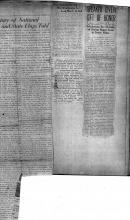
This page displays 4 newspaper clippings which are difficult to read.
First newspaper clipping is difficult to read, the only thing that is readable is the title which says: Story of National and State Flags told. And the second column of the clipping, it reads:
“Daniel Webster, in his famous 7th of March speech, made the follow allusion to the Bear flag: ‘It so happened that in the distracted and feeble state of the Mexican government, before the declaration of war by the U.S. against Mexico had become known in California, under the lead of American officers, the people of California overthrew the existing provincial government of California and ran up an independent flag When the news arrived in San Francisco, that war had been declared by the U.S. against Mexico, this independent flag was pulled down and the Stars and stripes of the Union hoisted in its stead.’
“It is to be remembered that by the failure of congress to establish a territorial government in California, she was constrained to establish a government for herself.
“The Bear flag is preserved and honored today because it is typical of the early pioneer of California. When you look upon the flag, you see not only the flag but the early struggled of the men of that day and the history of California of the time. You may read in the Bear flag that the story of the great gold rush, the misfortunes of the ill-fated Donner party, and the lives of the men that made California and this flag possible.
“You have here a beautiful school, a charming principal and an excellent staff of teachers. You live in the bear city of this state, you live in the most glorious state in the Union and the most wonderful country in the world.
“Obey your teachers, love and honor your country and your state. Always stand for law and order, and above all things be proud of your flag.
“Obey your teachers, love and honor your country and your state. Always stand for law and order and above all things be proud of your flag.
“Let there ever remain in your heart a deep devotion for the country and the flag that has always stood for liberty and justice. May no act of yours bring discredit to this country or to your flag.
“And now on behalf of El Dorado Parlor No. 52, Native Songs of the Golden West, I take great pleasure in presenting to Jefferson school the American flag and the state flag of California-the Bear flag.
“May the ever remain in peaceful possession of this school, and may the children of this school ever remain faithful and true to these two flags.”
Second newspaper clipping reads:
Harry Chamberlin and Mrs. Woodbridge to Lead March at Ball
Senator Harry Chamberlin, Los Angeles County, has been chosen by C. N. Whiteside, chief assistant sergeant-at-arms of the assembly to lead the grand march at the legislative ball to be given by the attaches at the Temple April 20th. Chamberlin has accepted the honor and with Assemblyman Mrs. Cora Woodbridge of Placer County will lead the grand march.
Whiteside announced the women attaches of the legislature who will form the reception committee headed by Arthur Ohnimus, chief clerk of the assembly. They are:
Madge Cross, Ethel Doebler, Violet Brossard, Ethyl Secour, Helen Obriket, Verne Capelli, Norma Archer, Margaret Laurence, Irene Murphy, Martha Clarke, Lottie Hurd, Lillian Burger, Daisy Lacey, Rowena Crowley, Rose Roey, Marguerite Sweet, Norine Morrill, Elfried Wheathoff, Kathleen Tuite and Abbie Ford.
Other members of the committee are James E. Powers, C. H. Erb, W. S. Street and Irvin C. Toomey.
Third newspaper clipping reads:
Hickman appeared before Municipal Judge Frank W. Dunn to answer to the murder charge and the case was postponed until 2 p.m. Tuesday at the request of Asst. Dist. Atty. Arthur Ohnimus. Bail was denied.
Postponement Granted
Led into the case with a group of drunks and other minor offenders, Hickman’s dapper appearance was in marked contrast to that of his companions. He was smiling, but the smile seemed forced.
Called into the case by telephone half an hour before, Atty. Harry A. McKenzie indicated that he would call a postponement, but when the case was called, announced his willingness to proceed at once. Mr. Ohnimus objected, on the grounds that Mr. McKenzie was trying to “smoke out” the police case, and the postponement was granted.
Hickman was denied bail. After the arraignment he was visited in his cell by his brother.
Fourth newspaper clipping reads:
Speaker Given Gift of Honor
Felicitations are exchanged during Happy Event in Lower House
One of the happy incidents of the assembly session occurred yesterday forenoon, when the lawmakers stopped in the midst of their arduous duties to express a pretty sentiment from their deeper selves.
Kline took the speaker’s stand and Speaker Merriam was brought before the bar of the house on mimic charges, made to hear the indictment presented by Kline tried and sentenced to accept a beautiful seven-piece silver set as a token of his co-workers.
Merriam made reply with happy emotion at so great an evidence from his colleagues. He thanked the donors for the gift and said he would prize it not for its intrinsic value but for the deeper sentiment which prompted it-respect and esteem.
He said he had a delightful time during this session and had enjoyed the many clean fights that had been waged between those who had lined up on opposed sides upon questions of moment. He said he liked a good fight and wanted to say that those which had passed under his gavel during the session had been fought with due regard to the amenities and verities. Mrs. Merriam also thanked the assemblymen.
Frank W. Anderson, speaker pro tem, was then called and presented with a silver humidor full of police hips, which was a sort of satire in silver, since Anderson’s friends say he doesn’t know one card from another. The utility of the present, however, is found in its double capacity. He does smoke and the piece is useful as a humidor.
Arthur A. Ohnimus, the chief clerk, was present with a beautiful silver box full of cigarettes. Both Anderson and Ohnimus acknowledged these expressions of good will and esteem in appreciative words.
In each case Sergeant-at-Arms William J. Lefler and assistant "Doc” C.E. Whiteside, held the recipients in custody while the sentence of each was imposed solemnly by Line, the play judge on the dais. With each judgment was given a round of loud hand clapping, indicating that the job had been done well and that it was unanimously approved.
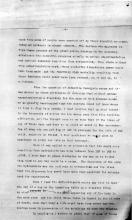
-4-
upon thousands of people were carried off by those dreadful scourges. Today an epidemic is almost unknown. The doctors who appeared before these present at the great public hearing in the Assembly, attributed the wonderful progress chiefly to animal experimentation and medical research resulting from vivisection. They state without this experimentation work, these wonderful discoveries never could have been made and the fearfully high mortality resulting from these diseases could never have been reduced, as it now is, to a minimum.
When the question of Infantile Paralysis arose and it was stated by these professors of medicine that without animal experimentation a discovery for the cure of this disease would be so greatly handicapped that the doctors would not know where to turn to find this remedy. I must confess that my mind turned to the thousands of babies who die every year from this terrible affliction, and the thought came to me then that if the lives of any of those near and dear to us could be saved by the surrendering of even our own pet dog or cat in exchange for the life of our child, relative or friend, I feel confident we would show no hesitancy in giving our pets in that exchange.
When it was called to my attention that the death rate resulting from hydrophobia has been reduced from 12%to 14% to .077% I felt that to place obstacles in the way or to hinder this work in any way would be a crime. The discovery of the cure for hydrophobia was due entirely to vivisection and the lives that the discovery has saved have more than equaled the animals used for experiments.
When I hear the Anti-vivisectionists say that to hear the cry of a dog on the operating table is a dreadful thing my minds reverts to the more appealing cry of the bay in the sick room and the child whose voice is hushed in the silence of death, when that baby’s life might have been saved had the doctors been in possession of the knowledge to cure the disease.
In conclusion I desire to state that if none of those…
*The rest of the document is not available.
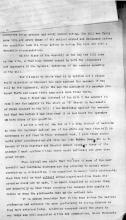
committee being present and every member voting. The bill was fully gone into and every phase of the subject argued and discussed before the committee took its final action in voting the bill out with a favorable recommendation.
On the floor of the Assembly on the day the bill came up for vote, a four hour debate ensued by both the proponents and opponents of the measure, seventeen of the members speaking on the bill.
Now I’d desire to state that in my opinion not a single valid objection or argument was made against the passage of the bill by its opponents, while the men who advocated its passage produced facts and based their arguments upon those facts.
When I first was informed of the bill I was against it; when I saw the exhibit in the store on “K” Street in Sacramento of those opposed to the bill, I was decidedly against the measure but that was before I had even read it or had heard the speeches of both sides of the question.
I am not a medical man nor am I a deep student of medicine so when the foremost medical men of the state say that this bill is necessary to aid them in their research work, I give these statements great consideration and when men like Father Ramm, Dr. A. H. Keenan of this district and Chester Rowell speak in favor of its passage I must confess I take their words seriously and give them great weight.
When medical men state that the cure of some of the most dreadful and loathsome disease are due entirely to animal experimentation or vivisection, I am compelled to accept their statements; when they tell me that without animal experimentation these discovers could not be made, I am again compelled to believe them, and especially so when those opposing the measure were unable to refute or deny the statements made by the medical men.
It is common knowledge that in the days before the medical profession had achieved the same proficiency in curing disease as they have attained today, epidemics occurred every few years in our large and well-populated cities and communities, where thousands..
*The rest of this document is not available.
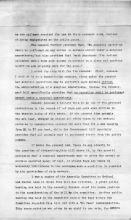
as the colleges require) for use in their research work, instead of being asphyxiated at the public pound.
The measure further provides that, “No surgical operation shall be performed on any animal or animals except under a surgical anesthesia;” and also provides that “such purchaser (the medical colleges) shall keep such animal or animals in a clean and sanitary condition and properly care for the same.”
I voted for this bill for two reasons: First, because I felt it to be a humanitarian measure, since under the present law surgical operations may be performed upon animals without the administration of a surgical anesthesia, whereas the Prendergast bill specifically provides that no operation shall be performed except under a surgical anesthesia.
Second: because I believe this is to be one of the greatest protections to the owners of pet dogs and cats ever written in the statue books of this state. At the present time animals who are lost, strayed or stolen are often taken to the medical colleges by unscrupulous person who sell them for a sum ranging from $2 to $7 per head, while the Prendergast bill specially provides that all animals must be purchased direct from the public pounds.
If under the present law, there is any cruelty in the practice of vivisection, this bill cures it, by the special provision that a surgical anesthesia must be given the animal or animals operated upon; if lost, or stolen dogs are taken mercenary individuals to the colleges such a condition is remedied by the provisions of this measure.
I was a member of the Assembly Committee on Medical and Dental Laws to which this bill was referred. A great public hearing was held in the Assembly Chamber about two weeks previous to the consideration of the bill by the committee. Another public hearing was held in the Committee room a few days before the Committee reported this bill out with a “Do Pass” recommendation. This recommendation was given by an eighth to one vote, the entire…
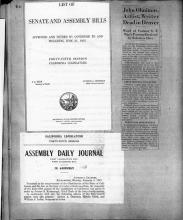
This page displays 2 documents and a newspaper clipping.
First is a paper document that reads:
List of
Senate and Assembly Bills
Approved and Vetoed by Governor to and Including June 22, 1923
Forty Fifth Session California Legislature
J. A. Beek
Secretary of Senate
Arthur A. Ohnimus
Chief Clerk of Assembly
(California Seal is here)
California State Printing Office
Frank J. Smith, Superintendent
Sacramento, 1923
Second is a paper document that reads:
California Legislature
Forty-Fifth Session
Assembly Daily Journal
First Legislative Day
First Calendar Day
In Assembly
Assembly Chamber,
Sacramento, Monday, January 8, 1923.
Pursuant to the requirements of the Constitution of the State of California and the law, at the hour of twelve o’clock meridian, the Assembly of the forty-fifth session of the Legislature of California was called to order by Jerome B. Kavanaugh, Chief Clerk of the forty-fourth session.
In conformity with law, the following officers of the forty-fourth session were also present: Arthur A. Ohnimus, Minute Clerk, and William J. Leflar, Sergeant-at-Arms.
Third is a newspaper clipping that reads:
John Ohnimus, Artist, Writer Dead in Denver
Word of Former S.F. Man’s Passing Received by Relatives Here
One of San Francisco’s famous figures of old Bohemian days-John Ohnimus, 63, artist, literary critic, and free thinker is dead in Denver. Word of his demise was received here by his cousins, George Ohnimus, of the San Francisco Police Department, and Miss Mary Deck, of 3586 Seventeenth Street.
John Ohnimus was born in San Francisco and grew up in the Bohemian atmosphere of the old art colony. He painted, he dreamed, he read widely and in time became an authority on both art and literature. His book on art written in later years was considered to be an outstanding work.
First Edition Collector
Ohnimus passed most of his life browsing in art galleries and book stores. He was an indefatigable collector of first editions. When the famous Huntington library in Southern California gathered together Ohnimus was called in as a consultant. Many fine private libraries owned their excellence to his literary judgment.
Some of his art works are famous. One, a head of Lincoln, was painted after he had read practically every book written on the subject. He was a lover of Henry Irving and followed Irving, through sixty-five towns, intrigued by his dramatic portrayals.
Perpetual Romanticist
A perpetual romanticist, Ohnimus was painting in a Mexican cathedral on one occasion, when a young girl entered. Struck by her beauty he painted her into his picture. She is now Mrs. Ohnimus and survived him with two sons and three daughters: Homer Ohnimus of Denver; John G. Ohnimus, of St. Louis; Mrs. Maria Ellis and Mrs. Sarah C. Lang of Denver and Mrs. Carmen Nower, of Louisville, Ky.
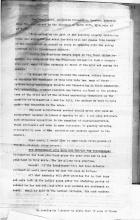
The Prendergast, so-called Vivisection Measure, Assembly Bill 798, was passed by the Assembly on March 30th, by a vote of 47 to 25.
This action on the part of the Assembly clearly vindicates those who supported and voted for this bill and places this branch of the legislative on record as being in sympathy with the policy outlined in the Prendergast measure.
During the four-hour debate waged on the floor of the Assembly, the members of the San Francisco delegation took a conspicuous part, many of them speaking in favor of the bill and urging its passage.
A deluge of letters flooded the members, either favoring or opposing the enactment of this bill into law, many of these letters being exceedingly abusive and threatening in their character. Yet, personally, I never received on letter confined to the provisions of the bill; all of the writers expressing themselves on the question of vivisection – and the bill, the measure we were to vote upon - was forgotten in the melee.
Why such a vociferous protest should arise over such an unimportant measure is indeed a mystery to me. I can only attribute such strenuous opposition to the campaign of misrepresentation, false statements and even in some instances, to glaring untruths, circulated by some of the societies and workers opposed to the measures.
Once again, I would like to make these vital points of the bill clear to every person.
THE PRENDERGAST BILL DOES NOT PROVIDE FOR VIVISECTION:
Vivisection has been practiced since the year 1913 and is now practiced in this state. The law allows this practice.
Second: If the Prendergast bill had been defeated vivisection would have gone on just the same as before.
All this Assembly Bill #798 provides for is that dogs and cats left in the public pound after the statutory period of redemption has expired, and after such animals are condemned to death, shall be sold to the medical colleges, (in such members…
*The rest of document can be found under scrapbook1_085 link.
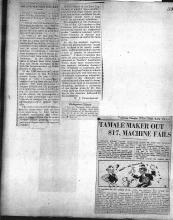
This page displays 4 newspaper clipping.
First newspaper clipping reads:
Are our Teachers Deficient
In the “Examiner” of recent date, Walter Holloway, “a former high school principal” is quoted as follows:
“That of the 1218 teachers in San Francisco, seventeen have had no training beyond the elementary grades and that only 111 have been through high school.”
In view of the fact that San Francisco will soon be called upon to vote on a bond issue of three and one-half million dollars for the construction of new schools, acquiring land for school site and the remodeling of buildings, I feel that these statements would not go uncorrected and take issue with Mr. Holloway. In this connection I desire to submit these facts, taken from the sworn statement on file with the Superintendent of Public Schools of this city.
Of the 1347 teachers and principals employed in San Francisco schools during the year 1916-17, instead of “only 111 elementary teachers having been through high school,” 890 were graduates of universities, a total of 1016. Of the 331 teachers unaccounted for in the above, the presumption is that a large percentage have had high school training, but no figures on this point are at present available.
The rules of the Board of Education for many years pats requires new appointees to hold regular teachers certificates and preference is given to those who have had Normal School Training or in the pedagogic department of recognized colleges.
Second newspaper clipping reads:
In 1915 session of the State Legislature, of which I was a member, amended the State School law so as to require that candidates for examination should have a high school (or equivalent) education.
The statement of Mr. Holloway, “That of the 1218 teachers in San Francisco only seventeen have had no training beyond the elementary grades,” needs no comment and it is too frivolous to warrant any serious attention in view of the facts given.
As for teachers’ institute which the article was “scored an declared to be utterly inadequate, and that the teachers show a lack of interest in educational matters” I desire to mention that there are great numbers of teachers interested in Teachers’ Association Work, many more attended summer session, extension classes of the University of California, Professional Reading Circle in schools and are generally well-informed on all subjects concerning education.
Attacks of this character are misleading and often result in harm. If there is any fault in our system of education, certainly a correction of the figures given by Mr. Holloway does not show that the blame lies in the direction indicated by his statements.
N. J. Prendergast
Third newspaper clipping reads:
Delegates Chosen
Arthur A. Ohnimus, John Morrison and Elmer Doidge, have been elected delegates of El Dorado parlor No. 52, N.S.G.W., to attend the grand parlor convention in Sacramento May 12.
Fourth newspaper clipping reads:
Tamale Maker out $17, Machine Fails
“Muchas gracias” smiled Antone Marquez as his deft brown fingers concocted the ingredients for the Mexican tamale at his establishment at 554 Fourth Street.
“The making of the tamale and the chile con carne and the tortillas will be a task of much pleasantness, for has not my good friend, Senor Octana Peralta sold me the wonderful machines for the making of tamales”
Marquez was happy. Peace was in his soul. He had the wonderful machine that would make the perfect, the juicy and the fat tamale just by the turning of the crank. Senor Peralta, 1446 Turk Street, had guaranteed it and had told Marquez that from now on the machine would take from him on the back-breaking toll of preparing the corn husks and tying them at each end, with a string about the middle for those that contained the chicken giblets.
“Ha, ha” laughed Marquez. “The hard work it is gone. I turn the crank. Even the machine the olive will put in the tamale without exertion on my part. Perhaps if all works well two olives shall I put in the tamale.”
Marquez poured the tamale paste into the machine and turned the crank. No tamale came out.
Marquez sped to Peralta’s store and denounced him and his machine.
Peralta called on Assistant District Attorney Arthur Ohnimus and had Marquez cited for refusing to either pay for the machine or return it.
Marquez told his story to Ohnimus and got sympathy. But Marquez was told to pay Peralta $17.50 for the use of the machine and go back to hand made tamales.
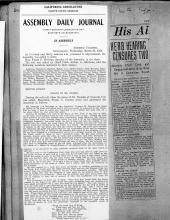
This page displays an Assembly Daily Journal and a newspaper clipping.
The Assembly Daily Journal reads:
California Legislature
Forty-Fifth Session
Assembly Daily Journal
Thirty-Seventh Legislative Day
Eightieth Calendar Day
In Assembly
Assembly Chamber,
Sacramento, Wednesday, March 28, 1923.
At 9 o’clock and thirty minutes a.m., pursuant to adjournment, the Assembly was called to order.
Hon. Frank F. Merriam, Speaker of the Assembly, in the chair.
The roll was called by Chief Clerk Arthur A. Ohnimus, and the following members answered to their names:
Anderson, Badaracco, Badham, Backer, C.C., Baker, Edwin; Ball, Bernard, Bromley, Broughton, Burns, Carlson, Carter, Christian, Clarke, Cleary, Cleveland, Connolly, Coombs, Crittenden, Croter, Davis, Dawson, Dean, Donohue, Dorris, Dozier, Duval, Eksward, Emme, Erb, Fellom, Foster, Fox, Fulwider, Graves, Hawes, Heisinger, Hornblower, Johnson, Johnston, Jones, Kline, Lyons, Mathews, McDowell, McPherson, Miller, Mitchell, T.A., Moore, Morris, Morrison, Mueller, Noyes, Pedrotti, Pomercy, Prendergast, Reindollar, Roberts, Rock, Rosenshine, Saylor, Schmidt, Scott, Smith, Snyder, Spalding, Spence, Stevenot, Stow, Weller, West, Whitacre, Williams, Woodbridge, Wright, and Mr. Speaker – 76.
Quorum present.
Eulogy by Mr. Coombs.
During the roll call, when the name of Dr. Douglas of Crescent City was called, Honorable Frank L. Coombs arose and addressed the Assembly as follows:
Mr. Speaker and Member of the Assembly: Gustave H. Douglas has failed to answer as his name was called, and it will never more be answered in this forum. But we hope it may be called and responded to in a higher hall than this, on a far shore where we may meet him again.
Gustave H. Douglas was born in the State of new York in the year of 1860. At the time of his passing away he was sixty-three years of age. During the brief space allotted, he had gone through many experiences, many fights for life, through many hopes and fears, through many trials, and with it all he has administered to struggling humanity; has stood beside the bed of hope and seen the enigma of life ushered into the world; has stood beside the bed of despair and seen life cross the narrow strait that divides us by frailty of a breath. He has seen the phantoms of despair in the last hours, he has seen the visions of hope, and these have molded his character and made him better fitted for the vicissitudes of life, and its struggles, and it has caused him to indulge in the pursuits that relate to the aspiring of man. He has been engaged in a governmental service in a struggle against the disease of the North swept at times by some contagious wind. He has gone across the troubled waters, amid the ruins of battle and pestilence, and been decorated by the white hands of a Queen. He has raised from poverty and disease, so far as he could, and so far as his administration of relief could go, the little children who seem to have come into this world without the rays of hope. He has returned and gone back to struggling again in the old fields, returned after the decorations by the hands of a Queen in thoughtfulness of his administration and his mercies to children to be decorated by other garlands, garlands made by the many hands of affection.
He has come to the Legislature from those who sent him here to make laws for this great country of ours, and as I saw him for the first time, and talked to him before the recess, it came to me that there was a man to love, a man whose friendship was desired; there was the man whom you would like to draw closer, and knit closer to you in the sacred bonds of friendly relation. But that inspiration does not go out to all men. It is only a few of those whose innate qualities recommend themselves to the souls of others, and I believe that was the character of Dr. Douglas.
He was engaged in a work here more specifically of building something in the far North that would span the ridges between there and us-the Klamath that has poured from the mountains down to the sea in its impassable splendor. His plan was to bridge this, that for the footsteps of man might be led beyond what we dare call the centers of civilization. That was his greatest hope here, and I know that out of response to that, out of memory of him, this Legislature will carry his project on.
Life is strange, we know not of death. Since man first leaped from the shores washed by the tides of an elder world and came struggling here, one question has been asked and asked – “If a man dies shall he live again?” The only answer to it is the hope that a man does not go out into darkness, for the wish is father to the thought, the thought of immortality in the world to come. But I believe that we should consider these things in a philosophical light. Man is born, he comes into the world and sheds his rays of light and his blessings, and they remain imperishable. These things cannot go out with him, they remain a part of the race. There is some spark in the sky that shines nevertheless on you and me, some little influence, some little touch of the vanished hand, some little remembrance of the voice that is still, and no matter how humble, we have not lived in van. I believe that we should treat life, not as a mystery, but as something philosophical, and when we go out it should be with the philosophy expressed in the beautiful words of Swinburne:
“From too much love of living,
From hope and fear set free,
We think with brief thanksgiving,
Whatever gods may be,
That no life lives forever,
That dead men rise up never,
That even the weariest river,
Winds somewhere safe to sea.”
The newspaper clipping reads:
Herb Hearing Censures Two
Assembly Chief Clerk and Sergeant-at-Arms Only Ones Hit in Committee Report
Examiner Bureau, Sacramento, March 6 – The Assembly special committee, investigating charges of attempted extortion in connection with Assemblyman Edward J. Smith’s Chinese herb bill, today exonerated Smith and his former law partner, J. E. Hood, severely censured Chief Clerk Arthur A. Ohnimus and Sergeant-at-Arms Charles H. Wilkinson of the Assembly, and condemned “cinch bills.”
Although Senator Edgar S. Hurley was mentioned with Smith in the testimony of three Chinese witnesses, as one of the men who were to share in the alleged bribe of $5000 which former Assemblyman Brackett was said to have solicited for defeat of the herb bill, the committee refrained from comment on the Senator’s connection with the bill, presumably on the theory that Mr. Hurley’s activities are entirely within the province of the Upper Legislative House.
Brackett Ignored
The committee offered no conclusion on the testimony of Brackett, merely giving the former Legislator’s claim that he sought a position as lobbyist for the Chinese, and the charges of the herb dealers, on the other hand, that he demanded a bribe.
The report, condemning Ohnimus and Wilkinson “as solemnly as language can possibly impart and as severely as judgment is capable,” was read before the Assembly by Chairman Sidney Graves of the special committee and placed on file without further action until Monday.
House to Judge
In presenting the report, Chairman Graves said the committee had to decide to place the essential testimony before the Assembly as a whole, “in order that the House may be able to draw its own conclusions, rather than to depend on the recommendations of the committee.”
He announced that the committee “acquits Assemblyman Smith of any of the charges or insinuations made against him and of any misconduct in the matter.”
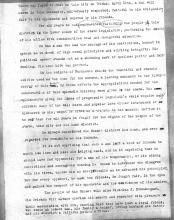
There was laid to rest in this city on Friday, April 16th, a man well known in this community, universally respected, faithful to his obligations, fair to his opponents and beloved by his friends.
For six years he had represented faithfully the people of this district in the lower house of the state legislature, performing the duties of his office with conscientious zeal and thoughtful attention.
He was a man who had the courage of his convictions, honest in speech as in deed; of high moral principles and sterling integrity. His political career stands out as a shining mark of spotless purity and faith dealing; His home life was perfect.
On the heights of Parnassus stands the beautiful and stately edifice used as the home for the nurses, a lasting monument to the tireless energy of this man, by whose efforts the appropriations needed for the construction of this splendid building were given by the state. His accomplishments along the lines of progressive legislation would require many columns; many of the wall known and popular laws either introduced or sponsored by him, might be cited as a tribute to his memory; suffice it to say that for six years he fought for the rights of the people of the state, this city and his home district.
He always considered the Sunset district his home, and ever regarded its residents as his friends.
It is not surprising that such a man left a host of friends to mourn his loss and mass his helping hands, nor is it surprising that he should have had opponents; for a man of his temperament, of his strong convictions and courageous bearing is bound to have those who disagree with his views, oppose him as energetically as he advanced his principles. But for every opponent, he made two friends. He fought fair, in the open and gained the respect of his opponents and the confidence of his admirers.
The people of the Sunset will miss Nicholas J. Prendergast. His friends will always cherish his memory and remember with pleasure at their association with him, knowing that they have lost a loyal friend, the state an honest man, his family a tender, loving husband and father of his district a faithful public official.
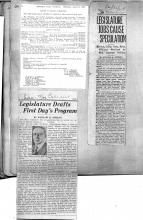
This page displays an Assembly Daily Journal and 2 newspaper clipping.
The Assembly Daily Journal reads:
2 Assembly Daily Journal [Monday, April 2, 1923.
Report of Select Committee
The following report of Select Committee was received and read:
Mr. Speaker: Your Select Committee appointed under authority of Assembly Concurrent Resolution NO. 17 begs leave to submit the following order of arrangements for the funereal services:
The services will commence in the Assembly Chamber at two o’clock p.m. on Monday, April 2, 1923. The members of the Senate and Assembly are request to be seated in the Assembly Chamber at one o’clock and forty-five minutes p.m.
The Senators are request to be seated with their respective Assemblymen, in so far as practicable, in the same order as in Joint Convention.
Order of Services
Selection, Chopin’s Funeral March Orchestra
Selection Male Quartette
Scripture Reading and Prayer Rev. Wm. E. Harrison, Chaplin of the Senate
Address Bishop William H. Moreland, Chaplain of the Assembly
Selection, “Jesus Lover of My Soul” Male Quartette
Eulogy, Frank L. Platt, Oakland; Thos. J. Flammer, Sacramento Lodge of Elks;
Hon. C.C. Young, President of the Senate; Hon. Frank F. Merriam, Speaker of the Assembly
Selection Mal Quartette
Benediction Bishop William H. Moreland
Selection, “The Vacant Chair” Orchestra
Pall Bearers – Senators II. C. Nelson, F.J. Powers; Assemblymen T.A. Mitchell, Fred J. Moore, Earnest Dozier, Elmer P. Bromley.
At the west end of the Capitol the funeral march will be taken up and the Senators and Assemblymen will march to the City Cemetery, at the end of Tenth Street, where interment will take place.
Funeral Escort
Military Escort – Company “G,” 159th Infantry, California National Guard
Clergy
Hearse and pall bearers
Mourners
Governor, Lieutenant Governor and Speaker of Assembly
Members of Legislature
State officers
Delegations (other than legislators), societies and friends.
H. C. Nelson,
F. J. Powers,
A. E. Osborne,
Joseph A. Beek,
Senate Committee
Elmer P. Bromley,
Jos F. Cleary
Emmett I. Donohue,
Bert Snyder,
Arthur A. Ohnimus,
Assembly Committee.
First newspaper clipping reads:
Legislative Drafts First Day’s program
By: William H. Jordan
The State legislature will convene on Monday, January 2.
While the day under the State law is observed as a legal holiday, the constitutional provision for regular meeting in biennial session of the Legislature prevails. This was definitely announced yesterday from the capital.
That provides the sitting shall occur on the first Monday after the New Year’s Day, which falls in 1933 on Sunday.
In preparation for the session, members are receiving their seating assignments in both houses. Edgar C. Levey, reelected from the Twenty-eighth District of San Francisco, unopposed, for his fifth successive term in the Assembly, has been assigned seat Number One.
Organization of the Legislature will proceed with the election of the president pro tempore of the State Senate and other officials. Indications yesterday were that Senator Arthur H. Breed of Alameda County will succeed himself in that position, one which he has held for many years.
There has been some movement among members of the Senate “farm bloc” led by Senator J.M. Inman of Sacramento County to put Senator William P. Rich of Marysville into a contest for the honor. Whether that will develop into a roll call vote is not yet settled. A check so far made would give Breed a bit of advantage, according to reports from the capital.
Joseph Beek of Balboa will succeed himself as secretary of the Senate and Joseph F. Nolan of Los Angeles, veteran in the post of sergeant-at-arms is slated for reelection.
Assemblyman Walter J. Little of Santa Monica will be elected Speaker of the Assembly, as heretofore indicated. Arthur A. Ohnimus of San Francisco will be re-elected chief clerk, a position in which he has served for years which much satisfaction to the Legislature.
Appointments of sergeant-at-arms of the Assembly, and a chaplain for each house are in the making.
The Legislature for 1933 will be marked by a large dominant vote for rural district Senators in the Senate. For the first time under the operation of the reapportionment act of two years ago, the large populated centers of the State will be represented by one only Senator each.
This applies to San Francisco, Alameda, Santa Clara, Los Angeles and San Diego counties. The remaining thirty-five members are distributed in the rural sections, no county having more than one Senator.
In the Assembly Los Angeles County will hold numerical group strength with thirty of the eighty members of the house. San Francisco will seat nine and Alameda County seven Assemblymen.
There will be twenty-five Democrats in the Assembly, a showing which has not been equaled in many years, if ever, in the California Legislature. In the Senate five Democrats will be seated. The breaks on legislation for years have not been along party lines because of the predominance of Republican strength and the further fact that under the direct primary law, members frequently at primary elections have won the nomination of both the major parties. In some instances they have gathered endorsement at the primaries of third and even fourth political parties. This dual system is likely to be subject of effort to change during the coming session.
Second newspaper clipping reads:
Legislature Jobs Cause Speculation
Ohnimus, Leflar, Beek, Nolan, Wilkinson Mentioned for Most Important Positions
By William H. Jordan
Officials of the State Legislature are being discussed as the time nears for convening of the sessions, which will open next Monday at the capital.
From all indications contests for the important posts of duty in both Houses are scares.
It appears that Arthur H. Ohnimus, the efficient chief clerk of two years ago, will be invited to accept that place again. Ohnimus comes from San Francisco. The job is one of the really heavy ones in the legislature’s organization. In the previous session he was commended for his services. They have no political or partisan bearing.
But there seems to some rivalry over the appointment of sergeant-at-arms of the Assembly. One interesting character, familiarly known around the State and among the politicians as “Lumber Jack” Charlie Wilkinson, seeks the preferment. He will be opposed by W.J. Leflar of Sacramento, who has held the post heretofore. There are others who want the job, but the fight now seems to be centering on these two candidates.
In the Senate Joseph A. Beek of Balboa, who was secretary two years ago, is preparing to assume the position this winter. Beek comes from the South, is competent and carries the experience of the former session with him. This is likewise not a political job.
“Joe” Nolan of Los Angeles, will, it appears, be reappointed sergeant-at-arms of the Senate, having earned the good will of the body in that position during the 1923 session.
These are the outstanding positions. Others will be disturbed along the patronage lines which will be trimmed not a little under the new law which increased legislators’ salaries, but made a huge slash in the legislature’s attaché payroll allotment.
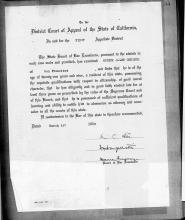
To the
District Court of Appeal of the State of California,
In and for the First Appellate District
The State Board of Bar Examiners, pursuant to the statute in such case made and provided has examined Arthur Allen Ohnimus of San Francisco, and finds that he is of the age of twenty-one years and over, a resident of this state, possessing the requisite qualifications with respect to citizenship, of good moral character, that he has diligently and in good faith studies law for at least three years as prescribed by the rules of the Supreme Court and of this Board, and that he is possessed of sufficient qualifications of learning and ability to entitle him to admission as attorney and counselor in all the courts of this state.
His admission to the Bar of this state is therefore recommended.
Dates March 1st 1922
There is 3 signatures shown here from the Board of Bar Examiners
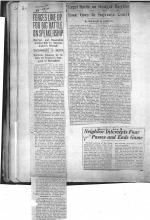
This page displays 3 newspaper clipping.
First newspaper clipping reads:
Forces Line up for Big Battle on Speakership
Merriam and Rosenshine Contest will try Administration’s Strength
Sacramento is Mecca
Stephens cleaning up after affairs for Tuesday’s Inaugural of Richardson
Sacramento, Jan. 6. – As legislators, officials and lobbyists gathered in Sacramento today, preparatory to the opening of the forty-fifth session of the California Legislature here Monday, the most discussed question was the speakership of the Assembly. That post, held last session by Henry W. Wright of Los Angeles, is sought by Frank f. Merriam of Long Beach and Albert A. Rosenshine of San Francisco, each claiming enough of the eighty votes in the Assembly to insure his election.
Test of Strength
Merriam has the open backing of Governor-elect Friend William Richardson, while Rosenshine has the equally enthusiastic backing of legislators and politicians who have often announced their affiliations with Senator Hiram Johnson, and others of the Federal group. The importance of the contest, according to the legislators, is based on the belief that Merriam’s election would be a favorable test of the State administration’s strength in the Legislatures.
The Constitution provides that the Lieutenant-Governor shall preside in the Senate, so there is no contest there.
Other Elective Officers
Other elective officers of the two houses are the chief clerk of the Assembly and the secretary of the Senate, a sergeant-at-arms and a chaplain for each house. Arthur Ohnimus of San Francisco was the only avowed candidate here today for chief clerk, and Joseph Beek of Santa Ana was similarly situated for secretary of the Senate. Neither of the incumbents at the last session wished to return. William Leffler of Sacramento was unopposed for sergeant-at-arms of the Assembly, and Joe Nolan of Los Angeles, r. P Benton of Los Angeles and H.H. Yonkin of Los Angeles were mentioned for the Senate position.
Seek Chaplain Posts
Numerous local ministers were seeking positions as chaplains, a post that pays about $399 for the session and requires an attendance of about twenty minutes each morning. One is named for each house.
In additions to the candidates for these posts the 120 members of the Legislature, the newspaper correspondents and the corps of attorneys and lobbyists attending every session there was a large attendance today of person seeking minor positions, such as committee clerkships, assistants to the sergeant-at-arms and similar posts.
Stephens Cleaning up
Governor Stephens was engaged in his offices today, cleaning up final details of his administration. He, his two secretaries and the clerical force met few interruptions from visitors. Down the hall, in the State Treasurer’s office, whence Richardson will proceed Tuesday to his new quarters as Governor, there was an influx of callers, and the Governor-elect was busily engaged all day long with a series of interviews.
Messages Completed
The retiring and incoming Governor each completed a message to the Legislature today, for presentation at the time of the inaugural, which will probably be Tuesday afternoon. I was also decided that Associate Justice E. C. hart of the Third District Court of Appeals would swear in the Assembly, Presiding Justice William M. Finch of the same court would swear in the Senate, and Chief Justice Lucian Shaw of the State Supreme Court would administer the inaugural oath to Governor Richardson,
Second newspaper clipping reads:
Legal Battle on Budget Begins
Issues Goes to Supreme Court
By William H. Jordan
(Subbing for Hamilton)
The budget battle is on.
Clyde L. Seavey, president of the Railroad Commission, former city manager of Sacramento and chairman of the State Board of Control under its progressive administration has gone to the Supreme Court with his contest to protect the funds of the commission from becoming the subject of general appropriation.
That recalls some history.
Seavey was one of those who went before the State legislature and told that body what the budget really meant. Seavey was one of those that minced no words in dealing with the fundamentals of the budget as it was interpreted by the Governor’s chief representative at that time in the State Board of Control, Mrs. Nellie Brewer Pierce.
Elect of Slashes
Seavey declared that the slashed and the cuts made under the general policy adopted by the new State administration was a breaking down of every force which for years under progressive influences in the State, had been exerted to the development of the beset humanitarian purposes of government.
His was an outstanding presentation o the conditions which this new policy, cloaked, he said, under the mask of fictitious “economy,” would create-namely a letting down of the whole program of the State’s advancement.
Seavey at that time insisted that, so far as the Railroad Commission was concerned, it would not sit idly by and accept the situation. Under friendly auspices as related to the State Controller, who has insisted upon the highest court interpretation, the Railroad Commission yesterday move to settle one big point in the budget war. That applies to the special funds of numerous Stats commissions.
It was the purpose of the new budget makers to corral in the general funds all of those funds collected under the acts of the Legislature creating the commissions and boards, thus giving a wider range of income figures with which to make up this new budget.
It is a fight that looms large in the political history of California. It is not confined to the budget. That serves as the medium for the time.
Beyond a peradventure of doubt, say those watching the moves, the whole policy of Governor Richardson is on the defensive, in so far as that policy relates to administration of the progressive institutions of the State.
Future Results
And there are not a few who are looking forward to the tax times to come when it will be demonstrated, they say, that the outs and slashes that have been made will not bear fruit to the extent of penny reduction in general taxation of the individual taxpayer. Why? Because the corporations of California pay the State taxes.
Seavey’s move, the reaction from the aggressive action of Will C. Wood, State superintendent of public instruction, to protect the school funds of the State and still more litigation ahead, gives zest to the situation.
Governor Richardson, according to a compilation just completed of the State Legislature session of 1923, pocketed 324 bills sent to him and vetoed 83. He signed 479. The final calendar record of the Legislature, prepared by Arthur A. Ohnimus of San Francisco, chief clerk of the Assembly, and Joseph A. Beek of Balboa, secretary of the Senate, gives a comprehensive record of the session’s activities. There were 2322 bills introduced.
Bench Jobs Pending
Here is some capitol news:
Governor Richardson has eliminated all but eleven of the 92 applicants seeking the six Superior Court judgeships in Los Angeles County, it was announced at his office yesterday. As soon as the Los Angeles Board of Supervisors provides court rooms for the new judges, the Governor is prepared to name his appointees, it was said. It is expected these appointments will be made this week at the Governor’s Long Beach summer home.
Those seeking the superior bench position created by the legislature for Sacramento country have a long wait in store for them. The position will not be filled by the Governor until September, it is officially announced. Prominent among those mentioned for this job are J.D. Meredith, Sacramento attorney and newspaper publisher, and J. Charles Jones, deputy attorney general for the last seventeen years.
Third newspaper clipping reads:
Neighbor Intercepts Four Passes and Ends Game
Football practice at the Drew Preparatory School came to a dead stop on Friday, when the young athletes lost the ball. Not that they did not know where it was. They did-only too well.
So yesterday the team, headed by Robert Criswell, 2182 Second Avenue, and Lawrence Neville, 75 Lunado Way, appeared in mass formation before Assistant District Attorney Arthur Ohnimus. The opposing team was composed entirely at Jacob Guthartz, who lives at 2908 California Street, next door to the school. Guthartz was accused of making a collection of footballs.
The collection was admitted, but Guthartz explained that he had acted in the way of self-preservation. He said his house had been bombarded by footballs for weeks with such regularity that they sounded like hail on tin roof and his peace of mind had been greatly disturbed.
Ohnimus sympathized, but advised some other method of stopping the bombardment. Guthartz accepted the counsel and agreed to return the footballs. Practice was resumed yesterday afternoon.
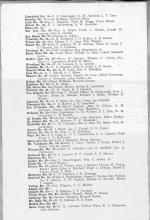
Humboldt No. 14—C. F. Ernenegger, A. M. Alameda, L. T. Carr. Amador No. 17—Leo Williams, Everett Sobey.
Lodi No. 18—Ray C. Pagnello, Ward M. Gregg, Victor Myers. Arcata No. 20—E. L. Spellenberg, A. W. Garcelon.
Chico No. 21—
San Jose, No. 22—Wm. A. Katen, Frank L. Nelson, Joseph W. Gamong, john A. Corotto.
San Mateo No. 23—Charles G. Adams,
Yosemite No. 24—D. K. Stoddard, I. H. Reuter, A. E. Daneri.
Fresno No. 25—Geo. Haines, F. L. Lane, Wm. Tupper.
Sunset No. 26—John T. Skelton, W. E. Holmes, Frank H. Conti, C. F. Gannon, Jas, F. Claussen.
Petaluma No. 27—Fred Cereghino, Ray Momboisse, Jr.
Santa Rosa No. 28—Louis Rossi, William A. Goss, Leland Stanford Lewis.
Golden Gate No. 29—Harry W. Gaetjen, Thomas C. Conmy (A), Henry C. Lunsmann, Robert D. Mayo.
Woodland No. 30—W. H. Lawson, R. G. Lawson.
Excelsior No. 31—T. G. Negrich, John R. Avise, C. B. Green.
General Winn No. 32—R. R. Veale, John F. Whelihan.
Ione No. 33—A. C. Martin, A. C. Miner.
Mission No. 38—Arthur Sanford, Eugene M. Levy, Alfred Berryessa. Sydney A. Bernstein, John Cosbie (A).
Solano No. 39—E1lard Williams, Howard Goosen.
Rainbow No. 40—G. R. Akins.
Elk Grove No. 41—Walter Martin, Rollen E. Leimbach.
Fremont No. 44—W. W. Black, M. J. Herbert.
Los Angeles No. 45—John T. Newell, Sidney B. Witkowaski, Bert L. Farmer, Albert D. Barham, Edward J. Reilly, William G. Newell.
Alameda No. 47—A. T. Sousa, Sr., Geo. Ortiz, Joe Filipelli.
Plymouth No. 48-0. E. Harrell, J. E. Grambart.
San Francisco No. 49—David Capurro, John H. Nelson, A. H. McKnew, Charles Reinfeld, Geo. Batchelor.
Oakland No. 50--Otto Egenberger, L. H. Wolters, F. J. Bills, W. H. Greenfield, L. E. Rowley.
El Dorado No. 52—Arthur Ohnimus, John Morrison, Elmer Doidge. St. Helena No. 53—W. Metzner, P. R. Alexander.
Hydraulic No. 56—C. W. Chapman, Ben A. Best, Ed. Baker, Wm. H. Landrigan.
Quartz No. 58—M. J. Brock, Jas. C. Tyrrell, O. H. Fuller.
Auburn No. 59—E. H. Gum, C. D. McKinley.
Napa No. 62—P. S. King, Jr., F. C. Cuthbertson, C. A. Lommel, Fred Pond, C. N. McKenzie.
Silver Star No. 63—John J. Bauquier, Elmer Maloney.
Mt. Tamalpais No. 64—Robert J. Curry, Walter J. Grady, Daniel J. Healy, Charles Locati.
Watsonville No. 65—James B. Holohan, Geo. G. Radcliff, Geo. A. Dethlefsen.
Redwood No. 66—A. S. Ligouri, E. F. Cerqui, S. E. Marcus.
Calaveras No. 67—
Colusa No. 69—John J. Ossenbriggen, Wm. C. Stokes, Jr.
Ukiah No. 71—Fred Figone.
Rincon No. 72—James A. Wilson, John J. Barrett, Thomas H. Vivian, Robert Jones, John A. Mitchell, Virgil L. Orengo, Daniel J. Tinney, Frank E. Shea.
Monterey No. 75—L, P. Chavoya, J. E. Freeman.
Stanford No. 76—Frank A. Biedermann, James G. Conlan, Roy Fellom, Jas. F. Stanley, A. W. Boyken, Stanley G. Scovern, Henry J. Angelo.
Vallejo No. 77—Geo, Wignier, L. C. Mallett.
Angels No. 80—
Granite No, 83—C. D. Higgins, J. F. Leonard.
Yerba Buena No. 84—Hartley Russell, Ralph P. Freese.
Calistoga No. 86—George Tamagni, Howard Butler.
Mt. Bally No. 87—R. H. Junkans, D. E. Ryan.
Golden Star No. 88—
Santa Cruz No. 90—C. E. Canfield, Willett Ware, N L. Patterson, John Johnson.
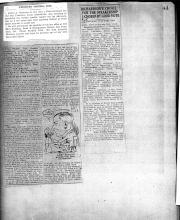
This page displays a document and 2 newspaper clipping.
First this document reads:
Attorney Ohnimus Now
Arthur A. Ohnimus, at one time a Field Secretary for our San Francisco Local Association, also assisting in procuring the weekly market reports for the Advocate, has for a few years past been applying himself at every spare moment to study law.
He now announces the opening of his law office at 530 Mills Building, Bush & Montgomery Streets, San Francisco, Cali. Phone Garfield 3886. We wish Attorney Ohnimus success and hope he becomes one of our brilliant legal lights.
The first newspaper clipping reads:
Emme, Fellom, Fox, Hawes, Hornblower, Lyman, Mathews, McDowell, T. A. Mitchell, Morrison, Reindollar, Rosenshine, Schmidt, Spence, Stevenot, Mrs. C. M. Woodbridge. Total-25
For Predergast:
Miss Osto Broughton, Clark, Connolly, Johnson, Jones, West, Wright. Total-7
For Wright:
Cleary, Heisinger, Prendergast, Mrs. Anna L. Saylor, Spalding. Total-5.
Christian got a vote from Cleveland.
The aim of the drys opposed to Merriam was to hold out enough votes to block his nomination on the first ballot. That accomplished the antis thought they might get in under the administration wall and break down Merriam’s support and beat him.
But the vote did not pan out that way.
Governor-elect Richardson let it be known in no uncertain term that he wanted Merriam. His scouts brought in a number of the Assemblymen this morning after the antis had really shown some strength in their move of yesterday to make it an anti-Merriam contest, with elimination of Rosenshine after the first ballot of that should have been necessary.
“White man might onsartain,” and when noses were counted the gubernatorial force move had its effect.
The fight has left traces of bitterness, and it presages a lot of trouble. The progressive element is on watch. Leaders on that side openly declare that reactionary measures will not go by the Assembly, no matter if Merriam, who is of the regulars, does name the committees.
The progressives took a lot of comfort out of the close vote.
Merriam, however, started to pour forth oil and announced after he took up the gavel that there would be an even break on committees. But on may be sure that they are not going to be turned over to the group which game him and Richardson battle today.
One glimpse of what may be in sight was given in the way that former Assemblyman Benton of Los Angeles was bowled over when he went in or the job of minute clerk against C. William Booth of Oakland, a competent man who had been at the desk two years ago.
The assembly just reared up and knocked Benton over by a vote of 53 to 23. Benton, who is from Los Angeles, an old time standpatter, had come up to get the job of sergeant-at-arms of the senate, but that was not for him, so he slipped over to his old stamping ground.
A fine compliment was paid to Assemblyman Frank Anderson of Oakland. In point of continuous service with five terms to his credit, he is the dean of the assembly-a quite chap with progressive tendencies. He had been lined up for Rosenshine in the speakership fight, had given his word and was first on the roll call. The Merriam scouts tried to put him down for the sake, in part of a start-off with Merriam’s name. But Anderson did not break.
The assembly gave him, but unanimous vote, the honor post of speaker pro-tem, greatly to his surprise.
They had a battle over naming of a chaplain. Bishop W.H. Moreland of the Episcopal Diocese of Sacramento won the distinction as against the Rev. George M. Gardner of Lincoln. It was 50 to 27.
There was no opposition to Arthur Ohnimus of San Francisco as chief clerk nor to W.J. Leflar of Sacramento for re-election as sergeant-at-arms. E.E. Eustice of Gilroy was made assistant chief clerk.
And that is the way the assembly organized. Tomorrow there will be inauguration of Governor-elect Richardson and all the legal format things to be done. After that Speaker Merriam will get his committees named and there will start the biennial flood of bills, resolutions and whatnot.
Second document is a continuation of another newspaper clipping it reads:
Richardson’s Choice for the Speakership Chosen by Good Vote
gram. Here is the way they voted:
Merriam - Badham, C.C. Baker, Edwin Baker, Ball. Bromley, Burns, Carter, Christian, Davis, Dawson, Donohus, Douglas, Dozier, Duval, Eksward, Erb, Foster, Fulwider, Graves, Johnson, Kline, Lyons, McMillan, McPherson, Merriam, Miller, Allen, Mitchell, Moore, Morris, Mueller, Noyes, Pedrotti, Pomeroy, Roberts, Rock, Scott, Smith, Snyder, stow, Weller, Whitaker, Williams. Total 42.
Rosenshine – Anderson, Badaracoo, Bernard, Carlson, Coombs, Crittenden, Croter, Dean, Doris, Emme, Fellom, Fox, Hawes, Hornblower, Lyman, Mathews, McDowell, M.A. Mitchell, Morrison, Reindollar, Rosenshine, Schmidt, Spence, Stevenot, Woodbridge. Total 25.
Wright – Cleary, Heisinger, Prendergast, Saylor, Spaulding. Total 5.
Prendergast – Broughton, Clarke, Connolly, Johnson, Jones, West, Wright. Total 7.
Christian – Cleveland. Total 1.
Anderson Speaker Pro Tem
Merriam’s election was followed by the selection of Frank Anderson of Oakland as speaker pro tem by unanimous vote. Anderson is entering on his fifth consecutive term, and has the longest continuous service of any member.
Arthur A. Ohnimus of San Francisco was chosen as chief clerk next in order. A fight for minute clerk developed between C. Williams Booth and Dick Benton, former assemblyman, which was won by Booth, 53 to 25.
E.E. Eustace of Gilroy was chosen assistant chief clerk. W.J. Leflar of Sacramento was re-elected sergeant-at-arms, and Bishop William Hall Moreland of Sacramento won a spirited fight for chaplain over Rev. George Gardner of Lincoln. Ben Cohn of Los Angeles was chosen as bookkeeper by Sergeant-at-Arms Leflar. Oaths of office were administered by Justice E. C. Hart.
After disposing of various routine resolutions, the assembly adjourned out of respect to the late Assemblyman F. J. Cummings of Eureka.
Joint Session Today
There will be a joint session today, probably at noon, and at that time the new and retiring governors will appear and present their message.
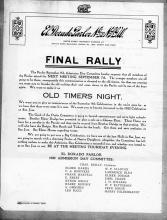
ElDorado Parlor No. 52 N.S.G.W
Meets Every Thursday Evening at
Native Sons Building, Mason St. Bet. Geary and Post
Final Rally
The Parlor September 9th Admission Day Committee hereby request that all members of the parlor attend the NEXT MEETING, SEPTEMBER 7th. The younger members are all going to be there, consequently this communication is directed to the old timers, for that one evening we want you to forsake the old rocking chair and come down to the Parlor and be one of the boys again. We want to make it an
OLD TIMERS NIGHT.
We want you to give us reminiscences of the September 9th Celebrations in the years gone by as we hear that there were some lives ones. We want you to become interested in the 1922 Celebration at San Jose.
The Good of the Order Committee is going to furnish entertainment and serve light refreshments. Brother Elmer Doidge has promised to play a solo on a Chinese Flute. These Flues we have for a novelty in the Parade and they can be secured from Brother Doidge on that evening. We will also have the Badges, Hat Bands and Tickets for the lunch. Get them and save confusion at San Jose. See Elmer Harms regarding rooms.
We are going to put over big Celebration, we have one of the best Halls in San Jose, we are going to march with a charming Parlor of Native Daughters, altogether the Committee has left nothing undone to make his Admission Day Celebration a successful one, and whether you intend to go to San Jose or not, Be at this meeting Thursday evening.
El Dorado Parlor
1922 Admission Day Committee:
Chas. Reilly, Chairman
Elmer Harms
F. A. Bonivert
Frank Martell
E. Ebert
Myron Kelly
Harry Downie
A.Ohnimus
Leo Pucci
W. P. Stanton
Lawrence Blea
Elmer Doidge
Earl Crane
J. H. Willers
W. P. Patterson
Fred Kruse
Harry Hildebrandt

This page displays a letter and a document at the bottom.
First is the letter, it reads:
State Board of Bar Examiners
720 Mills Bldg
San Francisco, Cal. Mar 1, 1922.
Dear Sir:
I am pleased to inform you that you have been recommended for admission as an attorney and counselor at law in all the Courts of this State.
The date of admission before the District Court of Appeal, First Appellate District, Wells Fargo Building, San Francisco, will be on Tuesday, March 7th, 1922, at 10 o’clock a.m.
Kindly arrange to be present on this occasion as special exercises will be held.
Frederick W. Grant
Secretary
Second is the document, it reads:
Assembly
California Legislature
Forty-Fifth Session
Office of
Arthur A. Ohnimus
Chief Clerk
Bessie McBride Manning
Secretary of Chief Clerk
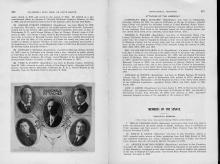
This page displays 2 pages of a book of some sorts.
Left side of this book starts off with the continuation of a paragraph from the previous page:
Page 490
California Blue Book, Or State Roster
again elected in 1910, and served in the session of 1911. He enlisted as a noncommissioned officer in Company 1, Seventh California Volunteer Infantry, on May 5, 1898, and served until the muster out regiment, after the war with Spain.
78. George Robert Freeman (Republican) was born March 18, 1867, at Galesville, Wisconsin; educated in the public schools and Galesville University; studied law in his father’s office and attended the Columbian University of law at Washington, D. C., and Chicago College of Law at Chicago, Illinois; came to California in 1891; was Deputy County Clerk of San Bernardino County for two years; then went to Corona, in Riverside County, where he has since resided and practiced law; has held the office of City Attorney of Corona for nearly ten years and is a member of Board of Library Trustees of that city; was nominated and elected to the Legislature of this State on the Republican ticket in 1910 from Riverside County, the Seventy-eight Assembly District.
79. Edward C. Hinkle (Republican) was born in Mattoon, Illinois, October 14, 1867; came to California with parents when a boy; educated in public schools, at University of the Pacific, San Jose, and took a special course at Leland Stanford Junior University; residence, San Diego; elected Member of the Assembly from the Seventy-ninth District November 3, 1908; reelected November 8, 1919.
80. Fred E. Judson (Republican) was born in Sonoma Country, California, June 30, 1869; educated in public schools of San Diego County; dairyman and fruit grower; business address, Escondido, California, R.F.D. 1; elected Member of the Assembly from the Eightieth District November 8, 1910.
(At the bottom of this page has an illustration of 5 men. In the picture it is titled Assembly Attaches. The 5 men are: T.G. Walker, Asst. Chief Clerk; L.B. Mallory, Chief Clerk; Rev. Frank K. Baker, Chaplain; Edward E. Reese, Asst. Sergeant-at-Arms; Edw. H. Whyte, Sergeant-at-Arms.)
Right side of this book reads:
Page 491
Biographical Sketches
Attaches of the Assembly
Llewellyn Bell Mallory (Republican) was born in Platsmouth, Nebraska, October 23, 1871; he came to California at the age of sixteen; attended Napa College and finished his university course at Leland Stanford Junior University with class ’97; real estate and general brokerage; business address, Los Gatos; he was Assistant Chief Clerk of the Assembly during’ the thirty-eighth session, and was elected Chief Clerk of the Assembly, thirty-ninth session, 1911.
Thomas G. Walker (Republican) was born at Watsonville, Santa Cruz County, California, January 19, 1869, and was educated in the public schools of his native city; for a time he engaged in farming a large tract of land which he owned in Monterey County, but for several years past has made his home in San Francisco; he has served as Assistant Clerk of the Assembly during the sessions of 1901, 1903, 1905, 1907, 1909, and 1911.
Rev. Frank Kline Baker, D.D. (Republican), is a native Pennsylvania, born May 4, 1866; he was educated in the public schools of his native city, and graduated from the Juanita College, Huntington, pa., 1887, and the Boston University School of Theology, 1900; was licensed as a Methodist preacher in his native state in 1887; entered the ministry of the California Annual Conference of the Methodist Episcopal Church in 1888; has served pastorates at Sonora, Oakland, Ione, San Francisco, and Santa Cruz, and is now pastor of the First Church in Sacramento; he is the author of several small church histories, and has always identified himself with movements for civic betterment; elected Chaplain of the Assembly January 3, 1911.
Edward H. Whyte (Republican) was born in Shingle Springs, El Dorado County, July 17, 1869; moved to Sacramento with parents in 1871; educated at Brothers’ College, Sacramento; elected Sergeant-at-Arms of the thirty-ninth session of the California Legislature; appointed Parole officer and State Agent of California, 1911.
Edw. E. Reese (Republican) was born August 2, 1880, in Sacramento County, California. He graduated from the University of California in 1903; was Sheriff of Sacrament Country from February 10, 1910, until January 1, 1911. Appointed Assistant Sergeant-at-Arms of the Assembly at the session of 1911.
Members of the Senate
Fortieth Session
(Other than those who served during Thirty-ninth Session)
7. Philip Charles Cohn (Democrat) was born in New York City, July 6, 18154; was educated in the public schools of Mobile, Alabama; came to California in 1874; merchant and fruit grower; was elected State Senator from the Seventh District November 5, 1912.
19. Edwin E. Grant (Democrat) was born in San Francisco, August 2, 1887; attended public schools of State, graduating from Lodi High School in 1905, and completed California law course; engaged in colonization of lands; was elected State Senator from the Nineteenth District November 5, 1912.
15. Arthur Hastings Breed (Republican) was born in San Francisco, November 27, 1865; resides in Oakland; received his education in the public schools of San Francisco; is engaged in real estate business; served as Auditor and Assessor of the city of Oakland for eight years; was elected State Senator from the Fifteenth District, November 5, 1912,
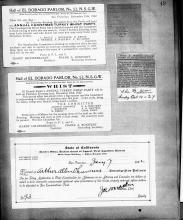
This page displays 2 documents from El Dorado Parlor, a newspaper clipping and a check made out to Arthur A. Ohnimus.
First is the document from the El Dorado Parlor, it reads:
Hall of El Dorado Parlor, No. 52, N.S.G.W.
Meets every Thursday Eve, at Native Sons Hall, Mason St. bet. Geary and Post
San Francisco, December 15th, 1922
Dear Sir and Bro.:
On Thursday Evening, December 21st, the Parlor will hold the Annual Christmas Turkey Whist Party. Our Thanksgiving Whist Party was a decided success and the Committee is endeavoring to make this one more so. Come Thursday Evening, bring your Lady friends, and who knows but what you may carry home your Christmas Turkey.
C. Reilly, J. Morrison, E. Ebert,
A. Ohnimus, F. Martell, F. Bonivert,
Committee
The Membership Committee is starting an extensive drive for new members and aim to exceed all previous membership records in 1923. Help them out by sending in the name of a prospective candidate, and they will do the rest.
Yours in F.L. and C.
Harry Hilderbrandt Frank A. Bonivert
President Recording Secretary
Second is the document from El Dorado Parlor, it reads:
Hall of El Dorado Parlor, No. 52, N.S.G.W.
Meets every Thursday Eve, at Native Sons Hall, Mason St. bet. Geary and Post
Whist
El Dorado Parlor’s Annual Turkey Whist Party will be held on Thursday Evening next, November 23rd , 1922.
This yearly affair has always been a big success and the Committee is endeavoring to eclipse all previous ones this year. Come early, bring the ladies, bring your friends, bring home a turkey.
The Committee
Arthur Ohnimus, F.A. Bonivert, J. Morrison, F. D. Martell, E. Ebert, Chas. Riley
Nomination of Officers for the ensuing term will be held on the same Evening. Meeting will start at 8:00 o’clock sharp. All nominees must be present. Election December 7th.
Yours in F. L. and C.
Harry HilderBrandt, President Frank A. Bonivert, Recording Secretary
Third is a check made out to Arthur A. Ohnimus, it reads:
State of California
Clerk’s Office, District Court of Appeal, First Appellate District
Wells Fargo Building :: Phone Douglas 2031
Division One
Division Two
San Francisco July 7, 1922
Received of Arthur Allen Ohnimus Twenty Five Dollars
Fee for Filing Application to Take Examination for Admission as an Attorney and Counselor, ten dollars of which is to be returned to unsuccessful applicant upon presentation of this receipt, properly endorsed; fifteen dollars to be deposited in Bar Examinations Fund.
No. 93 J.R. Martin Clerk Deputy
Fourth is a newspaper clipping that reads:
The Bulletin
October 14, 1927
Arthur A. Ohnimus, campaign manager for the re-election of District Attorney Brady, today replied to Dooling’s criticism of Brady in dealing with violations of the narcotic law.
Ohnimus pointed out that at the last session of the legislature laws were passed for the care and treatment of the dope addicts as patients rather than as criminals. This law also provides for a state sanatorium for their care and rehabilitation. It is stated Brady is doing all he can to help promote the operation of that law.
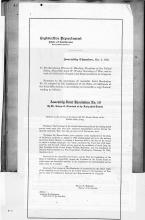
Legislative Department
State of California
Forty-Fifth Session
Assembly Chamber, May 2, 1923
To His Excellency Warren G. Harding, President of the United States, Honorable John W. Weeks, Secretary of War, and to each of California’s Senators and Representatives in Congress.
Pursuant to the provisions of Assembly Joint Resolution No. 19, adopted by the Legislature of the State of California at the forty-fifth session, I am sending you herewith a copy thereof, reading as follows:
Assembly Joint Resolution No. 19
By: Mr. George C. Cleveland of the Forty-third District
Relatives to the service of the Honorable Dr. Ernest Dozier in the United State Army
Whereas, the President of the United States has conferred the distinguished service cross upon men who have rendered distinguished service during the Spanish American War, but who are now out of the service; and
Whereas, Dr. Ernest Dozier, now a member of the Legislature of the State of California, rendered on August 5, 1898, distinguished service in the military operations before Manila, in crossing a fire-swept field in the face of the enemy to repair a broken telegraph wire which connected the front line with headquarters, and for such valiant service received the certificate of merit from the then President of the United States, William McKinley; and was mentioned in General Orders Number 15, War Department, Washington, February 13, 1900; therefore, be it
Resolved, That copies of the Resolution be forwarded by the Chief Clerk of the Assembly to the President of the United States, to the Secretary of War and to each of California’s Senators and Representatives in Congress.
Frank F. Merriam,
Speaker of the Assembly
Attest:
Arthur A. Ohnimus,
Chief Clerk of the Assembly
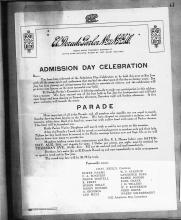
El Dorado Parlor No. 52 N.S.G.W
Meets Every Thursday Evening at
Native Sons Building, Mason St. Bet. Geary and Post
Admission Day Celebration
Bro.:-
You have been informed of the Admission Day Celebration to be held this year at San Jose with all the pomp, spirit and enthusiasm that marked the observance of this day in former years. San Jose has been planning and raising money for months to entertain its visitors, and the celebration will go down into history as the most successful ever held.
El Dorado Parlor’s Committee is laboring zealously to make our participation in this celebration a success. We have secured one of the best halls in San Jose for headquarters and will hold open house and have dancing on Saturday afternoon, Saturday night and Sunday afternoon. A five piece orchestra will furnish the music.
Parade
Most important of all is the Parade, and all members who possible can are urged to march, thereby showing their loyalty to the Parlor. We have adopted an inexpensive uniform, viz. dark trousers, white shirt, black 3 in hand tie, straw hat with yellow band with name of Parlor thereon. This band will be furnished to you.
Keith Parlor Native Daughters will march with us and be our guest on this occasion.
After the Parade a Lunch will be served at our headquarters to members only and their lady. Tickets for this lunch must be secured at the parlor meetings between now and Sept. 7th as we will have to know how many to provide for.
Members wishing rooms must communicate with Bro. E.L. Harms before next Saturday, Aug 26th, and deposits for same, 1 dollar per person, per night, must be remitted by Thursday Eve., Aug. 31st. Fill out the enclosed card and mail immediately.
Brothers, let’s make this an El Dorado Round up and start immediately to make arrangements to spend a weekend in San Jose.
The round trip fare will be $1.75 by train.
Fraternally yours,
Chas. Reilly, Chairman
Elmer Harms
F. A. Bonivert
Frank Martell
E. Ebert
Myron Kelly
Harry Downie
A.Ohnimus
Leo Pucci
W. P. Stanton
Lawrence Blea
Elmer Doidge
Earl Crane
J. H. Willers
W. P. Patterson
Fred Kruse
Harry Hildebrandt
1922 Admission Day Committee
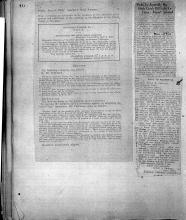
This page displays an Assembly Daily Journal and 2 newspaper clippings.
First is the Assembly Daily Journal it reads:
Friday, April 8, 1921] Assembly Daily Journal 7
West, extending an invitation to the members of the Assembly to be present and participate in the reception to the delegates of the Grand Parlor in Stockton:
Stockton Parlor, No. 7,
N.S.G.W.
Headquarters 1921 Grand Parlor Committee
Stockton, California, April 2, 1921.
Honorable Members of the State Assembly, Sacramento, California.
Gentlemen: Stockton Parlor No. 7 N.S.G.W., respectfully invites the members of the State Assembly to be present and participate in the reception to be accorded to the delegates of the Grand Parlor of Native Sons, when they convene in the city of Stockton on April 18, 1921, this invitation to include the afternoon session on April 18, and the general reception on the evening of the same day.
Very cordially submitted,
Stockton Parlor No. 7, N.S.G.W.
John W. Kerrick, Acting Secretary
Resolution
The following resolution was offered:
By Mr. Parkinson:
Whereas, Stockton Parlor No. 7 has invited the members of this Assembly to be present at and participate in the reception to the accorded the delegates to the Grand Parlor of the Native Sons of the Golden West in convention in the city of Stockton on April 18, 1921; be it.
Resolved, That we, the Assembly of the State of California, extend our thanks for that kind invitation and our good wishes for the success, of the convention; and be it further
Resolved, That as many of our members as can arrange to attend the convention be urged to do so; and be it further
Resolved, That the Chief Clerk transmit a copy of this resolution to the officers of Stockton Parlor, N.S.G.W.
Resolution read.
The question being on the adoptions of the resolution.
In moving the adoption of the resolution relative to attending the Native Sons’ convention, Mr. Parkinson spoke as follows:
“Monday, April 18, the members of the Assembly are invited to attend the State Convention of the Native Sons of the Golden West at Stockton.
There are many members of that order in the Assembly, and not only are they, but all Assemblymen, whether Native Sons or not, invited. Stockton is making big plans for this convention, and you are all assured of a royal welcome and a grand, good time.
Stockton is less than fifty miles from Sacramento, and one can leave in the afternoon on the eighteenth and arrive in time for the convention. You may go on the electric car, which takes two hours, you may go on the stage, which takes about one and three-quarters hours, or you may go by automobile, which takes one and one-half hours, if you do not exceed the speed limit. There is a paved highway all the way from Sacramento to Stockton, constructed by the counties of San Joaquin and Sacramento, and now a State highway.
We hope that as many members of this Assembly as possibly can arrange to do so will avail themselves of our invitation. We assume them that they will not regret the time spent as Stockton is a convention city of long experience and certainly knows how to entertain.”
Resolution unanimously adopted.
The first newspaper clipping reads:
Fight in Assembly on Herb Cinch Bill fails to Come; Report Ignored
Predictions that the Graves report, comprising the conclusions reached by the special assembly committee, which investigated charges of alleged extortion in connection with Assemblyman Edward J. Smith’s bill regulation Chinese herb doctors, would precipitate a heated battle on the assembly floor today had failed to materialize at a late hour.
It had been predicted that an effort would be made to call the report onto the floor today on a question of its adoption. In that event, it was promised, various factions of the assembly which had developed as the result of the text of the report which exonerated Smith, failed to mention Senator Edgar S. Hurley, merely mentioned William R. Brackett, alleged “go between,” in passing, and severely censured Chief Clerk Arthur A. Ohnimus and Sergeant-at-Arms Charles H. Wilkinson, would air their respective opinions.
A poll of the majority of the assembly, however, indicated that the consensus of opinion was to “let sleeping dogs lie,” and entirely ignore the report.
The second newspaper clipping reads:
Pays to Advertise
Hon. Frank B. Anderson,
Sausalito News,
11 Princess Street,
Sausalito, California.
Dear Andy:-I find it necessary to read the Sausalito News as a matter of self-protection for in your issue of the 7th instant I note where one of my letters to you is run in full. Therefore I am enclosing a check in the sum of $2.50 in payment of another year’s subscription.
I am sending you down a bound copy of the final history of the Senate and Assembly, which will look well on the shelves of your library.
I am also sending you down ten copies of the California Vehicle Act for 1931, for yourself and whoever may need information as to the changes in the vehicle law.
I know Henry Meyer will be delighted to be handed a copy as he has been known to be so careless as to drive an automobile without having his operator’s license with him and furthermore to park in the Honorable Governor’s parking place in front of the State Capitol without any license whatsoever.
That headline “what about the Journal?” causes me to mention that the bound journals will not be ready for distribution until this winter or early next year. Just drop Charlie Hagerty a line and he will send you down a copy of the bound journals for the Senate and Assembly.
With kindest regards, I am,
Arthur A. Ohnimus,
Chief Clerk,
Assembly, California Legislature
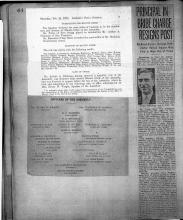
This page displays a partial Assembly Daily Journal, a list of officers of the Assembly and a newspaper clipping.
First is the partial Assembly Daily Journal, it reads:
Thursday, Feb. 24, 1921] Assembly Daily Journal 3
Nominations for Minute Clerk
The Speaker declared the next order for business to be the nomination and election of Minute Clerk of the Assembly.
Mr. Pettis of Fort Bragg placed in nomination Mr. Arthur A. Ohnimus of San Francisco.
Mr. Eksward of San Mateo seconded the nomination of Mr. Ohnimus.
Nominations closed.
Election of Minute Clerk
The roll was called, with the following result:
For Arthur A. Ohnimus – Anderson, Badaracco, Badham, Baker, Beal, Benton, Bernard, Bishop, Bromley, Brooks, Broughton, Burns, Christian, Cleary, Coombs, Cummings, Eksward, Fellom, Fulwider, Graves, Gray, Greene, Hart, Hawes, Heck, Heisinger, Hornblower, Hughes, Hume, Hurley, Johnson, Johnston, Jones, G. L., Jones, I., Kline, Lee, G. W., Lee, I. A., Lewis, Mather, McCloskey, McDowell, McGee, McKeen, McPherson, Mitchell, Morrison, Parkinson, Pedrotti, Pettis, Powers, Roberts, Rosenshine, Ross, Saylor, Smith, Spalding, Spence, Stevens, Warren, Weber, Webster, Wendering, West, White, Windrem, Wright, T.M., and Mr. Speaker-68.
Oath of Office
Mr. Arthur A. Ohnimus, having received a majority vote of the Assembly, was declared duly elected Minute Clerk of the Assembly, and was directed to appear before the bar of the Assembly, where he took and subscribed to the following oath of office administered by Hon. Henry W. Right, Speaker of the Assembly:
I do solemnly swear that I will support the constitution of the United States and the constitution of the State of California, and discharge the duties of the office of Minute Clerk of the best of my ability.
Second is the list of Officers of the Assembly, it reads:
Officers of the Assembly
Hon. Henry W. Wright
Speaker
Hon. Clarence W. Morris
Speaker Pro Tempore
B.O. Boothby
Chief Clerk
W.E. Monahan
First Assistant Clerk
Sigmund J. Janas
Assistant Clerk
Milton W. Sevier
Assistant Clerk
Herbert E. Cleland
Assistant Clerk
John H. Martin
Minute Clerk
Arthur A. Ohnimus
Assistant Minute Clerk
Arthur H. Samish
Assistant History Clerk
Ellsworth E. Eustice
Assistant History Clerk
Louis F. Erb
File Clerk
W.J. Leflar
Sergeant-at-Arms
Melvin E. Day
Bookkeeper, Sgt-at-Arms
Vernon W. Lilley
Journal Clerk
J. O. Hestwood
Engrossing and Enrolling Clerk
Rev. Robert L. McArthur
Chaplain
Mrs. Florence Blood
Postmistress
Third is a newspaper clipping it reads:
Principal in Bribe Charge Resigns Post
Ex-Assemblyman Declares Herb Doctor behind Inquiry was First to Warn Him of Probe
Promising to “spill the beans,” William J. “Billy” Brackett, ex-assemblyman involved in the expose of the Chinese herb “cinch” bill plot, resigned his job as custodian of the Oakland Auditorium yesterday. The first “spilling” came in the form of a charge by Brackett that Dr. Fong Wan, who first notified the authorities of the attempt to extort $10,000 from Chinese herb doctors, was the man who warned Brackett that the district attorney was laying a trap for him.
Dr. Fong Wan was promptly summoned to the office of District Attorney Earl Warren and made a full admission of the betrayal. He admitted that he had notified Brackett that Warren, Police Chief Drew and “Examiner” reports, armed with a dictagraphs, and marked money were waiting for Brackett to visit Fong Wan’s office and repeat his alleged demand for $10,000 to kill the bill introduced in the assembly by Assemblyman Eddie Smith and which would put herb doctors out of business.
The wealthy Chinese herbalist pleaded that his attorneys had advised him that trapping of Brackett would “cause too much trouble for the Chinese.” He also offered the plea that he is regarded Brackett as only the “go-between” and feared that exposure of Brackett would permit the higher-ups to escape.
Brackett’s resignation as custodian of the Oakland Auditorium was forced by Leroy Goodrich, commissioner of public works, in a heated discussion. Goodrich told Brackett that even lobbying was improper for a city employee and that Brackett had admitted he was seeking a fee from the Chinese for lobbying.
District Attorney Earl Warren and Chief of Police James T. Drew of Oakland, whose original inquires of the extortion charges carried them from Oakland’s Chinatown to the State capitol, accepted an invitation yesterday to appear personally Monday with all their data before the special probe committee appointed by the Assembly.
Subpoenas have been issued for Fong Wan, half a dozen or more other Chinese of Oakland, Sacramento and Brackett. No action has been taken on the summoning of Senator Hurley and Assemblyman Smith, though both have said that they desire to testify. A transcript of statements were taken by District Attorney Warren of Alameda County has been received by Assemblyman Sidney Graves, chairman of the assembly investigating committee.
(There is also a head shot of Arthur Ohnimus in the newspaper clipping)
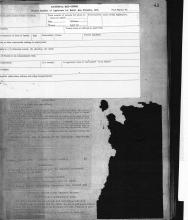
This page displays an application form for relief from the Red Cross and it also displays 3 partial Assembly Daily Journal.
First is the General Register of Applicants for Relief Form, by the National Red Cross, San Francisco, 1906. The application asked basic questions such as the total number of person for whom rations are asked, occupation of head of family, age, nationality, union, employment, address, and so forth.
The first of three partial Assembly Daily Journal reads:
Resolution
The following resolution was offered:
By Mr. Parkinson
Whereas, The Grand Parlor of Native Sons of the Golden West will convene at Stockton on Tuesday, April 18, and this Legislature has been invited to attend their reception upon that day; and
Whereas, Many members of the Assembly will be unable to be there because of other duties, and yet desire to express their appreciation of the invitation; now, therefore, be it
Resolved, That our esteemed member, Frank L. Coombs, who is a Past Grand President of the Native Sons, be delegated to convey to the convention personally our good wishes for success, and the regret of those who remain here on account of their inability to accept the hospitality so generously and socially offered; be if further
Resolved, That the Grand Parlor is invited to visit the Assembly during the session thereof.
Resolution read, and on motion of Mr. Parkinson, unanimously adopted.
The second of three partial Assembly Daily Journal reads:
Thursday, April 14, 1921] Assembly Daily Journal 39
Reassembled
At one o’clock and thirty minutes p.m., the Assembly reconvened.
Speaker Wright in the chair.
Minute Clerk Ohnimus Reading
Reports of Standing Committees – (Out of Order)
The following reports of standing committees were received and read
The last partial Assembly Daily Journal reads:
Assistant Minute Clerk Ohnimus reading
Introduction and Reference of Bills
The following bill was introduced, and referred as indicated:
By Mr. Bishop: Assembly Bill No. 1263 – An act to add a new section to the Code of Civil Procedure, to be numbered 1471, relating to allowances from estates.
Bill read first time, and referred to Committee on Jurdiciary.
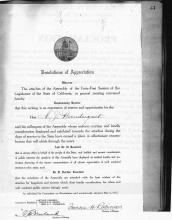
Resolutions of Appreciation
Whereas
The attaches of the Assembly of the Forty-First Session of Legislature of the State of California, in general meeting convened hereby
Unanimously Resolve
that this writing is an expression of esteem and appreciation for the
Hon N. J. Prendergast
and his colleagues of the Assembly whose uniform courtesy and kindly consideration displayed and exhibited towards the attaches during the days of service to the State have earned a place in affectionate remembrance that will abide through the years.
And be at Resolved
that in sincere effort in behalf of the people of this State, and faithful and earnest consideration of public interests the members of this Assembly have displayed an exalted loyalty and patriotism deserving of the sincere commendation of all citizens appreciative of well rendered services to the state, and
Be it Further Resolved
that the members of the Assembly are attended with the best wishes of the attaches for happiness and success which their kindly consideration for others and well rendered public service fittingly merit.
As submitted by Committee on Resolutions and unanimously adopted May 6, 1915.
Committee on Resolutions: Arthur Ohnimus, Harold H. Henry, Mrs. S. C. Thompson
Francis H. Robinson, Chairman of Meeting.
By: C. Enuland, Secretary of Meeting.
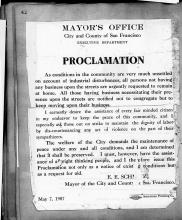
Mayor’s Office
City and County of San Francisco
Executive Department
Proclamation
As conditions in the community are very much unsettled on account of industrial disturbances, all person not having any business upon the streets are urgently requested to remain at home. All those having business necessitating their presence upon the streets are notified not to congregate but to keep moving upon their business.
I earnestly desire the assistance of every fair minded citizen in my endeavor to keep the peace of this community, and I especially ask those out on strike to maintain the dignity of labor by dis-countenancing any act of violence on the part of their sympathizers.
The welfare of the City demands the maintenance of peace under any and all conditions, and I am determined that it shall be preserved. I must, however, have the assistance of all right thinking people, and I therefore issue this Proclamation not only as a notice of existing conditions but as a request for aid.
E.E. Schmitz,
Mayor of the City and County of San Francisco.
May 7, 1907
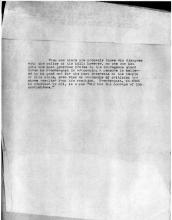
Even now there are probably those who disagree with the policy of the bill; however, no one can but give the most generous praise to the courageous stand taken by the Prendergast in advocating a measure he believed to be good and for the best interest of the people of this state, even when an avalanche of criticism and abuse resulted from his position. Prendergast, it must be admitted by all, is a man “who has the courage of his convictions.”
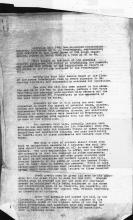
Assembly Bill 798, the so-called vivisection measure, introduced by N. J. Prendergast, representing this district in the lower house of the state legislature, passed on March 30th by a vote of 47 to 25.
This action on the part of the Assembly clearly vindicates the author in introducing the measure, and places this branch of the legislature on record as believing in the policy outlined in the Prendergast Bill.
During the four hour debate waged on the floor of the house Prendergast rose to every occasion in defending his bill, and successfully overcame all opposition.
Now that the bill has been passed by the Assembly and is on its way to the Senate, perhaps a few words regarding the campaign made against this measure and the treatment accorded Mr. Prendergast by the opponents of the bill would not be amiss.
Probably no man in this state has ever been compelled to stand the amount of personal abuse, slander, curses and threats, while letters containing the vilest, statements, filled with menacing threats, and absolutely libelous in their nature were received by Prendergast during the campaign made against both him and his bill by some of the opposition.
Not content with this, cowardly letters were sent to his employers asking for his dismissal; even Mrs. Prendergast was made the innocent victim of these vicious, scurrilous and scandalous attacks; and most humiliating to record, most of these statements and letters cam from women.
Why such a riot of protest should arise from such an unimportant measure is a mystery; why such letters should have been written at all is even a deeper mystery, The only explanation to offer, and the kindest one possible is that the campaign of false statements, glaring misrepresentation and even gross untruths made by some of the societies and workers against the bill, created hysteria in the minds of those who became fanatical in their zeal to defeat the measure. Truly no sane person could have written such letters; truly no sensible person would have written such letters as those received… *the next line is not readable.
Great credit must be given him even by his opponents for the clean flight he made for the bill. Greater credit must be awarded him for the calm and courteous manner he maintained while being subjected to the abuse and vilification such as he received, yet answering all statements in a clear and logical way, without resorting to invective or acrimony.
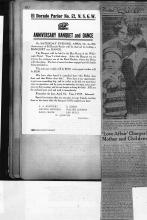
This page displays a flier and a newspaper clipping.
First is the flier, it reads:
El Dorado Parlor No. 52, N.S.G.W.
(Picture of Bear)
Anniversary Banquet and Dance
On Saturday evening, April 7th, the 38th Anniversary of El Dorado Parlor will be observed by holding a banquet and dance.
The Banquet will be held in the Blue Room of the Whitecomb Hotel. Time 7 o’clock sharp. After the Banquet we are to have the exclusive of the Roof Garden where the Dance will take place. The best of music has been engaged and all details being attended to.
The price per couple will be $2.50, extra guest’s ticket will be $2.50.
We have often heard it remarked that “this Parlor does that, and that Parlor does this.” Now here is our opportunity to put over something big, and in order to do this we must have your cooperation, and by your cooperation we mean your presence on that evening, and do not forget to bring the lady. Fill out the enclosed post card and mail it immediately.
Remember the date, April 7th. Time 7 p.m. Informal.
Special invitations that you can give to your friends, inviting them to the dance after the banquet will be mailed to you later.
Committee: F. A. Bonivert, E. Ebert, Arthur Ohnimus, Walter Cousins, Earl Crane, Leo Pucci and W. Quinton.
Second is a newspaper clipping that has been cut off. The title of the has also been cut off it partially reads: ‘Love Affair’ Charges...
Only the first column is readable, it reads:
Former neighbors today came to the rescue of Mrs. Jessie Warehouse, ejected with her two children from their home at 2612 Folsom Street a week ago by the landlady, Mrs. Merle Peterson, who then sought to have the children taken away from Mrs. Warehouse.
Residents of the Folsom Street district gathered around Mrs. Warehouse at the home of her sister at 751 Naples Street, where she and the children have found a refuge, and took steps to circulate a petition defending the young mother’s reputation.
Mrs. Warehouse, who works in a cannery to support her children, Kenneth and Marie, aged 9 and 11, respectively, denied the charges made by Mrs. Peterson to the Associated Charities and the Society for Prevention of Cruelty to Children that she was having a “love affair” with a married man.
Letters for Divorce
“Those letters which Mrs. Peterson found in ransacking my trunk and other effects,” said Mrs. Warehouse, “were in reality written by members of my husband’s family.
“I was planning to use them in obtaining a divorce from my husband, who deserted me and the children a year ago. But those letters I intend to show that he was dissolute, and habitual drunkard and a waster of money.
“As for the charge that I was having a love affair with a married man, that is ridiculous. My sister will bear me out when I say that a man who used to call at the house is a friend of the family.
“he is a bakery wagon driver, and knew our financial condition, and used to call to leave bread for the little ones. Why, he has a wife and two children. I am not the type who would…
* The second column is cut off.
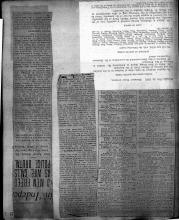
This page displays 3 newspaper clippings and an Assembly Daily Journal.
First is a newspaper clipping. The news clipping is upside down but when turned upright it looks like and advertisement page for jobs and businesses. Some of the information shown is a hotel and restaurant agency looking for chambermaids, waitress, matron, and general help. Some ads even display the rate of pay for the position they are hiring.
Second is another newspaper clipping it is a continuation from a different newspaper clipping, it reads:
today at noon by Chief Clerk Jerome B. Kavanaugh, and the prayer by Rev. William H. Harrison, chaplain of the previous session, was followed by the appointment of attaches, reading the certificates of the election of the members, roll call of counties, swearing in of members and the big event of the opening meeting, the nomination and election of the speaker.
The speaker having been chosen, a committee of there will be selected to escort him to the rostrum.
Then will follow the elections of chief clerk, minute clerk, sergeant-at-arms and chaplain. Arthur Ohnimus, minute clerk at the last session, is uncontested for the place of chief clerk since the withdrawal of Arthur Samish because of other interests that would prevent him taking the place. W. J. Leflar is slated for the place of sergeant-at-arms and the Rev. William H. Harrison appears to have the inside track for chaplain.
Other Appointments
The rest of the Lower House program includes the appointment of assistant clerks and attaches, the adoption of rules and the announcement of the appointment of a bookkeeper to the sergeant-at-arms. This place will probably be filled by Harry Caro of San Francisco. The senate will then be advised that the Assembly is organized and ready for business.
The procedure was more simple in the Senate, where Lieutenant Governor C. C. young, re-elected, called the Upper House to order for the selection, first, of a preside pro tem, Joseph Beek of Santa Ana was schedule for the post secretary, Joseph Nolan of Los Angeles for the place of sergeant-at-arms, and Father McQuaide of San Francisco for the chaplain’s post.
Having effected their organization, the two Houses adjourned until Tuesday, when they are scheduled to be called to order at 11 o’clock to hear the addresses of the retiring governor, William D. Stephens, and the new governor, Friend W. Richardson.
The inauguration of Governor Richardson will take place later Tuesday at a joint session of both Houses.
Written note at the bottom reads: Bulletin News. Jan 6, 1923
Third is the last newspaper clipping it reads:
3 Men Freed as Wife Calls Police Brutal
Cases against Nelson Dismissed after Judge hears testimony at Wide Variance
“He shoved my husband back and hit him with a club-my sons never raised a hand against the officers…”
Pleading for her men, Mrs. George Nelson testified yesterday in language vivid in its simplicity, to what happened at her home the night police arrested her husband and her two sons.
And when she had finished, and all the testimony was in, Municipal Judge Sylvain J. Lazarus dismissed all there charges against the Nelson, George, Lawrence Nelson and Ralph Nelson.
Civil Action Possible
Judge Lazarus’ decision brought to a close the criminal action in the case distinguished for its charges of police brutality. Attorney William Gloria, who represented the Nelson in court, has turned the facts over to Attorney Francis Brown, who said he may file civil action against the three officers accused of beating Nelson and his two sons.
The three men in court to answer charges of battery, resisting arrest, and disturbing the peace, were swathed in bandages. The elder Nelson’s eye was swollen shut with infection.
Testimony was at wide variance. Officer Timothy J. Dolly, Edwin King and John W. McGreevy, under questioning of Assistant District Attorney Arthur A. Ohnimus, gave their version as follows:
Walter Nelson, a third son, came to the Southern station and said there was a fight going on his home, 275 Shipley Street, and his two brothers had beaten him up. He asked for some officers. When they arrived at the house, Nelson Sr. met them at the top of the stairs and with a broom attempted to force them back.
Three Arrested
George Nelson jumped on Officer Dolly and knocked him down. Then there was a general melee, in which blows were struck, and the trio was arrest, Nelson at no time, they agreed, asked if they had a warrant.
Fourth is an Assembly Daily Journal it reads:
Thursday, Feb 24, 1921] Assembly Daily Journal
Nominations for Minute Clerk
The speaker declared the next order of business to be the nomination and election of Minute Clerk of the Assembly.
Mr. Pettis of Fort Bragg placed in nomination Mr. Arthur A. Ohnimus of San Francisco.
Mr. Eksward of San Mateo seconded the nomination of Mr. Ohnimus.
Nominations closed.
Election of Minute Clerk
The roll was called, with the following result”
For Arthur A. Ohnimus – Anderson, Badaracco, Badham, Baker, Beal, Benton, Bernard, Bishop, Bromley, Brooks, Broughton, Burns, Christian, Cleary, Coombs, Cummings, Eksward, Fellom, Fulwider, Graves, Gray, Greene, Hart, Hawes, Heck, Heisinger, Hornblower, Hughes, Hume, Hurley, Johnson, Johnston, Jones, G. L., Jones, I., Kline, Lee, G. W., Lee, I. A., Lewis, Mather, McCloskey, McDowell, McGee, McKeen, McPherson, Merriam, Mitchell, Morrison, Parkinson, Pedrotti, Pettis, Powers, Roberts, Rosenshine, Ross, Saylor, Smith, Spalding, Spence, Stevens, Warren, Weber, Webster, Wendering, West, White, Windrem, Wright, T. M., and Mr. Speaker – 68.
Oath of Office
Mr. Arthur A. Ohnimus, having received a majority vote of the Assembly, was declared duly elected Minute Clerk of the Assembly, and was directed to appear before the bar of the Assembly, where he took and subscribed to the following oath of office administered by Hon. Henry W. Wright, Speaker of the Assembly:
I do solemnly swear that I will support the constitution of the United States and the constitution of the State of California, and discharge the duties of the office of Minute Clerk to the best of my ability.
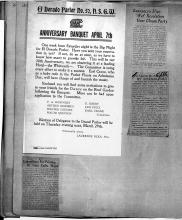
This page displays a flier from El Dorado Parlor and 3 newspaper clippings.
First is the flier, it reads:
El Dorado Parlor No. 52, N.S.G.W.
(Picture of a bear here)
Anniversary Banquet April 7th
One week from Saturday night is the Big night for El Dorado Parlor. Have you sent your reservation in yet? If not, do so at once, as we have to know how many to provide for. This will be our 38th Anniversary, we are observing it at a leading Hotel – the Whitcomb -. The Committee is using every effort to make it a success. Earl Crane, who as a baby rode in the Parlor Floats on Admission Day, will have charge of and furnish the music.
Enclosed you will find some invitations to give to your friends for the Dance and the Roof Garden following the Banquet. More can be had upon application to the Committee.
Committee: F. A. Bonivert, E. Ebert, Arthur Ohnimus, Walter Cousins, Earl Crane, Leo Pucci and Walte Quinton.
Election of Delegates to the Grand Parlor will be held on Tuesday evening next, March 29th.
Fraternally yours,
Laurence Blea, Pres.
Second is a newspaper clipping that reads:
Expenditure for Printing of State Codes Illegal
Attorney General U.S. Webb today advised State Controller Ray L. Riley that the expenditure of $11,120.70 in printing $110,450 1931 motor vehicle codes in the state printing plant was illegal.
The printing of the codes was ordered by the clerk of the assembly and the secretary of the senate after the adjournment of the legislature and without any authority from the lawmakers as a body.
Under such circumstances, Webb informed Riley that the printing of the codes was illegal and that he could not approve the claim.
It is reported that 50,000 of the codes were given to state automobile associations for distribution. The state motor vehicle department also published 102,000 copies of the codes as authorized by law.
Third is a newspaper clipping that reads:
Badaracco Slips ‘Wet’ Resolution over Gloom Party
“Jack” Badaracco of San Francisco finally got a wet resolution adopted yesterday. The “third house,” composed of members, attaches, and correspondents who were beguiling a rainy and idle afternoon, was organized, with Badaracco as speaker, and “Bill” Hornblower as reading clerk. Numerous resolutions were adopted, one abolishing the senate “because it is a useful and necessary body,” another approving one of Badaracco’s wet memorials, and a third declaring that “whereas Volstead has driven the country to the dogs, be it resolved that it now be deeded back to the Indians.”
The “third house” adjourned to meet on the next rainy day.
Fourth is a newspaper clipping that reads:
Speaker Honored by Assemblymen
Examiner Bureau, Sacramento, May 15. – Political differences were forgotten today in assembly presentation of gifts and tokens of appreciation for services rendered by Speaker Edgar C. Levey and other officers during the 1931 session.
Those honored with Speaker Levey were Assemblyman Chester M. Kline, speaker pro tem; Arthur A. Ohnimus, chief clerk; Assemblyman Harry F. Sewell, chairman of the judiciary committee; Louis F. Erb, minute clerk, and Arthur Ferguson, sergeant-at-arms.
Levey is completing his third term. Ohnimus has been chief clerk of the lower house for nine sessions. Kline has served twelve years in the assembly and four in the senate.
Presentation addresses were delivered by Assemblymen Hornblower, McGuinness, Bonelli, Charles Fisher, Badham and Reindollar.
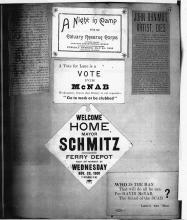
This page displays 2 newspaper clipping and 4 fliers.
First newspaper clipping is not readable because it is too dark.
Second is a flier which is decorated with a border and 4 stars in each four corners of the flier, it reads:
A Nigh in Camp
with the
Calvary Reserve Corps
At their Armory
Calvary Presbyterian Church
Jackson and Fillmore Streets
Tuesday Evening, May 24, 1904
Admission 25 Cents
Third is a flier that reads,
A Vote for Lane is a
Vote
For
McNab
Workingmen, beware that History is not repeated-
‘Go to work or be clubbed”
Fourth is a flier which is in a shape of a diamond, it reads:
Welcome
Home
Major
Schmitz
Ferry Depot
Foot of Market St.
Wednesday
Nov. 28, 1906
7 O’clock P.M.
Fifth is a flier that reads:
Who is the man
That will do all he can
For Gavin McNab,
The friend of the Scab?
Lane’s the Man
Sixth is a newspaper clipping, it reads:
John Ohnimus, Artist, Dies
John Ohnimus, famous figure of San Francisco’s old Bohemian days distinguished as an artist, literacy critic and free thinker, is dead today in Denver.
Word of his death yesterday was received here today by his brother, George Ohnimus of the city police department; a nephew, Arthur A. Ohnimus of the district attorney’s office, and a cousin, Miss Marcy Deck.
A tireless painter and reader, Ohnimus became an authority on both art and letters, and wore a widely read text on art. He painted a famous head of Lincoln after reading every available work on the martyred President.
Painting in a Mexican cathedral, Ohnimus was smitten by the beauty of a young girl, whose face he painted into his picture. She is now his widow, and survives him with two sons and three daughters, Homer Ohnimus of Denver, John G. Ohnimus of St. Louis, Mrs. Maria Ellis and Mrs. Sarah C. Lang of Denver and Mrs. Carmen Nower of Louisville, Ky.
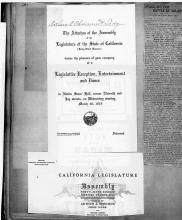
This page displays a 2 documents and a newspaper clipping.
First document, reads:
Arthur A. Ohnimus and Lady
The Attaches of the Assembly
of the
Legislature of the State of California
(Forty-Third Session)
desire the pleasure of your company
at a
Legislative Reception, Entertainment
and Dance
in Native Sons’ Hall, corner Eleventh and
Jay Streets, on Wednesday evening
March 26, 1919
California Seal shown here
This invitation is not transferable and must be presented at the door.
Informal
Second document reads:
Office: District Attorney’s Office, San Francisco
California Legislature
Assembly
Forty-Sixth Session
Nineteen Twenty-Five
Office of
Arthur A. Ohnimus
Chief Clerk
Madge Cross
Secretary to Chief Clerk
Third is a newspaper clipping that is a continuation of another newspaper clipping, it reads:
Stage Set for Battle by Solons
I deemed it proper that the speaker should take no part in partisan legislation.”
Apparently Rosenshine has failed to secure the support of a number of legislators from his home city. Assemblyman Clarence Morris was heard offering a wager in a hotel lobby last night that the San Francisco man would not receive 3 votes. There were no takers.
Breed not opposed
Both houses are schedule to meet at noon. No fireworks are in sight in the senate. The presiding officer Lieutenant Governor C. C. Young of Berkeley is a constitutional officer Senator Arthur Breed of Pledmont apparently has no opposition for president pro tem. Joseph Beek of Santa Ana will probably be selected as secretary to succeed Miss Grace Stoermer, and Joseph Nolan of Los Angeles will be named sergeant-at-arms. A local minister will probably be named chaplain.
In the assembly Jerome B. Kavanaugh of San Bernardino, who was chief clerk of the last session, will call the house to order. Prayer will be offered by the Rev. William E. Harrison, who served as chaplain at the last session; then will come the formalities of reading the certificates of members, roll call by counties, swearing in of members and the first roll call.
Election of a speaker, pro tem chief clerk, minute clerk and chaplain will follow and after these officers have been sworn in and minor appointees chose, the senate will be advised that the assembly is organized. Both houses will meet in joint session tomorrow morning.
Floor Leaders Forgotten
In the fever of interest which has surrounded the speakership fight there has been and absence of discussion as to who will serve as speaker pro tem., of the assembly, neither has there been any intimation as to who will be the floor leaders in the respective houses. J. A. Pettis of Mendocino, who was the administration floor leader last session, has not returned. Frank L. Eksward of San Mateo, who was also served, is not expected to be chosen because of his connection with the retiring administration.
For chief clerk of the assembly, Arthur A. Ohnimus of San Francisco has the lead. It was learned last night that Ohnimus might be opposed by Ellsworth E. Eustace of Gilroy, who was assistant chief clerk at the last session.
C. William Booth of Oakland, who was reading clerk at the last session, will be a candidate either for assistant chief clerk or minute clerk.
Four candidates, Bishop William Hall Moreland, Rev. W. H. Hermitage and Rev. W. E. Harrison of Sacramento, and Rev. George E. Gardiner of Lincoln, are out for chaplain.
Neither house is expected to do more than complete organization today.
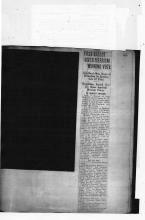
This page displays a newspaper clipping it reads:
First Ballot Gives Merriam Winning Vote
Long Beach Man, Choice of Richardson for Speaker, Gets 42 Votes
Rosenshine, Second, Gets 25; House Applauds Merriam Victory
By Harold Swisher
Frank F. Merriam of Long Beach was elected speaker of the assembly on the first ballot today. Merriam received 42 votes, Al Rosenshine of San Francisco, was second, with 25 votes.
J.J. Prendergast, of Redlands received seven votes; T.M. Wright, San Jose, five, and E. H. Christian, Hayward, obtained one vote.
Merriam’s election was greeted by a deafening outburst of applause. Before the tally was completed, as soon as the Long Beach assemblyman received his 41st vote, the number required to elect, his supporters on the floor and in the gallery stopped the count with their handclapping.
Anderson Speaker Pro tem
Assemblyman Anderson of Alameda was elected speaker pro tem. He carries the honor of dean of the assembly.
Assemblyman Merriam’s name was placed before the legislators by Hugh R. Pomeroy, Redondo Beach, and seconded by Assemblymen Morris and Johnson, both of San Francisco.
Assemblyman Crittenden of Tracy nominated Rosenshine. His speech was seconded by Homer R. Spence of Alameda. Cleary of Lindsay nominated Wright and Jones of Ontario nominated Prendergast.
Roll Call Vote
Vote on the speakership was as follows:
Merriam – Badham, Baker C. C.; Baker, Edwin; Ball, Bromley, Burns, Carter, Christian, Davis, Dawson, Donohue, Douglas, Dozier, Duval, Eksward, Erb, Foster, Fulwider, Graves, Johnston, Kline, Lyons, McMillan, McPherson, Merriam, Miss Eleanor Miller, Mitchell, A.; Moore, Morris, Mueller, Noyes, Pedrotti, Pomeroy, Roberts, Rock, Scott, Smith, Snyder, Stow, Weller, Whitacre, Williams.
Rosenshine – Anderson, Badaracco, Bernard, Carlson, Coombs, Crittenden, Croter, Dean, Dorris, Emme, Fellom, Fox, Hawes, Hornblower, Lyman, Mathews, McDowell, Mitchell, T.A.; Morrison, Reindollar, Rosenshine, Schmidt, Spence, Stevenot, Woodbridge, Mrs. C. M.
Prendergast – Boughton, Clarke, Connolly, Johnson, Jones, West, Wright.
Wright – Cleary, Heisinger, Prendergast, Saylor, Spalding.
Christian – Cleveland.
Arthur M. Ohnimus was elected chief of the assembly and Lefler sergeant at arms.
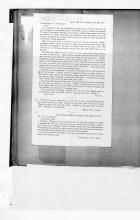
123 N. Hill St. Los Angeles Cal. Feb. 21st.
Assemblyman N. J. Prendergast: -
Sir:-
As a California voter and San Francisco property-owner, I beg to point out one fact in regard to our Assembly bill No. 798 which may have escaped your attention. It is this-The people of this state are not likely to readily forgive anyone who brings an avalanche of adverse advertising upon California-such advertising as the state will get, throughout the civilized world, should your committee report favorably on the bill and it should become law.
Most of us never heard of you before you became sponsor for this bill. Being a newspaper reporter, I know that there are many men and women who would rather come into the limelight in the glare of criticism, than not be heard at all. The notoriety you are achieving however is not the kind that will benefit either you, or this state.
Thousands of periodicals, in this and other countries, are devoted to animal interest and cater to animal lovers. Almost without exception, these periodicals will comment most adversely on the bill and on the state, should the bill become law. Animals, abandon in public pounds, are forlorn and helpless enough as it is. You will be known as the individual who made the lot of these defenseless creatures even harder. Of course you, and I, and everyone else who knows anything else of surgery, is well aware of how much there is in that specious talk of “chloroform.” The patient comes out from chloroform-and then the suffering begins.
Naturally I am not appealing to the author of Assembly bill No. 798 on the score of pity for animals. I merely venture to suggest that there are others who have a great deal of pity, even for the defenseless animals abandoned in public pounds and that they are already beginning to make their voices heard. I have heard you today called “meaner than a man who takes candy from a baby.”
You may say that the world abounds in medical journals and that they will glorify the state and you, should your pill pass. Medical journals however are not read by the masses-only by doctors who fill them with accounts of their own exploits and will probably give scant space to recounting yours.
I have seen many advertising campaigns, but if I were your publicity agent, I should venture to give you Punch’s advice to those about to marry – “DON’T.”
Yours truly, M. Coe
The more I learn of such people as you the more I respect dogs, California should be proud of you and your kind. Possibly you don’t know what “Vivisection” means, possibly you hope to be “city dog catcher.” Possibly you may again want to turn for office, possibly we will remember.
(Signed) Wm. Carroll
102 S. Occidental Blvd Los Angeles Calif. March 1st 1917.
Mr. N. J. Prendergast
Sacramento, Calif.
Dear Sir. This letter is not to appear to you from a humane standpoint in regard to Assembly Bill 798, that would be useless-you certainly have no humane instincts. As a Californian by adoption I blush for shame to think one of our Representatives should endeavor to pass a bill to add revenue to a State, that God has made so beautiful, when that Bill means inflicting torture upon poor helpless animals.
If your bill succeeds, I hope that you may never have another moments peace in this world or the world to come.
Elizabeth Clayton Jones
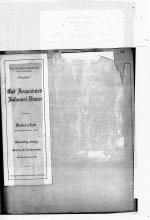
This page displays an invitation, it reads:
The General Assembly
Forty-Third Session
Attaches’
Get Acquainted
Informal Dinner
Occurs at
Walker’s Café
1020 Fifth Street, between J and K
Wednesday evening
January the twenty-second
Nineteen hundred nineteen
The Big Bear Begins Performing at Seven Sharp.
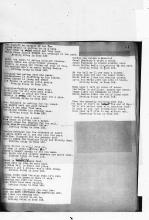
This page displays a poem, it reads:
Nat Haslett he studies at the law.
Lyman Heheir is getting to be a bore.
“Aye” Ream is still stout and very dark,
While Henry Harold spends his evening in the park.
Nothing doing in Room 122.
Mabel has taken to eating midnight lunches.
Bertha likes her after-dinner punches.
Phillis is young and strong and full of fire,
For waffles she’s an awful strong desire.
Nothing doing in Room 122.
Robinson has gotten over his peeve.
Gildersleeve is sniffling up his sleeve.
Helen Karnes is young and sweet
Joe Figone is getting quite petite.
Nothing doing in Room 122.
Josephine is making dates each hour.
To Mallory – we all wish more power.
Marian Brown is still too thin.
Beverly is going out in an auto for a spin.
Nothing doing in Room 122.
Mrs. Mulcaire is getting far too short.
Ora hasn’t left one good retort.
Davis is far away from here,
But Kelley drinks his evening beer.
Nothing doing in Room 122.
Brown’s looking for a meal.
Miss Sears is giving him a spiel.
Stolder likes the Empress far too well.
While Alma the Assembly belle.
Nothing doing in Room 122.
Charles McClogan has the attaches at heart,
On April sixth we’ll see him play his party.
With Mrs. Thompson for his partner fair
They’ll dance the Highland Fling and Grizzly Bear.
Nothing doing in Room 122.
Church Devine is still with us,
But then it takes a Jitney Buss.
Waffle’s hungry enough to eat his name.
Mrs. Smith has the country members now quite tame.
Nothing doing in Room 122.
Elwood is turning pages fast.
Hannon eats as long as eats last.
The Widow Wall is sweet and young
Victoria’s got a grouch – who’s been stung.
Nothing doing in Room 122.
Monohan looks upon the wine when it’s red.
Bishop has the grace to have it said.
Wendering has lost his voice.
Moses Stern does much rejoice.
Nothing doing in Room 122.
McTiernan says his words are very few.
Hayes has quit the bunch for something new.
Bert likes his evening tea.
Alan Burr is flirty as can be.
Nothing doing in Room 122.
Gordon has become a Benedict
Hazel Bradbury’s quite a stick.
Grace Ferguson is always working hard.
Louis Holden tells his stories by the yard.
Nothing doing in Room 122.
At the ball we’ll see many a flower.
Dolores says for her the shady bower.
Scott Ludlow likes his evening snooze.
April 6th we’ll give him lots of booze.
Nothing doing in Room 122.
Emma hasn’t left an ounce of sense.
She talks in shillings, pounds and pence.
Tommy likes his messages in print.
Eddie Marron likes the tulip julep mint.
Nothing doing in Room 122.
When the Assembly adjourns someday,
(We hope it won’t be before the end of May.)
We’ll all return home with memories fond.
Of days of joy, and friendships sound.
Much then we’d give to say without ado,
Something doing in Room 122.
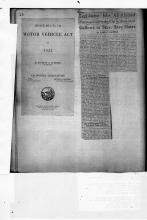
This page displays a document and a newspaper clipping.
First is a document that reads:
Senate Bill No. 743
Motor Vehicle Act
Of
1923
By Senator A. H. Breed
Of Oakland
California Legislature
J. A. Beek
Secretary of the Senate
Arthur A. Ohnimus, Chief Clerk of the Assembly
California Seal is shown here
California State Printing Office
Frank J. Smith, Superintendent
Sacramento, 1923
Second is a newspaper clipping, it reads:
Legislative Jobs Abolished
Patronage List Knocked Out by Amendment
Gallows to Stay, Says Slater
By Earl C. Behren
Wives, daughters and near relatives of Assemblymen, if you have tears prepare to shed them now:
There “ain’t going’ be no jobs” at Sacramento this winter.
The awful truth is out. The patronage list of the state legislators will be cut more than 50 percent at the coming session.
And it is all because State Senator Walter A. McDonald of San Francisco introduced a constitutional amendment, which the voters approved on November 4.
The Senators and Assemblymen will receive in the future $2400 a term instead of $1000 as in the past. But it’s going to be a hard winter on relatives who hoped to get soft jobs with little work during the coming session.
For the McDonald bill, the fruits of which will not be tasted by its author, who met defeat at the polls, evidently was framed with the expenses of the upper house in mind, but not the Assembly.
$300 Daily Set as Expense in Legislative Branches
The bill sets $300 a day as the limit for running each house instead of $500, as in the past, and makes it necessary for the Legislature to save enough out of this daily allowance to carry on the necessary recess routine and the after-session work. Those two items have run close to $2500 in the past.
Fifteen wives and thirteen other close relations lined up at the cashier’s window on pay days in the Assembly last year.
Most of them were committee clerks. This year the list of committee clerks will be four.
Last session the Assembly history shows 101 names on the payroll. The 1925 list of employees will number about fifty-seven.
Last session there was twenty-three assistant sergeants-at-arms, twenty-five stenographers, twenty-two committee clerks and six pages.
Some of those experienced around the Sacramento legislative halls have pruned down the list of employees at the next session until it comes within the $300 a day limit.
List of Clerks and Other Employees who lose out
You, whose hopes are blasted scan these figures and weep:
Chief Clerk, $10 a day; assistant $9; three assistant at $7; minute clerk, $9; assistant, $7; history clerk, $7; assistant, $5; file clerk, $7; assistant, $5; chaplain, $4; engrossing and enrolling clerk, $7; three assistants at $5; journal clerk, $7; assistant journal clerk, $5; sergeant-at-arms, $8; six assistants at $5; chief stenographer, $6; eighteen stenographers at $5; postmistress, $4; assistant, $4; bookkeeper, $5; clerk judiciary committee, $6; clerk ways and means committee, $6; six pages at $2.50; two committee clerks at $4.
It is going to require experienced heads to run the next session.
As far as we hear Arthur A. Ohnimus will be a candidate for Chief Clerk of the Assemblyman last session from the Twenty-eighth district of this city is said to be thinking about applying for the job as minute clerk. “Lumber Jack” Charlie Wilkenson, Fred Hawes’ assistant sergeant-at-arm at the 1923 session, is grooming himself for W. J. Leflar’s place as sergeant-at-arms of the Assembly. Leflar, it is presumed, will be candidate again.
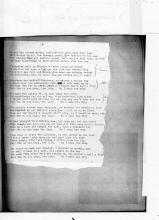
This page displays a poem, it reads:
We are two busted sailor lads, off the good ship Mary lee
We’ve sailed to all the foreign ports, like Oakland by the sea
Thru choppy seas and howling gales, we’ve sailed both near and far
And many a schooner we have guided safely over the bar
I remember well in 52, when we were young and giddy
We started out upon a trip, on the fast tub Garden City
The Night was dark and stormy, the moon was shining bright
And everything that we could see, was hidden out of sight
The first day out of Alcatraz, we struck a choppy sea
I stood upon the star-board, rail, a lady next to me
The boat she hit an awful swell, I thought she’d turn a flip
Say: Who do you mean, the lady. No I mean the ship
The gale was making 95, it tore away the yards
The cook house and the gallery, blew overboard like cards
I feared she’d lose all she had on, the way she’d toss and tip
Say: Who do you mean, the lady. No I mean the ship
The captain showed some strategy, he changed the course to east
She righted up and skipped along, for a knot or so at least
When all her sheets I thought she’d lose, as I heard an awful rip
Say: Who do you mean, the lady. No I mean the ship
On she plunged in a rolling sea, her nose was wet and leaky
With sheets all torn and gallery gone, her ribs were rather creaky
When on a rock she bumped her tail, upon a downward dip
Say: Who do you mean the lady. No I mean the ship
From stem to stern she quivered, as she landed on the rock
I was a sorry lady when the old girl left the dock
Three creaky ribs were broken a little from the hip
Say: Who do you mean, the lady. No I mean the ship
All hands on deck was shouted, I grabbed my chewing gum
For well I knew that Mary, was almost on the bum
She sank from sight with her bottom up, she turned a half a flip
Say; Who do you mean, the lady. No I mean the ship
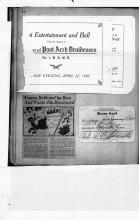
This page displays several items a flier, a newspaper clipping and a press card.
First item is a flier that is torn in half, what is left of the flier mentions a ball or some sort of entertainment that will be held on April 27, 1907.
Second item is a newspaper clipping, it reads:
Woman Bothered by Bees and wants’ Em denatured
Bees will be bees, it seems but when they battle with neighbors for the possession of the family clothes-line they become a nuisance.
This was what Mrs. Mary Stone, 7521 Geary Street, told Assistant District Attorney Arthur Ohnimus yesterday and she wants something done about it – steps taken or the bees denatured.
Ohnimus ordered A. E. Robert, 7545 Geary Street, owner and shepherd of the bees, to appear tomorrow to show cause why he should not be arrested on a charge of maintaining a nuisance.
So far, Mrs. Stone said, she has not been bitten but she will trust a bee just so far and no farther – about ten feet. She said that Robert’s bees were flying all over the neighborhood.
She further charged that she and her 3 year old daughter were afraid to venture out in to the yard to the clothes line for fear of swarms of bees which congregated there and threatened violence.
Third item is a press card, it reads:
Assembly Chamber
California Legislature – Fiftieth Session
Press Card
Sacramento, January 2, 1933
This is to certify that A.R. Kinsey representing the Associated Press is an accredited newspaper representation and entitled to the usual courtesies.
Walter Little (Signature), Speaker
Arthur A. Ohnimus (Signature), Chief Clerk
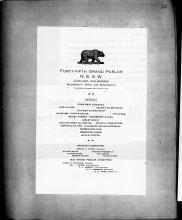
California Bear Picture Here
Forty-Fifth Grand Parlor
N.S.G.W
Oakland, California
Wednesday, April the Nineteenth
Nineteenth Hundred and Twenty Two
Menu
Crab Meat Cocktail
Ripe Olives
Celery en Branche
Chicken Gumbo Soup
Sandabs, TarTar Sauce
Potatoes
Giblet Gravy
Cauliflower Au Gratin
Potato Croquettes
Asparagus Tips, Thousand Island dressing
Frozen Egg Nog
Assorted Cakes
Black Coffee
Banquet Committee
Harold H. Flood, Chairman
Walter White
Milton Glaze
George Wilson
Thomas Fitzgerald
Dan Loring
Frank Kinsey
1922 Grand Parlor Committee
Harry G. Williams, Chairman
Wm. J. Hayes, Vice Chairman
F.C. Merrit, Vice Chairman
E.F. Garrison, Treasurer
R.M. Hamb, Secretary
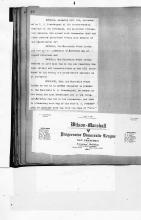
This page displays 2 documents.
First document reads:
Whereas, Assembly bill 798, introduced by N.J. Prendergast of the twenty-seventh district of San Francisco, the so-called vivisection measure, has caused more discussion than any other measure introduced during this session of the legislature; and
Whereas, The Honorable Frank Jordan has now in his possession an Airedale dog of famous pedigree; and
Whereas, The Honorable Frank Jordan desires to give this dog to the man receiving the most letters and communications on any bill introduced by him during the forty-second session; be it therefore
Resolved, That the Honorable Frank Jordan be and he is hereby requested to present to the Honorable N.J. Prendergast, by reason of his being the most advertised man in the State, the Airedale dog now in his possession, and that in presenting said dog to the said N.J. Prendergast he christen said dog with the name of “Vivi.”
Second document reads:
Wilson – Marshall
Progressive Democratic League
Of
San Francisco
Investors’ Building
787 Market Street
Rooms 201-2 Phone Sutter: 3007
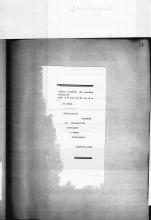
This page displays a document that is damage and doesn’t have all the contents together. From what is readable, it seems that it might have been some type of menu. Some of the words that are readable are: Turtle Royal, Radishes, Miramontes, and Assorted Cakes.
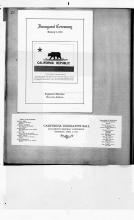
This page displays 2 items.
First item looks like a cover page or something of that nature, it reads:
Inaugural Ceremony
January 9, 1923
California State Flag Picture
California State Flag
The Bear was used by the American party in volt against Mexican authority in 1846, and was adopted by an act approved February 3, 1911, as the California State Flag.
Legislative Chambers
Sacramento, California
Second item reads:
California Legislative Ball
Sacramento Memorial Auditorium
Thursday, April 4, 1929
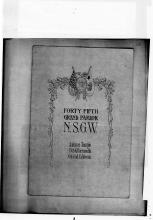
This page displays an item that looks like a cover page; the words are surrounded by a decorative border. It reads:
Forty Fifth
Grand Parlor
N.S.G.W.
Aahmes Temple
13th & Harrison Sts.
Oakland, California
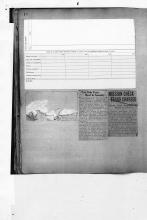
This page displays an application form and 2 newspaper clippings.
First item is an application form; it does not specifically state what the application is for. Some of the information the application is asking for are: the number of food card issued, date as to adult bread winners in family or party, name, sex, age, nationality, occupation, union, former employer, references, present employment and future plans.
Second item is a newspaper clipping it reads:
Quip Ends Tense Mood in Assembly
The tenseness of the situation that confronted the legislative assembly yesterday afternoon when the momentous question of who would be named speaker of the house was pending, was broken by an unexpected touch of humor on the part of Assemblyman Jack Croter of Oakland.
Chief Clerk Arthur H. Ohnimus had called for nominations for speaker several times. The house was stilled, members awaiting the demand of opposing spokesmen for recognition while spectators in the gallery earned their necks in anticipation.
“Move the nominations be closed,” shouted Croter. As the humorous significance of Croter’s motion broke into the consciousness of the members, the strain under which they were laboring was dissolved. Assemblyman William B. Hornblower jumped to his feet and seconded the motion. Then the whole house, members, attaches and spectators joined in the roar of laughter that followed.
Third item is another newspaper clipping it reads:
Mission Check Fraud Charges
Salvage Store Proprietor is Sought by Police
Wallace Appelman, 42, 747 Geary Street, was sought on a warrant today charging him with issuing a fictitious check to M. M. Morris, 117 Golden Gateway.
Appelman has been missing from his place of business, the Pacific Salvage Store, 2352 Mission St, for a week, according to Morris.
Asst. Dist. Atty. Arthur Ohnimus said reports that Appelman has defrauded investors of $50,000, through bankrupt stock speculations, are being investigated by the police.
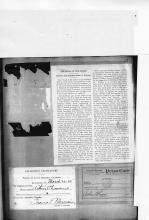
This page displays 3 items: an article, Permit and blank Press Card.
First item is an article or something of that nature, it reads:
The Good of the Order
By First Vice-President Arthur A. Ohnimus
The “Good of the Order” is an unlimited field to write about and should be of the greatest interest of all of our members, for in the social benefit derived lies the success or failure of our organization. The fraternal part of the Order is merged in the Social side and the Beneficial end is indeed weak if our social features are neglected.
The Beneficial part of the Order is but the business end of it, while the Social side of the organization is what removes it from a cold business proposition and makes a fraternal society worth considering as against a strictly business affair. Friendship is seldom prompted by business; for money knows no sentiment but fraternity means friendship and kindness. In order that the advantages of friendship may be had, the “Good of the Order” was made a prominent feature of our organization.
Many brothers think because a committee has been appointed to care for the entertainment of our members all that is necessary is to take the fruits of the committee’s labors, without adding any effort of theirs to assist in making the affair a success. Now allow me to suggest that each and every brother who has a suggestion to offer place that suggestion in the hands of the committee or better still come to the meeting and advance the proposition and if necessary battle for his conviction. I feel certain that he will be met with a cordial reception and his idea given the consideration it deserves; also he will receive the gratitude of the parlor for his interest. This should be a duty, brothers, for in giving pleasure to others, happiness comes to you. IN our busy lives too often are the friends of long ago forgotten; why not make El Dorado Parlor’s meeting night a place where old friendships may be renewed and new associations formed?
Before passing from this subject I desire to particularly mention by name a few of our brothers who have assisted in making our Parlor’s entertainment a success. To Brother William Thomas belongs the credit for the suggestion of publishing “The Bulletin.” Brother J.J. Crowley has always taken an active interest and advanced many useful hints. Brothers Downie and Martell have done much good work in this direction. Brother Bonivert has never failed to do his share in helping the good work along. Brother Hall has assisted in promoting this feature of our Order, as have Brothers Hauer and Warnike. Brother Goldsmith has endeared himself to the members for the ability he has displayed in entertaining the Parlor upon repeated occasions. Brother Blay has helped us and for a new member has taken an unusual interest. To Brother Chaquette belongs unlimited credit for the able manner in which he managed the affairs of the Parlor during the year he was President. Brother John Morrison made a decided success as Chairman of this important committee and the Parlor has him to thank for many of the good times enjoyed.
Our Ninth of September Celebration is in the hands of a competent committee under the able leadership of Brother Henry Alves. I feel certain the affair will be conducted in a manner reflecting credit upon him and all will have an excellent time who comes to the Parlor on that day.
We would like to make our Christmas “Bulletin” a large edition with articles by as many of our brothers as space will permit. Your suggestions are not only invited as to the best way of accomplishing this, but your cooperation is urged.
In conclusion try and set aside Thursday evening of each week and come to the meetings; do your share in making a success of our Parlor. Let us all get behind our new President Charles Reilly and make his term a successful one. Let our slogan be “The Fifth Delegate.”
The second item is a permit to leave Assembly Chamber, it reads:
California Legislature
Permit to Leave Assembly Chamber
Sacramento, Cal. March 23, 1925
The Sergeant-at-Arms:
Please Permit Arthur Ohnimus to leave the Assembly Chamber.
Frank F. Merriam, Speaker of Assembly.
The third item is a blank Press Card that has not yet been filled out, it reads.
Assembly Chamber
California Legislature
Forty-Fifth Session
Press Card
Sacramento (Date Here)
This is to certify that (Name of Person here) representing the (newspaper name here) is an accredited newspaper representative, and entitled to the usual courtesies.
(Speaker Signature Here)
Arthur A. Ohnimus (Signature), Chief Clerk
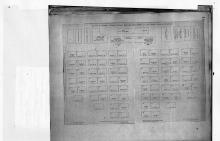
This page displays a diagram for the Assembly Chamber, it shows the name and seat number of each member – Forty-Fifth Session.
Starting from the top of the chart:
Head of the Chamber seat is Honorable Frank F. Merriam, Speaker.
Top left seat is the Sacramento Union; the San Francisco Journal; Everett Cox, History Clerk and Daven Morey, Assistant History Clerk.
Top Middle Seat in the ‘Reading’ side is Assistant Chief E. E. Eustice and sitting right next to him is Weaestman, Orr the Assistants Powers. Then in the ‘Clerk’ side is Minute Clerk C. Wm. Booth and next to him is his Assistants, Cooley and Stafford.
Top right seat is Arthur A. Ohnimus, Chief Clerk; Charles H. Erb, File Clerk; F. F. Williamson, L.M. Bromley, Assistant File Clerks; Fresno Bee, Sacramento Bee, Stockton Record and Los Angeles Press.
Below is where the rest of the member seat. The seat numbers and names are below:
- Douglas G. H. (Deceased)
- Mitchell, T. A.
- Hawes, F. C.
- Morris, C. W.
- Bernard, V.
- Carter, H. E.
- Kline, C. M.
- Anderson, F. W.
- Graves, S.T.
- Baker, Edwin
- Stevenot, F. G.
- Ball, C. D.
- Davis, G.H.
- Whitacre, P. A.
- Mueller, E. A.
- Bromley, E. P.
- McPherson, B. B.
- Coombs, F. L.
- West, P. G.
- Johnston, J. W.
- Erb, L. F.
- Scott, W. S.
- Morrison, H. F.
- Rosenshine, A. A.
- Badaracco, J. B.
- Schmidt, W. J.
- Fellom, Roy
- Rock, W. J.
- Mathews, A. J.
- Eksward, F. L.
- Lyons, H.
- Pedrotti, J. L.
- Prendergast, S. J.
- Jones, I.
- Emme, O. J.
- Snyder, B.
- Williams, D. C.
- Foster, C. A.
- Smith, E. J.
- Lyman, R. M.
- Saylor, Mrs. Anna L.
- Miller, E.
- Broughton, Esto B.
- Dorris, G. S.
- Heisinger, S. L.
- McDowell, H.
- Hornblower, W. B.
- Burns, J. F.
- Carlson, F. M.
- Reindollar, C. F.
- Noyes, F. B.
- McMillan, A.
- Moore, F. J.
- Woodbridge, C.
- Christian, E. H.
- Spence, H. R.
- Croter, J.
- Fox, C. B.
- Mitchell, A. G.
- Pomeroy, H. R.
- Roberts, F. M.
- Weller, F. C.
- Badham, W. E.
- Donohue, E. I.
- Fulwider, L. E.
- Wright, T. M.
- Spalding, C. C.
- Crittenden, B. S.
- Dean, G. A.
- Clarke, G. A.
- Connolly, P.
- Baker, C. C.
- Cleveland, G. C.
- Cleary, C. W.
- Johnson, F.
- Dozier, E.
- Merriam, F. F.
- Dawson, C. B.
- Stow, E. W.
- Duval, W. H.
On far left side of the room where the members sit there are desks there for the Associated Press, San Francisco and Oakland correspondents.
On far right side of the room where the members sit there are desks there for the Los Angeles Times, Examiner, Oakland and other correspondents.
At the very back on the left side is where Bookkeeper, Sergeant-at-Arms and Post Office sits.
At the very back side on the right side is where W. J. Leflar, Sergeant-at-Arm desk is located.
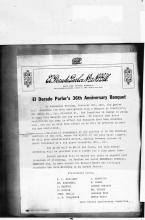
El Dorado Parlor No. 52 N.S.G.W.
Meets Every Thursday Evening at
Native Sons Building, Mason St., Bet Geary and Post
El Dorado Parlor’s 36th Anniversary Banquet
On Wednesday Evening, February 2nd, 1921, the Parlor will celebrate its 36th Anniversary with a Banquet at Gianduja’s, 631 Union St., Cor. Stockton St. The committee in charge is going to make this Banquet one big success. We realize that since Prohibition has been in effect the Banquets have been somewhat dull, but not so with this affair as we will be prepared to meet the new conditions.
To give it Atmosphere are holding it in the Bohemian quarters of the City, where the spirit of the past still lingers. We will have entertainment galore, dancing between courses to music furnished by a six piece orchestra, Etc., Etc.
The price will be $2.00 per plate, but each members attending will be provided with a ticket for a lady guest free.
Return postals will be mailed you later to signify your intention of attending. So Brother set aside Wednesday Evening, February 2nd, to meet around the Banquet Board and fittingly celebrate the 26th Birthday of El Dorado Parlor.
Fraternally yours,
F.A. Bonivert
ED. McDonnell
F. Martell
H. Downie
Chas. Reilly
A.B. Chaquette
J. Morrison
E. Harms
Arthur Ohnimus
Wm. Thomas
Leonard Biss
Myron Kelly
36th Parlor Anniversary Committee
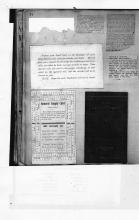
This page displays 6 items.
The first item on this page is a Food card, it reads:
Present your Food Card to the Manager of your Relief Station and state the articles you desire. He will give you a signed list showing the articles you are to receive, provided he finds you are entitled to same. Take this list with this card to the proper warehouse, as indicated on the opposite side, and the articles will be delivered to you.
Note: Keep this card; Duplicates will not be issued.
The second item on this page is a General Supply Card. Around the cards are list of supplies and numbers above the supply names to indicate how many supply a person has received. Some of the items that are listed around the card are hats, shoes, drawers, vests, trousers, towels, sheets, lamps, mattress, tents, cots, lanterns, buckets and other day to day essentials. The card also reads:
General Supply Card
Second Sect.
For articles indicated on this half of card, go to Warehouse No. 2, located 500 feet from entrance, on main drive Golden Gate Park.
The third item on this page is a short newspaper clipping, it reads:
Arthur Ohnimus, clerk of the assembly, and Joseph Beek secretary of the senate, were busy all day yesterday on routine matters and tomorrow will submit the official attaché lists. This procedure again is necessary because with the exception of the sergeant-at-arms all attaches were dismissed for the period of the recess.
The lawmakers will get down to real business Wednesday morning.
Lobbyists Arrive
The fourth item on this page is a newspaper clipping, it reads:
The final calendar of the Legislature of 1927 was issued yesterday from Sacramento. It was compiled for the assembly by Arthur A. Ohnimus, chief clerk, and by Joseph A. Beek, secretary of the Senate for the Upper House. It is a voluminous document, well arranged and simple in form, for the guidance of those who may seek to know just what the action and the record upon every bill resolution and other measure introduced.
The calendar covers a complete history and index to the measures with considerable other statistical information, concisely arranged and presented. It reflects credit upon the legislative officials and the staffs who prepared the mass of details.
The fifth item on this page is a newspaper clipping, it reads:
Arthur A. Ohnimus
Chief Clerk, State Assembly
I don’t know what the good people of Sausalito ever did to acquire the good fortune of having the well-known Frank B. Anderson as a permanent in their midst; however, Sausalito has gained much in the addition of “Andy.”
We shall look for great things to happen “Where the Redwood Highway Beings” now that you have taken charge of The News.
The last item on this page is extremely difficult to read because of the darkness of the paper. It appears to be a front page of a pamphlet or something of that nature. From what can be seen, it reads:
Legislative Reception
Sacramento

This page displays 3 items.
The first item on this page looks like a front cover of an invitation it reads:
(California Seal Picture displayed here)
(Two American Flag crisscrossing each other)
Attaches’ Biennial Ball
Sacramento 1921
The second item on this page is an uncompleted Guest Card it reads:
California Legislature
Assembly
Forty-Fifth Session
Guest Card
Sacramento (Write date here) 1923
Wm. J. Leflar
Sergeant-at-Arms:
Please admit: (Write person name here that needs to me admitted) of (Write here either where they are from) to Assembly Chamber at the session today.
(Signature of the member of the Assembly)
No request for name of visitor to be printed in journal.
Initialed by the Speaker (Signature or Initials go here)
The second item is an Assembly Daily Journal, it reads;
2 Assembly Daily Journal [Wednesday, Jan 5, 1921
Chief Clerk Kavanaugh Reading
Resolution.
The following resolution was offered:
By: Mr. Pettis:
Mr. Speaker: Your Committee on Attaches and Employees respectfully begs lave to report that it has carefully considered applicants for the various positions and desires to submit the following report and recommends the adoption of the following resolution:
Resolved, That the following named person be and they are hereby appointed and employed for the positions, and the per diem set opposite their respective names, said per diem to be paid out of the appropriation for the payment of officers and employees of the Assembly, said appointments to date from and include the fourth day of January, 1921, and the State Controller is hereby authorized and directed to draw his warrants upon the appropriation for the payment of officers and employees in favor of the following named person, for the said per diem, and the State Treasurer is hereby authorized and directed to pay the same:
Ellsworth Eustice, Assistant Clerk $7.00
Pete Phillips, Assistant Clerk 7.00
Q. H. Johnston, Assistant Sergeant at Arms 5.00
George J. Scully, Bookkeeper to Sergeant-at-Arms 5.00
Arthur A. Ohnimus, Assistant Minute Clerk 7.00
Helen Biggs, Assistant Minute Clerk 7.00
Vernon W. Lilley, Journal Clerk 7.00
Ralph Wright, Assistant File Clerk 5.00
Anna T. Perry, Postmistress 4.00
Mrs. A. A. Wendering, Assistant Postmistress 4.00
Bessie McBride, Chief Stenographer 6.00
Lee Day, Stenographer 5.00
Norma Brown, Stenographer 5.00
Martha J. Clarke, Stenographer 5.00
Corrine Clement, Stenographer 5.00
Helene Hurley, Stenographer 5.00
Helen F. Warren, Stenographer 5.00
Ethel Secor, Stenographer 5.00
Gertrude Wright, Stenographer 5.00
Gladys Cress, Stenographer 5.00
Norma Gunderson, Stenographer 5.00
E. Lansford, Assistant Sergeant at Arms 5.00
Theo Lafayette, Assistant Sergeant at Arms 5.00
Albert Houston, Assistant Sergeant at Arms 5.00
Daniel A. Whelan, Assistant Sergeant at Arms 5.00
Horace E. Lee, Assistant Sergeant at Arms 5.00
F. B. Noyes, Assistant Sergeant at Arms 5.00
H. H. Smelzer, Assistant Sergeant at Arms 5.00
Payne Middleton, Assistant Sergeant at Arms 5.00
John E. Reynolds, Assistant Sergeant at Arms 5.00
W. W. Greer, Assistant Sergeant at Arms 5.00
Stanley Windrem, Page 2.50
Shepard Hughes, Page 2.50
Ed Morey, Page 2.50
Charles Fuller, Page 2.50
Mrs. J. O. Bishop, Committee Clerk 4.00
L. M. Bromley, Committee Clerk 4.00
Mrs. F. J. Cummings, Committee Clerk 4.00
Mrs. J. L. Pedrotti, Committee Clerk 4.00
Jessie A. Spalding, Committee Clerk 4.00
Louis F. Erb, File Clerk 7.00
(Signed Out.)
Pettis, Chairman.
Wright,
Hughes,
Johnston,
White,
McKeen,
Hornblower
The third item displays the name, title, home address, local address and phone number of Officers of the Assembly:
|
Name |
Title |
Home Address |
Local address |
Phone |
|
Wright, Henry W |
Speaker |
1009 Fair Oaks Av., South Pasadena |
Hotel Sacramento |
Main 900 |
|
Rosenshine, A. A |
Speaker Pro Tem |
846 Mills Bldg., San Francisco |
Hotel Sacramento |
Main 900 |
|
Kavanaugh, Jerome B. |
Chief Clerk |
San Bernardino |
1926 22d St. |
Main 3592-R |
|
Kavanaugh, Marie |
Secretary to Chief Clerk |
San Bernardino |
1926 22d St. |
Main 3592-R |
|
Anderson, Hattie Jewell |
Minute Clerk |
|
|
|
|
Harrison, Rev. Wm. E |
Chaplain |
1431 15th St., Sacramento |
Same |
Main 4884 |
|
Eustice, Ellsworth E. |
Assistant Chief Clerk |
Gilroy |
Hotel Clunie |
Main 5400 |
|
Leflar, Wm. J |
Sergeant-at-Arms |
1310 18th St., Sacramento |
Same |
Main 2699-W |
|
Scully, Geo. J |
Bookkeeper to Sgt-at-Arms |
|
|
|
|
Lilley, Vernon W. |
Assistant Clerk |
328 N. Marengo Ave., Pasadena |
1303 I St. |
Main 3958-R |
|
Booth, C. Wm. |
Assistant Clerk |
1225 E. 2rd St., Oakland |
1714 8th St. |
Main 1833-W |
|
Phillips, Pete |
Assistant Clerk |
Los Angeles |
|
|
|
Ohnimus, Arthur A. |
Assistant Minute Clerk |
2910 Fulton St., San Francisco |
Hotel Land |
Main 5040 |
|
Biggs, Mrs. H. |
Assistant Minute Clerk |
Mariposa Apts., Oakland |
3301 33d St. |
|
|
Erb, Louis F. |
File Clerk |
578 7th Av., San Francisco |
816 14th St. |
Main 5531-W |
|
Wright, Ralph |
Assistant File Clerk |
1009 Fair Oaks Ave., South Pasadena |
Hotel Sacramento |
Main 900 |
|
Samish, Arthur H. |
Engrossing & Enrolling Clerk |
562 Hayes St., Apt. No. 4, San Francisco |
Hotel Land |
Main 5040 |
|
Orr. Robert |
Journal Clerk |
Hollister |
Travelers Hotel |
Main 4870 |
|
Perry, Anna T. |
Postmistress |
358 2d Av., San Francisco |
2100 L. St. |
|
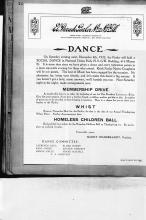
El Dorado Parlor No. 52 N.S.G.W.
Meets Every Thursday Evening at
Native Sons Building, Mason St., Bet. Geary and Post
Dance
On Saturday evening next, November 4, 1922, the Parlor will hold a social dance in National Union Hall, N.S.G.W. Building, 414 Mason St. It is some time since we have given a dance and every indication points to a most enjoyable evening for those who attend. Keith Parlor Native Daughters will be our guests. The best of Music has been engaged for the occasion. No admission fee, bring you friends, and let’s make this dance a big success. If you haven’t got a lady, come anyway, we’ll furnish you one. Next Saturday night is the night, make arrangements now.
Membership Drive
A membership drive is on under the leadership of our 1st Vice President Laurence Blea. Give him your support, if you have a brother, friend, or fellow worker, get him to join. A number of prizes are to be awarded to those bringing in members. Here is a chance for you to show your loyalty to the Parlor.
Whist
Reserve November 23rd for the Parlor, for that is the date of our Annual Thanksgiving Whist Party. Further announcement later.
Homeless Children Ball
Enclosed find two tickets for the Homeless Children Ball on Thanksgiving eve. See particulars on enclosed circular.
Fraternally yours,
Harry Hilderbrandt, President
Dance Committee:
Laurence Blea
Earl Crane
Myron Kelly
Elmer Harms
Arthur Ohnimus
Frank Martell
F.A. Bonivert
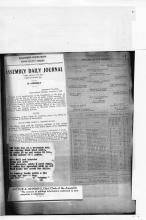
This page displays 5 items.
The first item is a partial Assembly Daily Journal, it reads:
California Legislature
Forty Fourth Session
Assembly Daily Journal
First Legislative Day
First Calendar Day
In Assembly
Assembly Chamber,
Sacramento, Monday, January 3, 1921.
Pursuant to the requirements of the Constitution of the State of California, and the law, at the hour of twelve o’clock meridian, the Assembly of the forty-fourth session of the Legislative of California was called to order, in the absence of the Chief Clerk of the last session, by Honorable Frank W. Anderson, senior member-elect of the Assembly.
In conformity with law, the following officers of the forty-third session were also present: Arthur A. Ohnimus, Minute Clerk, and William J. Leflar, Sergeant-at-Arms.
Prayer
By invitation of Hon. Frank W. Anderson, prayer was offered by Rev. William E. Harrison of Sacramento.
Minute Clerk Arthur A. Ohnimus reading
The minute clerk read the following certificate of duly elected members of the Assembly of the forty-fourth session of the legislature of the State of California:
State of California; Department of State.
I, Frank C. Jordan, Secretary of State of the State of California, do hereby certify that the following is a complete list of the those duly elected at the General Election, held on the second day of November, A. D. 1920, to represent the people of the State of California as Members of the Assembly of said State at the forty-fourth session of the Legislature of said State, as appears from the Statement of Vote, received from the County Clerks of the County or Counties and the Regis-… *The rest of the journal is cut off.
The second item displayed on this page is a poem that has been cut off at the bottom, it reads:
His Hair was of a brownish hue,
The kind that curls,
He combs it up and waves it too,
In the matter of a girl.
He’s tall and handsome
Young and fair
With glasses, quite & good style,
He makes his speeches with an air
That holds the crow the while.
So Pomerey leads quite a few
Along the…
The third item is a quote from Arthur Ohnimus, it reads:
Arthur A. Ohnimus, Chief Clerk of the Assembly
“The amount of political information contained in your magazine is surprising.”
The fourth item is a list of Officers of the Assembly, it reads:
Thursday, January 6, 1921
Officers of the Assembly
Hon. Henry W. Wright
Speaker
Hon. Albert A. Rosenshine
Speaker Pro Tempore
Jerome B. Kavanaugh
Chief Clerk
W. E. Monahan
First Assistant Chief Clerk
Ellsworth Eustice
Assistant Clerk
P.C. Phillips
Assistant Clerk
Hattie Jewel Anderson
Minute Clerk
Arthur Ohnimus
Assistant Minute Clerk
Mrs. Helen Biggs
Assistant Minute Clerk
Arthur H. Samish
Acting History Clerk
Louis F. Erb
File Clerk
Ralph Wright
Assistant File Clerk
Rev. W. E. Harrison
Chaplain
W. J. Leflar
Sergeant-at-Arms
Vernon W. Lilley
Journal Clerk
G. J. Scully
Bookkeeper, Sgt-at-Arms
Arthur H. Samish
Engrossing and Enrolling Clerk
Mrs. A. T. Perry
Postmistress
The fifth item is from the Assembly Daily Journal, dated Tuesday, Jan. 4, 1921. It has a list of 30 members’ names, address, district number, mileage one way, total mileage, amount at 10 cents per mile, Distance from Co. seat less and distance from Co. seat more.
And at the bottom is 3 officers name with the same information as the above.
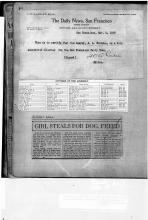
This page displays 3 items.
The first item reads:
H.D. Wheeler, Editor Telephone Special 400
The Daily News, San Francisco
One Center
Every evening except Sunday
25 cent a month
Office, 340 Ninth Street
San Francisco, Nov 5, 1907
This is to certify that the bearer, A. A. Ohnimus, is a duly accredited reporter for the San Francisco Daily News.
H.D. Wheeler (Signature)
Editor
The second item displays the name, title, home address, local address and phone number of Officers of the Assembly:
Officers of the Assembly
|
Name |
Title |
Home Address |
Local address |
Phone |
|
Wright, Henry W |
Speaker |
1009 Fair Oaks Av., South Pasadena |
Hotel Sacramento |
Main 900 |
|
Rosenshine, A. A |
Speaker Pro Tem |
846 Mills Bldg., San Francisco |
Hotel Sacramento |
Main 900 |
|
Harrison, Rev. Wm. F |
Chaplain |
1431 15th St., Sacramento |
1431 15th St., Sac |
Main 4884 |
|
Kavanaugh, Jerome B. |
Chief Clerk |
San Bernardino |
1926 22d St. |
Main 3592-R |
|
Kavanaugh, Marie |
Secretary to Chief Clerk |
San Bernardino |
1926 22d St. |
Main 3592-R |
|
Eustice, Ellsworth E. |
Assistant Chief Clerk |
Gilroy |
1926 22d St. |
Main 3592-R |
|
Lilley, Vernon W. |
Assistant Clerk |
328 N. Marengo Av., Pasadena |
1303 I St. |
Main 3958-R |
|
Booth, C. Wm. |
Assistant Clerk |
1225 E. 23d St., Oakland |
1714 8th St. |
Main 1833-M |
|
Phillips, Pete |
Assistant Clerk |
Los Angeles |
|
|
|
Anderson, Hattie J. |
Minute Clerk |
Oakland |
|
|
|
Ohnimus, Arthur A. |
Assistant Minute Clerk |
2910 Fulton St., San Francisco |
Hotel Land |
Main 5040 |
|
Biggs. Mrs. H |
Assistant Minute Clerk |
Mariposa Apts., Oakland |
3301 33d St. |
|
|
Erb, Louis F. |
File Clerk |
578 7th Av., San Francisco |
816 14th St |
Main 5581-W |
|
Wright, Ralph |
Assistant File Clerk |
1009 Fair Oaks Ave., South Pasadena |
Hotel Sacramento |
Main 900 |
|
Samish, Arthur H. |
Engrossing & Enrolling Clerk |
562 Hayes St., Apt. No. 4, SF |
Hotel Land |
Main 5040 |
|
Leflar, Wm. J. |
Sergeant-at-Arms |
1310 18th St., Sacramento |
1310 18th St., Sac |
Main 2699-W |
|
Scully, Geo. J |
Bookkeeper to Sergt-at-Arms |
727 9th St., Sacramento |
727 9th St. Sac |
|
|
Perry, Anna T |
Postmistress |
358 2d Av., San Francisco |
2100 L St |
|
The third item is a newspaper clipping it reads:
Girl Steals for Dog, Freed
Love of a 14 year old Chinese girl lavished on a shaggy mongrel dog today brought the child through the forbidding portals of the Hall of Justice and into the dim precincts of the bond and warrant’s clerk’s office, where a larceny charge had been laid against her.
Rose Chang, denied food for her canine pet by a frugal guardian, stole into her uncle’s merchandise store in Grant Av. There she took 25 cents from the cash drawer.
But the aged uncle, familiar with the wiles of the yellow and white man, was keeping a watchful eye on his establishment as he puffed a long Chinese pipe behind an embroidered screen.
As the girl stealthily made her way from the store he seized her and dragged her toward the Hall of Justice, accompanied by an excited band of his countrymen.
At the bond and warrant clerk’s office the uncle told his story. The girl told hers, exhibiting her pet in support of her statements.
“How much did she steal?” queried George Ohnimus, in charge of the office.
The uncle told him the amount.
“You’ll get no warrant here,” declared the official, extracting a quarter from his pocket. “Here’s your money, now beat it!”
A radiant Rose, followed by a capering mongrel pup, departed from the hall, bent on the purchase of delicacies calculated to appeal to the canine fancy.
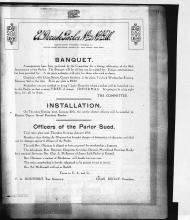
El Dorado Parlor No. 52 N.S.G.W.
Meets every Thursday Evening at
Native Sons Building, Mason St., Bet Geary and Post
Banquet
Arrangements have been perfected by the Committee for a fitting celebration of the 36th Anniversary of the Parlor. The Banquet will be all that can be wished for. Unique entertainment has been provided for. A six piece orchestra will play for those who wish to dance.
Gianduja’s 601 Union Street, Corner Stockton, is the place 7 o’clock Wednesday evening, February 2nd, is the time. Price per plate is $2.00.
Remember you are entitled to bring 1 Lady Guest for whom a ticket will be furnished you by the Parlor on that evening Free of charge. Informal. It’s going to be a big night boys, let’s all be there.
The Committee
Installation
On Thursday evening next, January 27th, the newly elected officers will be installed by District Deputy Grand President Bender.
Officers of the Parlor Sued
Trial takes place next Thursday Evening, January 27th.
President elect Arthur A. Ohnimus has brought charges of defamation of character and filed suit for damages against 6 officers of the Parlor.
The said Bro. Ohnimus is alleged to have proposed for membership a Japanese.
The defendants, Bros. Bonivert, Chaquette, Crowley, Downie, Martell and President Reilly have retained Attorney Bro. Chas L. McEnerny of James Lick Parlor as Counsel.
Bro. Ohnimus, a student of Blackstone, will handle his own case.
The entire membership is hereby subpoenaed to be present to act as jurors.
Bro. Ed. McDonnell will act as Bailiff.
Yours in F. L. and C.
F.A. Bonivert, Rec. Secretary Chas, Reilly, President
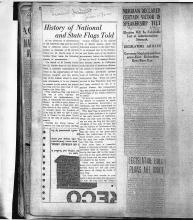
This page displays 3 newspaper clipping.
The first newspaper clipping reads:
History of National and State Flags Told
At the ceremony of presentation of the American flag and the state flag to Jefferson school recently, Arthur A. Ohnimus of El Dorado Parlor No. 52, Native Sons of the Golden West, made the following speech of presentation:
“On behalf of El Dorado Parlor No. 52, Native Sons of the Golden West, a patriotic organization devoted to the preservation of California’s integrity and the promotion of the highest ideals in American citizenship, it is my pleasure to present to this school the American flag and the state flag of California-the Bear flag.
“The American flag was born in the war of 117, whereby we achieved our independence. In 1812, it vindicated the principles of liberty. In 1845 it gave liberty to Texas. In 1861 it freed four million slaves in this country. In 1898 it brought about the freedom of Cuba and in 1917 we saw it floating in France in the great World war on the side of justice and humanity.
“During the whole history of America our flag as been the flag of…
*The whole bottom half of this column is not available.
Second column continues from first column it reads:
“Daniel Webster, in his famous 7th of March speech, made the following allusion to the Bear flag: ‘It so happened that in the distracted and feeble state of the Mexican government, before the declaration of war by the U.S. against Mexico had become known in California, under the lead of American officers, the people of California overthrew the existing provincial government of California and ran up an independent flag. When the news arrived in San Francisco, that war had been declared by the U.S. against Mexico, this independent flag was pulled down and the Stars and stripes of the Union hoisted in its stead.’
“It is to be remembered that by the failure of congress to establish a territorial government in California, she was constrained to establish a government for herself.
“The Bear flag is preserved and honored today because it is typical of the early pioneer of California. When you look upon the flag, you see not only the flag but the early struggles of the men of that day and the history of California of the time. You may read in the Bear flag the story of the great gold rush, the misfortunes of the ill-fated Donner party, and the lives of the men that made California and this flag possible.
“You have here a beautiful school, a charming principal and an excellent staff of teachers. You live in the best city in this state; you live in the most glorious state in the Union and the most wonderful country in the world.
“Obey your teachers, love and honor your country and your state. Always stand for law and order and above all things be proud of your flag.
“Let there ever remain in your heart a deep devotion for the country and the flag that has always…
*The whole bottom half of this column is not available.
The second newspaper clipping reads:
Merriam Declared Certain Victor in Speakership Tilt
Election will be Favorable Test of Administration Strength
Legislators Arrive
Governor Stephens and Governor-Elect Richardson Have Busy Day
As legislators, officials, and lobbyists gathered in Sacramento yesterday and last night, preparatory to the opening Monday of the forty-fifth session of the California legislature, the most discussed question was the speakership of the assembly. The post held last session by Henry W. Wright of Los Angeles is sought by Frank F. Merriam of Long Beach and Albert A. Rosenshine of San Francisco.
It was declared by prominent legislators last night that it is a certainty that Merriam will have enough of the 80 votes to insure his election.
Merriam has the backing of Governor-elect Friend W. Richardson. Rosenshine has the support of a group of politicians who have often announced their affiliations with the federal group.
The importance of the contest, according to legislators, is based on the belief that Merriam’s election would be a favorable test of the state administration strength in the legislature.
The constitution provides that the lieutenant governor shall preside in the senate, so there is no contest there.
Other elective houses are the chief clerk of the assembly and the secretary of the senate, a sergeant-at-arms and a chaplain for each house. Arthur Ohnimus of San Francisco was the only avowed candidate last night for chief clerk, and Joseph Beek of Santa Ana was similarly situated for the secretary of the senate. Neither of the incumbents at the last session wished to return. William Leffler, of Sacramento was unopposed for sergeant-at-arms of the assembly, and Joe Nolan of Los Angeles, R. P. Benton of Los Angeles and H. H. Yonkin of Los Angeles were mentioned for the senate position. Numerous Sac… *the rest of the news clipping is cut off.
The third newspaper clipping reads:
Legislative Ball Plans are made
Attaches and officers of the legislature last evening completed plans for the biennial legislative ball to be held in Memorial auditorium during the first week of April.
Senators, assemblymen and State officials will be guests of honor at the party. The following organization was perfected.
Joseph A. Beek, chairman; Arthur A. Ohnimus, vice chairman; Made Cross, secretary; Kathleen Tuite, assistant secretary; Louis F. Erb, chairman of the executive committee; Joseph F. Nolan and Arthur Ferguson, general directors.
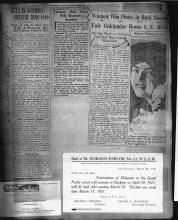
This page displays 5 items.
First item is a newspaper clipping it reads:
Bills in Assembly Greater than 1919
Total of 276 in First Two Weeks as Compared with 223 in Similar Period of 1919.
The 1921, Legislative session is going to have a greater number of bills to pass on than did the lawmakers who gathered here in 1919 if the pace that has been set in the Assembly during the past two weeks is continued. Already there have been a total of 276 bills introduced, which is fifty-three more than the 223 that were presented during the first two weeks in 1919.
The Senate is slightly ahead of last session’s figures.
In the first week of 1919, according to statistics which have been announced by Arthur Ohnimus, Assistant Minute Clerk in the Assembly, there were but two days on which bills were introduced, and the total for those two days was sixty-three. In the first week of the present session, bills were presented on three days, the total being sixty-four, or elven more than the previous session.
Second Week’s Figures
For the second week of the last session, there were a total of 160 bills presented in five days, compared with 276 in four days of this year. For the first two weeks of both sessions there were seven days each during which bills were presented, and the total for this session is fifty-three in excess of 1919.
Some of the Assemblymen say they will have no more measures to present during the first half of the present session, but there are others who will be particularly active in this line during the present week. The Legislative Council Bureau has been busily engaged whipping these measures into shape, and it is anticipated the majority of them will be ready for presentation this week.
Await Governor’s Message
Some of the saloons who have ideas they want to present along the line of efficiency and economy, have been holding off until the Governor shows his hand in this respect. It is believed the Chief Executive’s message will be read tomorrow, and if his suggestions for trimming of expenses through abolishment or consolidation of certain State agencies are not believed to be sufficiently sweeping, these measures will be brought out from under cover. Some of them have to do with increasing the salaries of Legislators, some of the funds for which would derived through a reduction in the number of attaches.
Work on Bill
There are five Assemblymen working together on a bill of this nature and they declare that the adoption of such a measure would promote both efficiency and economy.
It is anticipated, however, that if such a measure is introduced, it will meet with considerable opposition in both Houses, for there are quite a few Senators and Assemblymen who do not relish the idea of losing out on their patronage.
The second item displayed looks like Arthur A. Ohnimus business cards it reads:
The Retail Grocer’s Advocate Phone West 3067
1714 Webster St. San Francisco, Cal.
Arthur A. Ohnimus
Representatives
Official Paper
California Retail Grocers’ & Merchants Association
Associated Retail Grocers of San Francisco
The third item displayed is a newspaper clipping, it reads:
Fourteen Bald Heads Help Illuminate Assembly
The person who wants to know whether an Assemblyman has any idiosyncrasies has but to put the question to Arthur Ohnimus, Assistant Minute Clerk of the Assembly.
Ohnimus, in his spare time, has compiled statistics that show about everything a solon should or should not do. He has it all figured out, for instance, that Albert A. Rosenshine of San Francisco and George C. Cleveland of Watsonville are the only two members of the Lower House who regularly spoke pips. He tells us that Homer R. Spence of Alameda is that tallest Assemblyman; that Franklin D. Mather of Pasadena is the shorts; that Thomas A. Mitchell of San Francisco is the thinnest, and that Edwin O. Loucks of Los Angeles County is the stoutest.
Beardless Assembly
Further personal of the Ohnimus statistics shows there are nine Assemblymen whose first name is Frank. There are four Johns and four Arthurs. It’s a beardless Assembly, but there are seven mustaches.
In his count, the statistician has found fourteen bad heads and twelve semi-balds.
Among those who smoke, and the majority of them do, the cigarette is the most favored. The cigarette users are so numerous it is not considered likely there will be any legislation directed against Lady Nicotine.
The fourth item displayed is a newspaper clipping. In this newspaper clipping it shows a picture of Mrs. Hattie J. Anderson and above the picture it is titled “Minute Women of 1921.” The rest of the newspaper clipping reads:
Women Win Posts in Both Houses
Fair Oaklander Routs S.F. Rival
East, Bay Pilgrim to Harding’s Front Porch Made Assembly Minute Clerk
Examiner Bureau
1011 Seventh Street.
Sacramento, Jan. 3 – It was woman’s day in the Assembly when Mrs. Hattie J. Anderson of Oakland, the first woman ever to be accorded such honor, was elected to an official post in the staff of the lower house of the legislature. Mrs. Anderson was chosen chief minute clerk, the fifth title on the clerical staff, which is designated on the official roster as an Assembly officer’s position.
It is not the first time that Mrs. Anderson, buxom and brunette, has appeared in the political line up.
When Californians made their pilgrimage in September to President=elect Warren G. Harding’s front porch, Mrs. Anderson was a distinguished “pilgrim.” And during California day on the front porch the attractive Oaklander loomed alongside of the Marion Republican nominee in the big group photographic souvenirs that were made of the journey.
In Oakland, so the Alameda county politicians say, Mrs. Anderson is “some organizer.” She did so well here that at her last minute Arthur A. Ohnimus of San Francisco withdrew gracefully from the contest and left the field open to his feminine opponent. Ohnimus accepted the assistant clerkship.
Assemblywoman Mrs. Elizabeth Hughes of Oroville nominated the successful candidate.
In the Senate Miss Grace S. Stoermer of Los Angeles was duly elected secretary of that body-the first woman to be elected secretary of a legislative body in California, and probably in the nation. Miss Stoermer is a past president of the Native Daughters of the Golden West. She began her labors by reading resolutions and calling the roll in a clear voice, easily audible throughout the Senate chamber.
Hattie Anderson yesterday chosen minute clerk of the Assembly at the first session of the Forty-fourth State Legislature.
The fifth item reads:
Hall of El Dorado Parlor, No. 52, N.S.G.W.
Meets Every Thursday Eve at Native Sons Hall. Mason St., bet. Geary and Post
San Francisco, March 5th, 1921
Dear Sir and Bro.:-
Nominations of Delegates of the Grand Parlor which will convene at Stockton on April 18, 1921, will be held next meeting March 10. Election one week later March 17, 1921.
Yours in F. L. and C.
Arthur Ohnimus, President. Frank A. Bonivert, Recording Secretary
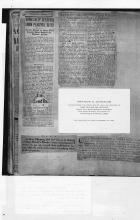
This page displays 5 items: 4 newspaper clipping and a flier.
First item is a newspaper clipping it reads:
Song Keep Senators from Peaceful Sleep
Dozens forced to arise when Sonoma Solon Renders the National Anthem
Pandemonium reigned in the Senate during the hours the Senators were locked up under the call of the House pending a final vote on the Kind corporation tax rate bill.
Singing, speech making and feasting were the principal pastimes on the program. The dinner bell sounded whenever Senator William Scott of San Francisco got hungry, which was often. Card games flourished in many coroners.
Just when many of the Senators were enjoying a peaceful sleep about 2 a.m. today, Senator Herbert Slater began singing “The Star Spangled Banner” and everybody, even the sleepers, were forced to rise and stand at attention.
The Program
In tribute to Senator J. L. C. Irwin, whose absence caused the long and weary lock up, Senator Slater led a chorus in singing “Where is my Wandering Boy Tonight.”
Other songs “rendered” were “The End of a Perfect Day”; “Home Sweet Home,” and they meant it; “Onward, Christian Soldiers”; “Blessed Be the Tie that Binds” and “Mary Ann McCarthy Went Out to Dig Some Clams.”
Senator Walter McDonald of San Francisco was enjoying a quiet sleep when Senator Scott planted a small American flag in his car and forced him to arise and recite the “American’s Creed.” Scott responded with “Please Go Way and Let Me Sleep.”
Record Set in 1911
*The first 2 paragraph of this section has a hole in the middle so the words are not readable.
“In the Senate there?” asked the Sergeant-at-Arms.
“Why, no, he’s in Sacramento,” said Mrs. Irwin.
“No, he isn’t, and we can’t find him,” said the official; and now married Senators are wondering.
Second item is a newspaper clipping it reads:
New Lawyers Admonished by U.S. Judge Morrow to Adopt Integrity as Slogan of Profession
Four young women and seventy two men stood with upraised hand while the oath was administered admitting them to practice law in the state of California during the impressive exercises conducted here yesterday morning before divisions one and two of the District Court of Appeal.
United States Circuit Judge W.W. Morrow was the principal speaker of the day, and he admonished his youthful fellow members of the bar to adopt integrity as the slogan of their profession.
Ned for High Ideals
“The one outstanding quality needed among the legal fraternity today is absolute honesty, honest in purpose and ideals,” Judge Morrow said. “What the world wants this moment is intelligent, active, independent mean, and you, young lawyers of California, are the men to respond to that call. You are entering an ancient, great and honest profession, and it is your duty to keep it so by your integrity. Our duty to ourselves and our country is to make this age the greatest that has ever been known in the history of the world.”
Judge Morrow referred humorously to experiences he has had during his fifty-three years in the bar and upon the bench, and warned the entrants of certain pitfalls to be avoided. His entire address was punctuated with gusts of laughter and applause.
Working Hard, Living Well
Taking as his text, “Work hard, Live Well, Die Poor,” Sidney M. Ehrman, local attorney, spoke to a successful candidates upon the duties and responsibilities of their new careers and welcomed them on behalf of the Senate Bar association Justice William H. Langdon presided and the candidates were sworn in by Justice John F. Tyler.
Among the local men who were admitted to the bar at the ceremonies yesterday was the young son of State Senator Samuel M. Shortridge, Samuel Jr. He has been a student at the Hastings College of Law for the last year, and recently was appointed legal adviser of the prohibition office here.
The four women admitted were Miss Stella E. Gramer, 1350 Sutter Street; Mrs. Lelia R. Leep, 1738 Steiner Street; Mrs. Mary R. Schwad, 1270 Jackson Street, and Miss Marguerite M. Shipman, 2249 College Avenue, Berkeley.
Other entrants were:
From San Francisco – F.H. Ainsworth Jr., P. P. Barnett, J. H. Bayer, Andrew Belanca, A. F. Breslauer, C. F. Bryan, C. M. Carpenter, M. J. Conklin, C. R. Cosby, J. W. Ehrich; F. A. Flynn, E. P. Fogle, C.H. Garvey, M. E. Garcia, Samuel Hamburg, E. A. Larrecou, E. S. Layman, J. F. Leicester, Nathan Merenbach, W. R. Millington, H. L. Morrison, F. M. O’Brien, J. B. O’Conner, Eugene O’Donnell, A. A. Ohnimus, Herbert Rabinowitz, Charles Richardson Jr., G. A. Stockfleth, H. G. Zimmerman, C. D. Woehr, L. N. Downing.
From Berkeley – R. W. Arnot, G. L. Berrey, A. M. Garden, T. H. Dahlquist, P. D. Dexter, E. B. Ellsworth, J. L. Fainer, Max Felix, L. E. Graybiel, W. H. Hahesy, F. C. Hutchinson, Sumner Mering, E. S. Pillsbury, P. B. Richard, J. C. Stirton, H. J. Sweet, L. S. Thornburgh, J. R. Thomas.
From Oakland – P. H. Angell, D. A. Campbell, J. F. Coakley, H. D. Cretty, H. C. Ellis, E. G. Gilkey, A. W. Glickman, William G. Hunt, L. W. Irving, G. J. Lacoste, J. L. Meegan, W. T. Nilson, F. M. Pearce, Ray Vandervoort.
From other points – Lemuel R. Belt, Santa Clara; L. M. Cahill Jr., San Mateo; W. Henderson, Campbell; G. H. Jertberg, Stanford; H. S. Lyon, Placerville; Harold (last name is not readable), Santa Rosa; R. S. Purdy, San Jose; Samuel Shortridge, Menlo Park; F. F. White, Stanford.
Third item looks to be a flier it reads:
Arthur A. Ohnimus
Announces the Opening of his Law Office at
530 Mills Building
Bush and Montgomery Streets
San Francisco, California
Telephone Garfield 3886
San Francisco, California, December 1st, 1922
Fourth item displayed is a newspaper clipping it reads:
Arthur Ohnimus, the lad who is in charge of Matt Brady’s Market Street headquarters wants to go on record that politicians are just like the girls who insist on taking their baths in public.
Fifth item displayed is a newspaper clipping it reads:
Chief Clerk Arthur A. Ohnimus of the Assembly recently sent us a nice leather bound handbook of the California Legislature with our name embossed in gold letters ‘n everything, just like we were member of a Legislature. Arthur never over looks us on this little courtesy. This year his booklet is better than ever. It has a complete directory of the state officers, and even includes the new reapportionment districts which will prevail at the next general election.

This page displays 8 items: 4 newspaper clipping and 4 other documents.
The first item displayed is a newspaper clipping it reads:
Tuesday, January 5, 1921
Attaches are Named
Appointment of attaches were made in the senate and assembly Wednesday morning.
The following attaches were appointed by the senate:
Thelma Deward, Aileen Barber, Kathryn Milarkey, Nellie Feliz, J. J. Kenny, stenographers. Vincent Mangerina, assistant sergeant at arms. Anna E. McMahon press, mailing clerk.
The following attaches were appointed by the assembly:
Ellsworth Eustice and Pete Phillips, assistant clerks; C. H. Johnston, assistant sergeant at arms; Arthur Ohnimus and H. Biggs, assistant minute clerks; Vernon Lilley, assistant journal clerk; Arthur Samish, engrossing clerk; Ralph Wright, assistant file clerk; Anna T. Perry, postmistress, Mrs. A. A. Wendering, assistant postmistress; Lee Day, Norman Brown, Martha J. Clarke, Corrine, Clement, Grace Hornblower, Helen Hurley, Bessie McBride, Helen Warren, Ethel Secor, Gertrude Wright, Gladys Cress and Norma Gunderson, stenographers; E. Lansforth, Theo. Lafayette, Albt. Huston, Daniel Whelan, Horace A. Lee, F. B. Noyes, H. H. Smelzer, Payne Middleton and John E. Reynold, assistant sergeants at arms; Stanley Windrem, Sheppard Hughes, E. Morey and Chas. Fuller, pages; Mrs. J. O. Bishop, L. M. Bromley, Mrs. F. L. Cummings, Mrs. J. L. Pendrotti, and Jessie A. Spaulding, committee clerks; Louis F. Erb, file clerk.
The second item reads:
1903
The Fight
For
Mayor
Is Between-
The third item is a newspaper clipping it reads:
Assembly Approves Attaches Appointed
Announcement of the appointment of attaches of the Assembly was made today by Assemblyman J. A. Pettis, Chairman of the Attaches Committee, and the appointments were approved by the Assembly. Reading over of the last names on the list sounds almost like a roll call of the Assembly members, so well was the patronage distributed among wives and other relatives of the representatives.
Here is the list:
Ellsworth Eustice, Pete Phillips, Assistant Clerk, $7 each.
O. H. Johnston, Assistant Sergeant-at-Arms, $5.
George J. Scully, Bookkeeper to Sergeant-at-Arms, $5.
Arthur Ohnimus, Helen Biggs, Assistants to Minute Clerk, $7 each.
Vernon W. Lilley, Journal Clerk, $7.
Gertrude Manning, Assistant Journal Clerk, $5.
Arthur Samish, Engrossing Clerk, $7.00.
Ralph, Wright, Assistant File Clerk, $5.
Anna T. Perry, Postmistress, $4.
Mrs. A. A. Wendering, Assistant Postmistress, $4.
Lee Day, Normal Brown, Martha J. Clarke, Corinne Clement, Grace H. Hornblower, Helen Hurley, Stenographers, $5 each.
Bessie McBride, Chief Stenographer, $6.00/
Helen F. Warren, Ethel Secor, Gertrude Wright, Gladys Cress, Normal Gunderson; stenographers $5 each.
E. Lansord, Theo. Lafayette, Albert Huston, Daniel A. Whelan, Horace E. Lee, F. B. Noyes, H. H. Smelzer, Hayne Middleton, John E. Reynolds, W. W. Greer, Assistant Sergeant-at-Arms, $5 each.
Stanley Windrem, Sheppard Hughes, Ed Morey, Charles Fuller, Pages, $2.50 each.
Mrs. J. O. Bishop, L. M. Bromley, Mrs. F. J. Cummings, Mrs. J. L. Perdotti, Jessie A. Spalding, Committee Clerks, $4 each.
Louis F. Erb, File Clerk, $7.
The fourth item is a newspaper clipping, it reads:
Cal. Solons Peaceful as Session Opens
By Associated Press
Sacramento, Jan 3. – The Senate and Assembly of the state legislature convened at 12:15 p.m. today. Details of the temporary organization were put under way in both the Assembly and the Senate. Senator Arthur H. Breed of Alameda was elected president pro tem of the Senate.
Assemblyman Henry W. Wright of Los Angeles was elected speaker of the Assembly without opposition.
By International News Service,
Sacramento, Jan. 3. – If other matters that come before the forty-fourth legislature are disposed of as easily and with as little friction as the weighty one of selecting the first batch of officers and attaches of the two houses the session that opens today is not to be prolific of hectic strife and conflict.
The question of legislative patronage appears to have been disposed of without any violent contacts and without leaving any broken hearts. There is no battlefield strewn with the remains of defeated contenders for salaried places.
Slate for Offices
The following is the slate of preliminary offices of the two houses as it is generally accepted in advance of the formal convocation of the legislature at noon:
Assembly-
Chief Clerk – Jerome B. Kavanaugh of San Bernardino.
First assistant clerk – Ellsworth Eustice of Gilroy.
Sergeant at arms – W. J. Lefler of Sacramento.
Minute Clerk – Arthur Ohnimus of San Francisco.
Senate-
Secretary-Miss Grace Stoermer of Los Angeles…
*The rest of the newspaper clipping is not provided.
The fifth items looks like a business card for Arthur A. Ohnimus, it reads:
Arthur A. Ohnimus
Assistant Minute Clerk
California Legislature – Assembly
Forty-Fourth Session
Residence: 2910 Fulton Street San Francisco, Cal.
The sixth item is a document that is partially ruined and some of the words are not readable or they are missing. Words that are not readable or missing will be in a form of 3 asterisks: ***
Initiative Petition to be placed before Voters
*** Vice-President Arthur A. Ohnimus
The members of the subordinate Parlors of the Native Sons are to have an opportunity to show their zeal in securing signatures to an initiative measure to place upon the ballot for the consideration of the voters of California. This action was taken by the committee of the Natives, and agreed *** by the several other organizations working in harmony with our committee, as the *** direct means of bringing this vital problem to a definite test of strength.
The committee determined to leave the *** clause in the bill, which would *** *** the leasing of land to *** *** California.
This is a district *** for those who *** that the proper method of securing the quickest and the best results was in the placing of an initiative measure on the ballot at the earliest opportunity. We cannot allow the action of our committee to pass without mentioning that El Dorado Parlor *** of the first of the Parlors to suggest this means of accomplishing the results *** proposed. It is with pride that we *** *** to the fact that our delegates to *** *** Parlor in San Diego presented a *** *** along the lines now decided *** *** *** Joint Committee.
The seventh item is from the El Dorado Bulletin, it reads:
El Dorado Parlor Bulletin
(California Bear Picture here)
Staff of Bulletin:
John B. Hauer, Editor
Associate Editors:
Arthur A. Ohnimus, G. W. Hall.
Jokes:
Ralph Goldsmith
Officers
Jr. Past President H.J. Downie
President A. B. Chaquette
1st Vice-President John Morrison
2nd Vice-President Chas. Reilly
3rd Vice-President Arthur A. Ohnimus
Marshal Howard Herricks
Inside Sentinel Fred Kruse
Outside Sentinel Dave McKibbon
Recording Secretary F.A. Bonivert
Financial Secretary J. J. Crowley
Treasure Wm. Thomas
Collector P. P. Vlautin
Trustees:
A.J. Rossi, Henry Alves, Fred Bender
Eighth item on this page is a short newspaper clipping, it reads:
Arthur Ohnimus, minute clerk in the last Assembly, has been admitted to the bar of San Francisco and is considering the possibility of becoming a candidate for the Assembly
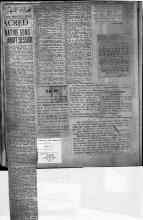
This page displays 6 newspaper clippings.
The first newspaper clipping reads:
Native Sons Await Session
Everything is in readiness for the forty-fifth annual session of the Grand Parlor Native Sons of the Golden West, which convenes at Oakland, in Aahmes Shrine Temple, tomorrow morning. More than 460 delegates will be in attendance, representing 159 subordinate parlors and a total membership of 26,460. The session of the Grand Parlor is expected to continue five days.
As a preliminary to the opening of the Grand Parlor, the seventeen Alameda county parlors will hold a rally, reception and concert this afternoon at Lakeside Park. On this occasion the parlors of Alameda County will present a California State bear flag to the Oakland Park Commission.
Addresses will be made by Major John L. Davie, Grand President William I. Traeger of Los Angeles, Grand President Dr. Victory A. Derrick of the Native Daughters of the Golden West, and Secretary Harry Vogt of the Oakland Park Commission.
Following the business session of the Grand parlor which opens in the morning, there will be a formal reception in the evening to the grand officers and delegates at the Oakland Civic Auditorium. The address of welcome will be delivered by City Auditor Harry G. Williams, grand first vice president of the fraternity, who will become head of the order upon the retirement of Grand President Traeger.
Busy Program Planned
Speeches will be made by Grand President Traeger, Grand President Dr. Victory A. Derrick of the Native Daughters of the Golden West, Grand Trustees Charles L. McEnerney of the Native Sons and Mary E. Brusie, secretary of the Native Daughters’ Homeless Children Committee.
On Tuesday evening the Alameda county parlors will be hosts to the visiting delegates at a grand ball at the Arcade dance pavilion, Fourteenth and Franklin Sts.
Wednesday will be devoted to a sightseeing trip by auto over the skyline boulevard and other places of interest, with a stop at Mission San Jose, where a big barbecue and rally will be held. C. E. Martenstein, of Niles Parlor No. 250, of Niles, will be chairman of the day. Provision will be made for entertaining more than 5,000 guests.
On Thursday afternoon the delegates will be taken on a steamer ride on San Francisco bay. In the evening the Alameda country parlors will hold a joint class initiation with the grand officers officiating.
Santa Barbara has extended an invitation to the Grand parlor to hold its 1923 convention in that city and so far is the only aspirant for the honor.
Among the questions that are likely to cause much debate are the editorial policy of Clarence Hunt of the Grizzly Bear, the official Native Sons’ journal, in attacking the alien land policy of Gov. William D. Stephens and Attorney General U. S. Webb, particularly with the reference to the Japanese problems.
Another question that will arouse much debate is a plan for the extension of the order to accept social members. Social members would not be eligible to participate in the sick and death benefit features of the fraternity.
City Auditor Harry G. Williams, grand first vice president of the order, is expected to be advanced to the grand presidency, while the grand second vice president, William J. Hayes of Berkeley, will be advanced to grand first vice president.
For the office of grand third vice president, the stepping stone to the higher honors, Judge Charles A. Thompson of Santa Clara Parlor No. 100 of Santa Clara, and Judge Fletcher A. Cutler of Humboldt Parlor No. 14 of Eureka are aspirants.
Convention Roster
Following is a list of delegates selected by the subordinate parlors:
California 1- Albert Franzen, William H. James, Clarence W. Morris, William H. Shea, M. P. Carroll, Jesse H. Miller.
Sacramento 8 – J. G. Harrigan, T. W. McAuliffe, Edward Kraus, F. E. Michael Jr., T. E. Brown, Robert D. Finnie, Charles A. Root.
Marysville 6 – Farwell Brown, Thomas B. Bunting, L. T. Sinnott.
Stockton 7 – W. C. Neumiller, A. J. Turner, W. E. O’Connor, W. P. Rothenbush, James H. Sharon, Cheater W. Conklin, Law T. Freitas, Edward Van Vranken, Fred D. O. Benjamin, George E. Catts, Fred, E. Potter.
Argonaut 8 – James T. Looney, William J. Alphers.
*Bottom of the clipping is cut off unable to read the last few names at the bottom.
Plank, Albert S. Fox, Lloyd Hancock.
Pacific 10 – Thomas F. Duffy, Walter V. Walsh, Dr. F. I. Gonzales, George Stangenberger, Walter Bammann, William A. Stark.
Modesto 11 – D. M. Maclean, M. H. Moorehead.
Humboldt 14 – Thomas K. Carr, F. A. Dodge, J. M. Nisson.
Amador 17 – Lois Boitano, Frank Marrs.
Lodi 19 – V. R. Larson, A. P. Krumb, W. C. Brown.
Arcata 20 – George W. Kasch.
Chico 21 – D. C. Knott, L.R. Bruce.
San Jose 22 – Joseph W. Ganong, Charles W. Hurt. W. A. Katen, Cornelius F. Mangin.
San Mateo 23 – Al. O. Sweetser.
Yosemite 24–C. W. Croop, W. W. Rodehaver, James W. Ives, John C. Grosjean.
Fresno 25 – George Haines, F. M. Lane, Elmo Russell.
Sunset 26 – J. J. Monteverde, John R. Straehan, W. F. Brand, O. W. Lovett, A. C. Howland, W. E. Holmes.
Santa Rosa 28 – Emmett Seawell, T. Virgil Butts, John Hawkes.
Golden Gate 29 – Harry W. Gaetjen, Charles W. Armager, Fred L. Bode, Carlos B. Wolff.
Woodland 30 – R. G. Lawson, J. W. Monroe.
Excelsior 31 – V. S. Garbarini Jr., James A. Laughton Jr., T. G. Negrich.
General Winn 32 – John Whelihan, Charles Metzler.
Ione 33 – L. E. Wakefield, Ray W. Miner.
Mission 88 – Herbert de la Rosa, Eugene M. Levy, S. A. Bernstein, harry Hansen, Henry Minore.
Solano 89 - Lloyd Grothier, Leslie Gordon.
Rainbow 40- Lawrence Muck, Edward Tucksen
Elk Grove 41 - E. R. Polhemus, Walter Martin, P. K. Bradford.
Fremont 44 - W.E. Thompson, W.W. black.
Los Angeles 45 – Walter D. Gilman, John T. Newell, William G. Newell.
Alameda 47 – A.T. Sousa, P. J. Angius, B. Ralph.
Plymouth 48 – O. E. Harrell, S. C. Harrell.
San Francisco 49 - John H. Nelson, Alfred H. McKnew, Louis D. Ghiotti, A.J. Mazzini, David Capurro.
El Dorado 52 – Angelo J. Rossi, A. B. Chaquette, Arthur Ohnimus.
St. Helena 53 – Walter Metzner, Julius Goodman
Hydraulic 56 – Dr. C. W. Chapman, Lee A. Garthe, Gomer D. Hopkins, Clayton N. Chatfield.
Quartz 58 – H. Ray George, L. J. Brock, A. B. Thomasson.
Auburn 59 – John J. Saladana, Emil D. Mundt.
Napa 62 – Percy King Jr., Robert L. Brown, F. L. Gordon, Martin Head, C. A. Lommel.
Silver Star 63 – Arthur Anderson, Mark Slinkard.
Redwood 66 – A.S. Linguori, S. E. Marcus.
Colusa 69 – Seth Millington Jr., Tim Sullivan Jr.
Ukiah 71 – Richard Andrews.
Rincon 72 – John Barett, John A. Mitchell, Peter J. O’Malley, Virgil L. Orengo, Frank E. Shea, Albert N. Smith, Daniel J. Tinney.
Monterey 75 – L. P. Chavoya, A. B. Gunzdorfer.
Stanford 76 – James G. Conlan, Waldo F. Postel, James G. Martin, Oscar A. Comper, William H. Urmy, Frank F. Morris, William F. Burke.
Vallejo 77 – H.L. Palmer, G. F. Harris.
Yerba Buena 84 – J. Hartley Russel, Ray V. Vaughan.
Calistoga 86 – E. J. Salmina, A. M. Wollenson.
Mount Bally 87 – Albert C. Meckel, Shirley J. Wallace.
Golden Star 88 – Lewis S. East.
Santa Cruz 90 – George S. Tait Jr., Harold W. Huddleson, R. H. Rountree, Harold E. Richey.
Georgetown 91 – Lee E. Flynn, Henry M. Grover.
Downieville 92 – Antone Lavezzola.
Ferndale 98 – George L. Collins, Elbert Reynolds, C. Rasmussen, Chris Christiansen.
Seaside 95 – Dr. W. S. Brooke, Frank Fetter.
Los Positas 96 – Ed. Kennedy, J. M. Baughmann, G. H. Barber.
Santa Clara 100 – J. A. Bacigalupi, A. J. Roll, Thomas Graham.
Mount Diablo 101 – Robert C. Coots, William R. Sharkey, P. J. Kane.
Glen Ellen 102 – Claren E. Frazier.
Bay City 104 – Arthur Cohn, Stephen M. White, S. M. Modtry.
Niantic 105 – Fred A. Hunt, James M. Darcy, John J. Bresnahan.
Courtland 106 – Joseph Berry, Dennis W. Leary.
Selma 107 – L. J. Price, Eugene Arrants.
San Diego 108 – Edgar F. Hastings, Eugene Daney Jr.
Ramona 109 – Irving Baxter, Joseph A. Adair, Louis P. Russell, Val. J. Smyth, Walter E. Baskerville, William L. Coffey, Charles B. Thomas, Lorenzo F. Soto, Julius M. Plath.
Sonoma 111 – William Bosch, Bert Kerner.
Eden 113 – Henry Powell, Lloyd Russell, Frank Soares.
Santa Barbara 116 – F. J. Batser, Paul G. Sweetser.
Broderick 117 – August Miller.
National 18 – W. W. Vaughn, A. J. Falvey, G. V. Ellis.
Pledmont 120 – Robert R. Castro, Joseph L. Thomas, Louis Pierotti, James J. Dignan, William R. Husing, Harold H. Flood.
Quincy 131 – J. D. McLaughlin.
Gabilan 132 – G.W. Lyons, T. A. Ambrose.
Hesperian 137 – E. C. Krase, A. V. Carroll, V. J. Rosa.
Oakdale 142 – E. T. Gobin, H. E. Campbell.
Sebastopol 143 – J. F. Ames, J. P. Kelly.
Halcyon 146 – John M. Ansel, A. L. Behneman.
McCloud 149 – Ralph Engram, Errol yank, Edmund Bell.
Brooklyn 151 – Edward J. Smith, Milton H. Glaze, Walter W. Feeley.
Cambria 152 – E. C. Blake, A. S. Gay.
Alcalde 154 – John C. Van Benthen, Louis F. Erb, Louis E. Derre.
South San Francisco 157 – Vincent Lovett, Fred Nickelson, Carl Prignitz, Charles O. Zahn, Paul McEvoy, Vincent Pugh, Waino Elvander.
Sea Point 158 – J. J. Keating, D. J. O’Connell.
Lower Lake 159 – Ira Thomas Morlan, Eugene W. Rose.
Sequoia 160 – Walter W. Garrett, William G. Boegershausen, Al Pfeiffer.
Williams 164 – Paul Franke.
Washington 169 – J. D. Norris, George Wales.
The second item displayed is a newspaper clipping it reads:
Flag Day
Did you know that yesterday, June 14, was a State holiday? It was on that day in 1846 when the first California Bear Flag was made. It was raised in Sonoma and marked California freedom from Mexico. In commemoration of that day flags were given to various schools by the Parlors of the Native Sons of the Golden West.
El Dorado Parlor No. 52 gave a flag to Jefferson School at 19th avenue and Irving Street.
The third item displayed is a newspaper clipping it reads:
Kelly Makes Statement
Assistant District Attorney Arthur Ohnimus took a statement from Kelly in which he said:
“My name is Clarence Kelly. I am 22 years of age. I give at 47 South Park. I don’t know who shot me, but I believe it was one of the officers who arrested me. I don’t know what it is all about.”
Weeks was then taken back to the…
*The rest of the article is cut off and not shown.
Fourth item displayed is a newspaper clipping it reads:
Mr. Frank B. Anderson,
Editor Sausalito News,
Sausalito, California.
My dear Andy:
First, many thanks for the mention in your issue of the 23rd of August.
Second, as you may know my duties as chief clerk of the Assembly are finally through, hence I am again in the District Attorney’s Office in San Francisco and would like to have the address of my paper changed to 187 Sixth Avenue in order that I will not miss any issue.
You are getting out a might good sheet and I enjoy reading it, for I like to follow the ways of our friends and to know what is doing in Sausalito and Marin County.
Take good care of yourself and when you get in the vicinity of the Hall of Justice, drop in and say hello.
With best wishes, as ever, I am
Cordially yours,
Arthur A. Ohnimus, Chief Clerk.
Fifth item displayed is a newspaper clipping it reads:
On Wednesday afternoon, June 14, El Dorado Parlor No. 52, N.S.G.W., presented to Jefferson School, located at 18th Avenue and Irving Street, a beautiful American flag and also the State of California flag – a Bear Flag.
The exercises were arranged by Miss Stuart, the principal, and certainly speak very well for her, as they were carried out in perfect order.
Some of the children drilled under the direction of Major Overton of the U.S. Army and he was congratulated by many on the fine qualities of his training.
The committee who had charge of arrangements for El Dorado Parlor No. 52 consisted of Albert Chequette, William Thomas and Arthur Ohnimus.
Sixth item displayed is a newspaper clipping it reads:
And if here don’t come “Lumberjack” Charley Wilkerson, the old time sergeant-at-arms of the assembly, who began life singing songs, attracted attention, sang in bigger time, and ultimately got into politics.
And, talking about politics, next if Arthur Ohnimus doesn’t pop along, entertaining, as always.
Meantime, our table got seated. Including: Supervisors Warren Shannon (reading from left to right) and Franck R. Havenner. And Supervisor Charley Todd. And my old pal, municipal motorman Jimmy Flynn, now assemblyman from the twenty-second, and Senator Tom Maloney, who succeeded my other good friend Walter McDonald. So here we are, with two potential mayors in our midst, when Assemblyman Charley A. Oliva drops along.
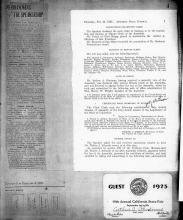
This page displays 3 items: Newspaper clipping, Assembly Daily Journal and Guest Card.
First item displayed is a newspaper it a continuation of another page, the first page is not shown. The news clipping reads:
Merriam Wins the Speakership
(Continued from Page One)
Allen, Mitchell, Moore, Morris, Mueller, Noyes, Pedrotti, Pomeroy, Roberts, Rock, Scott, Smith, Snyder, Stow, Weller, Whitacer, Williams. Total, 42.
Rosenshine – Anderson, Badaracco, Bernard, Carlson, Coombs, Crittenden, Croter, Dean, Doris, Emme, Fellom, Fox, Hawes, Hornblower, Lyman, Mathews, McDowell, M. A. Mitchell, Morrison, Reindollar, Rosenshine, Schmidt, Spence, Stevenot, Woodbridge. Total, 25.
Wright – Cleary, Heisinger, Prendergast, Saylor, Spaulding. Total, 5.
Prendergast – Broughton, Clarke, Connolloy, Johnson, Jones, West, Wright. Total, 7.
Christian – Cleveland. Total, 1.
Anderson Speaker Pro Tempore
Frank Anderson, of Oakland, oldest member of the assembly in point of service, unanimously was elected speaker pro tempore of the assembly, succeeding Rosenshine, who held that office last session.
When the nominations for the speakership were called for by Jerome Kavanaugh, chief clerk of the last session, there was a lull. After prolonged silence, Prendergast was nominated.
Merriam was nominated by Hugh Pomeroy, Los Angeles, and the second was made by Clarence Morris of San Francisco.
Following the seconding of Prendergast’s nomination, Bradford S. Crittenden, assemblyman from Tracy, introduced Rosenshine’s name.
Others Elected
Arthur A. Ohnimus of San Francisco was elected chief clerk; C. William Booth of Oakland, minute clerk; William J. Leflar, of Sacramento, sergeant-at-arms, and Bishop Moreland, Sacramento, chaplain.
The victory of Merriam was loudly acclaimed, particularly by the members from Southern California, who left no stone unturned to insure the election of the Long Beach man.
The victory of the south in the selection of a speaker is thought to be a decided step in Southern California’s favor in the reapportionment fight, which will doubtless be the most important matter to come up later in the session.
Seats Fill Early
Members of the assembly began filling their seats long before the hour for opening approached, and at noon most of the legislators were in their places.
The assembly was called to order by Jerome Kavanaugh, chief clerk of the last session, and who presided until Merriam had taken the oath of office as speaker.
Second item displayed is an Assembly Daily Journal, it reads:
Thursday, Feb 24, 1921] Assembly Daily Journal 3
Nominations for Minute Clerk
The Speaker declared the next order of business to be the nomination and election of Minute Clerk of the Assembly.
Mr. Pettis of Fort Bragg placed in nomination Mr. Arthur A. Ohnimus of San Francisco.
Mr. Eksward of San Mateo seconded the nomination of Mr. Ohnimus.
Nominations closed.
Election of Minute Clerk
The roll was called, with the following result:
For Arthur A. Ohnimus – Andreson, Badaracco, Badham, Baker, Beal, Benton, Bernard, Bishop, Bromley, Brooks, Broughton, Burns, Christian, Cleary, Coombs, Cummings, Eksward, Fellom, Fulwider, Graves, Gray, Greene, Hart, Hawes, Heck, Heisinger, Hornblower, Hughes, Hume, Hurley, Johnson, Johnston, Jones, G. L., Jones, I., Kline, Lee, G. W., Lee, I. A., Lewis, Mather, McCloskey, McDowell, McGee, McKeen, McPherson, Merriam, Mitchell, Morrison, Parkinson, Pedrotti, Pettis, Powers, Roberts, Rosenshine, Ross, Saylor, Smith, Spalding, Spence, Stevens, Warren, Weber, Webster, Wendering, West, White, Windrem, Wright, T. M., and Mr. Speaker – 68.
Oath of Office
Mr. Arthur A, Ohnimus, having received a majority vote for the Assembly, was declared duly elected Minute Clerk of the Assembly, and was directed to appear before the bar of the Assembly, where he took and subscribed to the following oath of office administered by Hon. Henry W. Wright, Speaker of the Assembly:
I do solemnly swear that I will support the constitution of the United States and the constitution of the State of California, and discharge the duties of the office of Minute Clerk to the best of my ability.
Certificate from Secretary of State
The Chief Clerk read the following certificate of duly elected Member of Assembly of the forty-fourth session of the Legislature of the State of California:
State of California, Department of State.
I, Frank C. Jordan, Secretary of State of the State of California, do hereby certify that Walter J. Schmidt was elected to the office of member of the Assembly, Twenty-fourth Assembly District of the State of California, at the special election held in said district on the fifteenth day of February, 1921, as appears by the official returns of said election and statement thereof on file in my office.
WITNESS my hand and official seal, this twenty-third day of February, A.D. 1921.
[Seal]
Frank C. Jordan, Secretary of State.
By Frank H. Cory, Deputy.
Member Sworn In
The Speaker asked for and received unanimous consent to have Mr. Walter J. Schmidt sworn in at this time.
As required by section 239 of the Political Code, Member-elect Mr. Walter J. Schmidt of the 24th Assembly District, appeared before the bar of the Assembly, presented his certificate of election, and duly qualified by taking and subscribing to the following oath administered
Third item displayed is a guest card it reads:
Guest (California State Agricultural Society Seal Picture Here) 1923
69th Annual California State Fair
September 1st to 9th
Arthur A. Ohnimus (Signature)
And Lady
Signature of President here but signature is not readable.
Signature of Secretary here but signature is not readable.
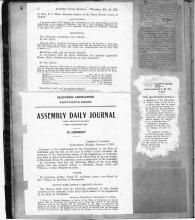
This page displays 5 items: 2 Assembly Daily Journal, 2 newspaper clipping and a very damage document.
First item is a continued Assembly Daily Journal from another page which is not known, this one reads:
4 Assembly Daily Journal. [Thursday, Feb. 24, 1921
by Hon. E. C. Hart, Associate Justice of the Third District Court of Appeal:
Oath of Office
I do swear that I will support the Constitution of the United States and the constitution of the State of California, and that I will faithfully discharge the duties of the office of Member of the Assembly of the State of California, according to the best of my ability.
Resolutions
The following resolutions were offered:
By Mr. Kline:
Resolved, That a committee of three be appointed by the Speaker to wait upon His Excellency, the Governor, and inform him that the Assembly has reconvened after the constitutional recess, and awaits any communication that he may wish to make to it.
Resolution read, and on motion adopted.
In accordance with the above resolution, the Speaker appointed Messrs, Kline, Johnson and Spence as such committee.
By Mrs. Saylor:
Resolved, That the Chief Clerk of the Assembly be directed to notify the Senate that the Assembly has reconvened, pursuant to Senate Concurrent Resolution No. 5, adopted on January 24, 1921, and is ready to proceed with the business of the State, with all officers heretofore elected present, to wit:
Speaker Hon. Henry W. Wright
Speaker pro tempore Hon. Albert A. Rosenshine
Chief Clerk Jerome B. Kavanaugh
Minute Clerk Arthur A. Ohnimus
Chaplain Rev. W. E. Harrison
Sergeant-at-Arms W. J. Leflar
Resolution read, and on motion adopted.
The second item is an Assembly Daily Journal, it reads:
California Legislature
Forty-Fourth Session
Assembly Daily Journal
First Legislative Day
First Calendar Day
In Assembly
Assembly Chamber,
Sacramento, Monday, January 3, 1921
Pursuant to the requirements of the Constitution of the State of California, and the law, at the hour of twelve o’clock meridian, the Assembly of the forty-fourth session of the Legislature of California was called to order, in the absence of the Chief Clerk of the last session, by Honorable Frank W. Anderson, senior member-elect of the Assembly.
In conformity with law, the following officers of the forty-third session were also present: Arthur A. Ohnimus, Minute Clerk, and William J. Leflar, Sergeant at Arms.
Prayer
By invitation of Hon. Frank W. Anderson, prayer was offered by Rev .William E. Harrison of Sacramento.
Minute Clerk Arthur A. Ohnimus Reading
The Minute Clerk read the following certificate of duly elected members of the Assembly of the forty-fourth session of the Legislature of the State of California:
State of California; Department of State.
I, Frank C. Jordan, Secretary of State of the State of California, do hereby certify that the following is a complete list of those duly elected at the General Election, held on the second day of November, A. D. 1920, to represent the people of the State of California as Members of the Assembly of said State at the Forty-fourth session of the Legislature of said State, as appears from the Statement of Vote, received from the County Clerks of the County or Counties and Regis-
*The rest of the Assembly Daily Journal is not shown.
The third item displayed is a newspaper clipping it reads:
Harry Caro, bookkeeper of the state senate, and Arthur A. Ohnimus, chief clerk of the assembly, are in charge of the Matthew Brady for District Attorney headquarters at 753 Market Street. Ohnimus, a deputy district attorney, is on leave without pay from his official duties.
The fourth item displayed is a newspaper clipping it reads:
But District Attorney Brady finds a defender in the person of Arthur A. Ohnimus, one of his deputies, who is managing the Brady campaign. Ohnimus, who has been chief clerk of the assembly for some time, and for that matter, a good one at that, takes issue with Dooling in some of the comment. Ohnimus says that Brady has organized, for instance, a narcotic enforcement bureau within 60 days after the last legislature enacted new laws on that subject.
Ohnimus also finds expressions of “regret” that “Dooling is out of sympathy with Brady’s action in establishing a child’s welfare bureau in his office” and there are other items with which “it is regrettable,” in Ohnimus’ language, that, “Dooling is not in sympathy.”
The fifth item displayed is a document that is partially ruined and some of the words are not readable or missing. Words that are not readable or missing will be in a form of 3 asterisks: ***
Initiative Petition to be placed before Voters
*** Vice-President Arthur A. Ohnimus
The members of the subordinate Parlors of the Native Sons are to have an opportunity to show their zeal in securing signatures to an initiative measure to place upon the ballot for the consideration of the voters of California. This action was taken by the committee of the Natives, and agreed *** by the several other organizations working in harmony with our committee, as the *** direct means of bringing this vital problem to a definite test of strength.
The committee determined to leave the *** clause in the bill, which would *** *** the leasing of land to *** *** California.
This is a district *** for those who *** that the proper method of securing the quickest and the best results was in the placing of an initiative measure on the ballot at the earliest opportunity. We cannot allow the action of our committee to pass without mentioning that El Dorado Parlor *** of the first of the Parlors to suggest this means of accomplishing the results *** proposed. It is with pride that we *** *** to the fact that our delegates to *** *** Parlor in San Diego presented a *** *** along the lines now decided *** *** *** Joint Committee.
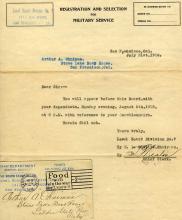
This page displays a letter addressed to Arthur A. Ohnimus, at the bottom shows the front of the envelope, this page reads:
Stamped Address:
Local Board, Division No. 7
1411 9th Avenue
San Francisco, Cal
Registration and Selection for Military Service
San Francisco, Cal.
July 31, 1918
Arthur A. Ohnimus,
Stowe Lake Boat House
San Francisco, Cal.
Dear Sir:-
You will appear before this board, with your dependents, Monday evening, August 5th, 1918, at 8 p.m. with reference to your questionnaire.
Herein fail not.
Yours truly,
Local Board Division No 7
By H. D. (last name not readable), Chairman
By (Signature not readable), Chief Clerk
Front envelope shown here:
Stamped to the left corner reads:
War Department
Official Business
Local Board, Division No. 7
1411 9th Avenue
San Francisco, Cal
Stamped: Penalty for Private use $300
Stamped to the right corner reads: Food will win the war don’t waste it
Middle of the envelope the letter is addressed to:
Arthur A. Ohnimus
Stowe Lake Boat House
San Francisco, Cal.
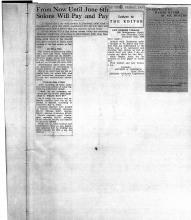
This page displays 3 newspaper clipping.
First newspaper clipping reads:
From Now until June 6th Solons will Pay and Pay
If figures don’t lie-and Arthur A. Ohnimus, chief clerk of the assembly, says they don’t-legislators will dig into their own pockets until June 6 before they can adjourn and go home.
Solons whose $12 a day salary ceases today are receiving Ohnimus’ prediction of a June 6 adjournment with long faces and with a realization they should have saved more of the $150,000 they have received in salary since opening of the 51st session in January.
465 More Bills
But instead of adjourning today, when their pays stops, legislators still must thresh out the $400,000,000 state budget, wrack their brains to raise $136,000,000 in new taxes, and act on at least 465 more bills.
Assemblymen piled more work on themselves by introducing a record number of bills-2,468.
Still to be acted upon are 309 assembly bills, 146 senate bills, plus joint resolutions, concurrent resolutions, and constitutional amendments.
Predicts June 6 Date
After compiling all these statistics, Ohnimus, veteran of many legislators, sighed and opined:
“Well, it’s my prediction we won’t get out of here until about June 6. Figures don’t lie.”
As of today, the senate and assembly together have run up expenses of $250,000, according to Controller Ray L. Riley.
Assembly expenses were divided as follows: Contingent expenses, $31,112; mileage, $4,907; salaries, $96,000; salaries of attaches, $27,605.
Senate expenses were: Contingent expenses, $12,075; mileage, $1,247; salaries, $49,247, and salaries of attaches, $26,393.
From now on, while senators and assemblymen draw no pay, legislative attaches will be nicking the state treasury for $275 a day for salaries.
Second newspaper clipping reads:
Letters to the Editor
Let Others Follow
550 Montgomery Street,
San Francisco, Calif.
December 25th, 1936
Dear Andy:-
Imbued with Christmas spirit I thought of Ye Editor and realized that my subscription to the News was a bit delinquent and knowing that editors as well as others must pay bills, I am enclosing my check for two fifty.
Many thanks, Andy, for the mention in your paper of recent date.
With kindest and best wishes, I am,
Cordially,
Arthur A. Ohnimus, Chief Clerk, Assembly California Legislature.
Third newspaper clipping reads:
Darrow Given Maximum Term of Six Months
To Dwight E. Darrow, from Municipal Judge Thomas M. Foley-six months in jail-the maximum.
Darrow, resident of a Mission Street rooming house, conceived the idea of promoting a “benefit for indigent children.” To put over the idea, Darrow used the name “Mission Men’s Club,” and on letterheads printed for the occasion listed an “advisory committee” consisting of other residents of the same house. Prizes were solicited and efforts to sell tickets were in progress when Darrow’s activities became known to the Mission Merchants Association and the Better Business Bureau.
A warrant signed by J. C. Marshall, secretary of the Mission Merchants Association, charged Darrow with soliciting in violation of the Charitable Solicitation Ordinance.
Unfortunately for Darrow, his contention that the proceeds were to be used by the Native Sons and Daughters was a poor defense. Judge Foley, who heard the case, is a past president of the Native Sons. A few pointed questions by the judge drew an admission the Natives Sons had no arrangement with Darrow or his club.
The case was prosecuted by Assistant District Attorney Arthur Ohnimus, assisted by Lloyd E. Cosgrove, attorney for the Mission Merchants Association, and Gerald J. O’Gara, attorney for the Bureau.
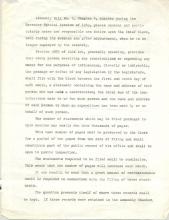
Page 1 of 5
Assembly Bill No. 5, Chapter 4, enacted during the December Special Session of 194, Places unusual and particularly heavy and responsible new duties upon the Chief Clerk, both during the session and after adjournment, when he is on longer employed by the Assembly.
Section 9903 of this Act, generally speaking, provides that every person receiving any contributions or expending any money for the purposes of influencing, directly or indirectly, the passage or defeat of any legislation by the Legislature, shall file with the Clerk between the first and tenth day or each month, a statement containing the name and address of each person who has made a contribution; the total sum of the contributions made to or for such person and the name and address of each person to whom an expenditure has been made by or on behalf of such person.
The number of statements which may be filed pursuant to this section may easily run into thousands of pages.
This vast number of pages must be preserved by the Clerk for a period of two years from the date of filing and shall constitute part of the public record of his office and shall be open to public inspection.
The statements required to be filed shall be cumulative. This means that the number of pages will increase each month.
It can readily be seen that a great amount of correspondence would be required in connection cilia the filing of these statements.
The question presents itself of where these records shall be kept. If these records were retained in the Assembly Chamber,

